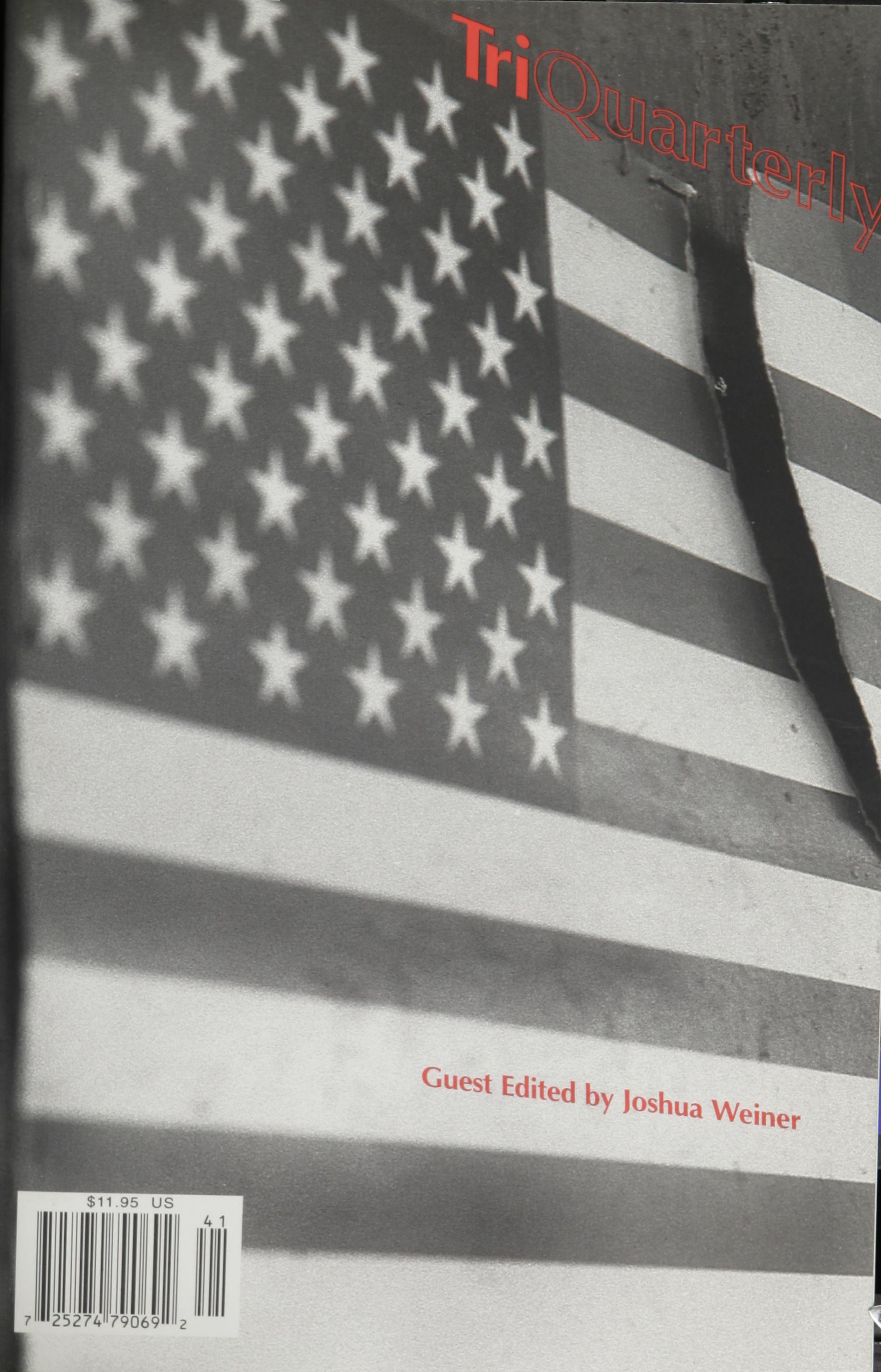 Guest Edited by Joshua Weiner
Guest Edited by Joshua Weiner

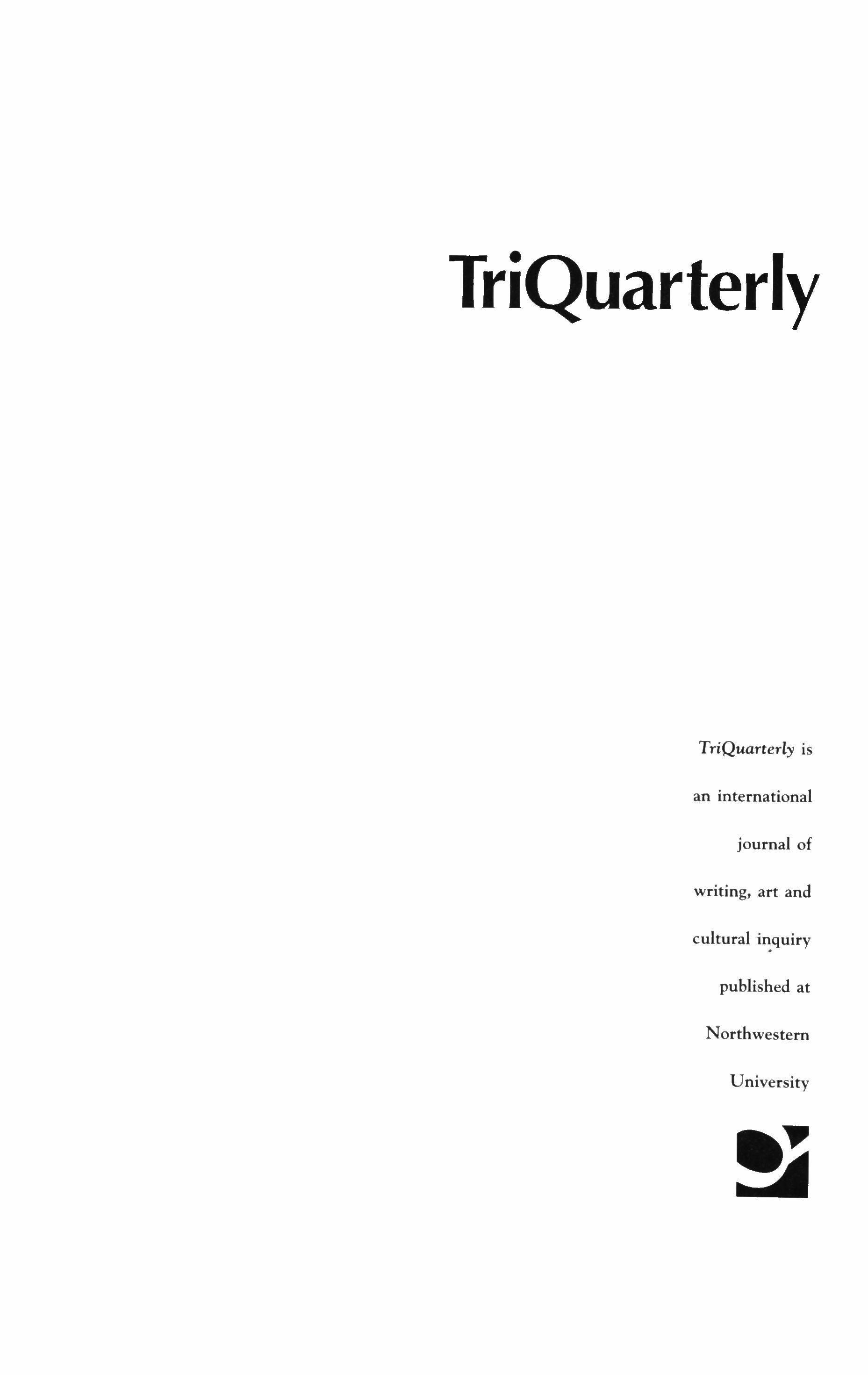
riQuarterly is an international journal of writing, art and cultural i�quiry published at Northwestern University
TriQuarterly T

Editor
Susan Firestone Hahn
Associate Editor
Ian Morris
Operations Coordinator
Kirstie Felland
Production Manager
Vincent Chung
Production Editor
Greta Polo
Cover Design
Gini Kondziolka
Editorial Assistant
Lindsay Meck
Assistant Editor
W. Huntting Howell
TriQuarterly Fellow
Sarah Mesle
Assistant to the Guest Editor
Lisa McCullough
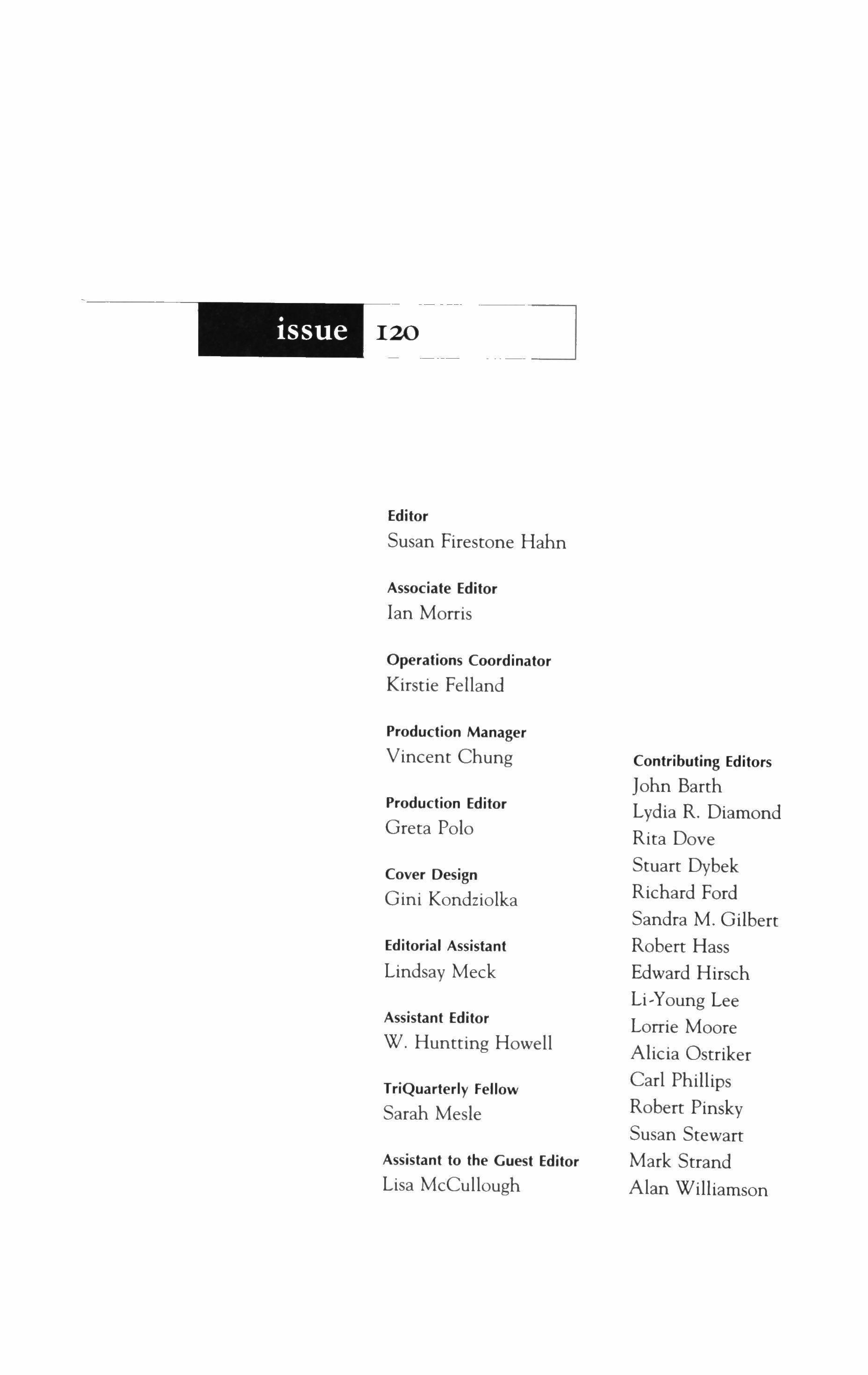
Contributing Editors
John Barth
Lydia R. Diamond
Rita Dove
Stuart Dybek
Richard Ford
Sandra M. Gilbert
Robert Hass
Edward Hirsch
Li-Young Lee
Lorrie Moore
Alicia Ostriker
Carl Phillips
Robert Pinsky
Susan Stewart
Mark Strand
Alan Williamson

Editor of This Issue
Joshua Weiner
In Memoriam
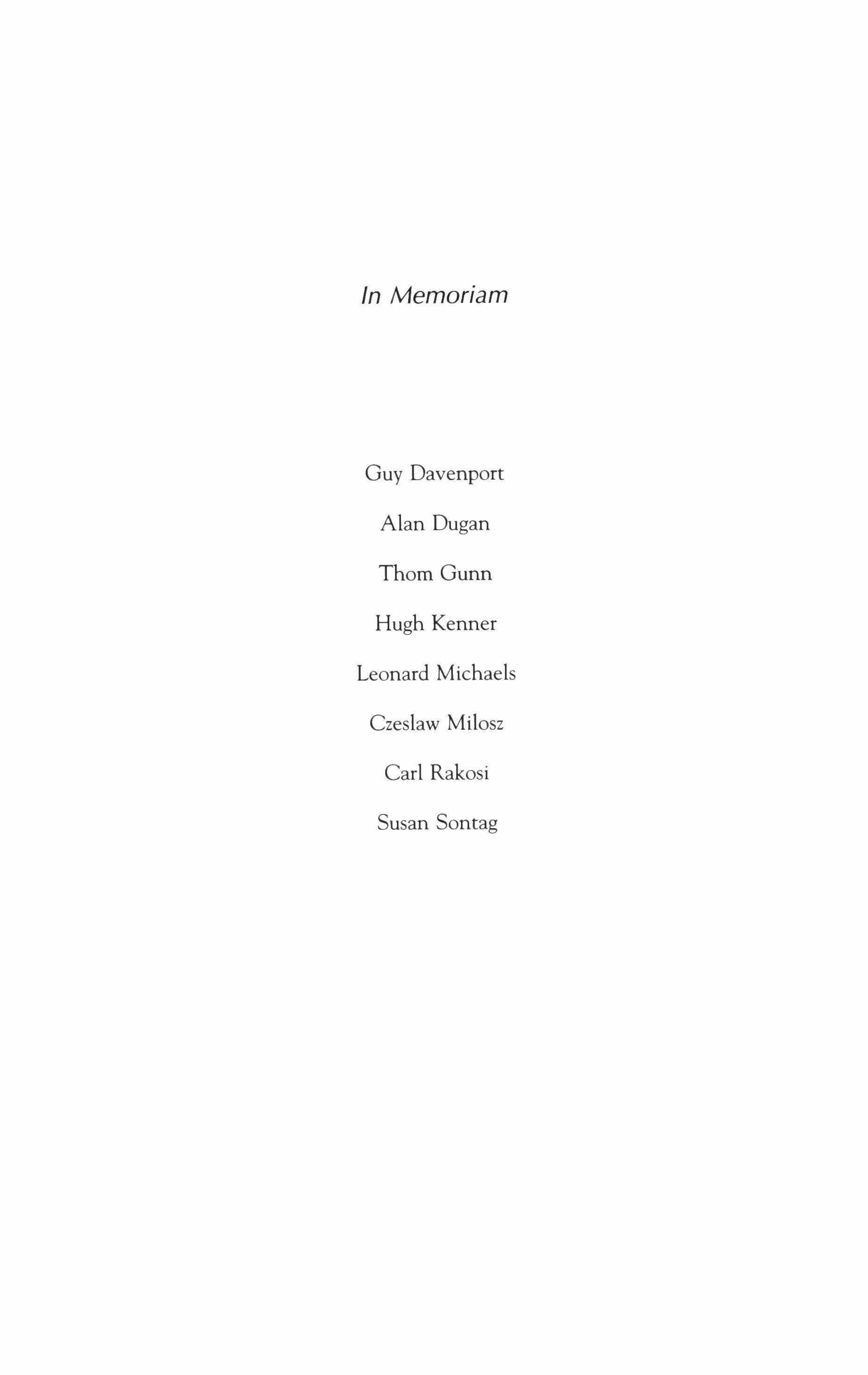
Alan Dugan
Thorn Gunn
Hugh Kenner
Leonard Michaels
Czeslaw Milosz
Carl Rakosi
Susan Sontag
Guy Davenport
Translated from the Latin by
Kristina Milnor

ell IV. 2360
graffiti, exterior wall, Pompeii, circa 62-79 AD
Amat qui scribet, pedicatur qui leget, qui opsultat prurit, paticus est qui praeterit. Ursi me comedant; et ego verpa qui lego
He loves, the one who writes; the one who reads is fucked. The critic wants it bad. Who passes by?-he sucks. May bears eat me-I'm the reader and a dickhead too.
6

CONTENTS graffiti 6 CIL IV. 2360 Translated from the latin by Kristina Milnor poetry 10 Improvisations: After Archilochos Elizabeth Arnold 17 Pastoral Rick Barot 19 The Sniper; To Likes-to-Have-Fun Don Berger 38 Skin; Stone Peter Campion 40 After Party; Peeled Horse; Georgie, Georgie (II) Dan Chiasson 44 Counter-Arnores 1.3; Counter-Arnores 1.7: That Way Jennifer Clarvoe 47 Turkey Vultures; Common Flicker Michael Collier 57 All in One Day; Increased Security W.S. Oi Piero 60 Allen Ginsberg; Halloween Sean Enright 64 Flaunting My Inertia; Today Is the First Day of the Rest of Your Life Elaine Equi
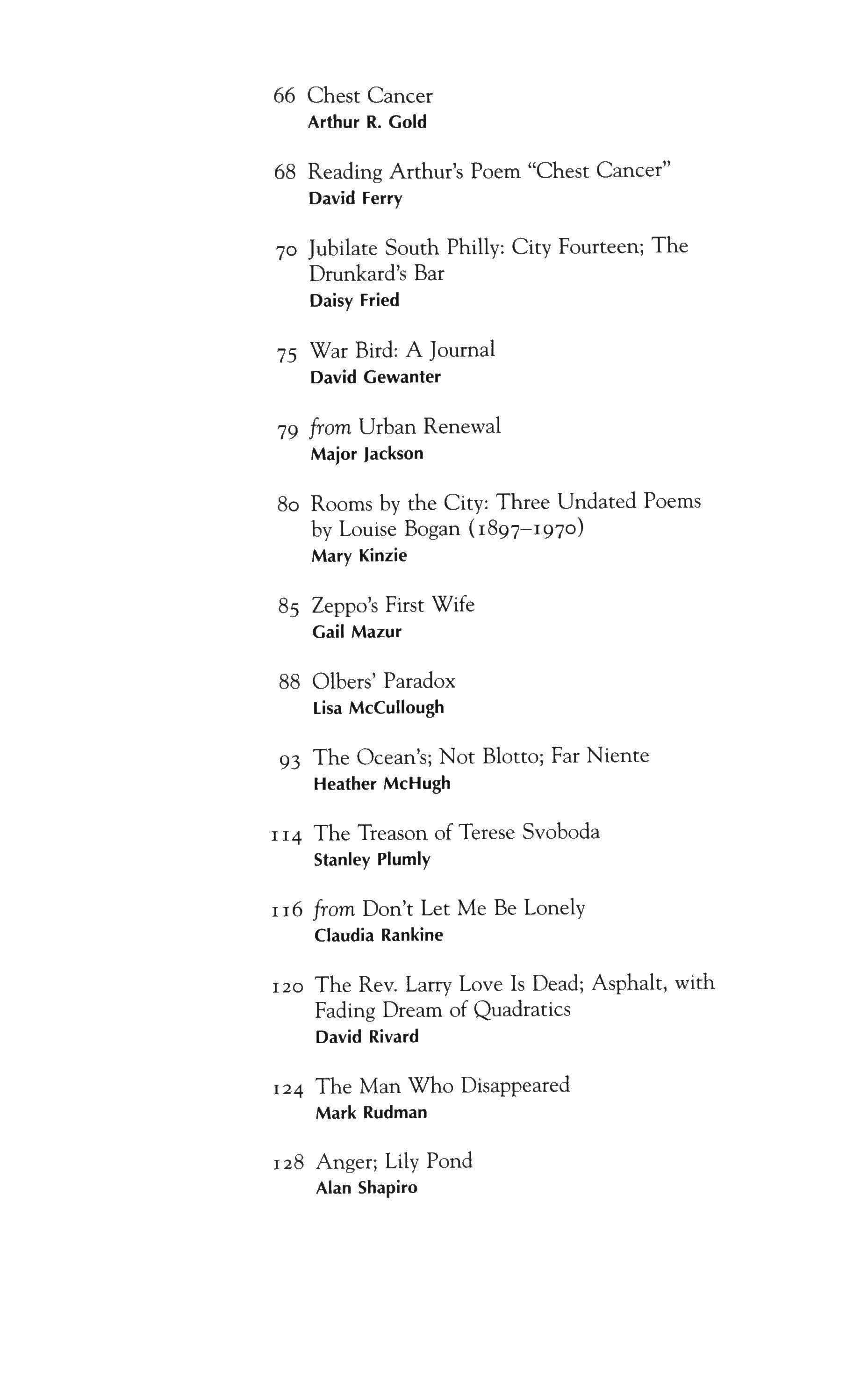
66 Chest Cancer
Arthur R. Gold
68 Reading Arthur's Poem "Chest Cancer"
David Ferry
70 Jubilate South Philly: City Fourteen; The Drunkard's Bar
Daisy Fried
75 War Bird: A Journal
David Gewanter
79 from Urban Renewal
Major Jackson
80 Rooms by the City: Three Undated Poems
by Louise Bogan (1897-1970)
Mary Kinzie
85 Zeppo's First Wife
Gail Mazur
88 Olbers' Paradox
lisa McCullough
93 The Ocean's; Not Blotto; Far Niente
Heather McHugh
114 The Treason of Terese Svoboda
Stanley Plumly
II6 from Don't Let Me Be Lonely
Claudia Rankine
120 The Rev. Larry Love Is Dead; Asphalt, with Fading Dream of Quadratics
David Rivard
124 The Man Who Disappeared
Mark Rudman
128 Anger; Lily Pond
Alan Shapiro

Jane Shore
The Mouth; Graffiti Tom Sleigh
Sweet Nothing Christian Wiman 202 The Grass Grower
Anne Winters
Public Law 94-344
John lucas
from The Year
Sarah Blake
The Wealth of the Dreams
Merle Collins
from Each in His Own Way
R. D. Skillings
Killing the Cat
Melanie Sumner
from Don't Forget Me
Howard Norman
Flag Code
J.T. Barbarese
I Lyric Thinking
Robert von Hallberg
Contributors Cover Photo: John lucas
photo
fiction memoir criticism
essay
135 The Mausoleum
149
194
97
23
49
137
152
108
105
7
I
207
Elizabeth Arnold
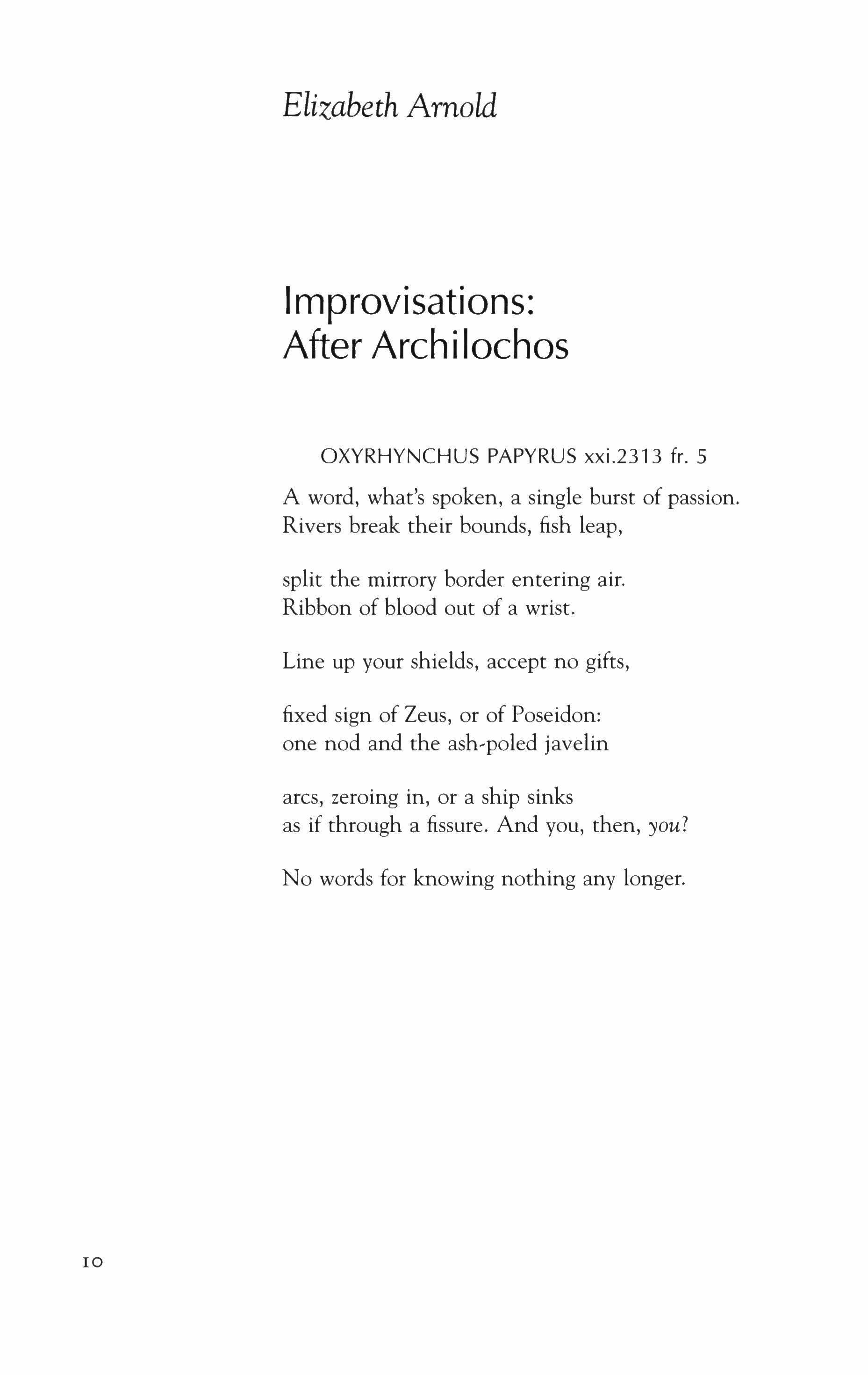
Improvisations: After Archilochos
OXYRHYNCHUS PAPYRUS xxi.2313 fr. 5
A word, what's spoken, a single burst of passion. Rivers break their bounds, fish leap,
split the mirrory border entering air. Ribbon of blood out of a wrist.
Line up your shields, accept no gifts, fixed sign of Zeus, or of Poseidon: one nod and the ash-poled javelin
arcs, zeroing in, or a ship sinks as if through a fissure. And you, then, you?
No words for knowing nothing any longer.
10
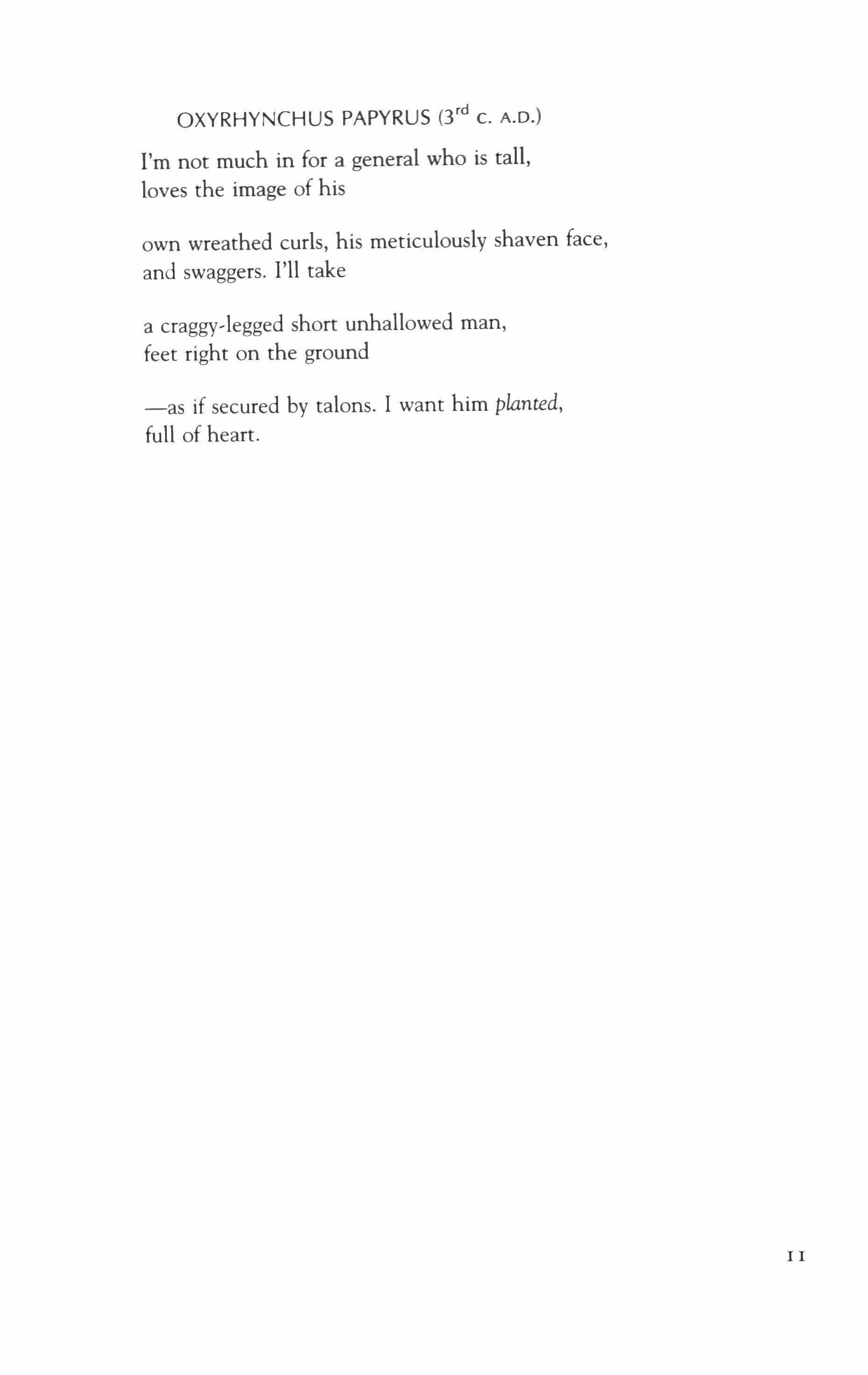
OXYRHYNCHUS PAPYRUS (3rd C. A.D.)
I'm not much in for a general who is tall, loves the image of his own wreathed curls, his meticulously shaven face, and swaggers. I'll take a craggy-legged short unhallowed man, feet right on the ground
-as if secured by talons. I want him planted, full of heart.
I I

OUT OF ATTICUS fr. 2 (p. 41 des Places)
See the prow of that high ridge? -sheer, punished
through and through as pumice stone like hardened foam?
There the sharp-eyed eagle sits ignoring your assault.
12
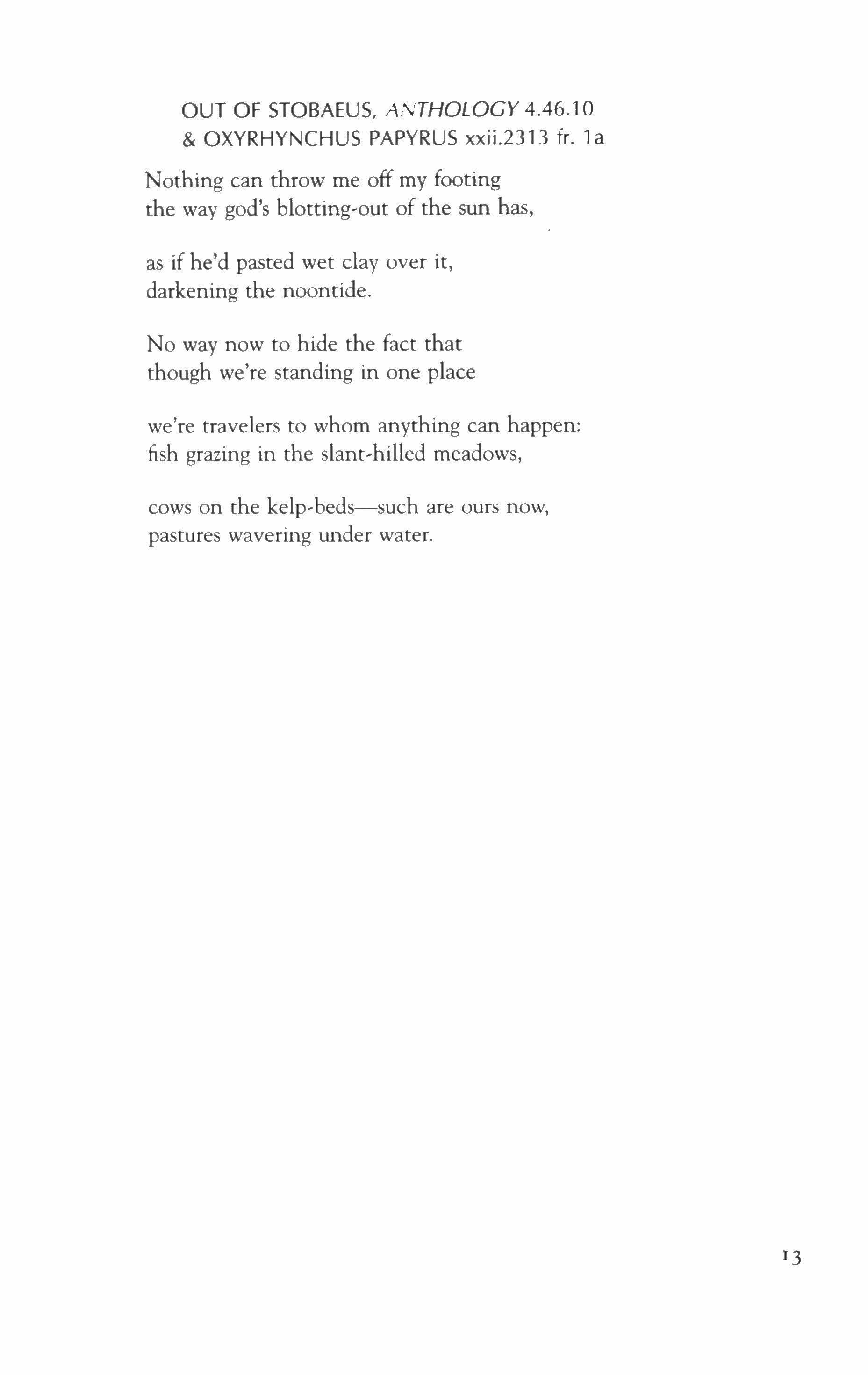
OUT OF STOBAEUS, A,\'THOLOGY 4.46.1 0 & OXYRHYNCHUS PAPYRUS xxii.2313 fro 1 a
Nothing can throw me off my footing the way god's blotting-out of the sun has,
as if he'd pasted wet clay over it, darkening the noontide.
No way now to hide the fact that though we're standing in one place
we're travelers to whom anything can happen: fish grazing in the slant-hilled meadows,
cows on the kelp-beds-c-such are ours now, pastures wavering under water.
13
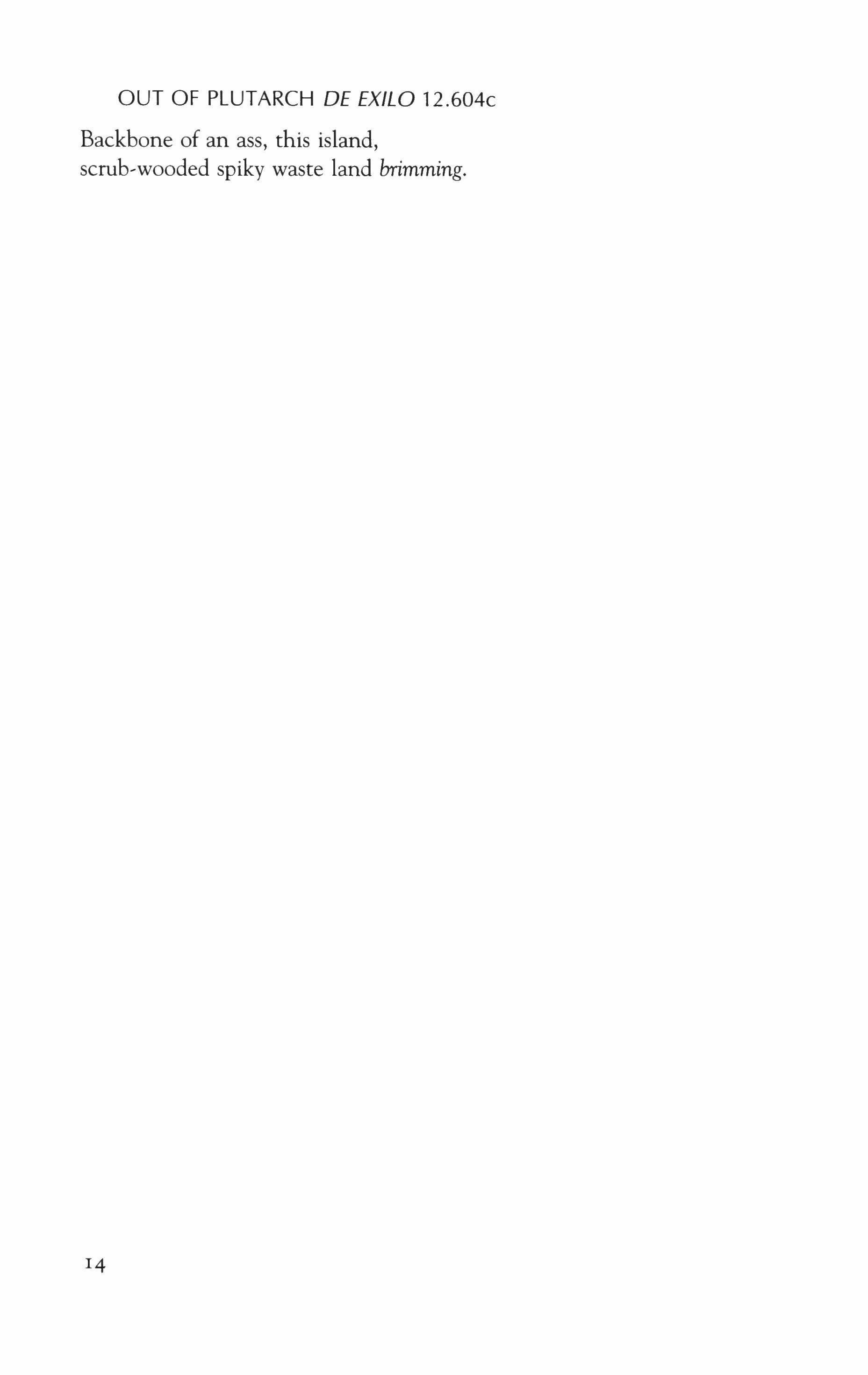
Backbone of an ass, this island, scrub-wooded spiky waste land brimming.
OUT OF PLUTARCH DE
12.604c
EX/La
14
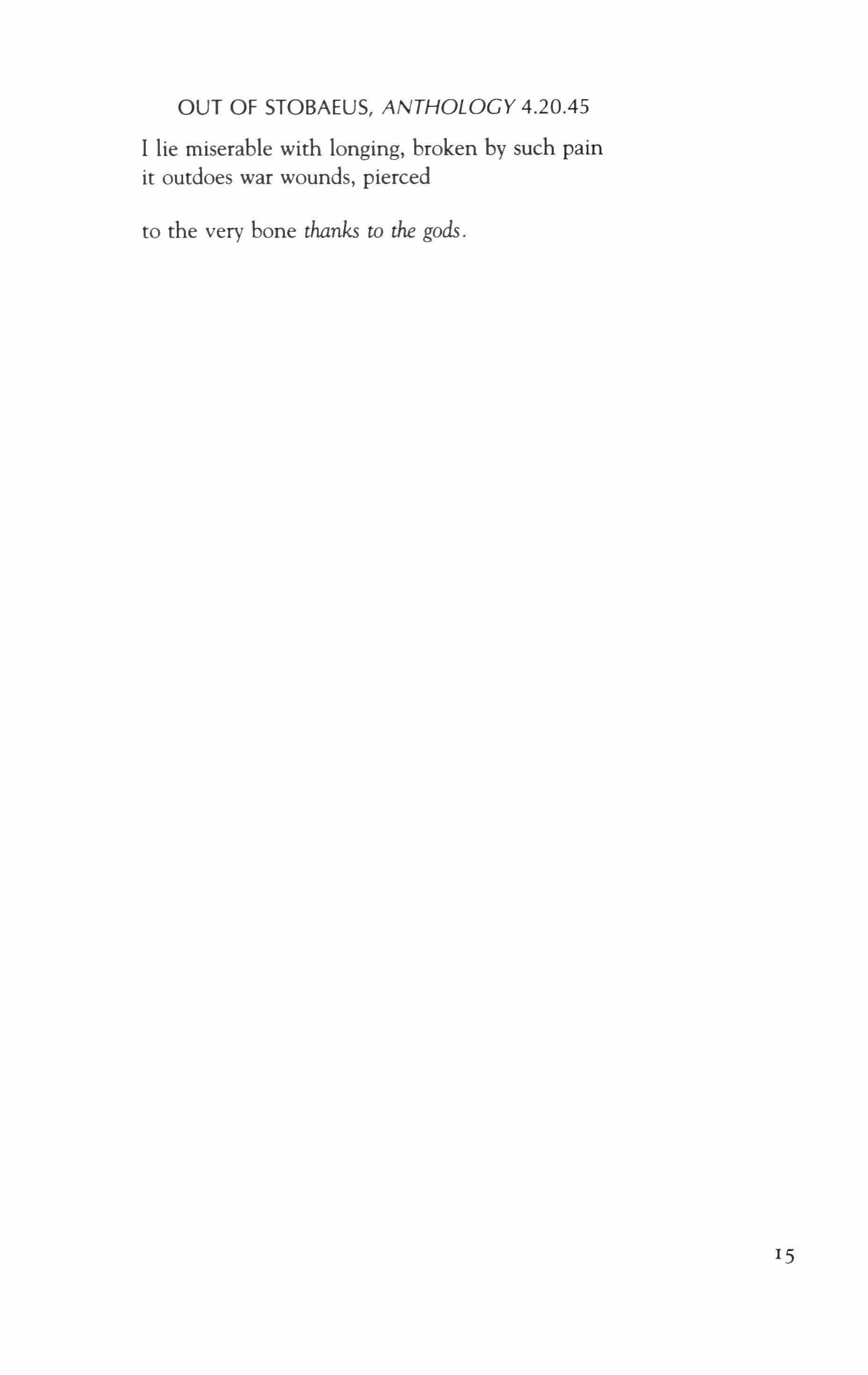
OUT OF STOBAEUS, ANTHOLOGY
4.20.45
I lie miserable with longing, broken by such pain it outdoes war wounds, pierced to the very bone thanks to the gods.
15
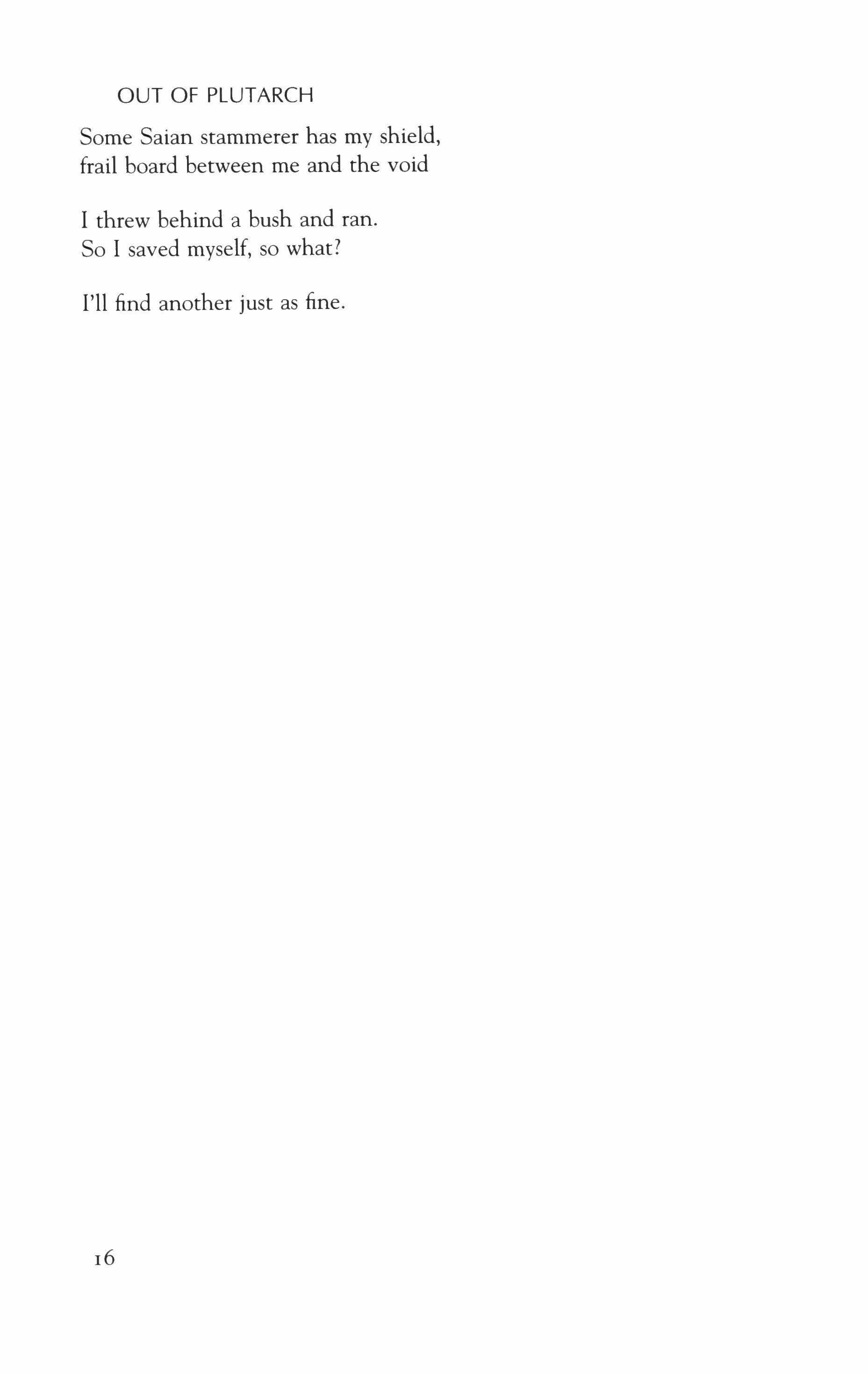
OUT OF PLUTARCH
Some Saian stammerer has my shield, frail board between me and the void
I threw behind a bush and ran. So I saved myself, so what?
I'll find another just as fine.
Rick Barot
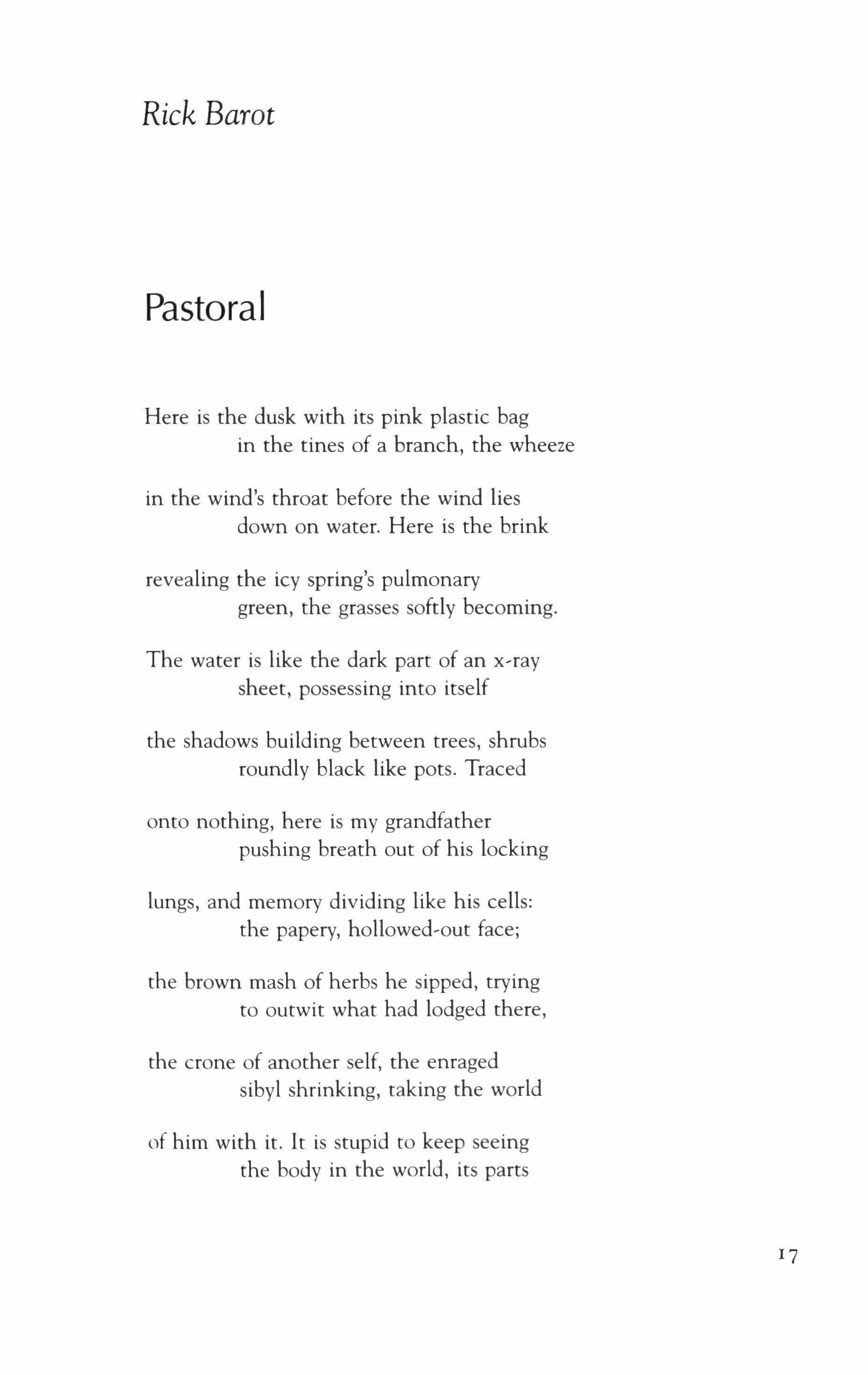
Pastoral
Here is the dusk with its pink plastic bag in the tines of a branch, the wheeze in the wind's throat before the wind lies down on water. Here is the brink revealing the icy spring's pulmonary green, the grasses softly becoming.
The water is like the dark part of an x-ray sheet, possessing into itself the shadows building between trees, shrubs roundly black like pots. Traced onto nothing, here is my grandfather pushing breath out of his locking lungs, and memory dividing like his cells: the papery, hollowed-out face; the brown mash of herbs he sipped, trying to outwit what had lodged there, the crone of another self, the enraged sibyl shrinking, taking the world of him with it. It is stupid to keep seeing the body in the world, its parts
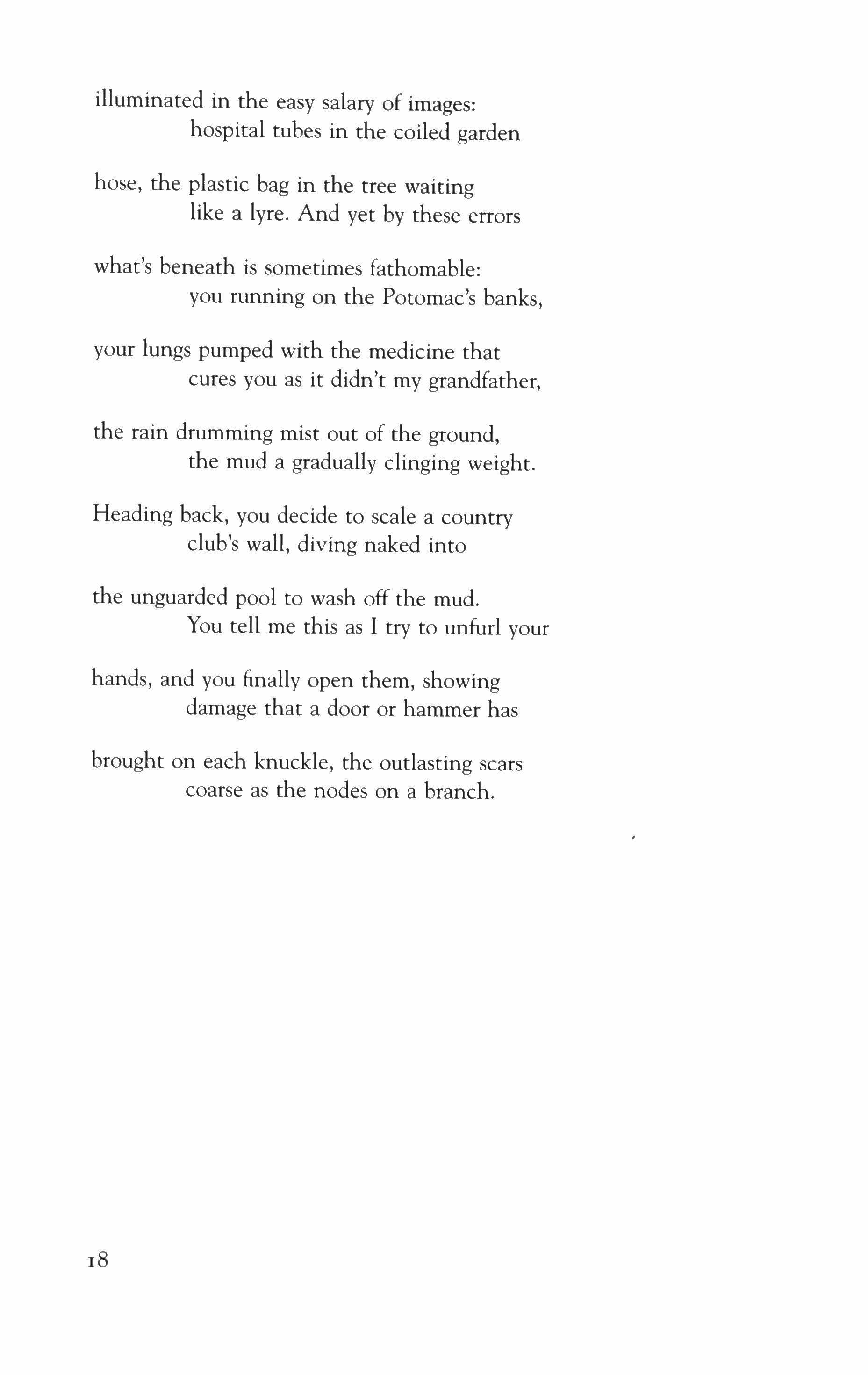
illuminated in the easy salary of images: hospital tubes in the coiled garden
hose, the plastic bag in the tree waiting like a lyre. And yet by these errors
what's beneath is sometimes fathomable: you running on the Potomac's banks, your lungs pumped with the medicine that cures you as it didn't my grandfather, the rain drumming mist out of the ground, the mud a gradually clinging weight.
Heading back, you decide to scale a country club's wall, diving naked into the unguarded pool to wash off the mud. You tell me this as I try to unfurl your hands, and you finally open them, showing damage that a door or hammer has brought on each knuckle, the outlasting scars coarse as the nodes on a branch.
Don Berger
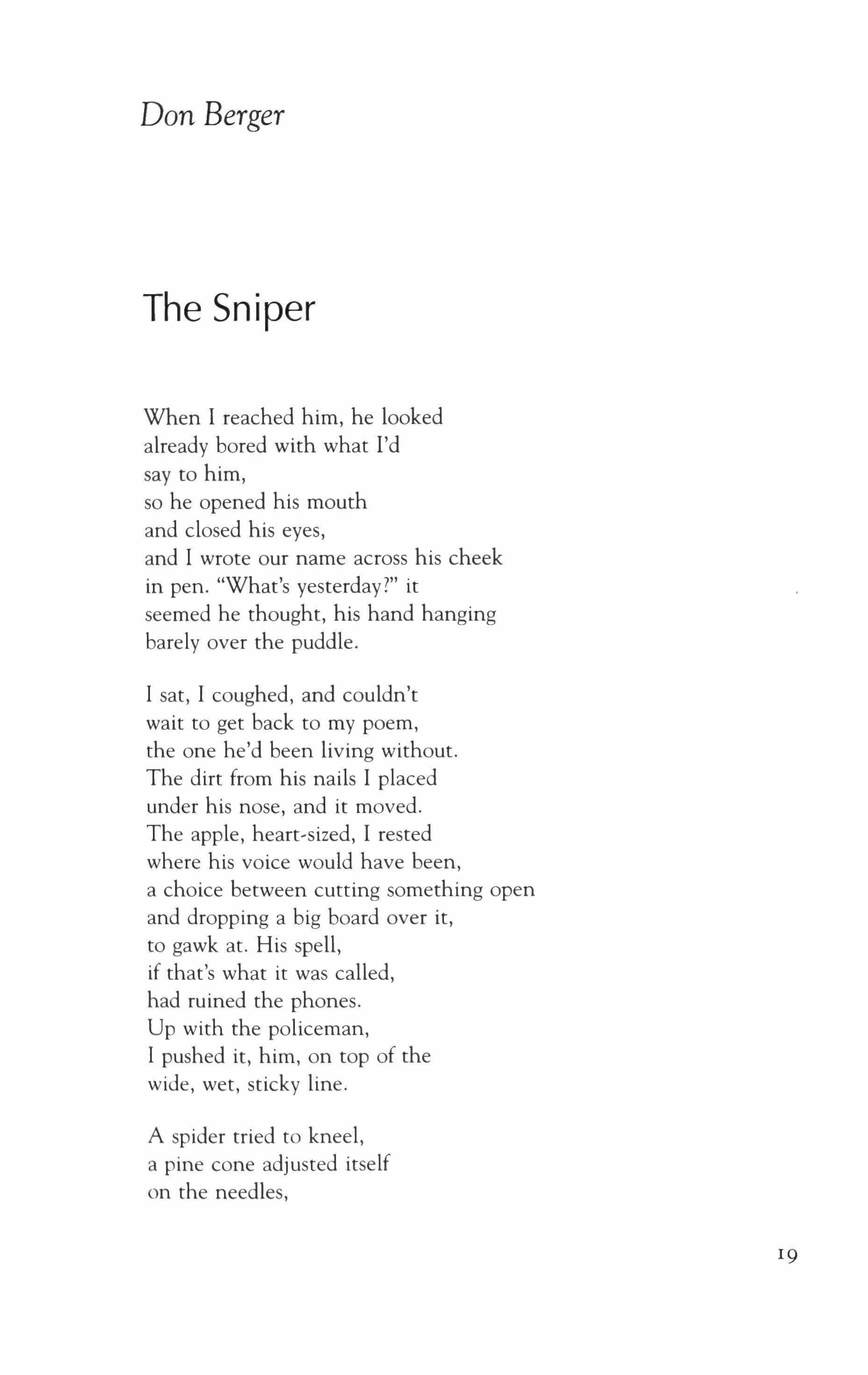
The Sniper
When I reached him, he looked already bored with what I'd say to him, so he opened his mouth and closed his eyes, and I wrote our name across his cheek in pen. "What's yesterday?" it seemed he thought, his hand hanging barely over the puddle.
I sat, I coughed, and couldn't wait to get back to my poem, the one he'd been living without. The dirt from his nails I placed under his nose, and it moved. The apple, heart-sized, I rested where his voice would have been, a choice between cutting something open and dropping a big board over it, to gawk at. His spell, if that's what it was called, had ruined the phones. Up with the policeman, I pushed it, him, on top of the wide, wet, sticky line.
A spider tried to kneel, a pine cone adjusted itself on the needles,
19
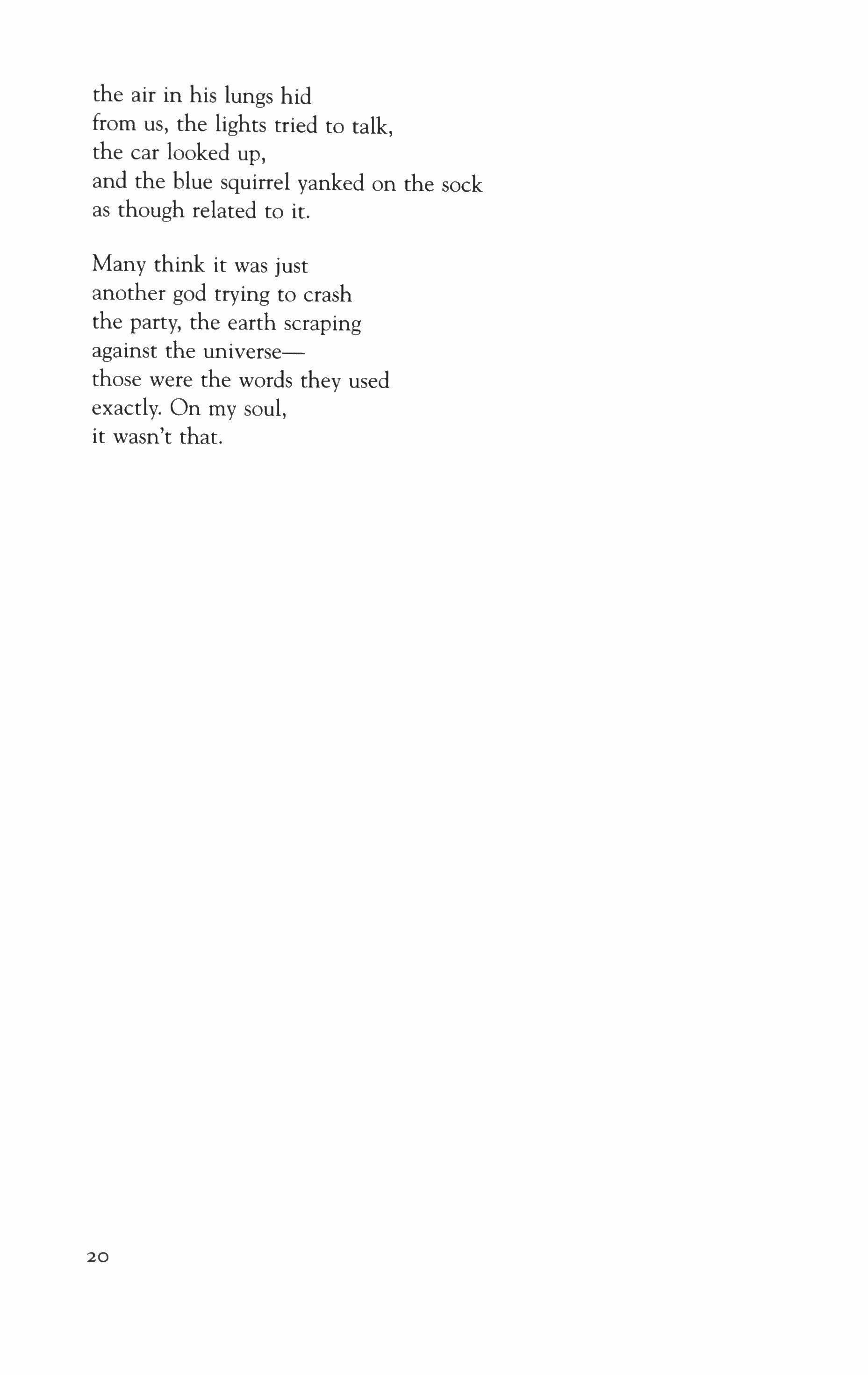
the air in his lungs hid from us, the lights tried to talk, the car looked up, and the blue squirrel yanked on the sock as though related to it.
Many think it was just another god trying to crash the party, the earth scraping against the universethose were the words they used exactly. On my soul, it wasn't that.
20
To Likes-to-Have-Fun

Horace taught me who not to sound like, How not to be great, infections on both heels And stupid, stupid to decry. It feels Weird, nothing for soft eggs, where the wing Used to be attached in the habitable region Around a star. We opened up the dictionary And it was the first word we saw. We read The definition and we liked it, A purple mylar balloon, a giant yellow Butterfly, rigged with sadness, and radical, Corporate, the fertile ground. It wasn't A question I had no answer for. There isn't A need for the lights on the dimmer. Give yourself
Three months, she said, the world isn't ready For you yet. I told myself, tell myself, I wouldn't use I, and she believed it, sitting on ads With our fingers crossed: "How to Enjoy Poetry So You Can't Forget Who I Am." Someday All those leaves might come back and don't Go skipping dinner just because you're not Here anymore. I saw Joan Allen, And last month, in "The Contender" She blew me away. A girl said to me, "I Did not finish my reading," and I answered "Slava, what are you doing, reading War And Peace?" And she was. And she was Russian, Too. To look up internalize and my role Slips through me I think: prose poetry from Now on, letters, websites that specialize in Sorting out truth from fiction. You are so Great that I can breathe through my ears When thinking of the night I saw with more Than my eyes this person who said in a minute She walked a lot, and the feeling when everything Shows its teeth's secret joy that's how hills
21

First arrived, you know, and your outfit that Included a scarf under the face to describe Different things all of them synonyms for Pulling off the tablecloth but leaving Nine tenths of the dishes, and all of the glasses, Long-stemmed and tumblers both. I knew So much less not to bounce it off the front door
And see who comes out, could not, thank god, Get a signature on the dirt there.
Now it's today, the mother of all days. Use it
When you want the earth to shake when you want To have a real effect, beautiful one.
22
Sarah Blake from The Year

August, 1941
War was coming. Everyone said it. But no one truly believed what they said. The heat which had been building all spring, the heat and the worry of waiting for Hitler's next move had burst into flame at last. Now that we could see it, it was, curiously, a relief. He was taking Russia. We half-listened to the unpronounceable names of cities and towns falling the way people listen to the names of medicine before they are taken ill themselves.
Outside the windows here, it was gulls and swallows dividing an undivided sky, the clear blue draped over a flat green sea, day after hot summer day. The trap boats were returning to the pier with fish so big caught in their weirs, the tail ends had to be sawed off and tucked inside the gutted bodies to fit the four foot boxes stacked and stapled and bound up Cape for the city markets. Summer people and sailors clogged the streets, and by seven o'clock signs were up in the cafe windows, saying NO MORE LOBSTER. NO MORE PIES. Joe Di Maggio had hit fifty-six straight, and England still stood. We drank, we smoked, we cheered the Yankees and the Brits.
And our boys were not going. Roosevelt had promised, twice. He spoke bluntly, as if he were one of us, but he wasn't, thank God, and
23
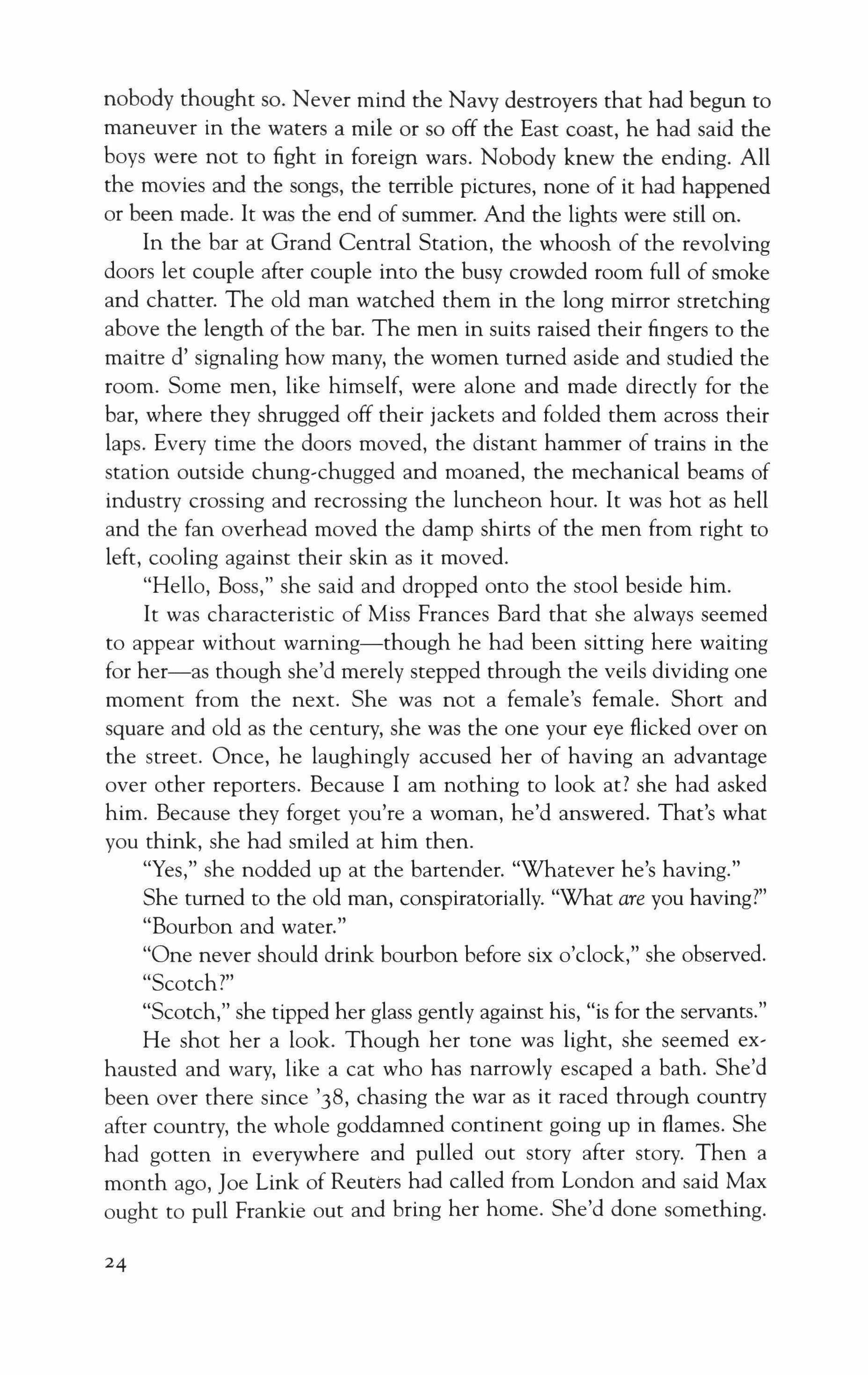
nobody thought so. Never mind the Navy destroyers that had begun to maneuver in the waters a mile or so off the East coast, he had said the boys were not to fight in foreign wars. Nobody knew the ending. All the movies and the songs, the terrible pictures, none of it had happened or been made. It was the end of summer. And the lights were still on.
In the bar at Grand Central Station, the whoosh of the revolving doors let couple after couple into the busy crowded room full of smoke and chatter. The old man watched them in the long mirror stretching above the length of the bar. The men in suits raised their fingers to the maitre d' signaling how many, the women turned aside and studied the room. Some men, like himself, were alone and made directly for the bar, where they shrugged off their jackets and folded them across their laps. Every time the doors moved, the distant hammer of trains in the station outside chung-chugged and moaned, the mechanical beams of industry crossing and recrossing the luncheon hour. It was hot as hell and the fan overhead moved the damp shirts of the men from right to left, cooling against their skin as it moved.
"Hello, Boss," she said and dropped onto the stool beside him.
It was characteristic of Miss Frances Bard that she always seemed to appear without warning-though he had been sitting here waiting for her-as though she'd merely stepped through the veils dividing one moment from the next. She was not a female's female. Short and square and old as the century, she was the one your eye flicked over on the street. Once, he laughingly accused her of having an advantage over other reporters. Because I am nothing to look at? she had asked him. Because they forget you're a woman, he'd answered. That's what you think, she had smiled at him then.
"Yes," she nodded up at the bartender. "Whatever he's having."
She turned to the old man, conspiratorially. "What are you having?"
"Bourbon and water."
"One never should drink bourbon before six o'clock," she observed. "Scotch?"
"Scotch," she tipped her glass gently against his, "is for the servants."
He shot her a look. Though her tone was light, she seemed exhausted and wary, like a cat who has narrowly escaped a bath. She'd been over there since '38, chasing the war as it raced through country after country, the whole goddamned continent going up in flames. She had gotten in everywhere and pulled out story after story. Then a month ago, Joe Link of Reuters had called from London and said Max ought to pull Frankie out and bring her home. She'd done something.
24
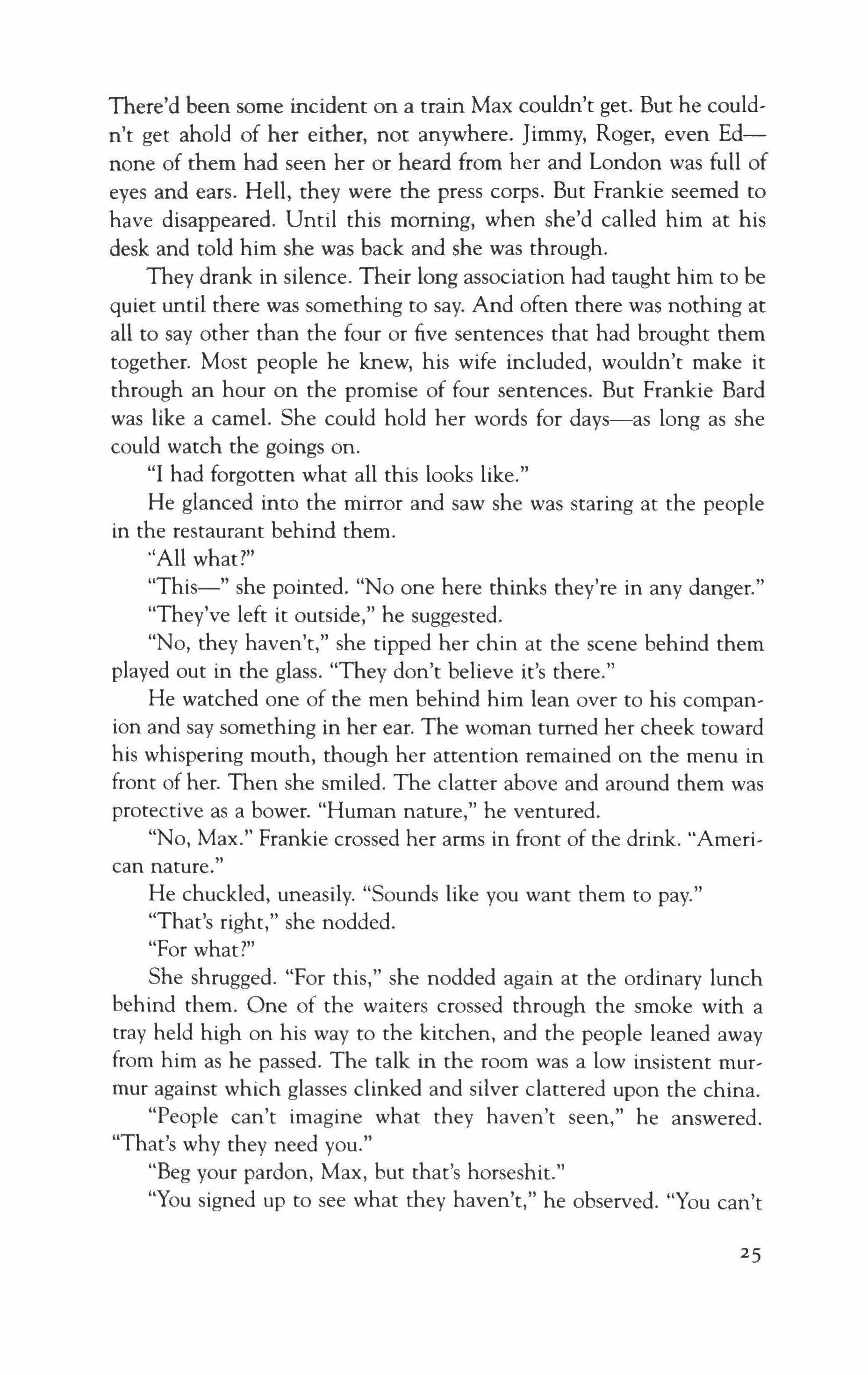
There'd been some incident on a train Max couldn't get. But he could, n't get ahold of her either, not anywhere. Jimmy, Roger, even Ednone of them had seen her or heard from her and London was full of eyes and ears. Hell, they were the press corps. But Frankie seemed to have disappeared. Until this morning, when she'd called him at his desk and told him she was back and she was through.
They drank in silence. Their long association had taught him to be quiet until there was something to say. And often there was nothing at all to say other than the four or five sentences that had brought them together. Most people he knew, his wife included, wouldn't make it through an hour on the promise of four sentences. But Frankie Bard was like a camel. She could hold her words for days-as long as she could watch the goings on.
"I had forgotten what all this looks like."
He glanced into the mirror and saw she was staring at the people in the restaurant behind them.
"All what?"
"This-" she pointed. "No one here thinks they're in any danger."
"They've left it outside," he suggested.
"No, they haven't," she tipped her chin at the scene behind them played out in the glass. "They don't believe it's there."
He watched one of the men behind him lean over to his companion and say something in her ear. The woman turned her cheek toward his whispering mouth, though her attention remained on the menu in front of her. Then she smiled. The clatter above and around them was protective as a bower. "Human nature," he ventured.
"No, Max." Frankie crossed her arms in front of the drink. "Arnerican nature."
He chuckled, uneasily. "Sounds like you want them to pay."
"That's right," she nodded.
"For what?"
She shrugged. "For this," she nodded again at the ordinary lunch behind them. One of the waiters crossed through the smoke with a tray held high on his way to the kitchen, and the people leaned away from him as he passed. The talk in the room was a low insistent murmur against which glasses clinked and silver clattered upon the china.
"People can't imagine what they haven't seen," he answered. "That's why they need you."
"Beg your pardon, Max, but that's horseshit."
"You signed up to see what they haven't," he observed. "You can't

blame people for it."
"Why in hell you think I'm quitting?" she asked, coolly.
"Hell of a year to quit," he fired back.
She finished her drink. The bartender sidled down the length of the bar, his approach the question. The old man nodded without looking at him. Frankie was one of the best of the women war correspondents, mentioned in the same breath as Margaret Bourke-White and Martha Gellhorn. Privately, he'd have argued she was one of the best, period.
"Take a break," he said.
She shook her head. "I want to get off the bus."
"It's the only story there is, Frankie."
"Hell it is," she answered.
"I don't get it."
She shrugged and kept her eyes on the mirror. "Maybe I'm not up to telling it."
"That's bull, and you know it." The old man thrust out his chin. Frankie didn't answer.
"I used to think you wrote a story like a hunter threw a spear," she said after a while. "You aimed. You drew back your arm and then you hurled and it landed."
She seemed to him, just then, like someone pointing out the view from the edge of a cliff. She was almost gay. He watched her, helpless.
"You know why it landed-why it mattered?"
He shook his head.
"Because of God."
"God?"
"It mattered because I thought someone was up there watching, holding the whole thing together." She shook her head. "Can you beat that? It turns out I believed in God."
He sat quite still, not wanting to frighten her, as if not only she, but he too, stood at the edge of some grave drop.
"But if it's only luck up there-if there is no God-then nothing matters. Words flutter up into the ether and float back down. The end and the beginning, the middle, no matter."
She had jumped, she had jumped, and he couldn't reach an arm to grab her. She turned her head away from the mirror and back to him, and he felt her eyes on him before he turned to look at her. "I've seen enough, Max. It is only luck up there. That's all I have to write. Nobody should read that."
He sighed. She stared aside at the perfect patrician line of his pro-

file, the line that caused the girls in the secretary pool to call him the Yankee Clipper behind his back, and then turned away. He looked at her. "OK," he said, seeing she had begun to cry.
"OK?' She pushed away the handkerchief he offered her, and wiped her eyes with her fingertips. "OK?" she repeated almost laugh, ing, and then she gave up and covered'her face with her hands.
Someone's joke rose in the background and hit its mark, and the sudden tremendous burst of laughter fell down around the room like rain. Frankie turned around on her stool wiping her eyes and caught sight of a woman entering the bar on the crest of that laughter with the grace and self-consciousness of a creature just released from its cage. She was lithe and bare-armed and her skirt skimmed just above her tanned legs as she moved. Max turned around also, and the two of them watched the woman sit down and lean her elbows upon the table-languorous, hot-and rest her chin on her hands, her long bare arms folding into two soft hooks.
"Do me a favor," he said, "go out to the Island, or the Jersey Shore, somewhere closer. "
That brought a little smile. "It's only Massachusetts, Max."
"But that town's full of fairies."
She tipped her empty glass against his. "I like fairies."
He grunted.
She leaned over and kissed him on the cheek, old man who had taught her everything she knew. He raised his hand but didn't look at her-he was finished. He was tired. Then as soon as she was gone, he wanted her back and swiveled to call after her. But she had taken off swift as a bird and was making her way, here and there through the tables, tiny, crooked and electric. He let her go. She had seen everything. She had been the one under him who had seen it all-Poland, the Blitz, the fall of Paris. And she had sent it back to them at their desks and she had made them look it directly in the eye. Whatever the hell that meant. He signaled the bar man for the tab. Nothing could be looked at directly in the eye, and he knew it. He looked up at the mirror over the bar and the dress whites scattered among the tables had the effect of a field of cotton lit up by the weird wild light that always precedes a storm.
-c-

Inside the station there were soldiers and women, fixed in attitudes of hurrying and waiting, the waiting room full of boys being sent all over the country on buses and trains, their olive drab backs leaning over books and maps, sprawled in the too tight seats moving from New York to Omaha. Tennessee. Georgia. The Carolinas. As this was the earlyafternoon train out of the city, there was little to be loaded, and Frankie turned back around to watch the crowd. The steady human conversation thrumming around her, punctuated by shouts, arched up into the marbled domes of the station's ceiling where the gathered sound bowled before dropping back down. She leaned against the wrought-iron gate separating the tracks from the station and closed her eyes. It was the purest kind of song to her, this anonymous unintelligible murmur, this chaos of voices set loose and sent high. She opened her eyes and gazed up at the clock where the hand stitched second to second toward the top. What she saw before her in the station was merely what she saw. Boxes and slants. The green shunts of summer lilies stuck in a pot by the ticket booth. And she a woman of middleage, only. Nothing to look at, nothing to see. And nothing to report. It was a nearly unbearable pleasure.
At Nauset, Frankie descended the New York train and walked the four blocks through the central town on the Cape, sullen in the late afternoon heat, to the bus for Franklin. Mr. Flores sat in the shade cast by the bus and pushed himself up onto his feet, ambling forward to take her bag.
"Hello, Miss Bard. Good trip down?"
"Yes, thanks."
He nodded and pointed her toward the bus's open door. Frankie pulled herself up the three short stairs and into the bus. The others looked up at her as she appeared in the aisle, looking without looking, in the manner of travelers. She noted a foreign couple, several women sitting alone, and an assortment of men all clustered round Flores at the front of the bus. Frankie nodded and made her way towards the back. One young woman had her head in a thick book, the curve of her neck laid bare as her hair swept forward. She had not looked up at Frankie, and didn't stir as Frankie passed her by. Mr. Flores swung himself into his seat, and the engine roared into life, shaking the floor under Frankie's feet.
They left Nauset, and swept through the villages without post offices along the dunes under the eyes of the men sitting in the porches, breaking off conversation to stare as the bus slid past. Self-styled
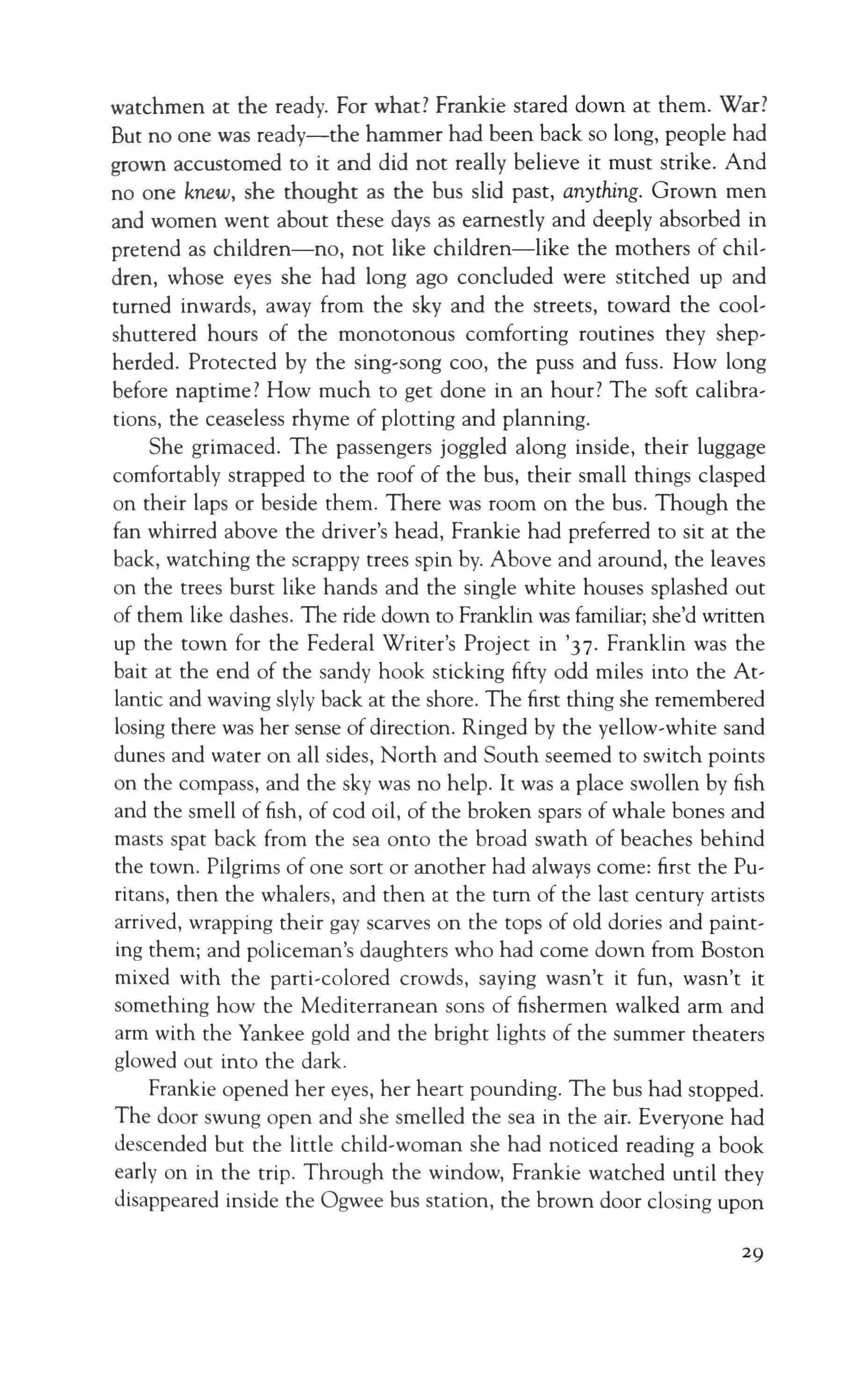
watchmen at the ready. For what? Frankie stared down at them. War? But no one was ready-the hammer had been back so long, people had grown accustomed to it and did not really believe it must strike. And no one knew, she thought as the bus slid past, anything. Grown men and women went about these days as earnestly and deeply absorbed in pretend as children-no, not like children-like the mothers of children, whose eyes she had long ago concluded were stitched up and turned inwards, away from the sky and the streets, toward the coolshuttered hours of the monotonous comforting routines they shepherded. Protected by the sing-song coo, the puss and fuss. How long before naptime? How much to get done in an hour? The soft calibrations, the ceaseless rhyme of plotting and planning.
She grimaced. The passengers joggled along inside, their luggage comfortably strapped to the roof of the bus, their small things clasped on their laps or beside them. There was room on the bus. Though the fan whirred above the driver's head, Frankie had preferred to sit at the back, watching the scrappy trees spin by. Above and around, the leaves on the trees burst like hands and the single white houses splashed out of them like dashes. The ride down to Franklin was familiar; she'd written up the town for the Federal Writer's Project in '37. Franklin was the bait at the end of the sandy hook sticking fifty odd miles into the Atlantic and waving slyly back at the shore. The first thing she remembered losing there was her sense of direction. Ringed by the yellow-white sand dunes and water on all sides, North and South seemed to switch points on the compass, and the sky was no help. It was a place swollen by fish and the smell of fish, of cod oil, of the broken spars of whale bones and masts spat back from the sea onto the broad swath of beaches behind the town. Pilgrims of one sort or another had always come: first the Puritans, then the whalers, and then at the tum of the last century artists arrived, wrapping their gay scarves on the tops of old dories and painting them; and policeman's daughters who had come down from Boston mixed with the patti-colored crowds, saying wasn't it fun, wasn't it something how the Mediterranean sons of fishermen walked arm and arm with the Yankee gold and the bright lights of the summer theaters glowed out into the dark.
Frankie opened her eyes, her heart pounding. The bus had stopped. The door swung open and she smelled the sea in the air. Everyone had descended but the little child-woman she had noticed reading a book early on in the trip. Through the window, Frankie watched until they disappeared inside the Ogwee bus station, the brown door closing upon
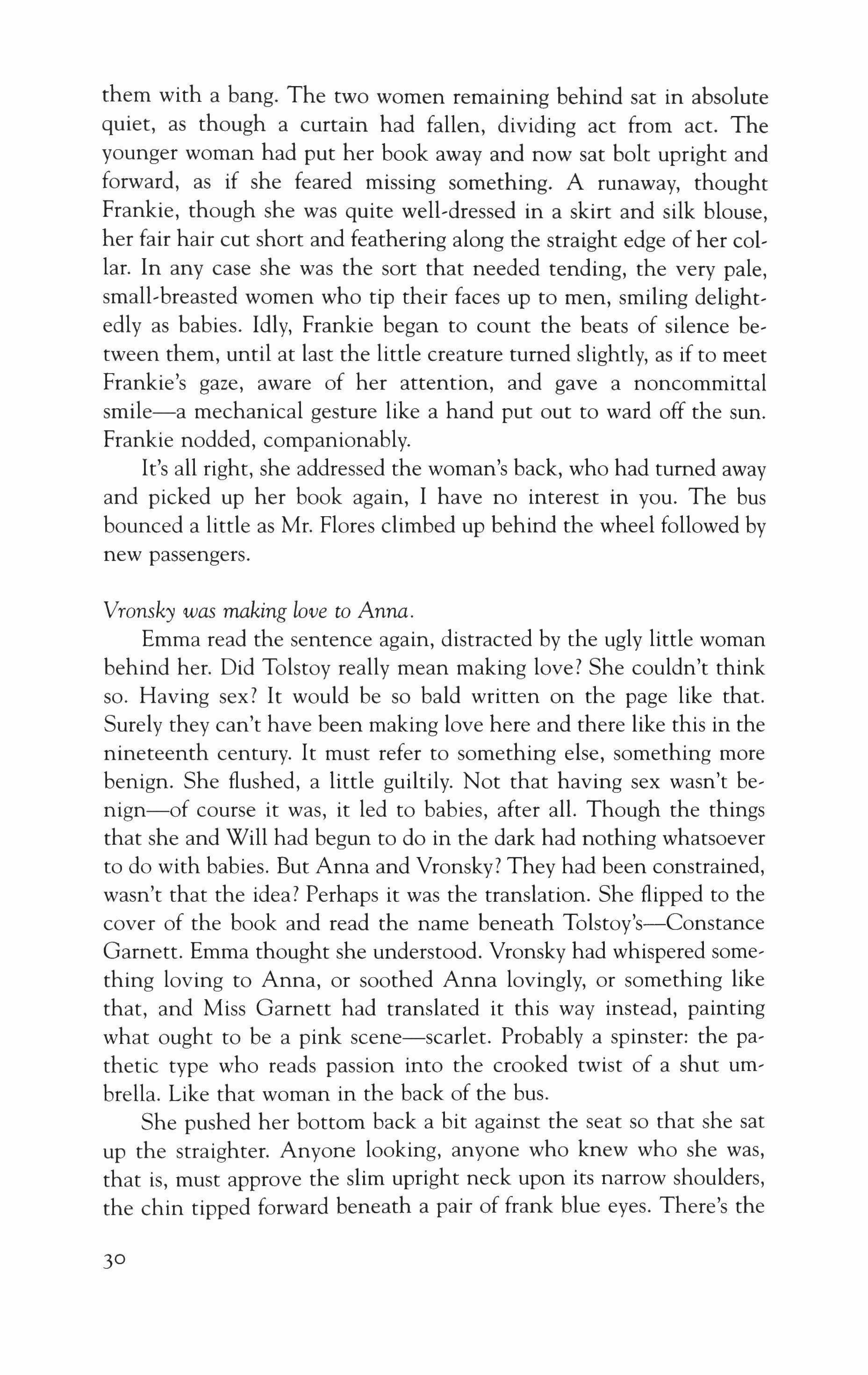
them with a bang. The two women remaining behind sat in absolute quiet, as though a curtain had fallen, dividing act from act. The younger woman had put her book away and now sat bolt upright and forward, as if she feared missing something. A runaway, thought Frankie, though she was quite well-dressed in a skirt and silk blouse, her fair hair cut short and feathering along the straight edge of her col, lar. In any case she was the sort that needed tending, the very pale, small,breasted women who tip their faces up to men, smiling delight, edly as babies. Idly, Frankie began to count the beats of silence be, tween them, until at last the little creature turned slightly, as if to meet Frankie's gaze, aware of her attention, and gave a noncommittal smile-a mechanical gesture like a hand put out to ward off the sun. Frankie nodded, companionably.
It's all right, she addressed the woman's back, who had turned away and picked up her book again, I have no interest in you. The bus bounced a little as Mr. Flores climbed up behind the wheel followed by new passengers.
Vronsky was making love to Anna.
Emma read the sentence again, distracted by the ugly little woman behind her. Did Tolstoy really mean making love? She couldn't think so. Having sex? It would be so bald written on the page like that. Surely they can't have been making love here and there like this in the nineteenth century. It must refer to something else, something more benign. She flushed, a little guiltily. Not that having sex wasn't be, nign-of course it was, it led to babies, after all. Though the things that she and Will had begun to do in the dark had nothing whatsoever to do with babies. But Anna and Vronsky? They had been constrained, wasn't that the idea? Perhaps it was the translation. She flipped to the cover of the book and read the name beneath Tolstoy's-Constance Garnett. Emma thought she understood. Vronsky had whispered some' thing loving to Anna, or soothed Anna lovingly, or something like that, and Miss Garnett had translated it this way instead, painting what ought to be a pink scene-scarlet. Probably a spinster: the pathetic type who reads passion into the crooked twist of a shut urn' brella. Like that woman in the back of the bus.
She pushed her bottom back a bit against the seat so that she sat up the straighter. Anyone looking, anyone who knew who she was, that is, must approve the slim upright neck upon its narrow shoulders, the chin tipped forward beneath a pair of frank blue eyes. There's the
30
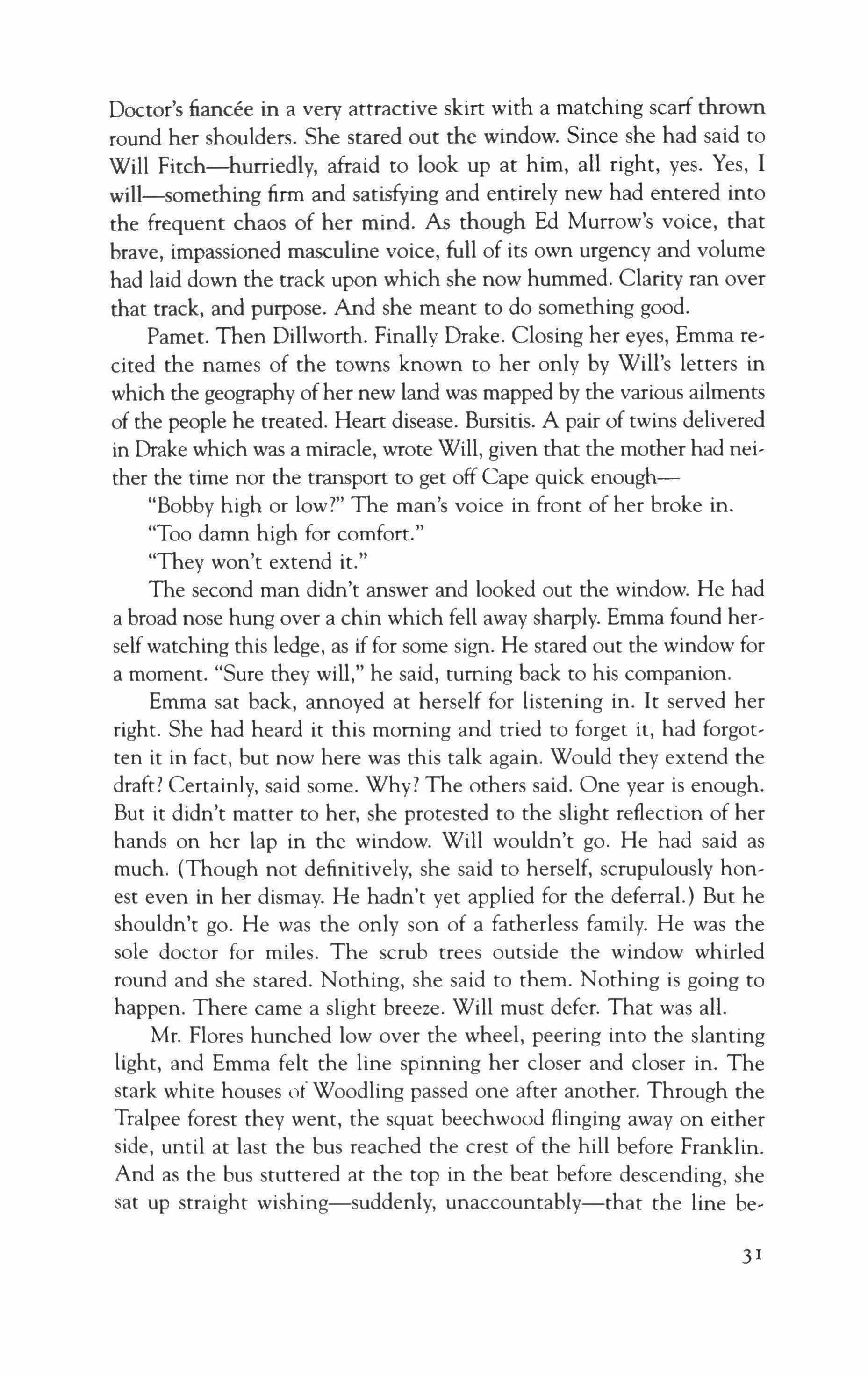
Doctor's fiancee in a very attractive skirt with a matching scarf thrown round her shoulders. She stared out the window. Since she had said to Will Fitch-hurriedly, afraid to look up at him, all right, yes. Yes, I will-something firm and satisfying and entirely new had entered into the frequent chaos of her mind. As though Ed Murrow's voice, that brave, impassioned masculine voice, full of its own urgency and volume had laid down the track upon which she now hummed. Clarity ran over that track, and purpose. And she meant to do something good. Pamet. Then Dillworth. Finally Drake. Closing her eyes, Emma recited the names of the towns known to her only by Will's letters in which the geography ofher new land was mapped by the various ailments of the people he treated. Heart disease. Bursitis. A pair of twins delivered in Drake which was a miracle, wrote Will, given that the mother had neither the time nor the transport to get off Cape quick enough"Bobby high or low?" The man's voice in front of her broke in. "Too damn high for comfort."
"They won't extend it."
The second man didn't answer and looked out the window. He had a broad nose hung over a chin which fell away sharply. Emma found herself watching this ledge, as if for some sign. He stared out the window for a moment. "Sure they will," he said, turning back to his companion.
Emma sat back, annoyed at herself for listening in. It served her right. She had heard it this morning and tried to forget it, had forgotten it in fact, but now here was this talk again. Would they extend the draft? Certainly, said some. Why? The others said. One year is enough. But it didn't matter to her, she protested to the slight reflection of her hands on her lap in the window. Will wouldn't go. He had said as much. (Though not definitively, she said to herself, scrupulously honest even in her dismay. He hadn't yet applied for the deferral.) But he shouldn't go. He was the only son of a fatherless family. He was the sole doctor for miles. The scrub trees outside the window whirled round and she stared. Nothing, she said to them. Nothing is going to happen. There came a slight breeze. Will must defer. That was all.
Mr. Flores hunched low over the wheel, peering into the slanting light, and Emma felt the line spinning her closer and closer in. The stark white houses of Woodling passed one after another. Through the Tralpee forest they went, the squat beechwood flinging away on either side, until at last the bus reached the crest of the hill before Franklin. And as the bus stuttered at the top in the beat before descending, she sat up straight wishing-suddenly, unaccountably-that the line be-
31

tween her and the town would snap. Mr. Flores's fist paused above the gearshift. The dunes spread wide around them.
For a brief instant Emma felt they might fly. The sky through the broad front window called. And she nearly stood up in her seat imagining herself able to continue straight, the road falling away as the bus rode forward into the illimitable air. But the gears caught, and the bus shuddered down into the high hills of sand. Down they rode until the tarmac pulled free of the dunes and curved toward the sea, jogging alongside the gray harbor into Franklin.
Franklin, Massachusetts was not a town of whimsy. She saw that right away. The two roads, one leading toward, one leading away, followed the bend of the coastline and most of the houses were strictly set down along those roads. There were others that followed neither the pattern of necessity or practicality, but seemed built for a view. The wide picture windows of these houses framed a gauntlet of open stares. Unruffled, the bus churtled past, the stark lines of the tar roofs triangling into the early summer evening. The flag snapped in the wind above the steep pitch of the post office, and the bus slowed to a crawl as Mr. Flores negotiated the narrow street shared now with people walking, hallooing to the bus, on bicycles spinning alongside.
Emma put her hand out upon the back of the driver's seat to steady herself, a flush rising in the hollow of her throat. She had prided herself on how quickly she would get the names of all the townspeople, showing off her knowledge to Will, whom she imagined would return every night as if to a theater of her making, delighting to find himself in his familiar town, revealed and illumined now by Emma's perceptions. Emma meant to be an asset to him in this way. He would be the best doctor, because his probes need not be blind.
But the flesh was a different matter. Arriving, as she had, straight into the center of the town, the slightness of her imagination struck her full force. For here they all were already. Two women in conversation on the comer broke off to stare as the bus pulled to its stop. The town was not waiting to start up with her arrival. The town was clearly already itself-without her. There was a tall man standing with his back to the bright white doors of what looked to be Town Hall, not staring so much as appraising the bus. Her heart tripped faintly, feeling all the secrets around her, all the plots. She sat still in her seat for a moment, collecting her gloves, marshaling the courage to find Will in the crowd, certain he was just there on the other side of the bus waiting with that impatient exacting smile of his. The aggressive little
32
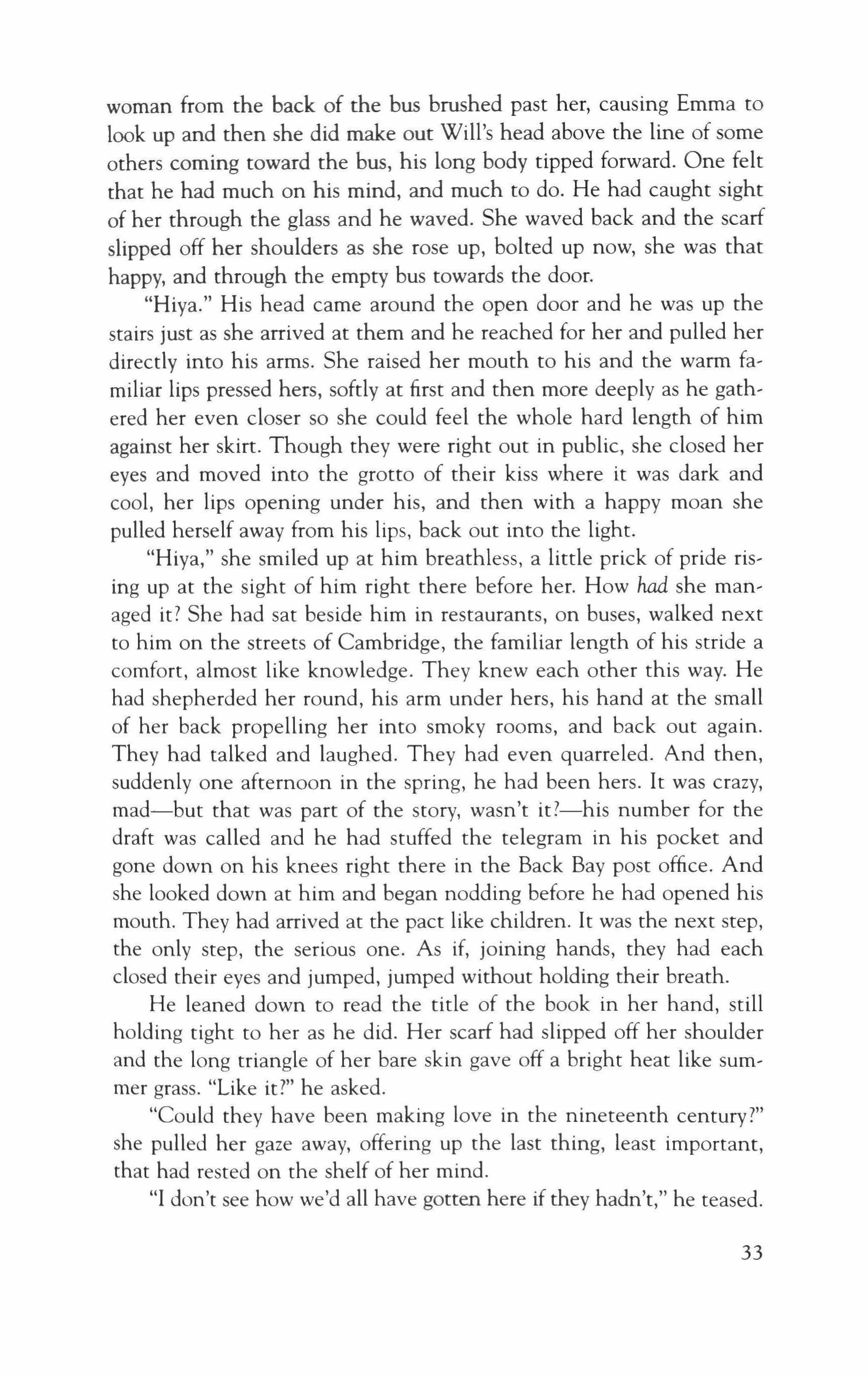
woman from the back of the bus brushed past her, causing Emma to look up and then she did make out Will's head above the line of some others coming toward the bus, his long body tipped forward. One felt that he had much on his mind, and much to do. He had caught sight of her through the glass and he waved. She waved back and the scarf slipped off her shoulders as she rose up, bolted up now, she was that happy, and through the empty bus towards the door.
"Hiva." His head came around the open door and he was up the stairs just as she arrived at them and he reached for her and pulled her directly into his arms. She raised her mouth to his and the warm familiar lips pressed hers, softly at first and then more deeply as he gathered her even closer so she could feel the whole hard length of him against her skirt. Though they were right out in public, she closed her eyes and moved into the grotto of their kiss where it was dark and cool, her lips opening under his, and then with a happy moan she pulled herself away from his lips, back out into the light.
"Hiya," she smiled up at him breathless, a little prick of pride rising up at the sight of him right there before her. How had she managed it? She had sat beside him in restaurants, on buses, walked next to him on the streets of Cambridge, the familiar length of his stride a comfort, almost like knowledge. They knew each other this way. He had shepherded her round, his arm under hers, his hand at the small of her back propelling her into smoky rooms, and back out again. They had talked and laughed. They had even quarreled. And then, suddenly one afternoon in the spring, he had been hers. It was crazy, mad-but that was part of the story, wasn't it?-his number for the draft was called and he had stuffed the telegram in his pocket and gone down on his knees right there in the Back Bay post office. And she looked down at him and began nodding before he had opened his mouth. They had arrived at the pact like children. It was the next step, the only step, the serious one. As if, joining hands, they had each closed their eyes and jumped, jumped without holding their breath.
He leaned down to read the title of the book in her hand, still holding tight to her as he did. Her scarf had slipped off her shoulder and the long triangle of her bare skin gave off a bright heat like summer grass. "Like it?" he asked.
"Could they have been making love in the nineteenth century?" she pulled her gaze away, offering up the last thing, least important, that had rested on the shelf of her mind.
"I don't see how we'd all have gotten here if they hadn't," he teased.
33

"No, no. Look." She opened the book right there on the top step of the bus and rippled through the pages, sharply aware of his eyes on her shoulders and arms. They had kissed. They had touched each other through layers of silk and wool. Through jackets and trousers and blouses and skirts. There had been nothing more, but his eyes might as well have been hands, her skin prickling and flushing as he put his foot on the stair next to hers and the hem of his jacket slid open. "There," she pointed.
He looked down and read, "Vronsky was making love-" "It's so naked," she said and then blushed, "to say it like that."
He pressed against her. "Like what?"
"On the page. Wouldn't the readers have been shocked? I am."
"You are not," he whispered.
"I am," she giggled, leaning her shoulder into his. "I really am. A modern reader."
"Everyone understood it to mean something else." "Sex?"
"Courting," he answered, his smile lighting up the impossible inches between them.
"Oh," she sighed happily. "Well, you would know."
"Come on," he put his hand under her elbow to draw her down the stairs. "Let's go home."
Through the open door, they saw a suitcase had sailed off the busman's hook, flying for a moment in the air until it crashed down and split upon the ground, cracking open upon the sidewalk neat as a tapped egg.
"Oh!" cried Emma.
There was a full moment of quiet. Will stopped where he was at the door of the bus, staring down at the voluptuous explosion of what must be Em's underthings cascading over the popped sides of the case upon the pavement before him. They were numerous, silky, and a twilit blue, tossed and flung in a delirious striptease, showing themselves like sirens. He'd never seen the color of her things in the daylight. He squeezed Emma's hand tucked in his behind his back.
With a garbled stab at an apology, the bus driver disappeared around the back of the bus.
"No one else saw," Will said to her, "I'll step around and help Flores. That'll give you a minute." Emma nodded, letting go of his hand and slipped off the last of the bus stairs onto the pavement. She had to fight the urge to fling herself onto the smashed case and cover the strewn clothing with her body, but that woman from the bus was leaning against the railing on the pavement, watching. Emma looked up at her.
34
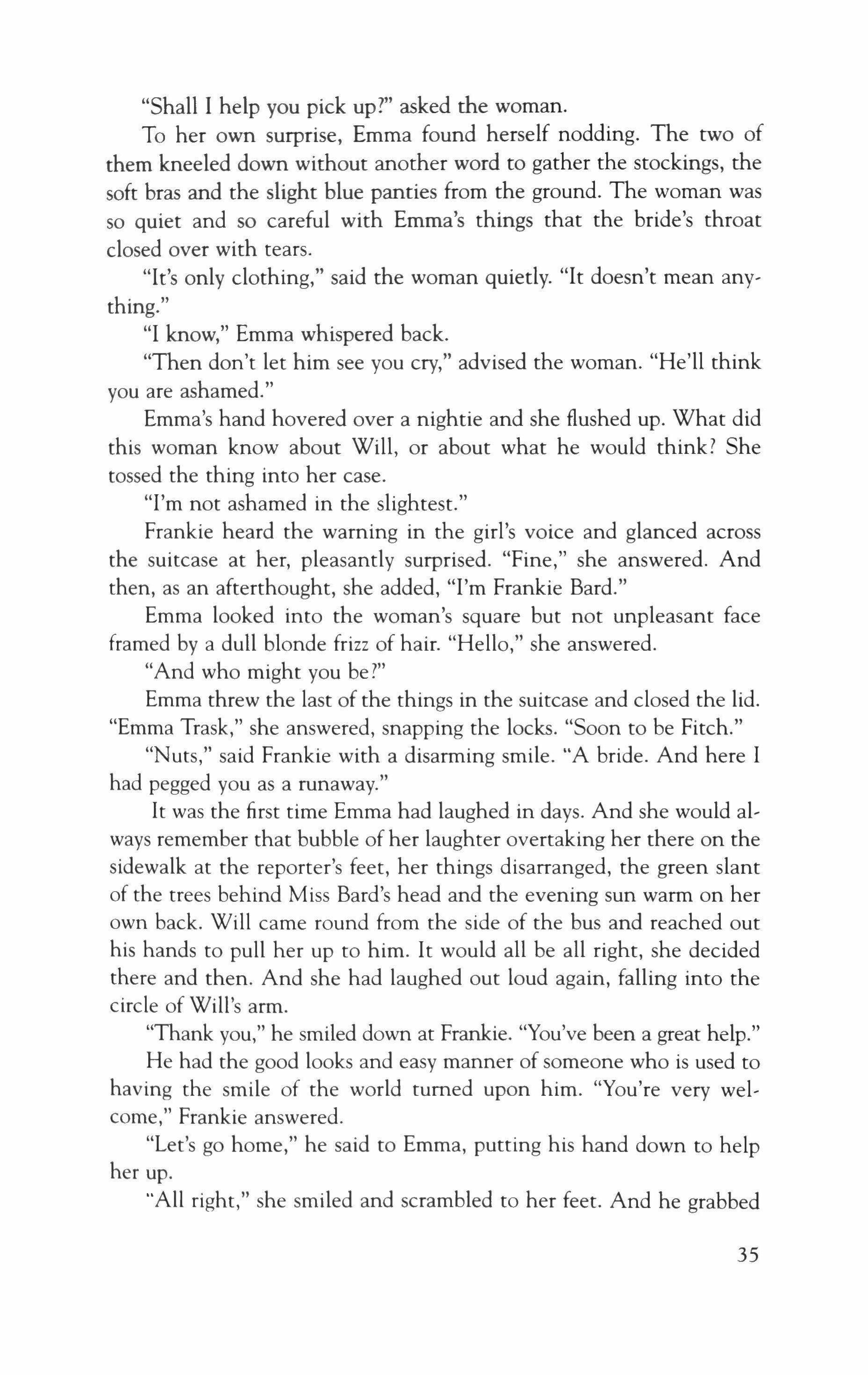
"Shall I help you pick up!" asked the woman.
To her own surprise, Emma found herself nodding. The two of them kneeled down without another word to gather the stockings, the soft bras and the slight blue panties from the ground. The woman was so quiet and so careful with Emma's things that the bride's throat closed over with tears.
"It's only clothing," said the woman quietly. "It doesn't mean anything."
"I know," Emma whispered back.
"Then don't let him see you cry," advised the woman. "He'll think you are ashamed."
Emma's hand hovered over a nightie and she flushed up. What did this woman know about Will, or about what he would think? She tossed the thing into her case.
"I'm not ashamed in the slightest."
Frankie heard the warning in the girl's voice and glanced across the suitcase at her, pleasantly surprised. "Fine," she answered. And then, as an afterthought, she added, "I'm Frankie Bard."
Emma looked into the woman's square but not unpleasant face framed by a dull blonde frizz of hair. "Hello," she answered.
"And who might you be?"
Emma threw the last of the things in the suitcase and closed the lid. "Emma Trask," she answered, snapping the locks. "Soon to be Fitch."
"Nuts," said Frankie with a disarming smile. "A bride. And here I had pegged you as a runaway."
It was the first time Emma had laughed in days. And she would always remember that bubble of her laughter overtaking her there on the sidewalk at the reporter's feet, her things disarranged, the green slant of the trees behind Miss Bard's head and the evening sun warm on her own back. Will came round from the side of the bus and reached out his hands to pull her up to him. It would all be all right, she decided there and then. And she had laughed out loud again, falling into the circle of Will's arm.
"Thank you," he smiled down at Frankie. "You've been a great help."
He had the good looks and easy manner of someone who is used to having the smile of the world turned upon him. "You're very welcome," Frankie answered.
"Let's go home," he said to Emma, putting his hand down to help her up.
"All right," she smiled and scrambled to her feet. And he grabbed
35

her suitcase with his free hand, never letting her loose from his side. Then off they started down the front street away from the green. Several paces away, Emma turned her head in the crook of Will's arm to find Frankie still standing on the pavement where they'd left her, taking a good look round.
She had ambled every grass alley, walked up and down each and every lane that stretched the three blocks between the two long streets in town, sketching into her notebook the slant of roofs, the exuberant ridiculous gardens writhing out of the tiny plots and the fishermen, stinking at the end of the day, walking their barrows home through the summer people, emerging in their linens and poplins, bathed and glistening from the day on the beach out in the late afternoon light, feathering over the lanes with their laughter and their bright unbelievable immunity, everyone out jigging for fun. Here in the land of vacation, Frankie had written then, nothing touched them, nothing dropped. They strolled and chattered, looking in shop windows, like water lilies nudging slowly down an easy stream.
Not much had changed. If anything, Frankie thought standing there, the town seemed slightly more mad for fun. The summer people were honking and singing and taking up their places on the porches and in the cafes, their voices lighting along the lanes like birds come back again to feather over the bone choir of this seacoast town. Sailors on shore leave walked in packs down Front Street, and the local girls linked arm in arm, pretended to look somewhere else. As she stood there, she heard a shout and then a crash, a clang of metal on metal, and then right away the swooning warble of a trumpet as the guesthouses along the rim of the harbor swung into sound, and a tea dance orchestra started to play.
Perhaps she had made a mistake coming here, she thought uneasily, leaning over to grab the handle on her bag. Perhaps there was no quiet to be had. Though Europe was falling apart, splintering and exploding, at least she understood the direction. But all this-she gazed down the street-motion without purpose, where was it going? There was a movie house now, and a dance hall, but the whoops and hollers seemed to come from all over town. The whole damn place was a cup and a saucer and everyone danced on the rim. She picked up her bag, her portable Royal, swung her satchel over her shoulder and walked to the end of the sidewalk, waiting for the line of Chevys and Plymouths to thin. She glanced over at Alden's Market and as quickly
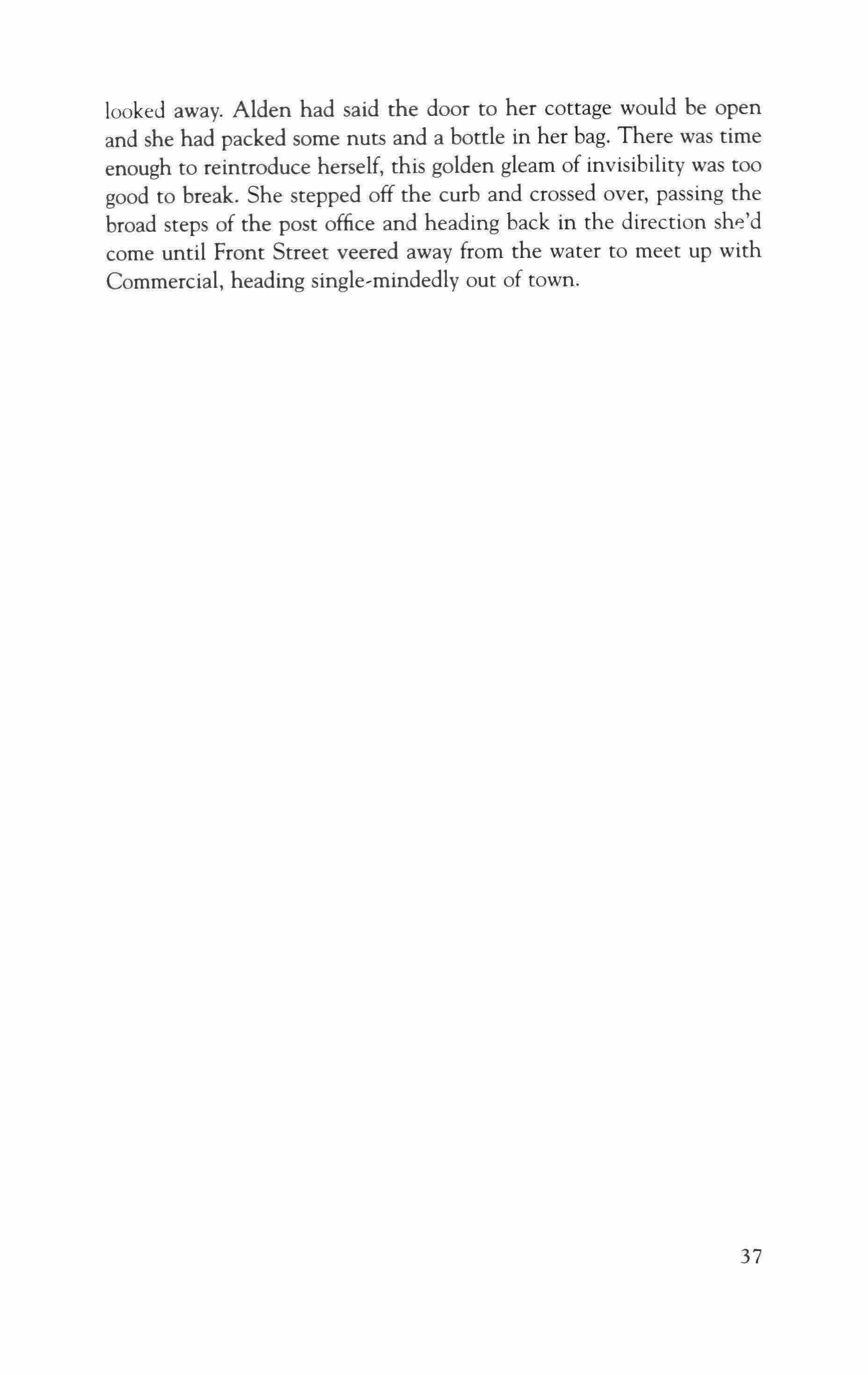
looked away. Alden had said the door to her cottage would be open and she had packed some nuts and a bottle in her bag. There was time enough to reintroduce herself, this golden gleam of invisibility was too good to break. She stepped off the curb and crossed over, passing the broad steps of the post office and heading back in the direction she'd come until Front Street veered away from the water to meet up with Commercial, heading single-rnindedlv out of town.
37
Peter Campion Skin

Your other guests all tanked, all trickled out to traffic now that mole and marble sheen was the center of the whole apartment.
Your skin my fountain. Terraced avenues and fenced-off reservoirs where the searchlights swivel and dribble back, the water, dirt paths all ramified, all spinning around us. Five years and the night returned to faint traces of trellised jasmine and cat scent.
This phantom still locked outside the peeling porch clawing the cellophane and misted clover.
Stone
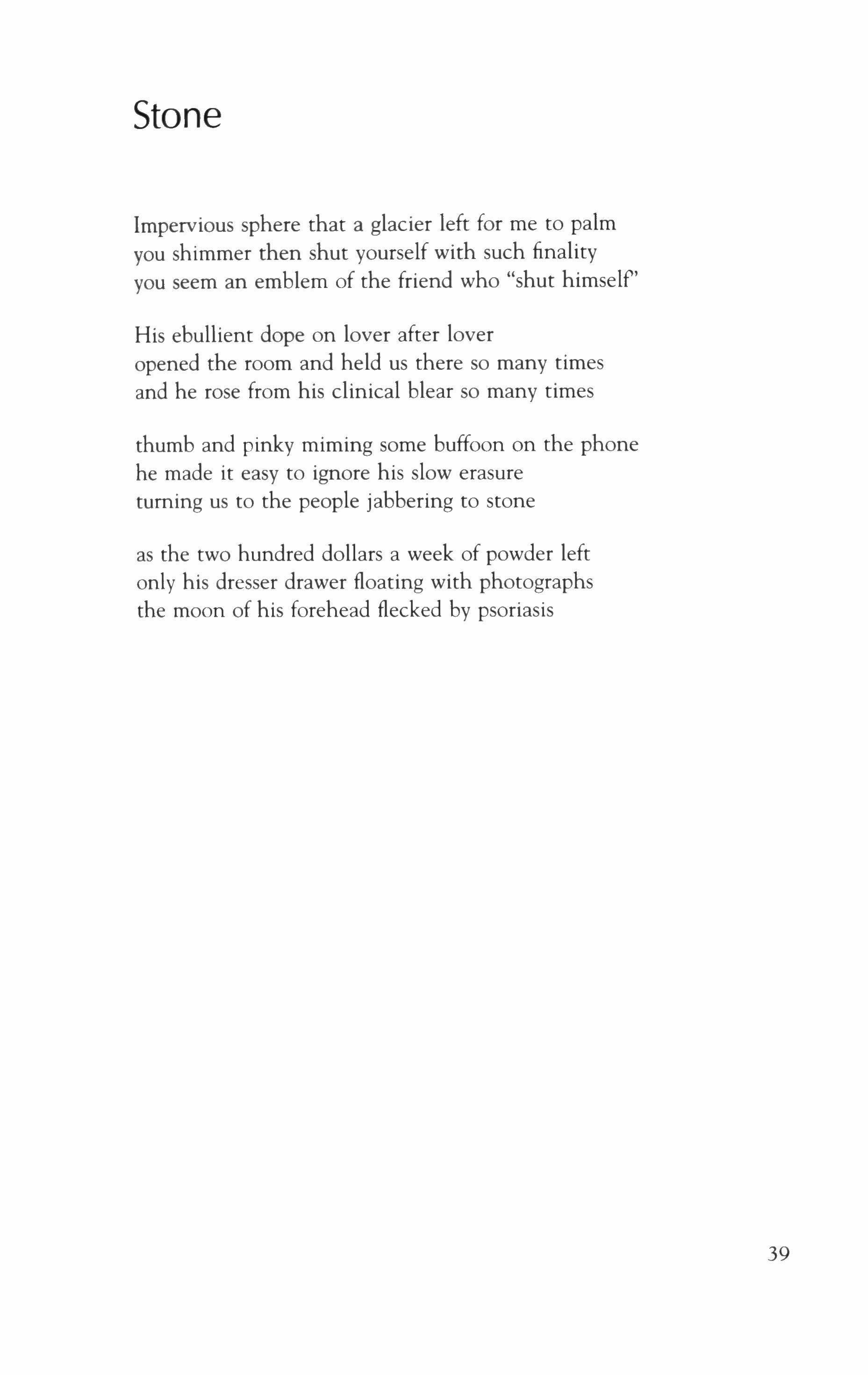
Impervious sphere that a glacier left for me to palm you shimmer then shut yourself with such finality you seem an emblem of the friend who "shut himself"
His ebullient dope on lover after lover opened the room and held us there so many times and he rose from his clinical blear so many times thumb and pinky miming some buffoon on the phone he made it easy to ignore his slow erasure turning us to the people jabbering to stone
as the two hundred dollars a week of powder left only his dresser drawer floating with photographs the moon of his forehead flecked by psoriasis
39
Dan Chiasson

After Party
After Horace
Helena, when you froth with the names of stars I wonder whether it's a star's kiss, a star's trace from last night's after-party that perplexes me.
You can't buy the tears that adorn my eyes on eBay or in the diamond district. Those bruises on you aren't temporary henna tattoos.
Some star put them there after the after-party, before he made you taste the back of his throat. I know what happens at those after-parties, where
Absolut sponsors everything. Everyone puts a drop of honey somewhere up inside their body and the game is, where is it, who can find my honey drop?
Meanwhile where is your Horace? Home, as always, translating some poet's thousands-of-years-from-now agonies into his frantic, ancient Latin.
Peeled Horse
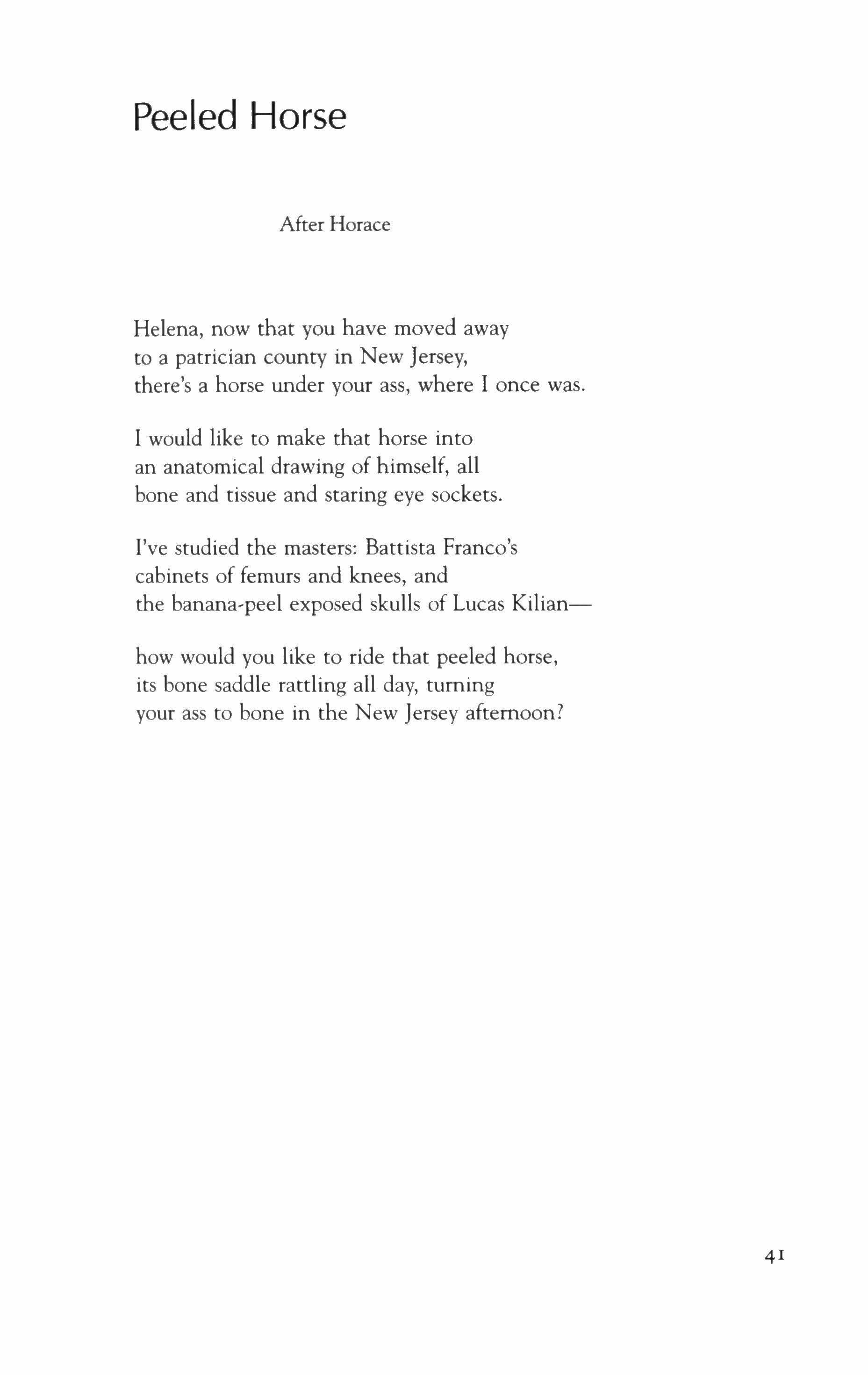
After Horace
Helena, now that you have moved away to a patrician county in New Jersey, there's a horse under your ass, where I once was.
I would like to make that horse into an anatomical drawing of himself, all bone and tissue and staring eye sockets.
I've studied the masters: Battista Franco's cabinets of femurs and knees, and the banana-peel exposed skulls of Lucas Kilian-
how would you like to ride that peeled horse, its bone saddle rattling all day, turning your ass to bone in the New Jersey afternoon?
41
Georgie

Whether to twine the flowers around the maples, whether the chipped antler found in the sod
portend a hot summer, whether a hot summer portend interiors fogged by breath, reeking of sweat and shit, and can the hoe save us, and can the spade, and if we pot the peach pit in a terracotta pot
will we have peaches next year, will we have peaches ever, if the clouds overhead spell Angie and Ed
have we seen something spectacular? Is there a pilot somewhere with an agile plane who'll write what we say in the sky? I wish I were a tree, wrote Herbert for sure then I should come to fruit or shadewhat use, what use the pulse that makes the poem race weakens me, what use, I found a shriveled cherry and a shrimp tail in my suit pocket, I never wear it, you see, it hangs in the closet. The shrimp tail was mica and the cherry was a hardened brain. Until the sparrow nest upon me, 0, what use am I?
Georgie (II)

The flowers that fade, the flowers that don't, the wax begonias made to look like real ones
by an artisan in Quebec, the wax insects that buzz nearby and the wax fragrance that attracts them,
the wax lovers walking idly, their wax promises, the entire scene done in a shoebox with a peephole
to grant the wax lovers privacy, which is to say to make your looking, your mere looking, forbidden and therefore wonderful-what was that again, listenthis wax man and woman, what disappointment is it now bows him down, as she half-comforts him while her other half makes a call on a cell phone?
The flowers beam anyway, clueless. They ignore usif what I mean by "us" is the wax lovers, you and I,
making a fetish of our privacy again, putting joy in someone's eye. And that's what I mean by us.
43
Jennifer Clarvoe
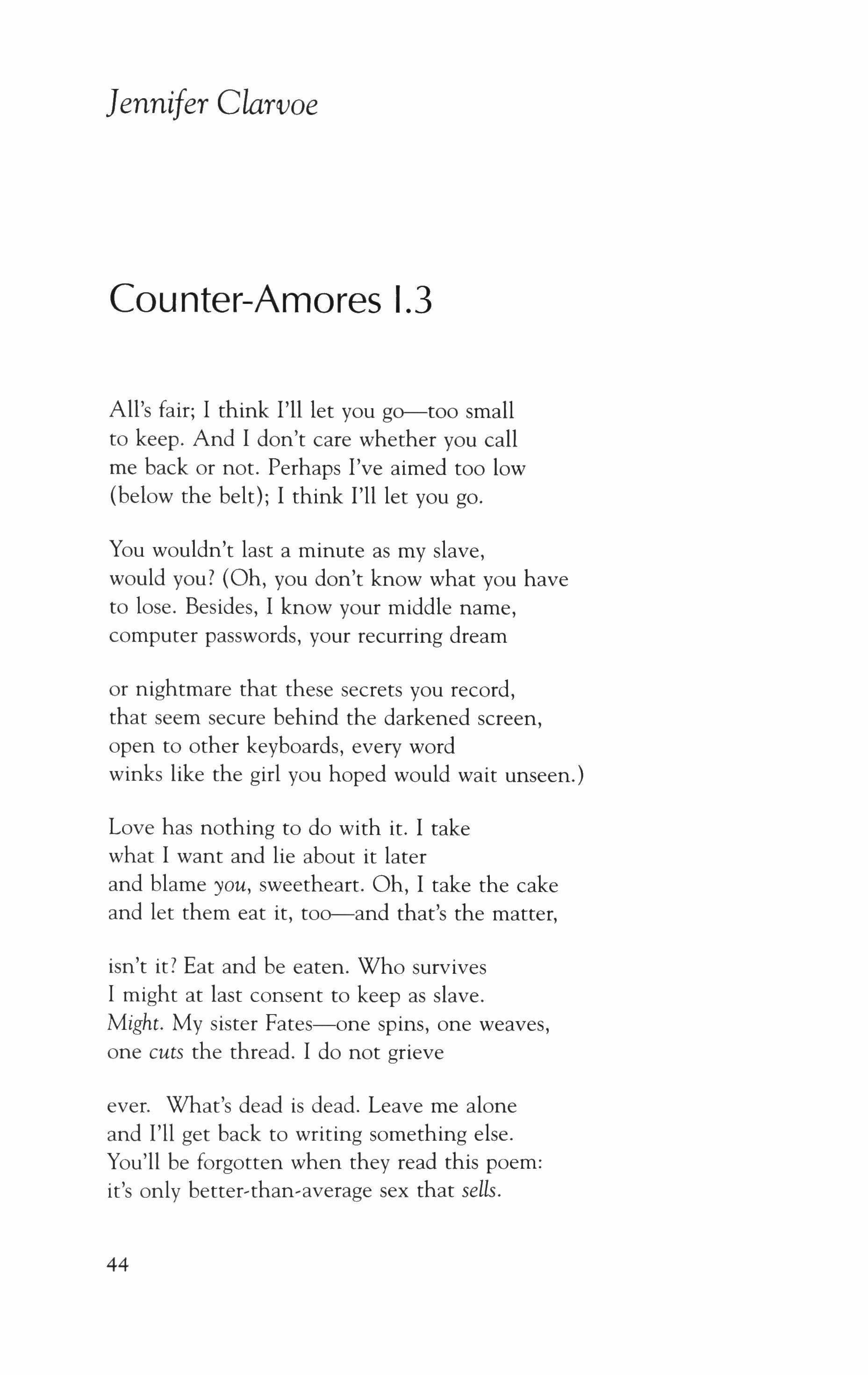
Counter-Amores 1.3
All's fair; I think I'll let you go-too small to keep. And I don't care whether you call me back or not. Perhaps I've aimed too low (below the belt); I think I'll let you go.
You wouldn't last a minute as my slave, would you? (Oh, you don't know what you have to lose. Besides, I know your middle name, computer passwords, your recurring dream or nightmare that these secrets you record, that seem secure behind the darkened screen, open to other keyboards, every word winks like the girl you hoped would wait unseen.)
Love has nothing to do with it. I take what I want and lie about it later and blame you, sweetheart. Oh, I take the cake and let them eat it, too-and that's the matter, isn't it? Eat and be eaten. Who survives I might at last consent to keep as slave. Might. My sister Fates-one spins, one weaves, one cuts the thread. I do not grieve ever. What's dead is dead. Leave me alone and I'll get back to writing something else. You'll be forgotten when they read this poem: it's only better-than-average sex that sells.
44

The Lady of the Tapestries can touch the hom of the animal she loves so much, touch anchoring the world that she holds dear and lets go, praying, a man seul disir.
Tapestries unravel. Beasts are dumb. I think I'll let you go. (Or let you come.)
45

Counter-Amores 1.7
That Way
It is wrong for him to hit her in that way, across the face-completely wrong. That way madness lies. When Malkovich hits Kidman in Campion's Portrait of a Lady, man turns beast. But Gilbert Osmond is a beast to Isabel when he is least a beast, when he refuses to display his rage at her; he is most cruel when his rage is coldest, softest, quietest-and she cannot fight back, can hardly even speak or move. His tone, when he at last does speak is grave, sincere, with all the subtlety of the subtlest threads that tether her, subtlety so much more cruel than outright violencethat's why it's wrong, that outright violence. If he had hit her, that would let her goit would explode in her and let her go. When he hauls off and hits her, he is changed just as surely as Lycaon is changed into a wolf by the force of his emotion, and Actaeon to a deer by his emotionchoked with rage the tyrant cannot speakthe breathless, panicked victim cannot speakthe body registers rage and fear past words, and Isabel and Osmond are past words, where words can't reach, about to burst the story at the bursting point: this is the story that tells us, now that violence exists, it exists the way the real body existsto free us, from the things we do not say. The body exists to free us in that way.
Michael Collier Turkey Vultures
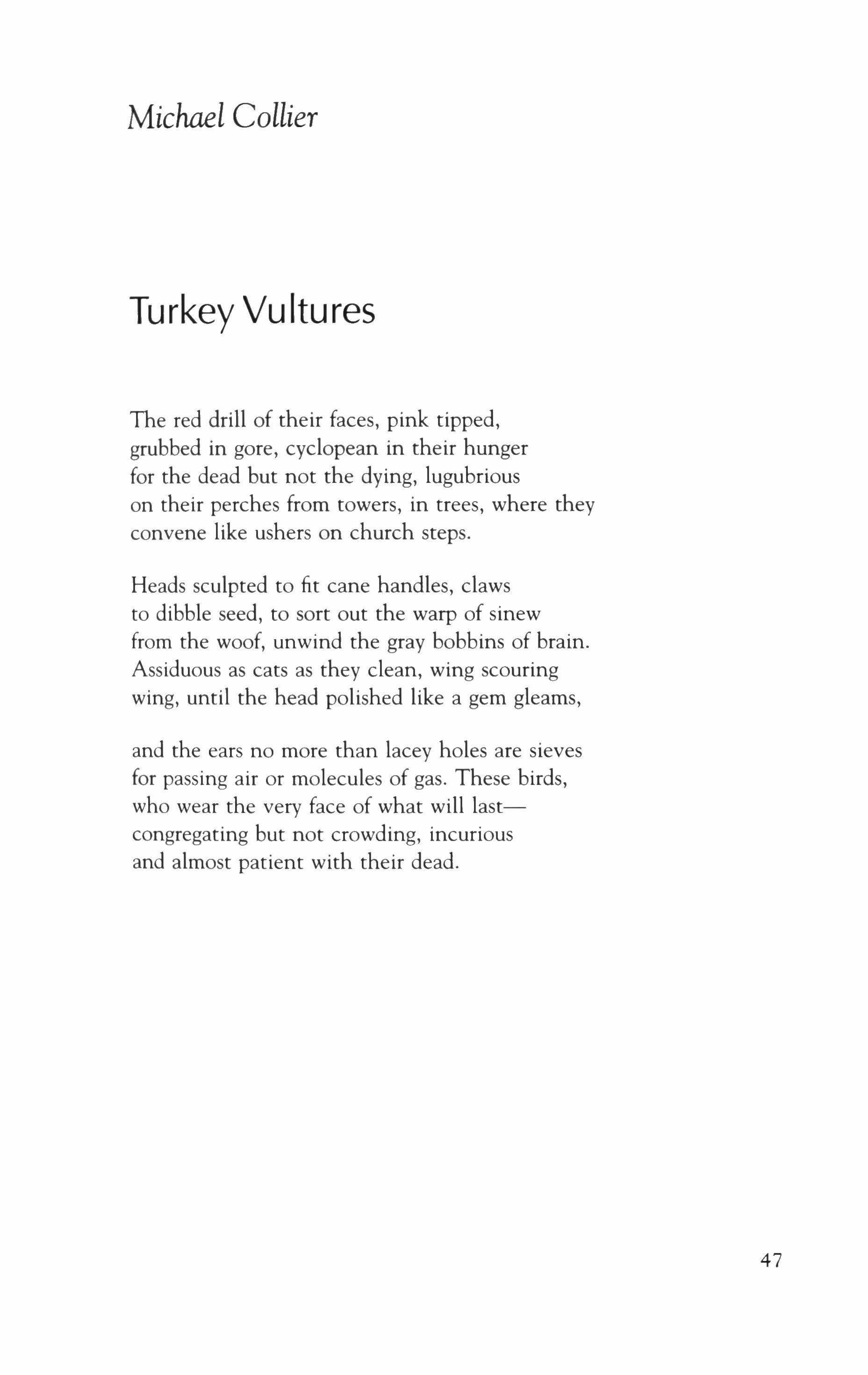
The red drill of their faces, pink tipped, grubbed in gore, cyclopean in their hunger for the dead but not the dying, lugubrious on their perches from towers, in trees, where they convene like ushers on church steps.
Heads sculpted to fit cane handles, claws to dibble seed, to sort out the warp of sinew from the woof, unwind the gray bobbins of brain. Assiduous as cats as they clean, wing scouring wing, until the head polished like a gem gleams,
and the ears no more than lacey holes are sieves for passing air or molecules of gas. These birds, who wear the very face of what will lastcongregating but not crowding, incurious and almost patient with their dead.
47
Common Flicker
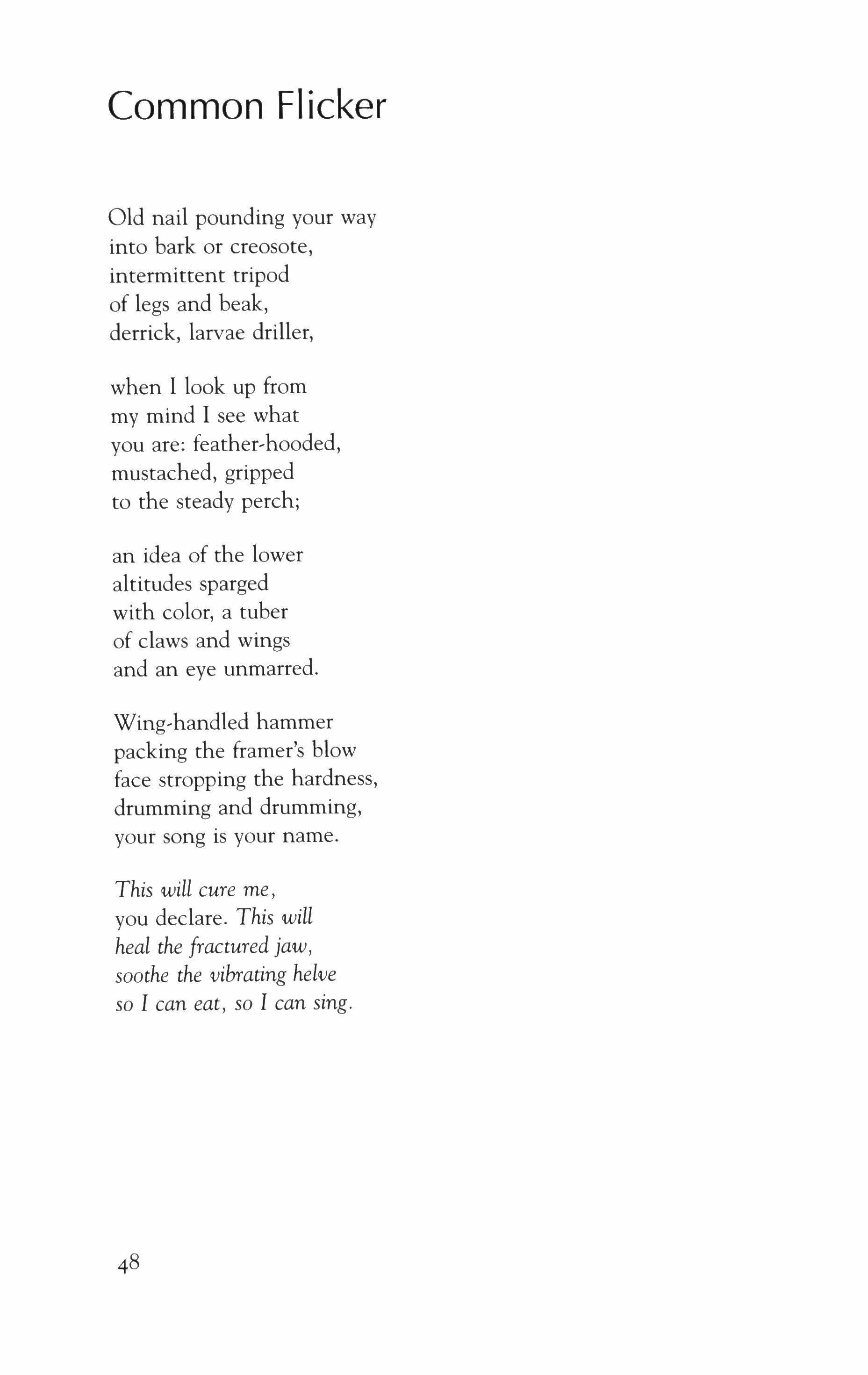
Old nail pounding your way into bark or creosote, intermittent tripod of legs and beak, derrick, larvae driller, when I look up from my mind I see what you are: feather-hooded, mustached, gripped to the steady perch; an idea of the lower altitudes sparged with color, a tuber of claws and wings and an eye unmarred.
Wing�handled hammer packing the framer's blow face stropping the hardness, drumming and drumming, your song is your name.
This will cure me, you declare. This will heal the fractured jaw J soothe the vibrating helve so I can eat J so I can sing.
Merle Collins
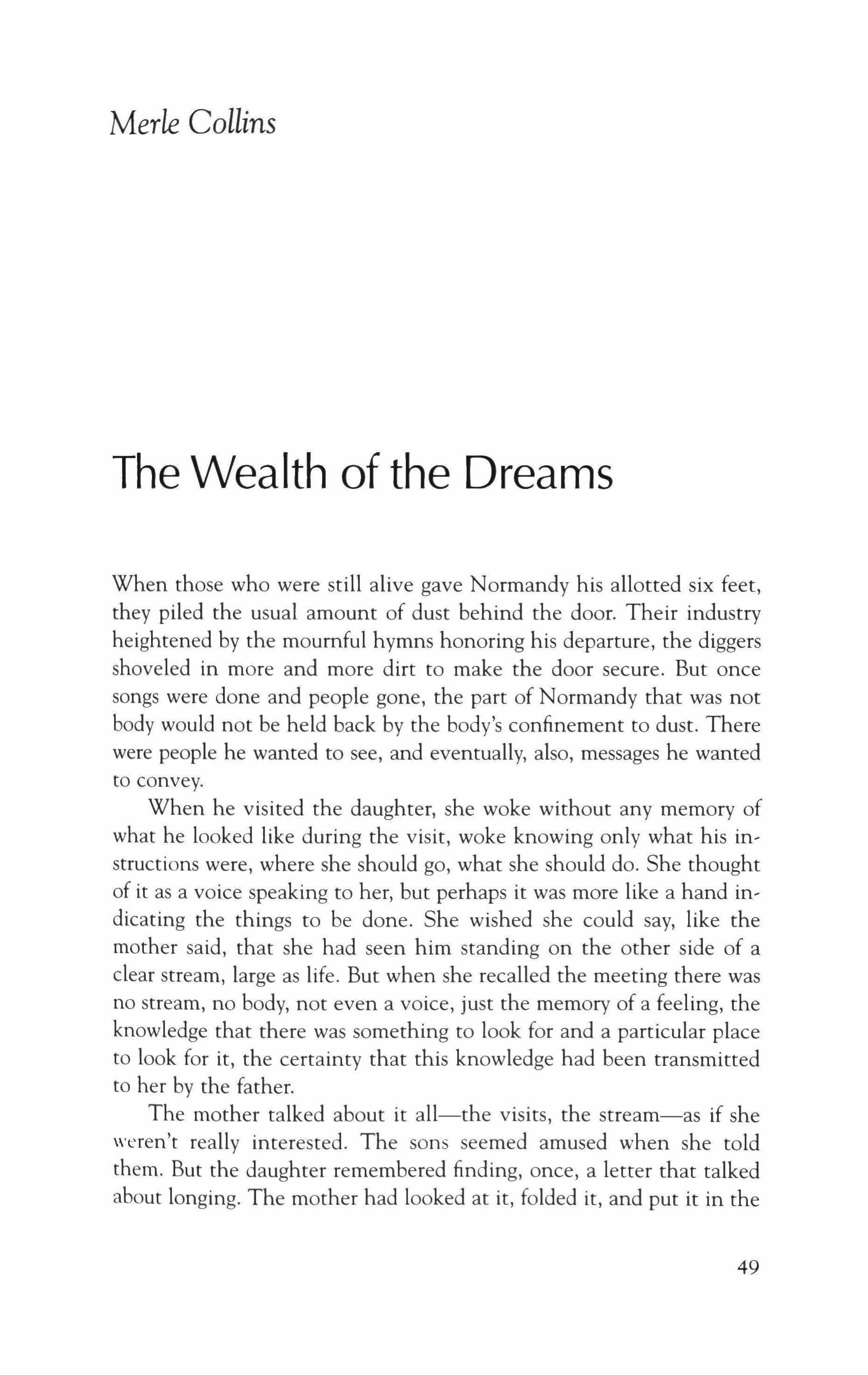
The Wealth of the Dreams
When those who were still alive gave Normandy his allotted six feet, they piled the usual amount of dust behind the door. Their industry heightened by the mournful hymns honoring his departure, the diggers shoveled in more and more dirt to make the door secure. But once songs were done and people gone, the part of Normandy that was not body would not be held back by the body's confinement to dust. There were people he wanted to see, and eventually, also, messages he wanted to convey.
When he visited the daughter, she woke without any memory of what he looked like during the visit, woke knowing only what his instructions were, where she should go, what she should do. She thought of it as a voice speaking to her, but perhaps it was more like a hand indicating the things to be done. She wished she could say, like the mother said, that she had seen him standing on the other side of a clear stream, large as life. But when she recalled the meeting there was no stream, no body, not even a voice, just the memory of a feeling, the knowledge that there was something to look for and a particular place to look for it, the certainty that this knowledge had been transmitted to her by the father.
The mother talked about it all-the visits, the stream-as if she weren't really interested. The sons seemed amused when she told them. But the daughter remembered finding, once, a letter that talked about longing. The mother had looked at it, folded it, and put it in the
49
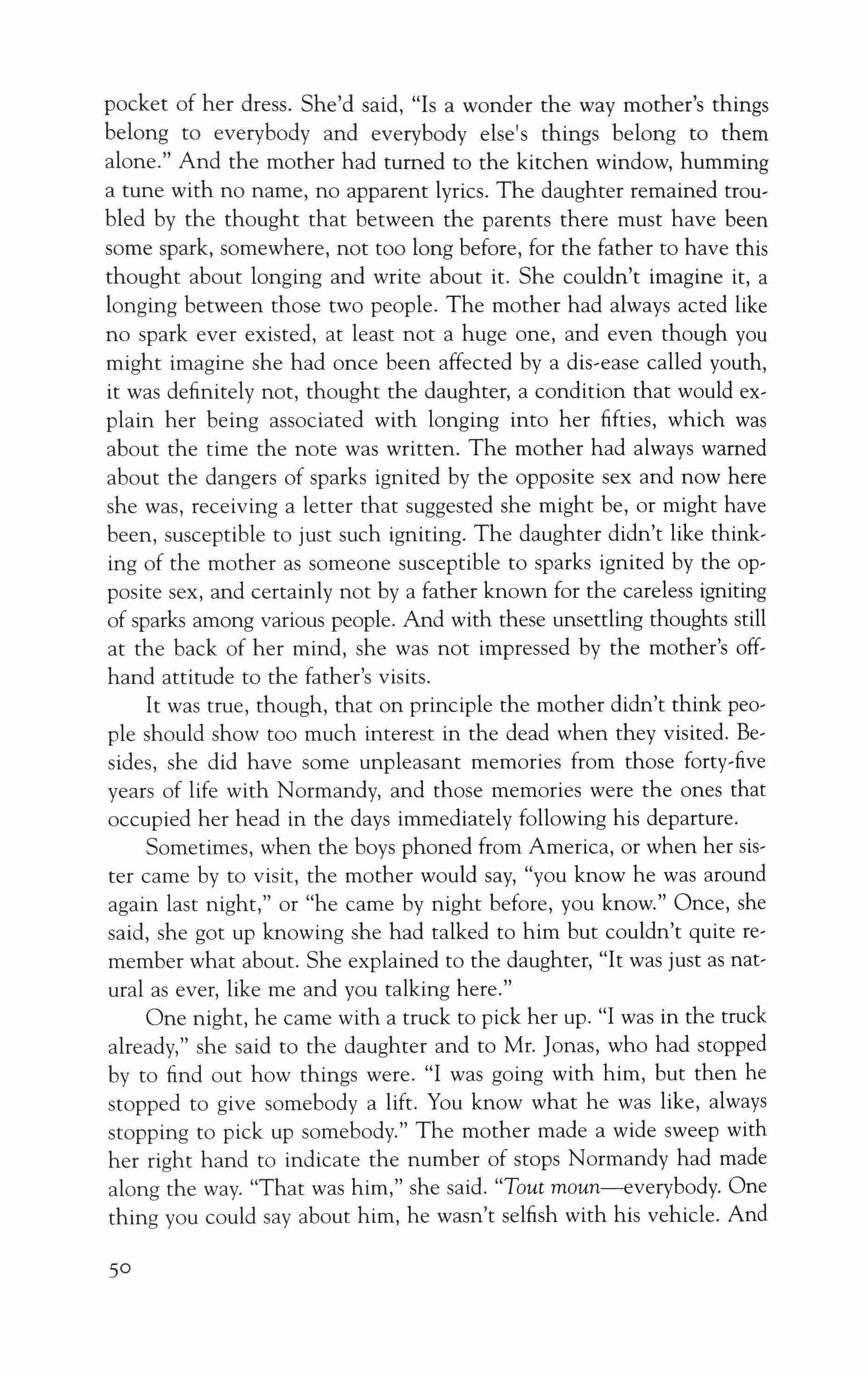
pocket of her dress. She'd said, "Is a wonder the way mother's things belong to everybody and everybody else's things belong to them alone." And the mother had turned to the kitchen window, humming a tune with no name, no apparent lyrics. The daughter remained troubled by the thought that between the parents there must have been some spark, somewhere, not too long before, for the father to have this thought about longing and write about it. She couldn't imagine it, a longing between those two people. The mother had always acted like no spark ever existed, at least not a huge one, and even though you might imagine she had once been affected by a dis-ease called youth, it was definitely not, thought the daughter, a condition that would explain her being associated with longing into her fifties, which was about the time the note was written. The mother had always warned about the dangers of sparks ignited by the opposite sex and now here she was, receiving a letter that suggested she might be, or might have been, susceptible to just such igniting. The daughter didn't like thinking of the mother as someone susceptible to sparks ignited by the opposite sex, and certainly not by a father known for the careless igniting of sparks among various people. And with these unsettling thoughts still at the back of her mind, she was not impressed by the mother's offhand attitude to the father's visits.
It was true, though, that on principle the mother didn't think people should show too much interest in the dead when they visited. Besides, she did have some unpleasant memories from those forty-five years of life with Normandy, and those memories were the ones that occupied her head in the days immediately following his departure. Sometimes, when the boys phoned from America, or when her sister came by to visit, the mother would say, "you know he was around again last night," or "he came by night before, you know." Once, she said, she got up knowing she had talked to him but couldn't quite remember what about. She explained to the daughter, "It was just as natural as ever, like me and you talking here."
One night, he came with a truck to pick her up. "I was in the truck already," she said to the daughter and to Mr. Jonas, who had stopped by to find out how things were. "I was going with him, but then he stopped to give somebody a lift. You know what he was like, always stopping to pick up somebody." The mother made a wide sweep with her right hand to indicate the number of stops Normandy had made along the way. "That was him," she said. "Tout moun-everybody. One thing you could say about him, he wasn't selfish with his vehicle. And
50

if you sitting inside of it and you busy, you still had to wait while he picked up people. Now he's over there, and still wasting time stopping for everybody on the road."
Mr. Jonas said, "I could vouch for that; a very nice man with his vehicle."
The mother turned her head toward Mr. Jonas, but said nothing. And then a breeze picked itself up and pushed the banana trees until they were bending low to one side. Up on the hill, a branch from the mango tree gave a crack that made everybody tum to look. Mango always made sure it never looked too unbending in the wind. Its branches would try to acknowledge Wind's presence with a bow. Even when Wind didn't push hard enough for Mango to bow, mango leaves would rustle in acknowledgement of Wind's presence. That way, there was no need for Wind to push hard, because Mango made sure the world knew that, tall and imposing as it was, it was not too proud to bow. But this time, Wind seemed to want to make a special point, so it pushed hard at the mango branches. And a branch crashed down on to the gliricida tree stretching up below Mango, stayed hanging there for a few heartbeats, then sank noisily to the ground, dragging part of the gliricida with it. And everything went silent; quiet, quiet, like the world was holding its breath while some body or some thing went by.
Afterwards, when you could feel the world take a breath again and continue, Mr. Jonas said, "Miss La Porte, you realize somebody was passing?" And the mother, the daughter, Mr. Jonas, all of them nodded in understanding.
So most people knew that Normandy La Porte was a continuing presence in and around Bwa epi Dlo. People were always making comments and giving advice about this.
One man said, "I not surprised; I know he couldn't leave just so." Another said, "You must put a candle on the verandah, Miss La Porte, to help light his way."
And another suggested, "He just want to see how things going. He don't mean any harm; is not a bad spirit."
And just to prove that Normandy was around in truth, a green cricket made its appearance on his clothes brush one morning. Auntie Eva, who stayed with her sister at Bwa epi Dlo most times now, said, "Well yes, that settle it. We don't need more proof than that."
Some days, the dog---called Tres by the daughter because it had barked three times when it first came to the house and Auntie Eva thought that symbolic-Tres kept whimpering and wagging its tail and
51
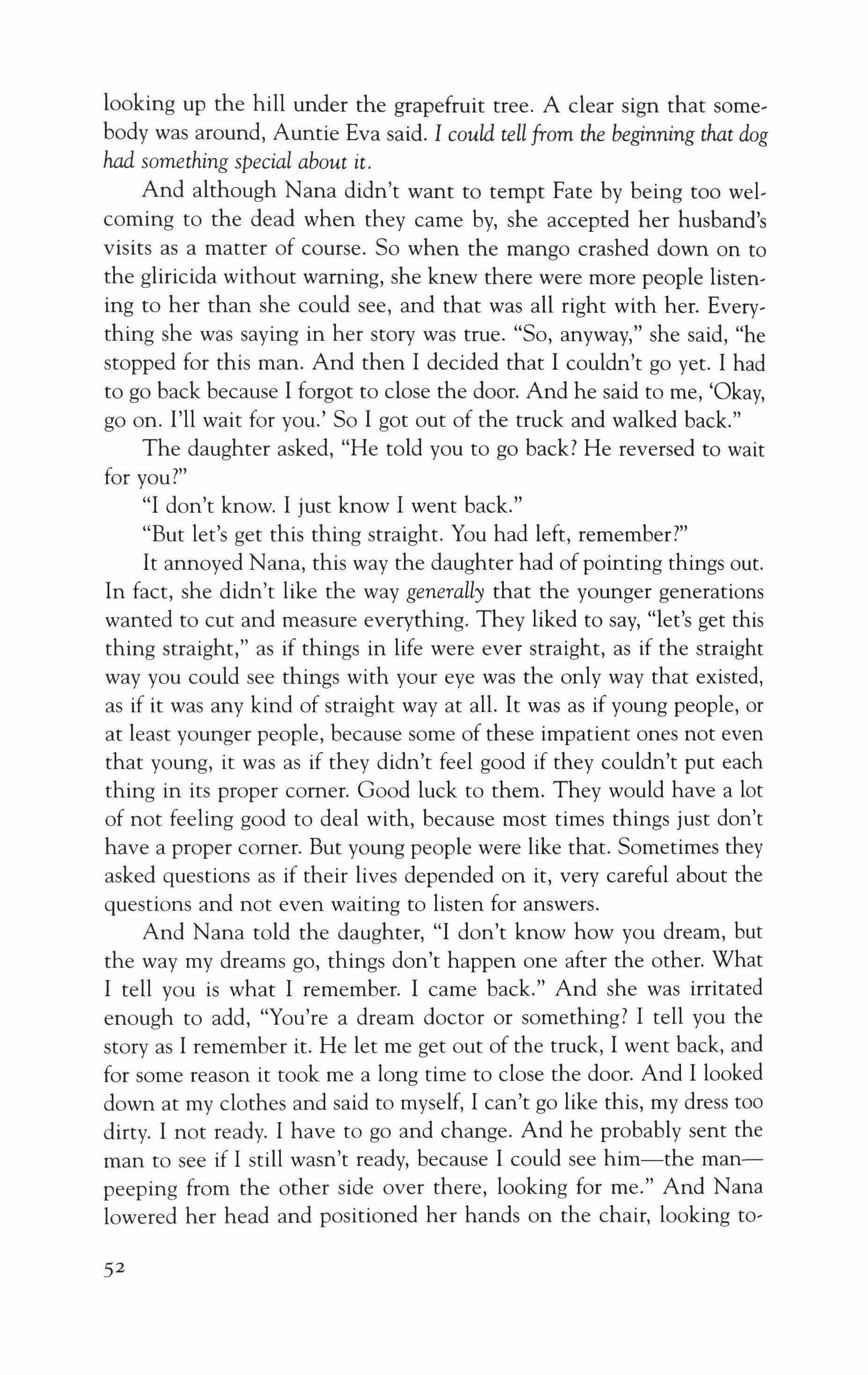
looking up the hill under the grapefruit tree. A clear sign that somebody was around, Auntie Eva said. I could tell from the beginning that dog had something special about it.
And although Nana didn't want to tempt Fate by being too welcoming to the dead when they came by, she accepted her husband's visits as a matter of course. So when the mango crashed down on to the gliricida without warning, she knew there were more people listening to her than she could see, and that was all right with her. Everything she was saying in her story was true. "So, anyway," she said, "he stopped for this man. And then I decided that I couldn't go yet. I had to go back because I forgot to close the door. And he said to me, 'Okay, go on. I'll wait for you.' So I got out of the truck and walked back."
The daughter asked, "He told you to go back? He reversed to wait for you?"
"I don't know. I just know I went back."
"But let's get this thing straight. You had left, remember?"
It annoyed Nana, this way the daughter had of pointing things out. In fact, she didn't like the way generally that the younger generations wanted to cut and measure everything. They liked to say, "let's get this thing straight," as if things in life were ever straight, as if the straight way you could see things with your eye was the only way that existed, as if it was any kind of straight way at all. It was as if young people, or at least younger people, because some of these impatient ones not even that young, it was as if they didn't feel good if they couldn't put each thing in its proper comer. Good luck to them. They would have a lot of not feeling good to deal with, because most times things just don't have a proper comer. But young people were like that. Sometimes they asked questions as if their lives depended on it, very careful about the questions and not even waiting to listen for answers.
And Nana told the daughter, "I don't know how you dream, but the way my dreams go, things don't happen one after the other. What I tell you is what I remember. I came back." And she was irritated enough to add, "You're a dream doctor or something? I tell you the story as I remember it. He let me get out of the truck, I went back, and for some reason it took me a long time to close the door. And I looked down at my clothes and said to myself, I can't go like this, my dress too dirty. I not ready. I have to go and change. And he probably sent the man to see if I still wasn't ready, because I could see him-the manpeeping from the other side over there, looking for me." And Nana lowered her head and positioned her hands on the chair, looking to-
52
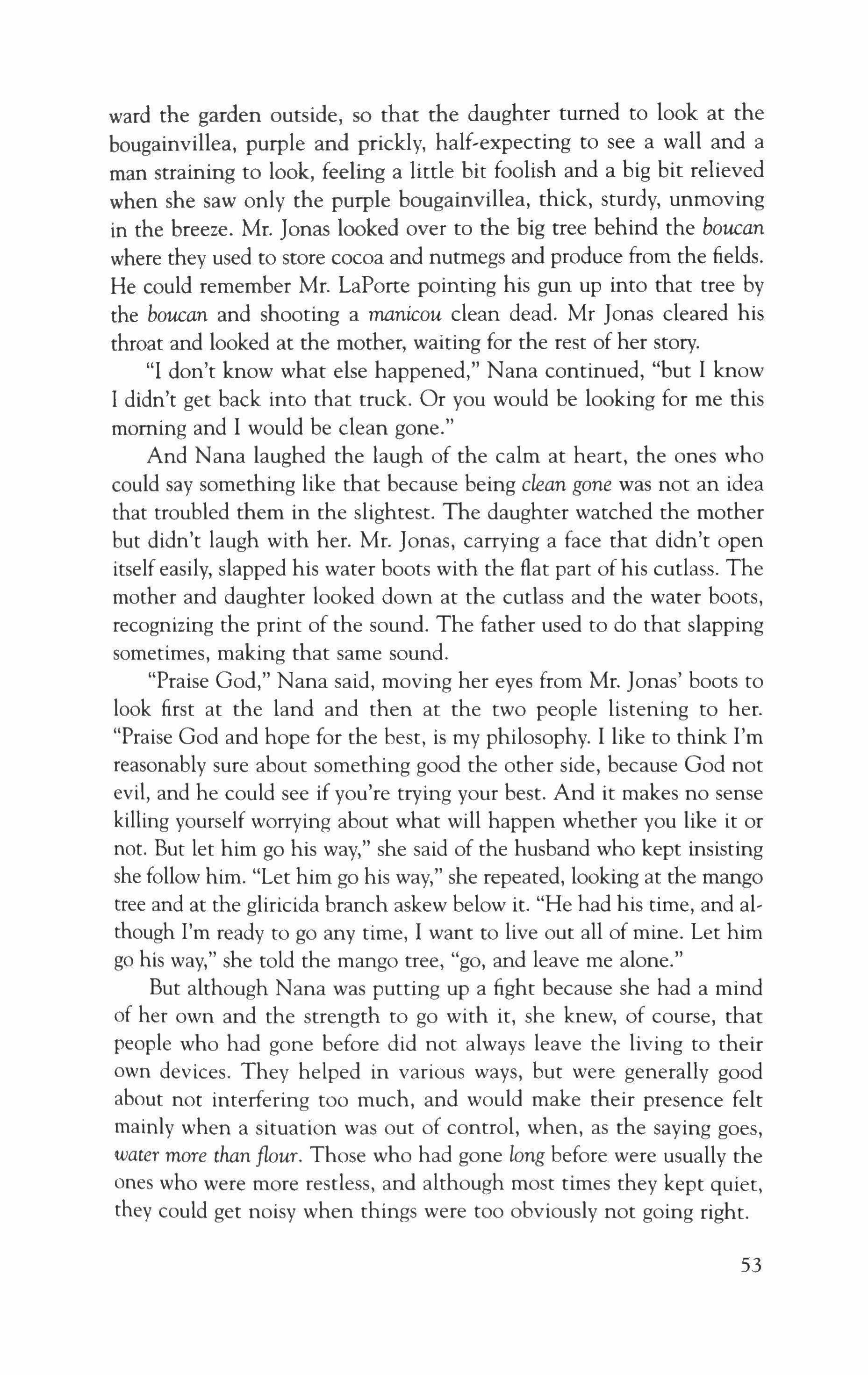
ward the garden outside, so that the daughter turned to look at the bougainvillea, purple and prickly, half-expecting to see a wall and a man straining to look, feeling a little bit foolish and a big bit relieved when she saw only the purple bougainvillea, thick, sturdy, unmoving in the breeze. Mr. Jonas looked over to the big tree behind the boucan where they used to store cocoa and nutmegs and produce from the fields. He could remember Mr. LaPorte pointing his gun up into that tree by the boucan and shooting a manicou clean dead. Mr Jonas cleared his throat and looked at the mother, waiting for the rest of her story.
"I don't know what else happened," Nana continued, "but I know I didn't get back into that truck. Or you would be looking for me this morning and I would be clean gone."
And Nana laughed the laugh of the calm at heart, the ones who could say something like that because being clean gone was not an idea that troubled them in the slightest. The daughter watched the mother but didn't laugh with her. Mr. Jonas, carrying a face that didn't open itself easily, slapped his water boots with the flat part of his cutlass. The mother and daughter looked down at the cutlass and the water boots, recognizing the print of the sound. The father used to do that slapping sometimes, making that same sound.
"Praise God," Nana said, moving her eyes from Mr. Jonas' boots to look first at the land and then at the two people listening to her. "Praise God and hope for the best, is my philosophy. I like to think I'm reasonably sure about something good the other side, because God not evil, and he could see if you're trying your best. And it makes no sense killing yourself worrying about what will happen whether you like it or not. But let him go his way," she said of the husband who kept insisting she follow him. "Let him go his way," she repeated, looking at the mango tree and at the gliricida branch askew below it. "He had his time, and although I'm ready to go any time, I want to live out all of mine. Let him go his way," she told the mango tree, "go, and leave me alone."
But although Nana was putting up a fight because she had a mind of her own and the strength to go with it, she knew, of course, that people who had gone before did not always leave the living to their own devices. They helped in various ways, but were generally good about not interfering too much, and would make their presence felt mainly when a situation was out of control, when, as the saying goes, water more than flour. Those who had gone long before were usually the ones who were more restless, and although most times they kept quiet, they could get noisy when things were too obviously not going right.
53
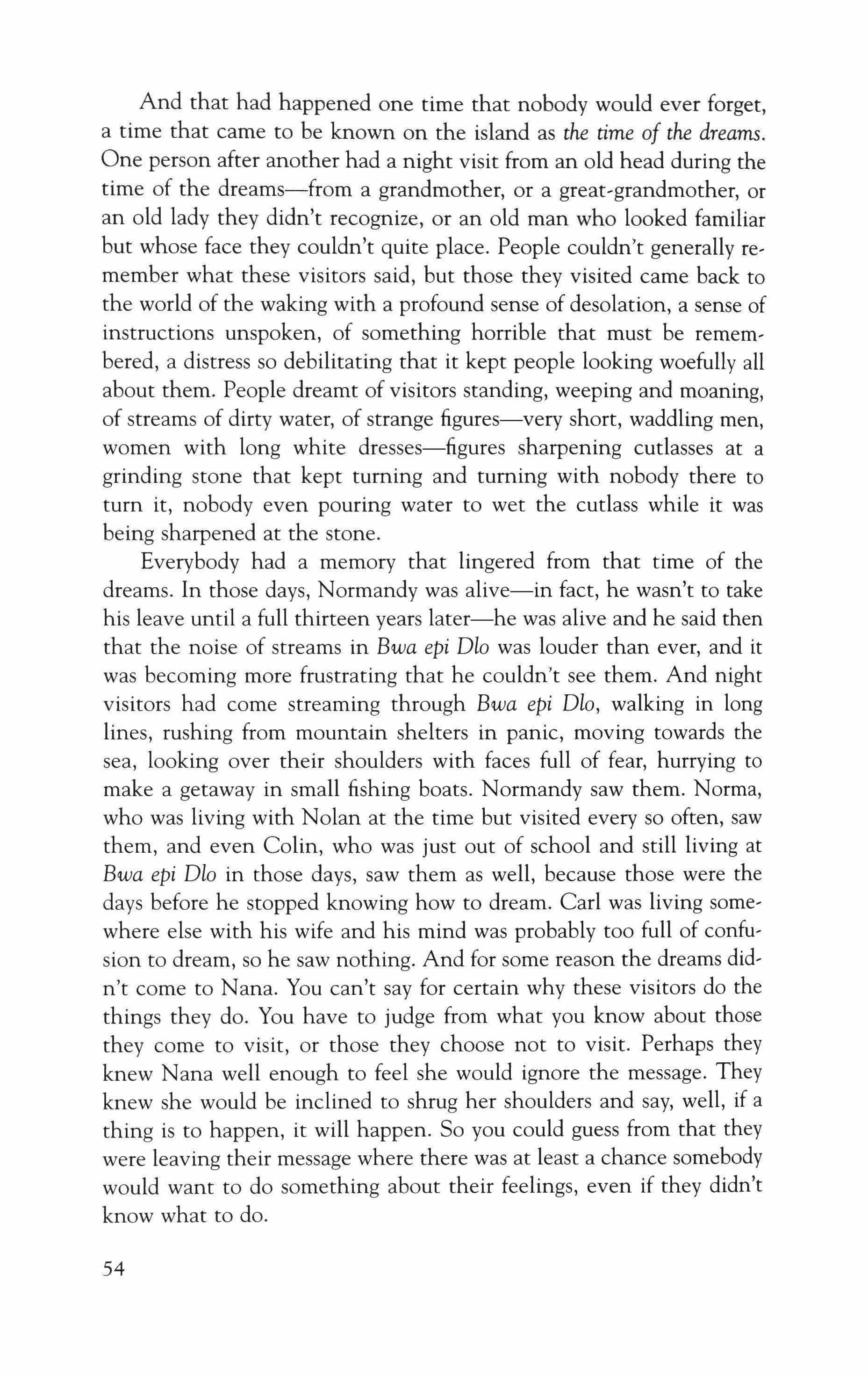
And that had happened one time that nobody would ever forget, a time that came to be known on the island as the time of the dreams. One person after another had a night visit from an old head during the time of the dreams-from a grandmother, or a great,grandmother, or an old lady they didn't recognize, or an old man who looked familiar but whose face they couldn't quite place. People couldn't generally remember what these visitors said, but those they visited came back to the world of the waking with a profound sense of desolation, a sense of instructions unspoken, of something horrible that must be rernembered, a distress so debilitating that it kept people looking woefully all about them. People dreamt of visitors standing, weeping and moaning, of streams of dirty water, of strange figures-very short, waddling men, women with long white dresses-figures sharpening cutlasses at a grinding stone that kept turning and turning with nobody there to tum it, nobody even pouring water to wet the cutlass while it was being sharpened at the stone.
Everybody had a memory that lingered from that time of the dreams. In those days, Normandy was alive-in fact, he wasn't to take his leave until a full thirteen years later-he was alive and he said then that the noise of streams in Bwa epi Dlo was louder than ever, and it was becoming more frustrating that he couldn't see them. And night visitors had come streaming through Bwa epi Dlo, walking in long lines, rushing from mountain shelters in panic, moving towards the sea, looking over their shoulders with faces full of fear, hurrying to make a getaway in small fishing boats. Normandy saw them. Norma, who was living with Nolan at the time but visited every so often, saw them, and even Colin, who was just out of school and still living at Bwa epi Dlo in those days, saw them as well, because those were the days before he stopped knowing how to dream. Carl was living some' where else with his wife and his mind was probably too full of confusion to dream, so he saw nothing. And for some reason the dreams did, n't come to Nana. You can't say for certain why these visitors do the things they do. You have to judge from what you know about those they come to visit, or those they choose not to visit. Perhaps they knew Nana well enough to feel she would ignore the message. They knew she would be inclined to shrug her shoulders and say, well, if a thing is to happen, it will happen. So you could guess from that they were leaving their message where there was at least a chance somebody would want to do something about their feelings, even if they didn't know what to do.
54
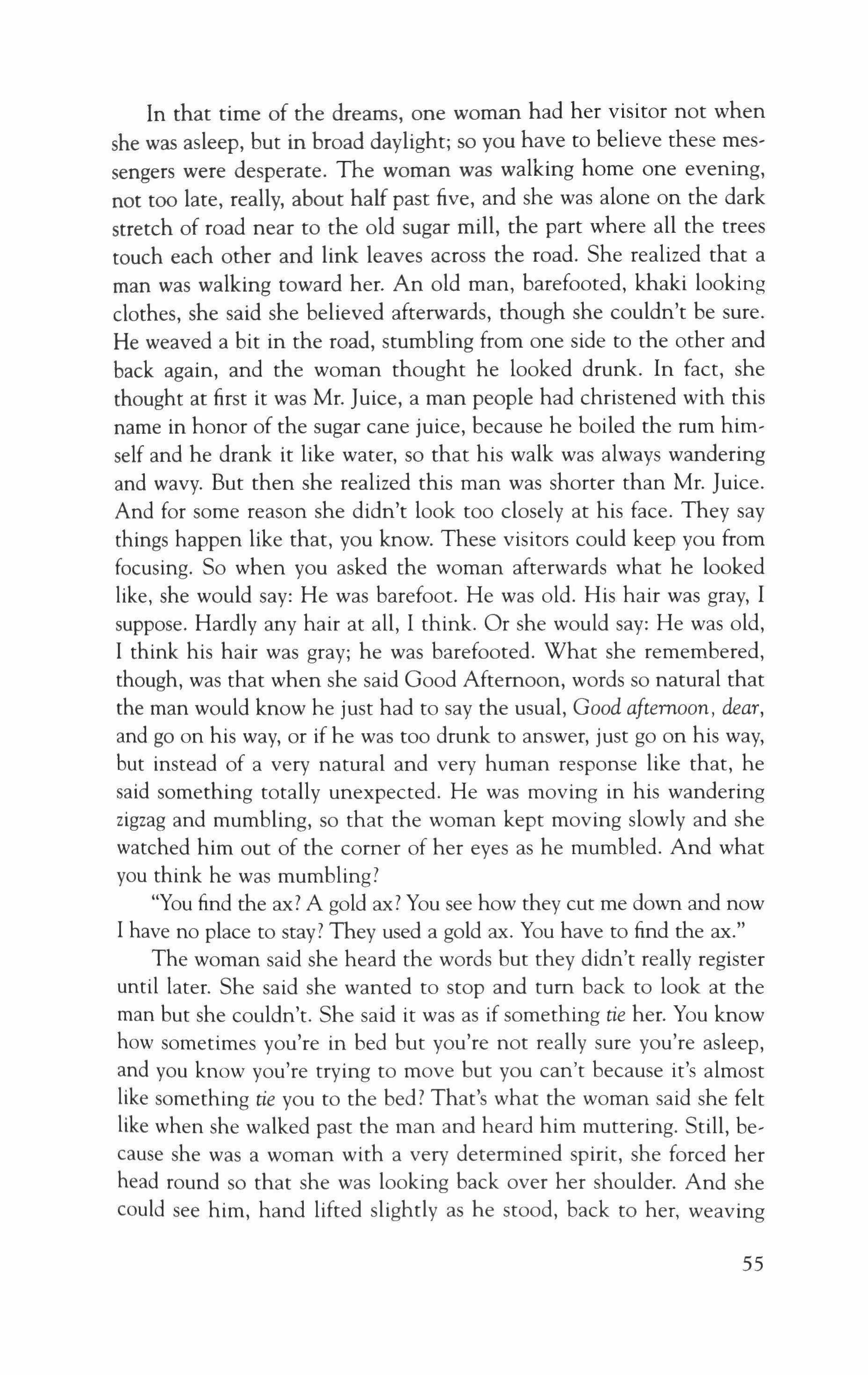
In that time of the dreams, one woman had her visitor not when she was asleep, but in broad daylight; so you have to believe these messengers were desperate. The woman was walking home one evening, not too late, really, about half past five, and she was alone on the dark stretch of road near to the old sugar mill, the part where all the trees touch each other and link leaves across the road. She realized that a man was walking toward her. An old man, barefooted, khaki looking clothes, she said she believed afterwards, though she couldn't be sure. He weaved a bit in the road, stumbling from one side to the other and back again, and the woman thought he looked drunk. In fact, she thought at first it was Mr. Juice, a man people had christened with this name in honor of the sugar cane juice, because he boiled the rum him' self and he drank it like water, so that his walk was always wandering and wavy. But then she realized this man was shorter than Mr. Juice. And for some reason she didn't look too closely at his face. They say things happen like that, you know. These visitors could keep you from focusing. So when you asked the woman afterwards what he looked like, she would say: He was barefoot. He was old. His hair was gray, I suppose. Hardly any hair at all, I think. Or she would say: He was old, I think his hair was gray; he was barefooted. What she remembered, though, was that when she said Good Afternoon, words so natural that the man would know he just had to say the usual, Good afternoon, dear, and go on his way, or if he was too drunk to answer, just go on his way, but instead of a very natural and very human response like that, he said something totally unexpected. He was moving in his wandering zigzag and mumbling, so that the woman kept moving slowly and she watched him out of the comer of her eyes as he mumbled. And what you think he was mumbling?
"You find the ax? A gold ax? You see how they cut me down and now I have no place to stay? They used a gold ax. You have to find the ax."
The woman said she heard the words but they didn't really register until later. She said she wanted to stop and tum back to look at the man but she couldn't. She said it was as if something tie her. You know how sometimes you're in bed but you're not really sure you're asleep, and you know you're trying to move but you can't because it's almost like something tie you to the bed? That's what the woman said she felt like when she walked past the man and heard him muttering. Still, be, cause she was a woman with a very determined spirit, she forced her head round so that she was looking back over her shoulder. And she could see him, hand lifted slightly as he stood, back to her, weaving
55

and mumbling: "Not any ordinary iron ax," she heard him say; "not a silver ax. A gold ax. You must find the ax."
And by the time the woman was back to herself, by the time she could tum fully around and give the man her attention, he was leaving the road to go down into the track, near to where somebody had bought the piece of land below the road and had just cut several trees, making the ground ready for building. The woman was curious enough, and brave enough, her friends said when she told them, to walk back and try to get a better look at the man as he made his way down into the clearing. But although she looked down, she could no longer see him, not in the cleared land below the road, not up or down the road on which she was still standing. She wanted to dive down into the clearing to look, she said, but she didn't have the courage. Something was telling me not to do that, she said, and everybody could understand. In fact, people only wondered why the thing hadn't told her not to walk back and try to see anything.
Since then, the woman looks with care into the face of each person she meets. She wants to be sure to recognize messengers when they come. But now as far as she can tell she meets only the living, who also communicate strangely at times, but by and large she is able to find help unraveling what they say. The good thing is, now that she is keeping an eye out for the dead, she never misses an important message from the living.
56
w. S. Di Piero

All in One Day
Fat ravens chop from leafless elms and sail like shadows across my window, nervous souls backlit by a reddish sky full of snow that hasn't fallen yet. Waxwings passed last month to stuff their crops with holly berries. Starlings cry from wires
Today's news says a dark, unworldly matter makes up the universe we call ours, passing through everything, leaving no trace, we're drenched with energy that blows stars apart and farther from us speeds explosions I see in dreams, like last night, when each time I named a constellation it became another.
On a day like this, crows budding on the crabby oaks, the blood ghosts I see in human forms could be a necessary fantasy of nerve cells, dopamine, or appetite, bodies modeled from phantom fluids, passing through a world that doesn't exist, or exists in the mind of God.
I thought the child hooting at a ruff of fallen leaves would shovel them at me like a war or bridal game, but the armfuls scooped above her head rattled down,
57
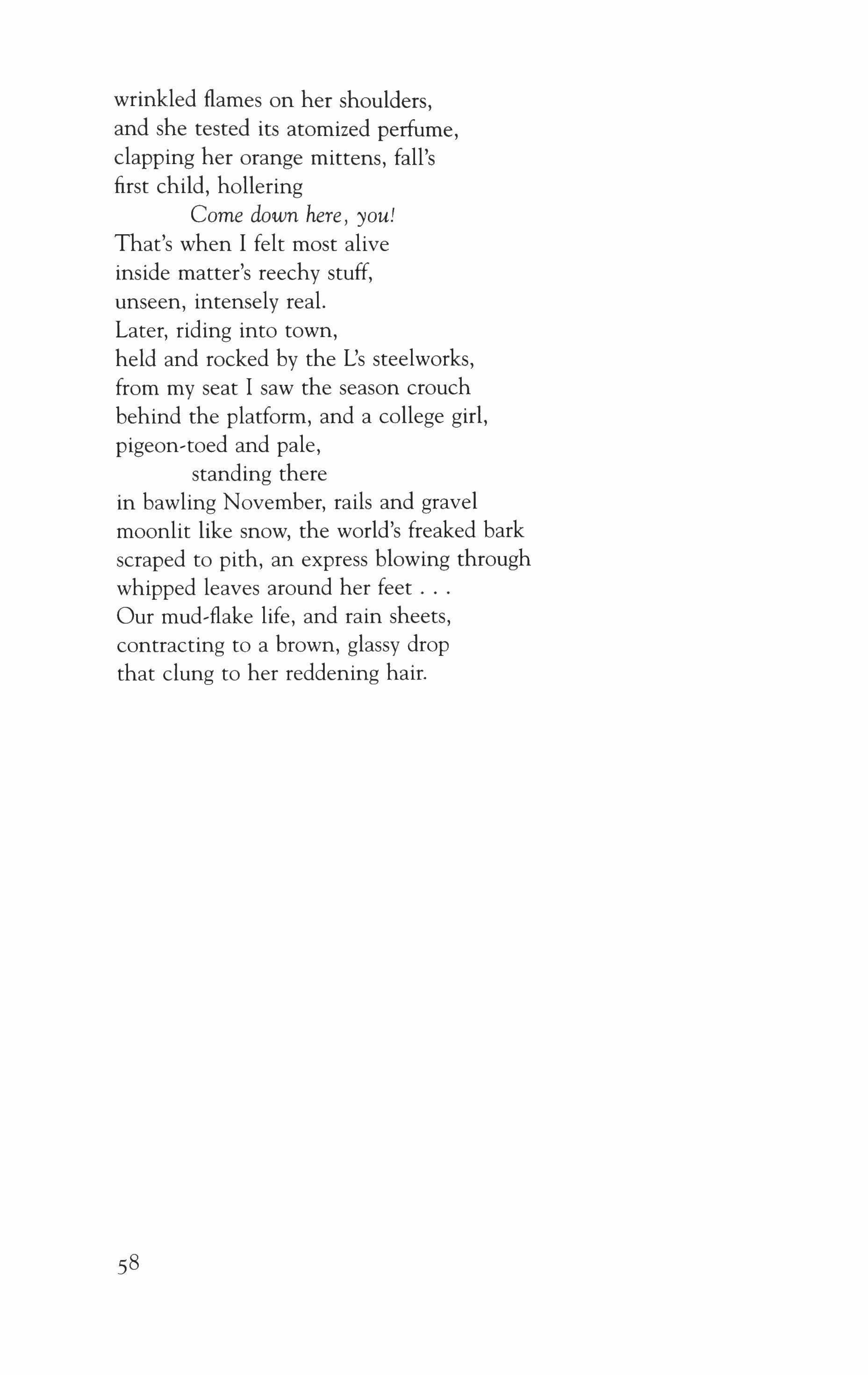
wrinkled flames on her shoulders, and she tested its atomized perfume, clapping her orange mittens, fall's first child, hollering
Come down here, you!
That's when I felt most alive inside matter's reechy stuff, unseen, intensely real. Later, riding into town, held and rocked by the L's steelworks, from my seat I saw the season crouch behind the platform, and a college girl, pigeon-toed and pale, standing there in bawling November, rails and gravel moonlit like snow, the world's freaked bark scraped to pith, an express blowing through whipped leaves around her feet
Our mud-flake life, and rain sheets, contracting to a brown, glassy drop that clung to her reddening hair.
58
Increased Security
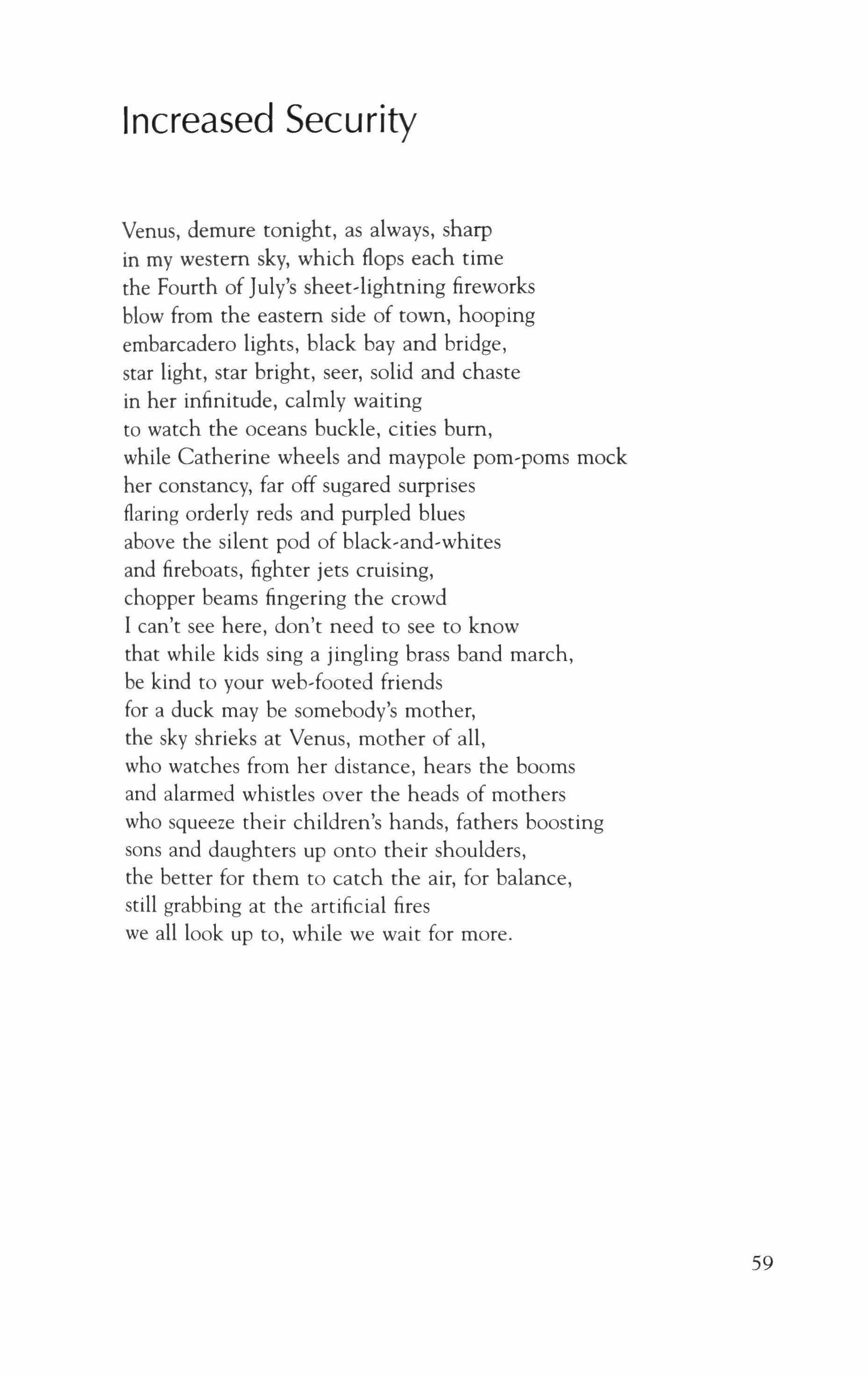
Venus, demure tonight, as always, sharp in my western sky, which flops each time the Fourth of July's sheet-lightning fireworks blow from the eastern side of town, hooping embarcadero lights, black bay and bridge, star light, star bright, seer, solid and chaste in her infinitude, calmly waiting to watch the oceans buckle, cities bum, while Catherine wheels and maypole pom-poms mock her constancy, far off sugared surprises flaring orderly reds and purpled blues above the silent pod of black-and-whites and fireboats, fighter jets cruising, chopper beams fingering the crowd
I can't see here, don't need to see to know that while kids sing a jingling brass band march, be kind to your web-footed friends for a duck may be somebody's mother, the sky shrieks at Venus, mother of all, who watches from her distance, hears the booms and alarmed whistles over the heads of mothers who squeeze their children's hands, fathers boosting sons and daughters up onto their shoulders, the better for them to catch the air, for balance, still grabbing at the artificial fires we all look up to, while we wait for more.
59
Sean Enright
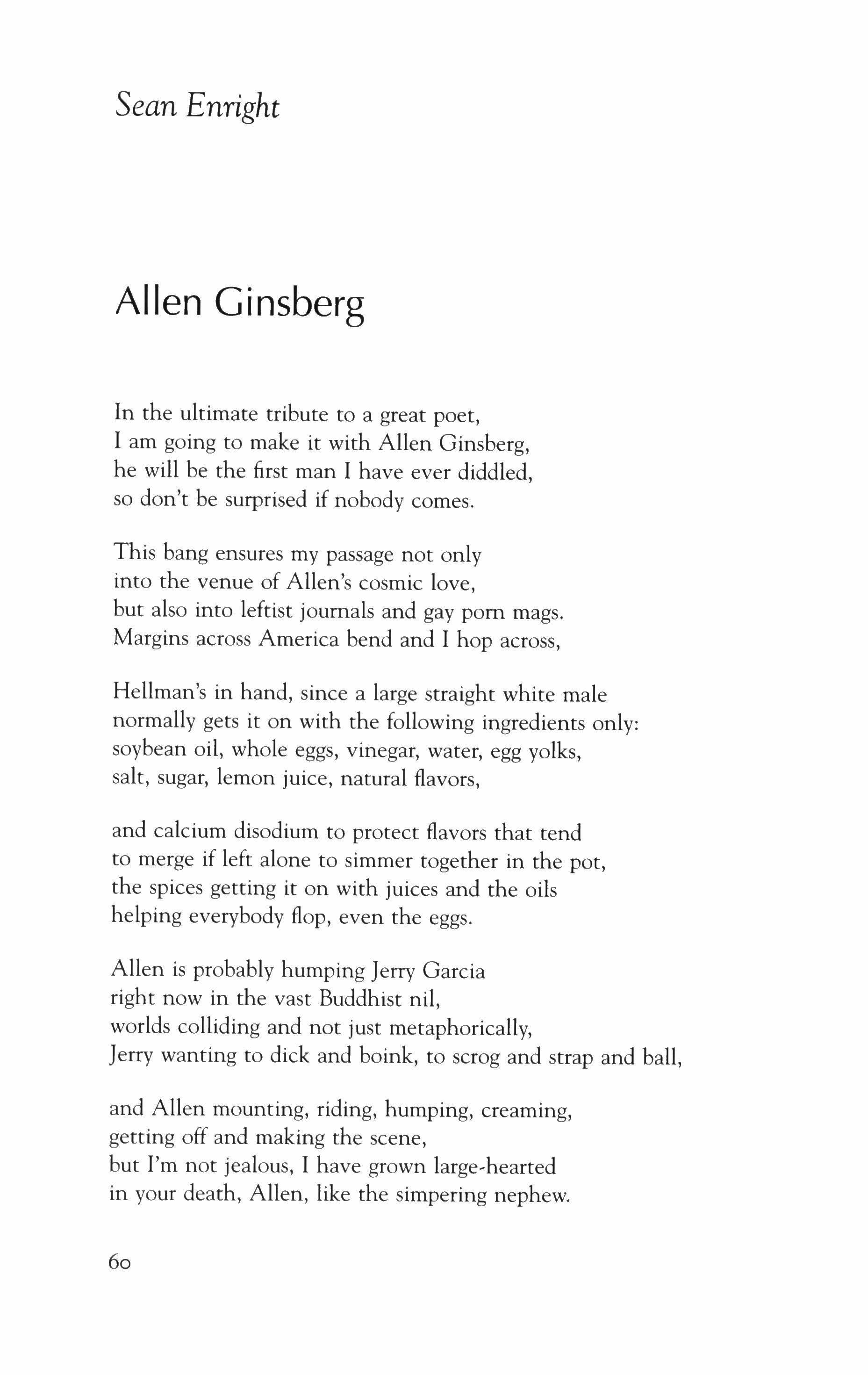
Allen Ginsberg
In the ultimate tribute to a great poet, I am going to make it with Allen Ginsberg, he will be the first man I have ever diddled, so don't be surprised if nobody comes.
This bang ensures my passage not only into the venue of Allen's cosmic love, but also into leftist journals and gay porn mags. Margins across America bend and I hop across, Hellman's in hand, since a large straight white male normally gets it on with the following ingredients only: soybean oil, whole eggs, vinegar, water, egg yolks, salt, sugar, lemon juice, natural flavors, and calcium disodium to protect flavors that tend to merge if left alone to simmer together in the pot, the spices getting it on with juices and the oils helping everybody flop, even the eggs.
Allen is probably humping Jerry Garcia right now in the vast Buddhist nil, worlds colliding and not just metaphorically, Jerry wanting to dick and boink, to scrog and strap and ball, and Allen mounting, riding, humping, creaming, getting off and making the scene, but I'm not jealous, I have grown large-hearted in your death, Allen, like the simpering nephew.
60

Allen, my Allen, welcome to my authentic ritual of universal confluence, my merging of all disjointed parts of a universe touched by your love. Sober as sand, I meditate toward the whole of things
I can't seem to see, beyond my piece of the puzzle. Talk about a plot, my father worked for the CIA, so you can imagine how paranoid I am, who practiced steaming open envelopes with him, above a shrieking kettle. He was looking for answers, too, but other people's answers. I won't condemn him. He died unable to catch his breath, not even cool enough to take the joint I held out to him.
Allen, I pray wherever you are you're getting it on with the best of them, giving Dante what-for, jumping Marvell's bones, lollygagging and getting some, because
This ain't the song This ain't the song that would do you wrong
Halloween

It is the night of the dead of the night. I fumble for the triggers of my household ghosts, Gone to gods, my father who sometimes called me Lad, And my grandfather who until I was thirty called me Boy. Soon my father is fiddling, fiddling with his Jugular bolts in the foyer. Grandfather muses about where he Left his cape and noisily files his teeth with a rasp.
Remember Yeats? He longed to sleep on a wooden board
To discipline himself. Tonight I love him, layout wine for my dead, Who drink when I set my glass down, sipping my breath With their avid senses, playing impossible pre-physics tricks, Enamored with the ways I scratch and waste time I later recall as being charged with meaning. My ghosts of value! Oh wavering accountants!
Outside, the miked pumpkin moans the open vowels Of Rachmaninoff's Vocalese, that totemic, pulmonary, grim song. Toys scattered across the grass roughly Symmetrize our son's failed mission to the moon: A no-terrain vehicle upended on a tree-root, a spade, A strainer and a sunflower pennant stuck in sand, His one small leap across the front yard.
He is outside, waving the steel Army-issue whistle
My father never got to give him. My wife wears her hair down like a willow. Other houses on the street sit back, gasping. It is Enough for them to have sent their envoys to our rite: The slow girl dressed as a tango dancer, a fiddler crab, A cat and a red-headed Ninja. Another father is dressed
As Alice Cooper, with scrawled-on eyeliner tear tracks And a tiny laughing bag hidden beneath his coat. We pass among trees made silver. A word made unanswered. The cowboy who is also my son shows his candy to Death
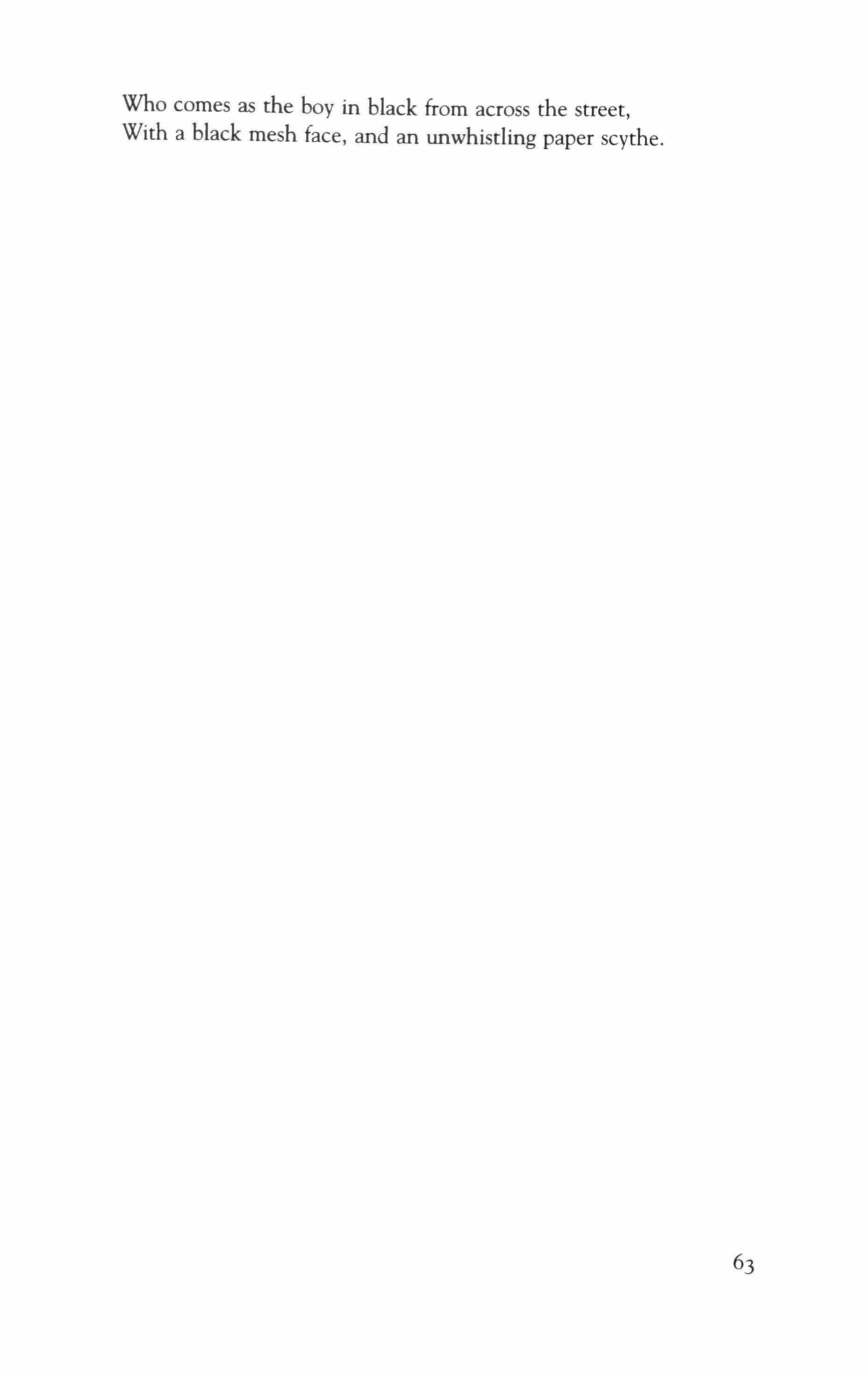
Who comes as the boy in black from across the street, With a black mesh face, and an unwhisrling paper scythe.
Elaine Equi
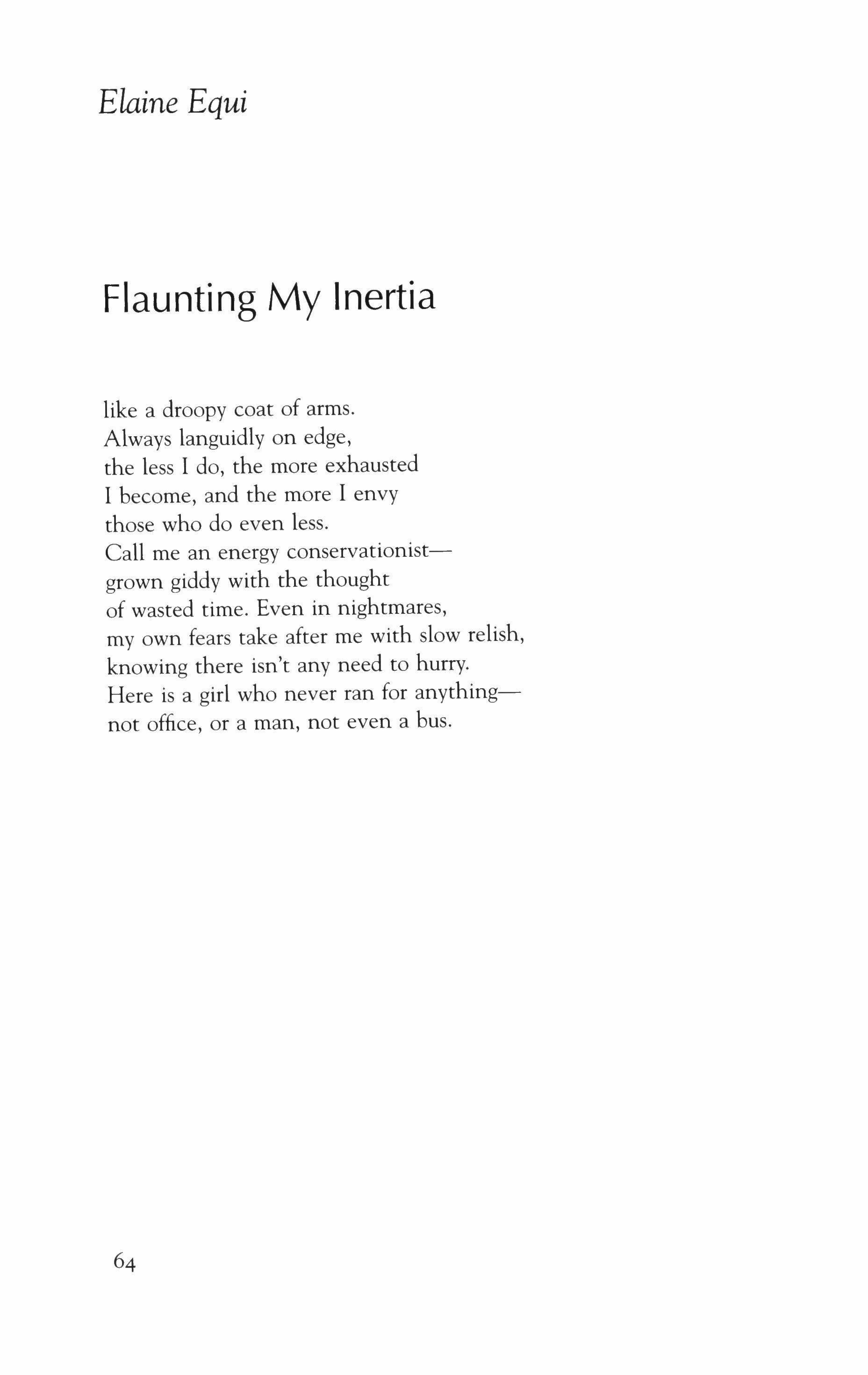
Flaunting My Inertia
like a droopy coat of arms. Always languidly on edge, the less I do, the more exhausted I become, and the more I envy those who do even less. Call me an energy conservationistgrown giddy with the thought of wasted time. Even in nightmares, my own fears take after me with slow relish, knowing there isn't any need to hurry. Here is a girl who never ran for anythingnot office, or a man, not even a bus.
Today is the First Day of the Rest of You r Life
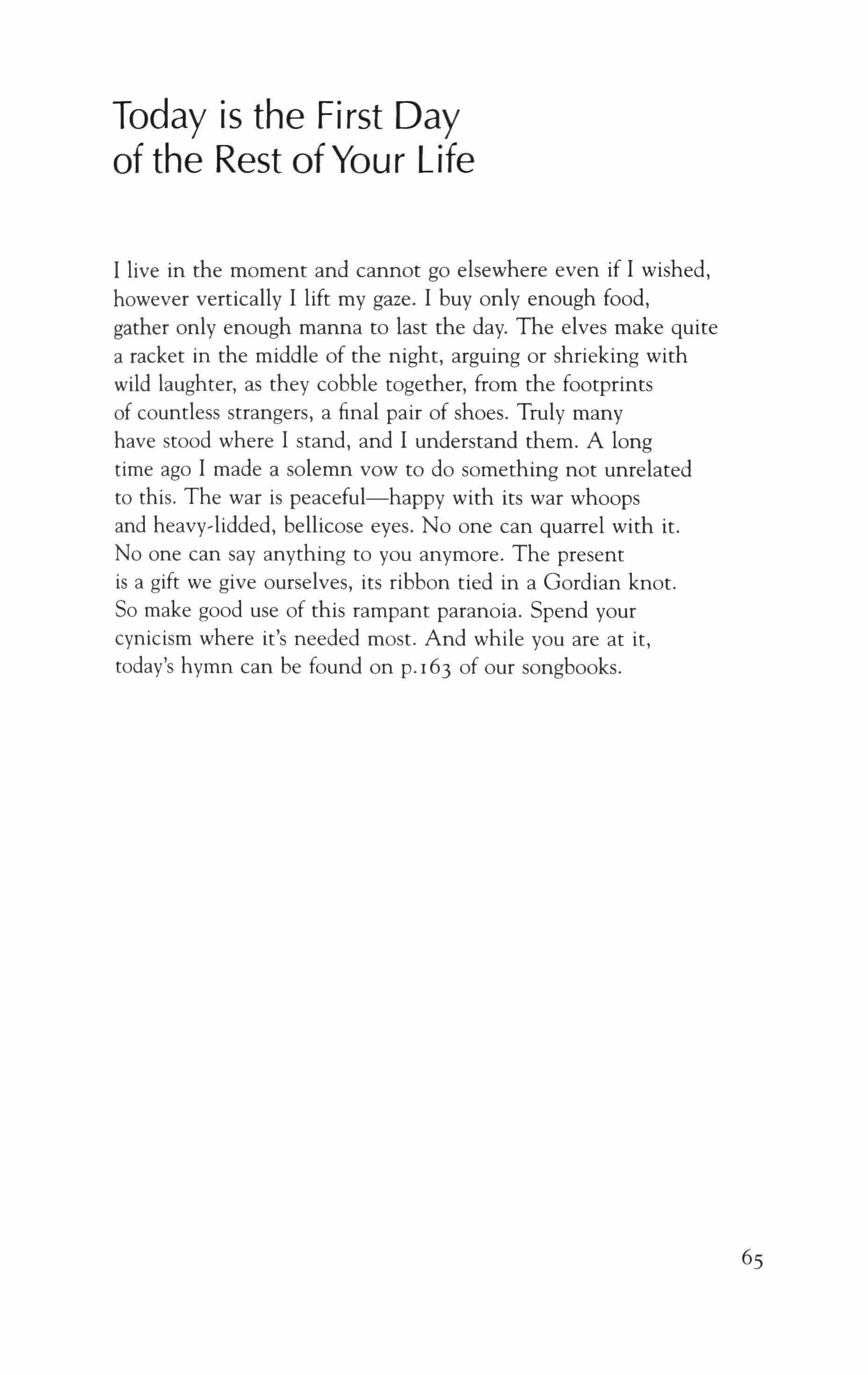
I live in the moment and cannot go elsewhere even if I wished, however vertically I lift my gaze. I buy only enough food, gather only enough manna to last the day. The elves make quite a racket in the middle of the night, arguing or shrieking with wild laughter, as they cobble together, from the footprints of countless strangers, a final pair of shoes. Truly many have stood where I stand, and I understand them. A long time ago I made a solemn vow to do something not unrelated to this. The war is peaceful-happy with its war whoops and heavy-lidded, bellicose eyes. No one can quarrel with it. No one can say anything to you anymore. The present is a gift we give ourselves, its ribbon tied in a Gordian knot. So make good use of this rampant paranoia. Spend your cynicism where it's needed most. And while you are at it, today's hymn can be found on P.I63 of our songbooks.
Arthur R. Gold

Chest Cancer
A flash of somber red Against the Maine-drenched green, Back of the Victory Garden, As we kids crouched under the sun, Weeding. It was the only sight of fox I ever had. In the Jersey winter I thought ah if I could have held That fox in my line of sight.
On our way to have my septum removed My father told me of the foxcub and The Spartan boy. He meant to encourage.
I was guilty of telling the same cruel tale To the same end, to my little girl Anna, Who when it was over and done with asked What did the Spartans have against pets.
But afterwards in the car when I complained Of the hurt he held me against his chest. So Anna holds her cat Rosette.
These memories and imaginations Gnaw at my repose.
66
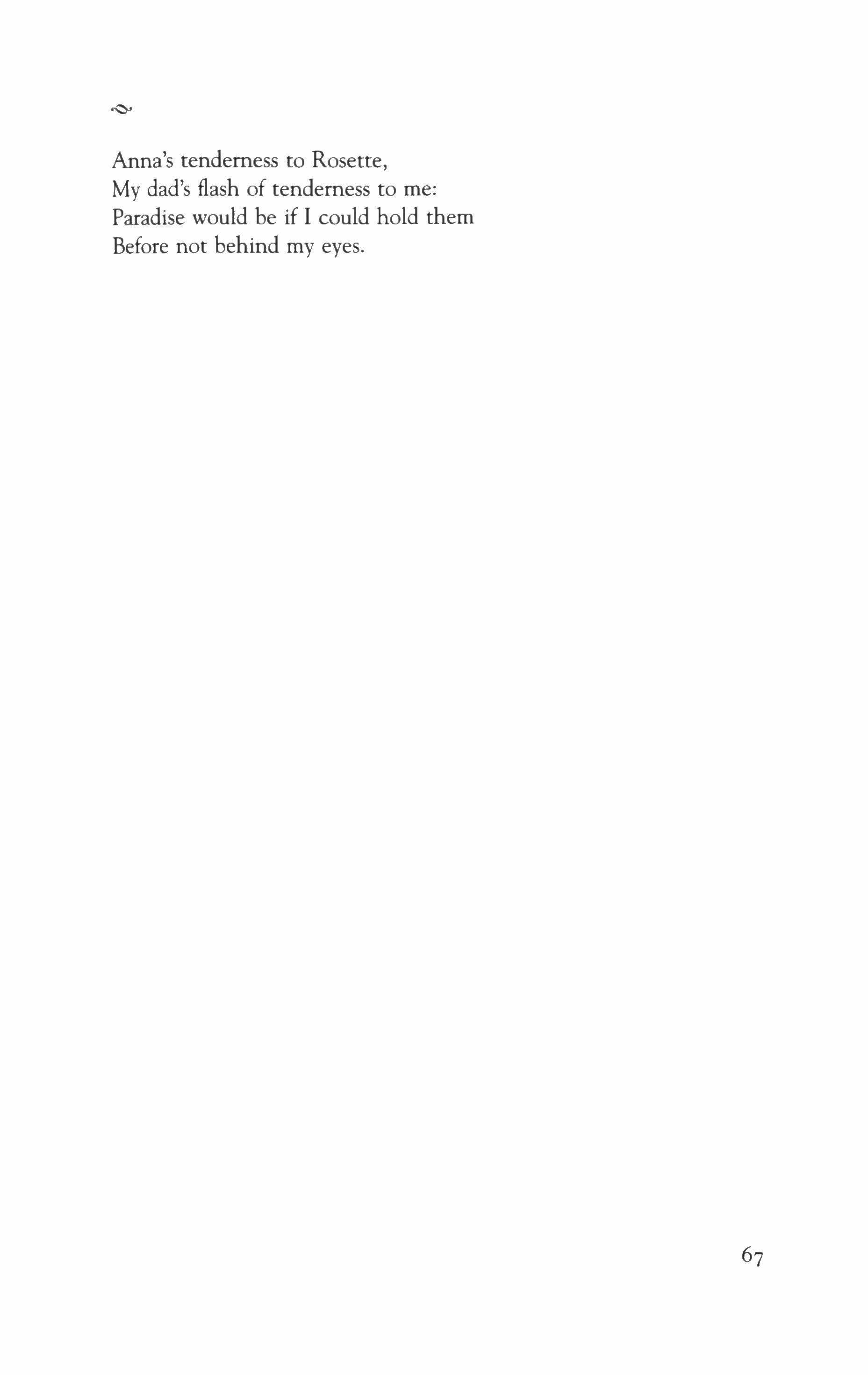
Anna's tenderness to Rosette, My dad's flash of tenderness to me: Paradise would be if I could hold them Before not behind my eyes.
David Ferry
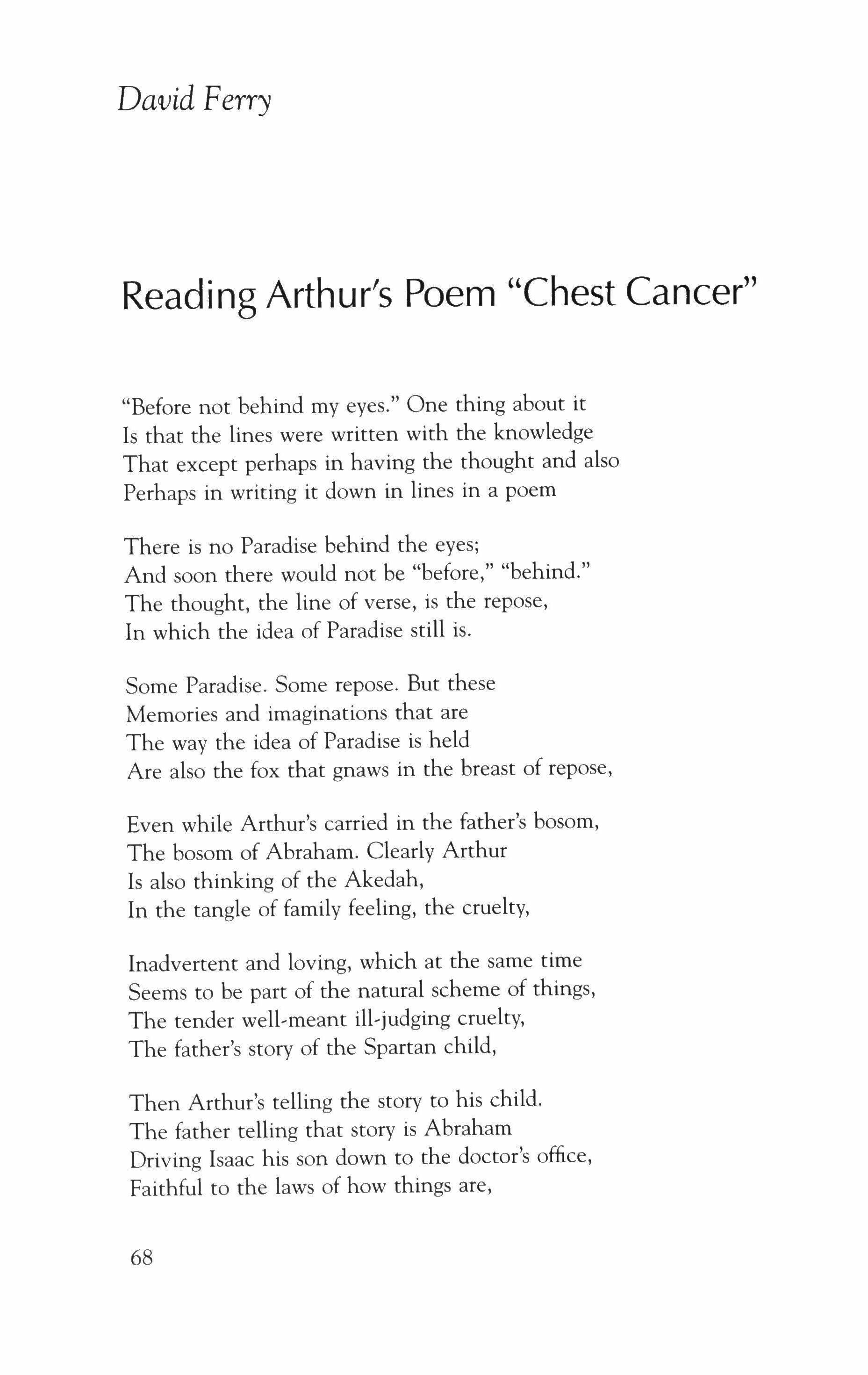
Reading Arthur's Poem "Chest Cancer"
"Before not behind my eyes." One thing about it Is that the lines were written with the knowledge That except perhaps in having the thought and also Perhaps in writing it down in lines in a poem
There is no Paradise behind the eyes; And soon there would not be "before," "behind." The thought, the line of verse, is the repose, In which the idea of Paradise still is.
Some Paradise. Some repose. But these Memories and imaginations that are The way the idea of Paradise is held Are also the fox that gnaws in the breast of repose,
Even while Arthur's carried in the father's bosom, The bosom of Abraham. Clearly Arthur Is also thinking of the Akedah, In the tangle of family feeling, the cruelty,
Inadvertent and loving, which at the same time Seems to be part of the natural scheme of things, The tender well-meant ill-judging cruelty, The father's story of the Spartan child,
Then Arthur's telling the story to his child. The father telling that story is Abraham Driving Isaac his son down to the doctor's office, Faithful to the laws of how things are,
68

Except that in this poem instead of the ram Caught in the branches there to save Isaac's life, There is the sighting of the fox that summer, The cancer, the bosom friend, behind the garden.
In our consenting, by the ways we spend Our days obeying the laws of how things are, We deliver up each other unto the God, Until one day no ram is caught in the thicket.
Jubilate South Philly: City Fourteen
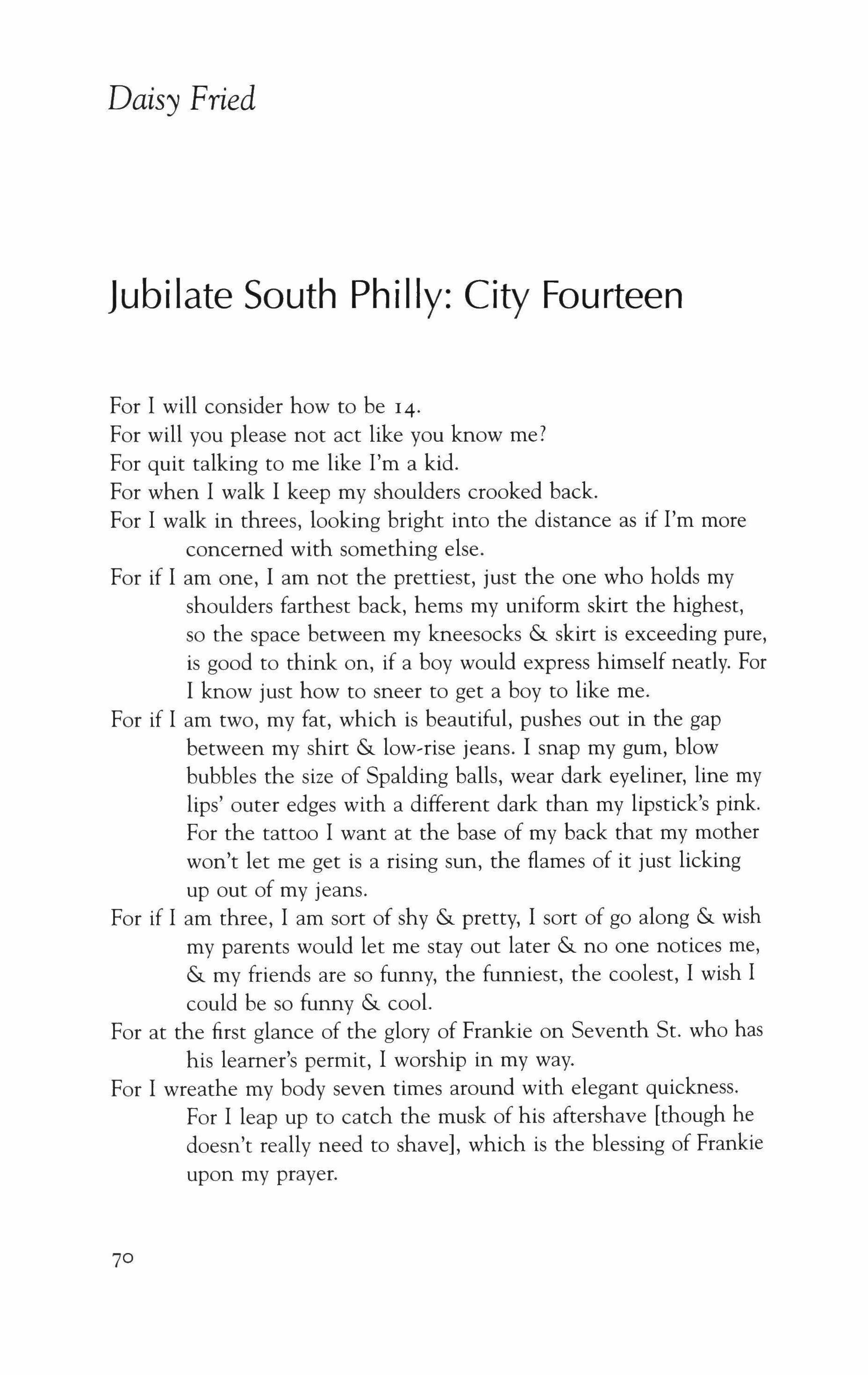
For I will consider how to be 14.
For will you please not act like you know me?
For quit talking to me like I'm a kid.
For when I walk I keep my shoulders crooked back.
For I walk in threes, looking bright into the distance as if I'm more concerned with something else.
For if I am one, I am not the prettiest, just the one who holds my shoulders farthest back, hems my uniform skirt the highest, so the space between my kneesocks & skirt is exceeding pure, is good to think on, if a boy would express himself neatly. For I know just how to sneer to get a boy to like me.
For if I am two, my fat, which is beautiful, pushes out in the gap between my shirt & low,rise jeans. I snap my gum, blow bubbles the size of Spalding balls, wear dark eyeliner, line my lips' outer edges with a different dark than my lipstick's pink. For the tattoo I want at the base of my back that my mother won't let me get is a rising sun, the flames of it just licking up out of my jeans.
For if I am three, I am sort of shy & pretty, I sort of go along & wish my parents would let me stay out later & no one notices me, & my friends are so funny, the funniest, the coolest, I wish I could be so funny & cool.
For at the first glance of the glory of Frankie on Seventh St. who has his leamer's permit, I worship in my way.
For I wreathe my body seven times around with elegant quickness. For I leap up to catch the musk of his aftershave [though he doesn't really need to shave], which is the blessing of Frankie upon my prayer.
Daisy Fried

For I roll upon prank to work it in, ie, sometimes he touches my elbow & I think I'll never wash again.
For last year everyone had henna tattoos & those little stretchy chain chokers & this year without saying anything, no one's wearing them anymore, why didn't I notice?
For I look up at my friends for instructions.
For we go in quest for food: jalapeno poppers, diet cokes, cheesesteak with
For I can tread to all the measures upon the musick: Shakira, Eve, Christina Aguilera
For I have this certain gesture: I bend my arm up, crook my hand, fingers somewhere between loose & tense, palm down.
For accompanying the gesture, I let loose a little sharp breath.
For I go tsk!
For I have HAD IT, I'm UP TO HERE!
For ok, it's overdramatic, it's too much, but like what am I supposed to do, spraggle upon waggle at the word of command?
For I shall yell at my sister.
For I am tenacious of my point.
For ohmigod Reenie just went & got her bellybutton pierced & her mother's gonna kill her. No she ain't says Reenie, & everybody giggles so hard they're leaning sideways.
For they are falling down almost.
For at fourteen I am not too young to be sexy & not too old to fight with the nine year olds on the block.
For naaaoooooowwwooooo! I cry, & [u-uuuclc yeeaaooowww I say.
For the doubling of diphthongs is the improvement of the arguer's talent.
For we stand in the light on the corner again tonight, the boys come around like most times, & this old man, like 35 at least, says you girls get home what are you doing out so late & Reenie sasses him & he walks away & ohmigod it's so funny.
For shall I not be good & sweet?
For shall I not be important?
For I am mean to the dog.
For I swear at it. Then I am nice to the dog, see how nice, see how animal-loving, I hug this furry thing, & bury my face, my only friend. Ew, you smell, get away from me.
For I brush my hair hard; it snaps & floats heavenward.
For in brushing of it I perceive light about it both wax & fire.
71
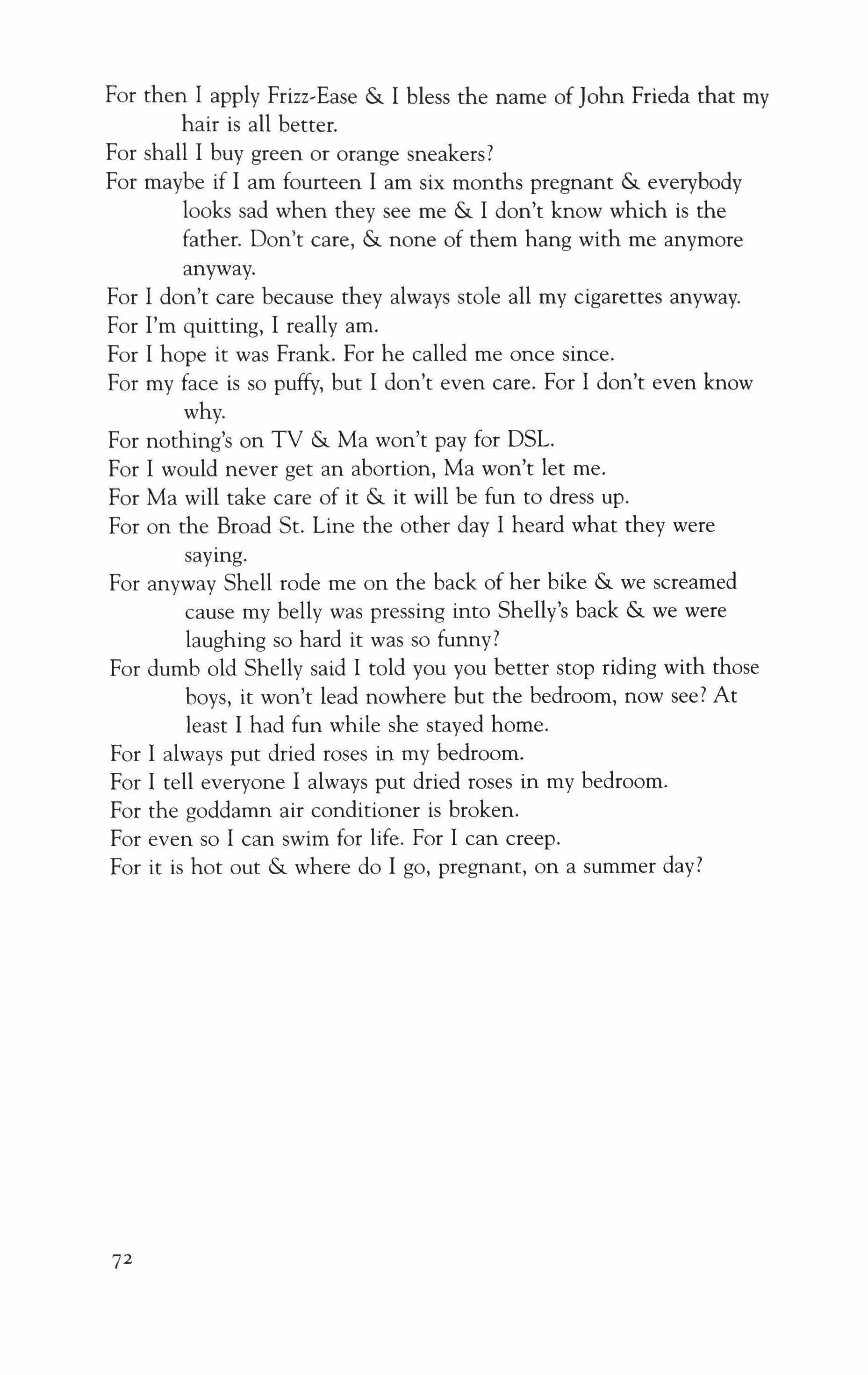
For then I apply Frizz-Ease & I bless the name of john Frieda that my hair is all better.
For shall I buy green or orange sneakers?
For maybe if I am fourteen I am six months pregnant & everybody looks sad when they see me & I don't know which is the father. Don't care, & none of them hang with me anymore anyway.
For I don't care because they always stole all my cigarettes anyway.
For I'm quitting, I really am.
For I hope it was Frank. For he called me once since.
For my face is so puffy, but I don't even care. For I don't even know why.
For nothing's on TV & Ma won't pay for DSL.
For I would never get an abortion, Ma won't let me.
For Ma will take care of it & it will be fun to dress up.
For on the Broad St. Line the other day I heard what they were saying.
For anyway Shell rode me on the back of her bike & we screamed cause my belly was pressing into Shelly's back & we were laughing so hard it was so funny?
For dumb old Shelly said I told you you better stop riding with those boys, it won't lead nowhere but the bedroom, now see? At least I had fun while she stayed home.
For I always put dried roses in my bedroom.
For I tell everyone I always put dried roses in my bedroom.
For the goddamn air conditioner is broken.
For even so I can swim for life. For I can creep.
For it is hot out & where do I go, pregnant, on a summer day?
The Drunkard's Bar
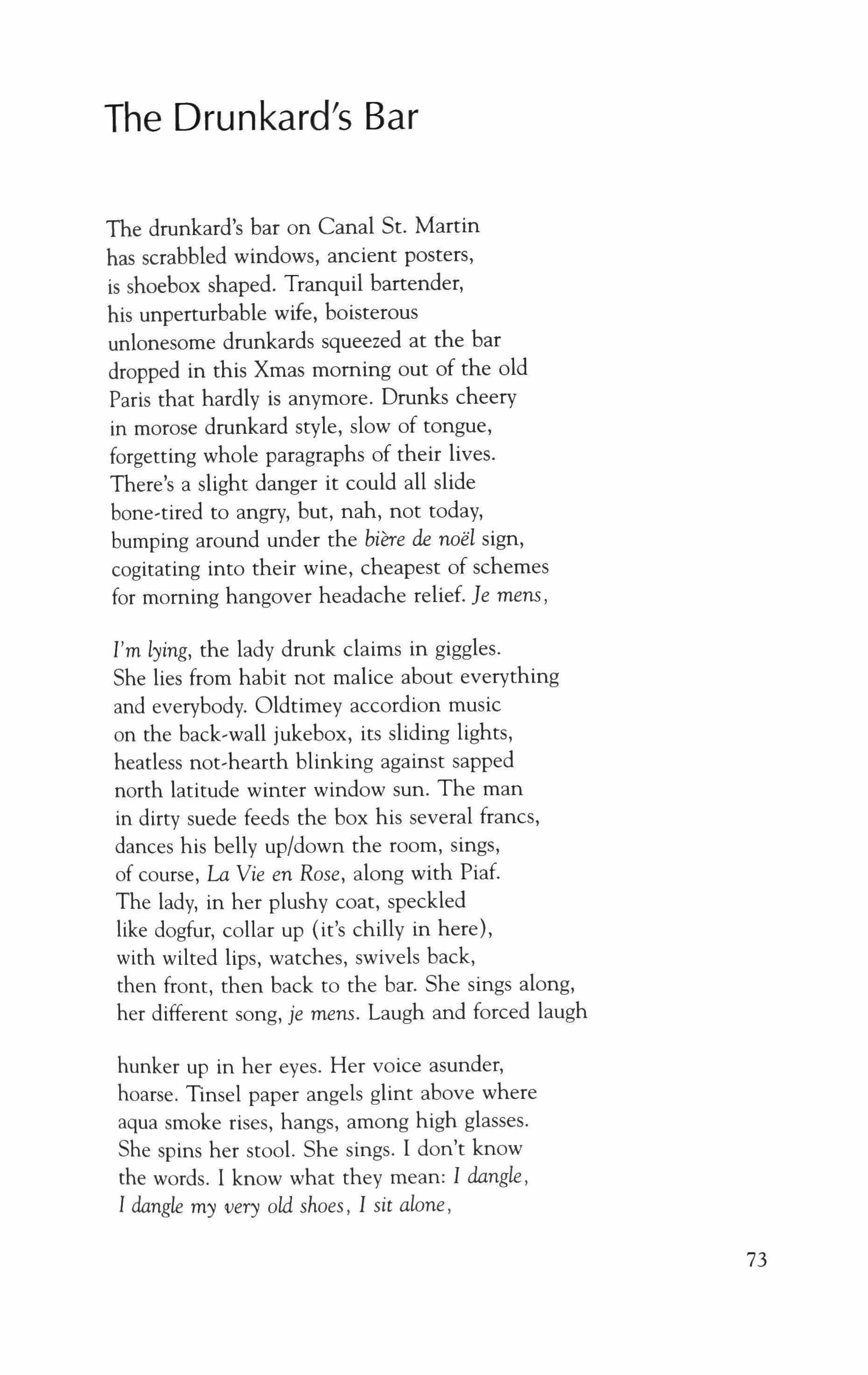
The drunkard's bar on Canal St. Martin has scrabbled windows, ancient posters, is shoebox shaped. Tranquil bartender, his unperturbable wife, boisterous unlonesome drunkards squeezed at the bar dropped in this Xmas morning out of the old Paris that hardly is anymore. Drunks cheery in morose drunkard style, slow of tongue, forgetting whole paragraphs of their lives. There's a slight danger it could all slide bone-tired to angry, but, nah, not today, bumping around under the biere de noel sign, cogitating into their wine, cheapest of schemes for morning hangover headache relief. [e mens,
I'm lying, the lady drunk claims in giggles. She lies from habit not malice about everything and everybody. Oldtimey accordion music on the back-wall jukebox, its sliding lights, heatless not-hearth blinking against sapped north latitude winter window sun. The man in dirty suede feeds the box his several francs, dances his belly up/down the room, sings, of course, La Vie en Rose, along with Piaf, The lady, in her plushy coat, speckled like dogfur, collar up (it's chilly in here), with wilted lips, watches, swivels back, then front, then back to the bar. She sings along, her different song, je mens. Laugh and forced laugh
hunker up in her eyes. Her voice asunder, hoarse. Tinsel paper angels glint above where aqua smoke rises, hangs, among high glasses. She spins her stool. She sings. I don't know the words. I know what they mean: 1 dangle, 1 dangle my very old shoes, 1 sit alone,
73

he lurches past, he likes me I think, she sings, or maybe not, but you know in the fairy tale the girl who was so nice she spat jewels when she talked, and the other who wasn't and so spat toads, snakes, salamanders? It's not true. There was only one girl and what came out of her mouth was an iguana, and its lewd toes were spangled with emeralds.
74
David Gewanter
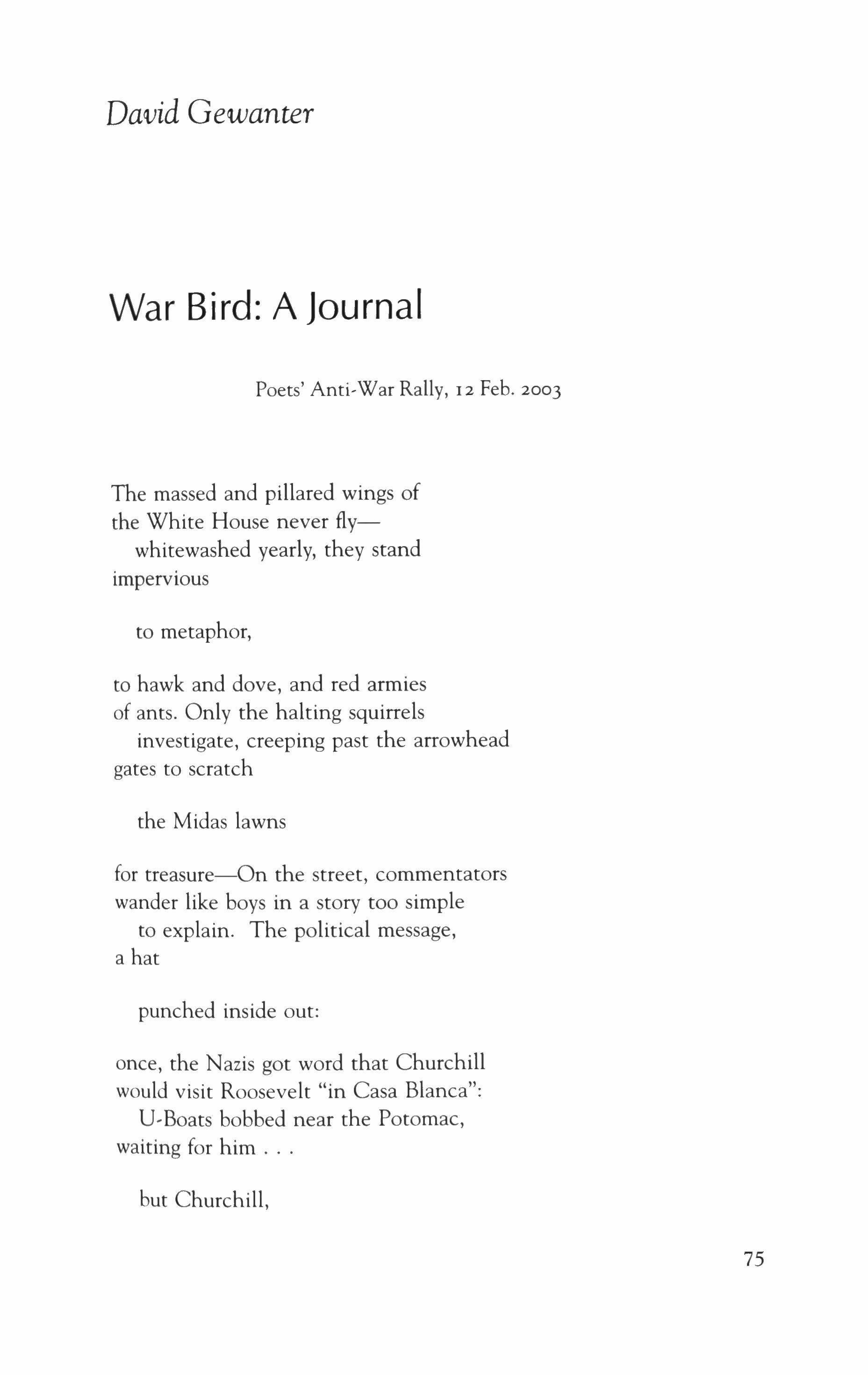
War Bird: A Journal
Poets' Anti-War Rally, 12 Feb. 2003
The massed and pillared wings of the White House never flywhitewashed yearly, they stand impervious to metaphor,
to hawk and dove, and red armies of ants. Only the halting squirrels investigate, creeping past the arrowhead gates to scratch the Midas lawns
for treasure-On the street, commentators wander like boys in a story too simple to explain. The political message, a hat
punched inside out:
once, the Nazis got word that Churchill would visit Roosevelt "in Casa Blanca": U-Boats bobbed near the Potomac, waiting for him but Churchill,
75

as he said, was sailing to Morocco. Reagan protesters splashed the Pentagon walls daily with cow bloodsoldiers waxed
the plaster, and triremes
of rats licked the bloody grass; the EPA sent health goons to stomp them, and the pacifists, awayThen rats stormed the National Zoo:
urbane, patient inheritors of the earth, they snapped prairie dogs like wishbones; vigilante zookeepers laced the ground with poison,
Carthage delenda est, and killed the hippo. (Here, in the New World Order, penguin and polar bear soak up ozone, and Nation shall beat them both
into ploughshares )
Hawks and fat cats disdained the White House squirrels, their proconsul Chevy Suburban nosed us aside: we spoke against the war, and for the cameras, spelled our names on Chinese Radio-Elder poets shrewdly loitered at the lobbiest bar, read first, then left us

to the falange of Secret Servicemen, chatting like critics into their black lapels at every bungled line: this was no singing school,
no falcon heard our crows and warbles Emily, our modest leader, rapped the gate: "Mrs. Bush wanted American poemsI brought 3,000, all against the war. Can you take them?" Gulping, the pimply guard asked his shirt for help; older hands hustled up, "The Great Oz cannot see you etc.
Will four and twenty blackbirds fill a cowboy hat? Bunkered belowdecks, the President goes for the bum, racing the cut tongue of his treadmill to a dead heat. Even Nixon met the enemy once, strode with his staff into a red sea of hippiesthey didn't part, and he burbled about baseball from his desk, he liked to watch the sightseers through a gap in the hedges; peacenicks
77

learned this and blocked his view, stood there day and night for years: Nixon, nightmare reality shanking through his eyes,
knelt with Kissinger:
Henry, he moaned, what do they want?
Days from now, how many days, the Valentine "Woo at the Zoo" begins. A hand,raised falcon bows, and shares meat with its master He bows in tum, and eats; both softly whisper ee-chu, ee-chu,
a duet
heard only on abstract and crumbling cliffs-if a man were to stand or sing there, he'd fall. The master straps on a falcon feathered
courtesan's hat and turns awayFlapping wildly, the falcon claws the head-shape, squawking, gyrating to hold on,
imperial lunge and lunge, biting at the skull it fed, as semen slowly drips into a rubber dam.
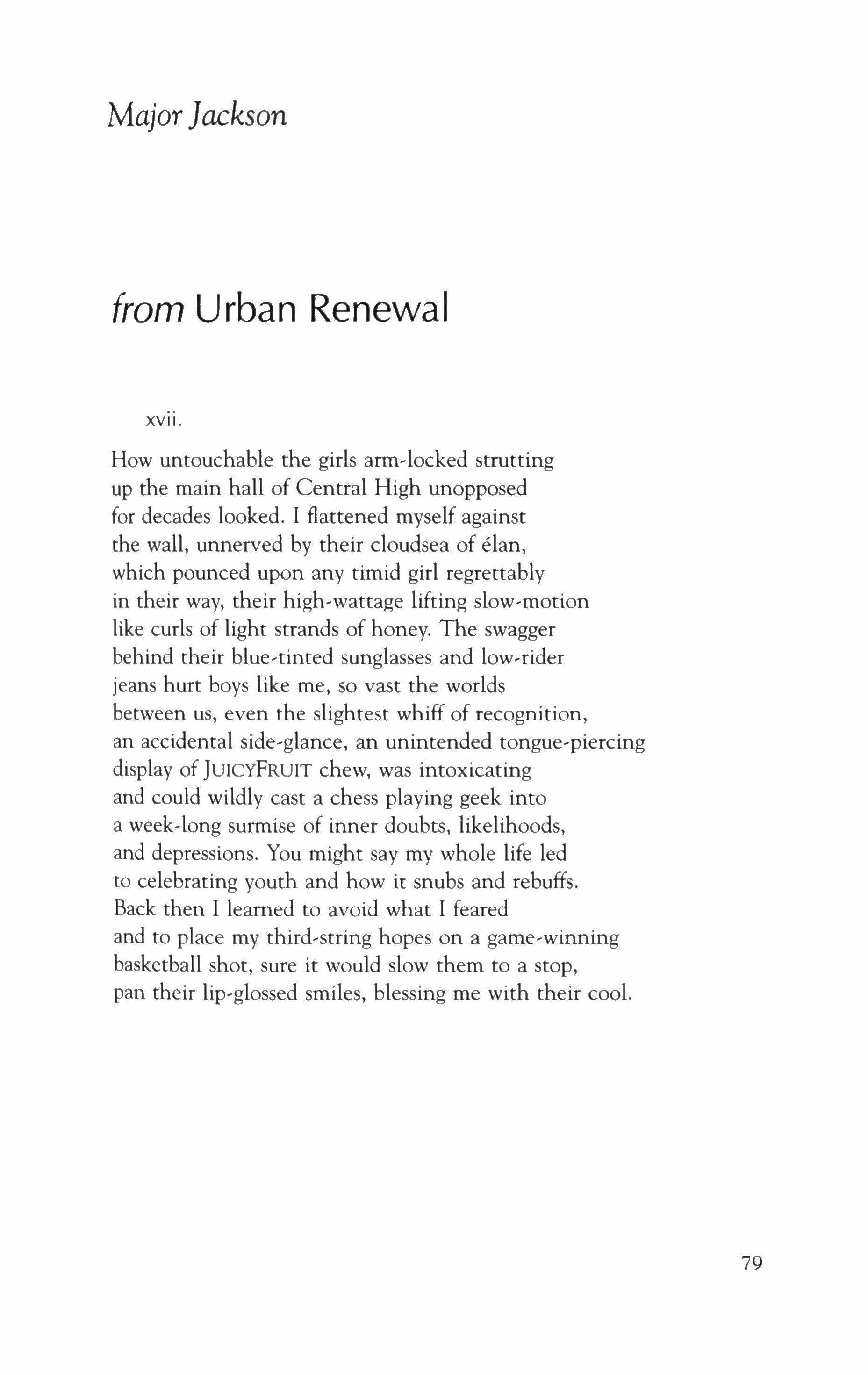
MajorJackson from Urban Renewal
xvii.
How untouchable the girls arm-locked strutting up the main hall of Central High unopposed for decades looked. I flattened myself against the wall, unnerved by their cloudsea of elan, which pounced upon any timid girl regrettably in their way, their high-wattage lifting slow-motion like curls of light strands of honey. The swagger behind their blue-tinted sunglasses and low-rider jeans hurt boys like me, so vast the worlds between us, even the slightest whiff of recognition, an accidental side-glance, an unintended tongue-piercing display of )ulcyFRUIT chew, was intoxicating and could wildly cast a chess playing geek into a week-long surmise of inner doubts, likelihoods, and depressions. You might say my whole life led to celebrating youth and how it snubs and rebuffs. Back then I learned to avoid what I feared and to place my third-string hopes on a game-winning basketball shot, sure it would slow them to a stop, pan their lip-glossed smiles, blessing me with their cool.
79
Mary Kinzie

Rooms by the City: Three Undated Poems by
Louise Bogan (1897-1970)
The American lyric poet Louise Bogan is not usually thought of as a realist. She does not typically describe, in her poems, the interiors, with their furniture and their fabrics and their moods, or the landscapes, settled and wild, so altered by the cast of light and seasonal weathers, by gardens and blank walls, to which she devoted so much eloquent attention in her letters and journals. And yet she was profoundly affected by the atmosphere of place, connected as such an atmosphere was to the rhythms of her working, and to the lift and fall of the horizon of her energy and her hope. Rooms appealed to her-or repelled her-in proportion to their amenability to a routine of reading and work. She repeatedly defined her emotional and artistic requirements as though all need could be considered in terms of accoutrements such as books and paper and wine and cigarettes and musicand also time and calm and humor and purpose and freedom from frenzy or exigence. Frugal out of necessity, she was drawn to Edward Hopper's painting because his interiors celebrated and poured radiant light upon an extreme bareness that she, too, could imagine having chosen for herself. But she understood that, as in Hopper, the bare room overlooking the street could also be a kind of cell, a place in which one could be forced to grow old, eating less and less, haunted by the past one could no longer recover, hearing the other pensioners gossip on the stair. That such a future could be the other side of triumphantly achieved and fruitful artistic solitude is suggested by a series of undated drafts of a poem she called "Fantasy."
80
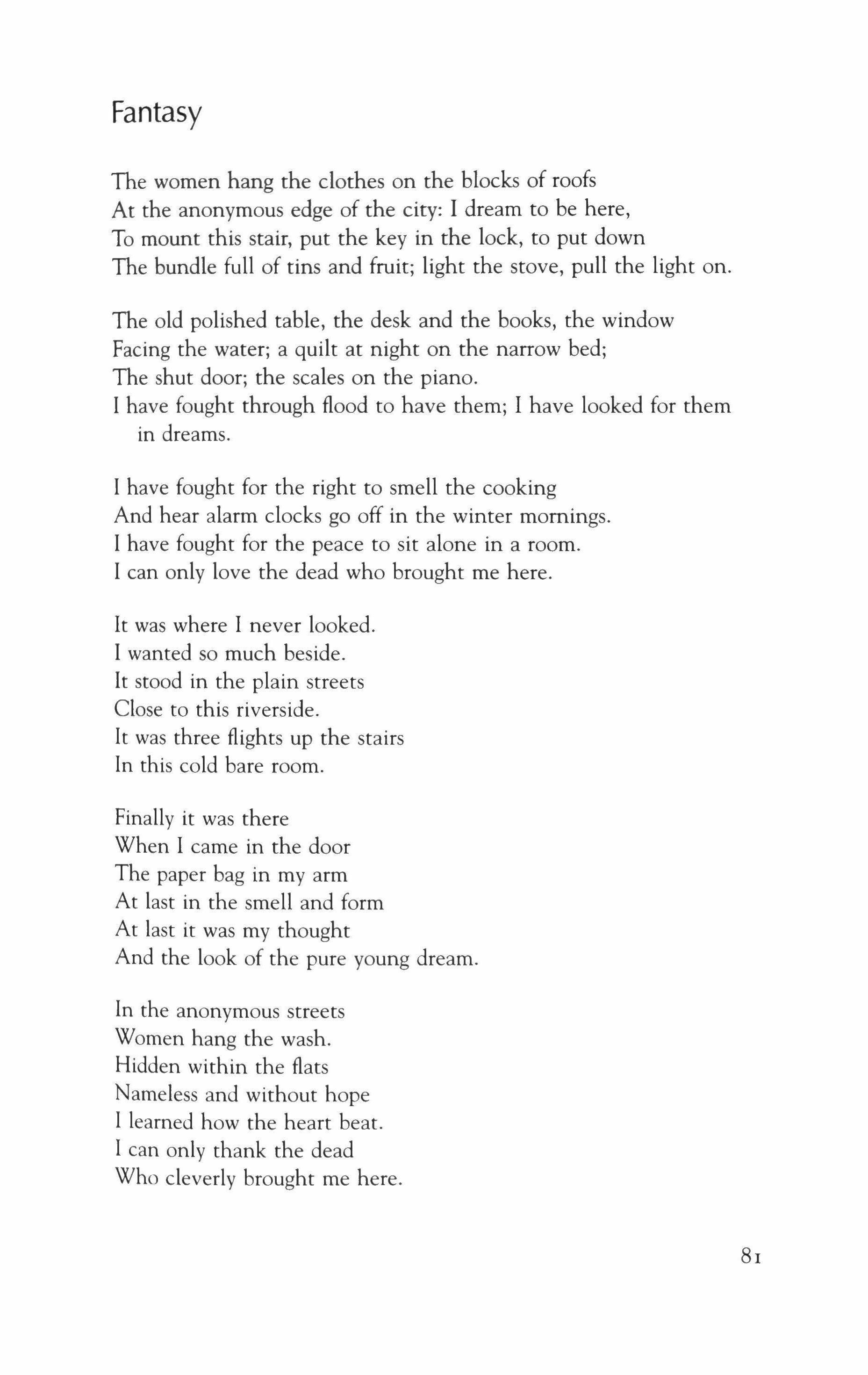
Fantasy
The women hang the clothes on the blocks of roofs
At the anonymous edge of the city: I dream to be here, To mount this stair, put the key in the lock, to put down
The bundle full of tins and fruit; light the stove, pull the light on.
The old polished table, the desk and the books, the window
Facing the water; a quilt at night on the narrow bed; The shut door; the scales on the piano.
I have fought through flood to have them; I have looked for them in dreams.
I have fought for the right to smell the cooking And hear alarm clocks go off in the winter mornings.
I have fought for the peace to sit alone in a room.
I can only love the dead who brought me here.
It was where I never looked.
I wanted so much beside.
It stood in the plain streets
Close to this riverside.
It was three flights up the stairs
In this cold bare room.
Finally it was there
When I came in the door
The paper bag in my arm
At last in the smell and form
At last it was my thought
And the look of the pure young dream.
In the anonymous streets
Women hang the wash.
Hidden within the flats
Nameless and without hope
I learned how the heart beat.
I can only thank the dead
Who cleverly brought me here.

Two abstract presences move in the poem. "The dead" are as peculiar to this speaker as is her "pure young dream," the latter a projection of her identity at an earlier time, toward whom the I feels bound as by a debt of obligation, no less than by the force of her identification with its emergence. That young dream reminds us of two other characters cast up by Bogan's intense personifying habit, Little Lobelia and the Sleeping Fury (both of them driven out of dreams, and marked by their weeping). The dead in "Fantasy" are also personifications, but linked more closely to other people in her life, who have compelled but disappointed her (her mother; her two husbands), than to herself. But by framing their actions as worthy of love and gratitude, Bogan the poet is working through and working out her openness to the idea that we carry with us our dead encounters (our helplessness, our suffocation by these figures), always meeting them, and propitiating them. So the fantasy of release and order and well-being in the rooms of the poem is founded on the ability to live at peace with events and correspondences that can never be changed.
In addition to fear and pity, one emotion with which Bogan as a temperament was all too intimate was scorn. Her headlong bravery, when she faced an uncomfortable choice, often drove her to take up the cudgels when she might, more sensibly, and even to better effect, have put them down. That self-goading pride sometimes found its embodiment in satire.
Letter to Mrs. Q's Sister
Adulterers' letters, unfortunately, are always the same. They speak of beautiful snatched experience, usually in a room shaken by trucks; The walk later, until two in the morning; the tunnel to the last train; Kisses in the shrubbery; talk by the monument; They reach the clumsy bronze statues in the alleys of parks, shaded by the late leather leaf.
So she is killed and so she is taken. So fire mounts and air breathes again.
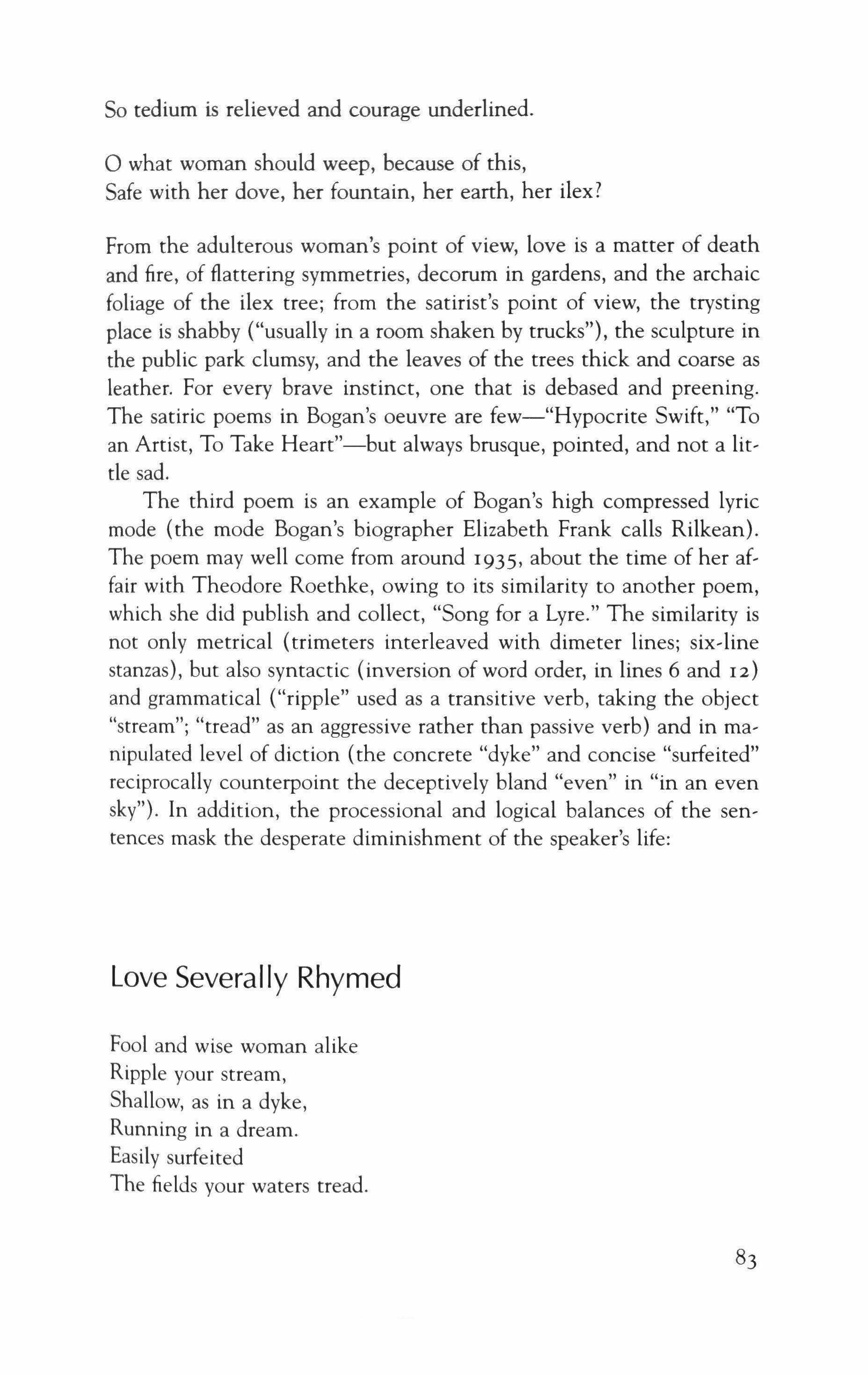
So tedium is relieved and courage underlined.
o what woman should weep, because of this, Safe with her dove, her fountain, her earth, her ilex?
From the adulterous woman's point of view, love is a matter of death and fire, of flattering symmetries, decorum in gardens, and the archaic foliage of the ilex tree; from the satirist's point of view, the trysting place is shabby {"usually in a room shaken by trucks"}, the sculpture in the public park clumsy, and the leaves of the trees thick and coarse as leather. For every brave instinct, one that is debased and preening. The satiric poems in Bogan's oeuvre are few-"Hypocrite Swift," "To an Artist, To Take Heart"-but always brusque, pointed, and not a little sad.
The third poem is an example of Bogan's high compressed lyric mode {the mode Bogan's biographer Elizabeth Frank calls Rilkean). The poem may well come from around 1935, about the time of her affair with Theodore Roethke, owing to its similarity to another poem, which she did publish and collect, "Song for a Lyre." The similarity is not only metrical (trimeters interleaved with dimeter lines; six-line stanzas), but also syntactic {inversion of word order, in lines 6 and 12} and grammatical {"ripple" used as a transitive verb, taking the object "stream"; "tread" as an aggressive rather than passive verb} and in manipulated level of diction {the concrete "dyke" and concise "surfeited" reciprocally counterpoint the deceptively bland "even" in "in an even sky"}. In addition, the processional and logical balances of the sentences mask the desperate diminishment of the speaker's life:
Love Severally Rhymed
Fool and wise woman alike
Ripple your stream, Shallow, as in a dyke, Running in a dream.
Easily surfeited
The fields your waters tread.
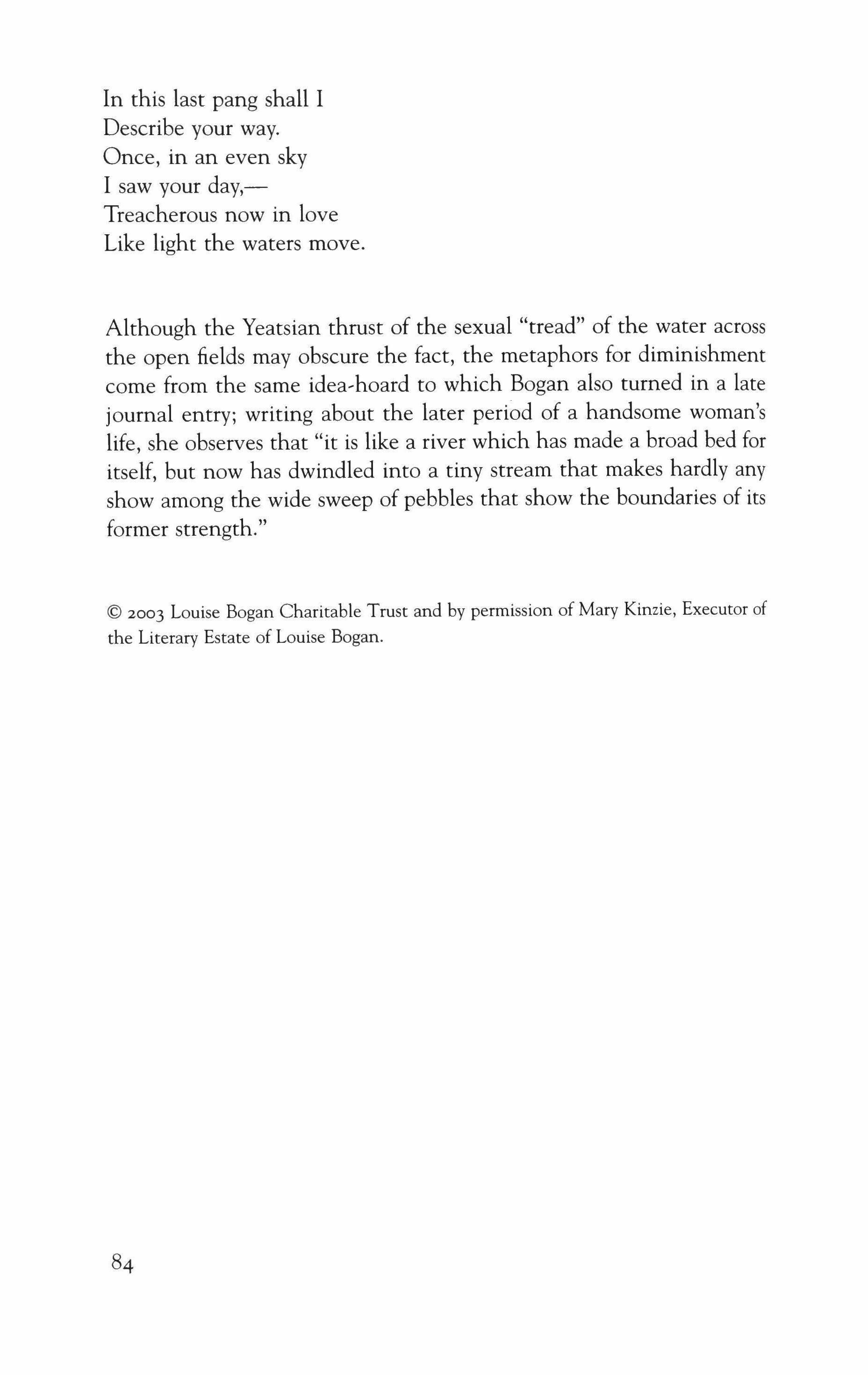
In this last pang shall I
Describe your way.
Once, in an even sky
I saw your day,
Treacherous now in love
Like light the waters move.
Although the Yeatsian thrust of the sexual "tread" of the water across the open fields may obscure the fact, the metaphors for diminishment come from the same idea-hoard to which Bogan also turned in a late journal entry; writing about the later period of a handsome woman's life, she observes that "it is like a river which has made a broad bed for itself, but now has dwindled into a tiny stream that makes hardly any show among the wide sweep of pebbles that show the boundaries of its former strength."
© 2003 Louise Bogan Charitable Trust and by permission of Mary Kinzie, Executor of the Literary Estate of Louise Bogan.
Gail Mazur

Zeppo's Fi rst Wife
"One ofDoc's cousins married one of those five brothers, the funny ones, who were they?"
"The Marx brothers?"
"Yes, them, the youngest, I don't remember the name-" "Zeppo."
"Yes, Zeppo. They got divorced. "
A late conversation with my mother
"Why should l care about posterity? What's posterity ever done for me?"
Groucho Marx
He married a cousin, or actually, my grandfather's half-brothers' cousin. No one here remembers Zeppo's first wife, related to my great half-uncles
Phil and Jesse, high-living lawyers in New York, "bachelor brothers," a little unsavory-
they dated showgirls; when Jesse invested in a Broadway play, he whispered to me he owned "a piece of Fanny!" Their father, Simon, my great-grandfather, owned a haberdashery in Rockland, Maine. Whose cousin was it
85
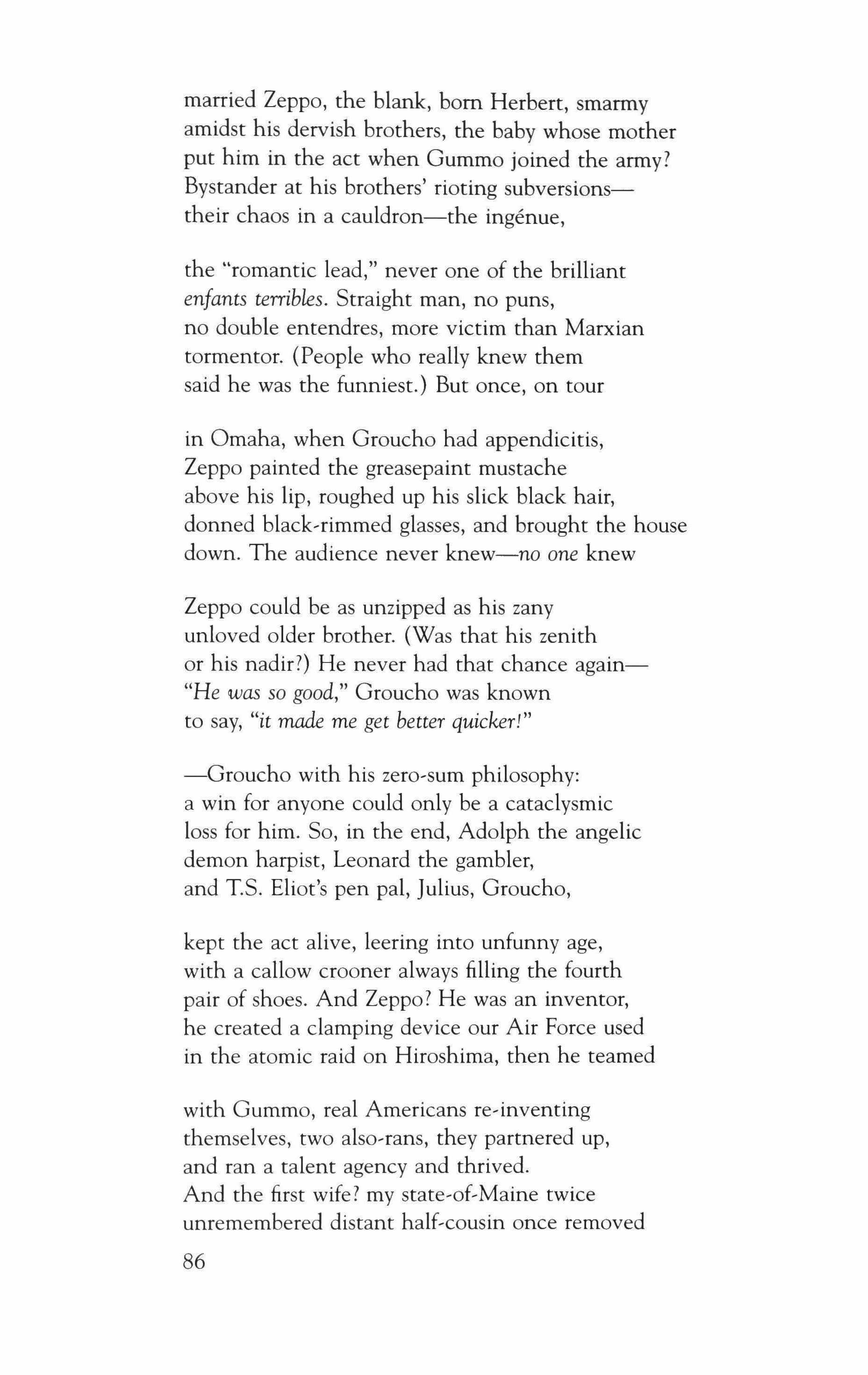
married Zeppo, the blank, born Herbert, smarmy amidst his dervish brothers, the baby whose mother put him in the act when Gummo joined the army? Bystander at his brothers' rioting subversionstheir chaos in a cauldron-the ingenue, the "romantic lead," never one of the brilliant enfants terribles. Straight man, no puns, no double entendres, more victim than Marxian tormentor. (People who really knew them said he was the funniest.) But once, on tour in Omaha, when Groucho had appendicitis, Zeppo painted the greasepaint mustache above his lip, roughed up his slick black hair, donned black,rimmed glasses, and brought the house down. The audience never knew-no one knew Zeppo could be as unzipped as his zany unloved older brother. (Was that his zenith or his nadir?) He never had that chance again"He was so good," Groucho was known to say, "it made me get better quicker!"
-Groucho with his zero-sum philosophy: a win for anyone could only be a cataclysmic loss for him. So, in the end, Adolph the angelic demon harpist, Leonard the gambler, and T.S. Eliot's pen pal, Julius, Groucho, kept the act alive, leering into unfunny age, with a callow crooner always filling the fourth pair of shoes. And Zeppo? He was an inventor, he created a clamping device our Air Force used in the atomic raid on Hiroshima, then he teamed with Gummo, real Americans re-inventing themselves, two also-rans, they partnered up, and ran a talent agency and thrived. And the first wife? my state-of-Maine twice unremembered distant half-cousin once removed
86
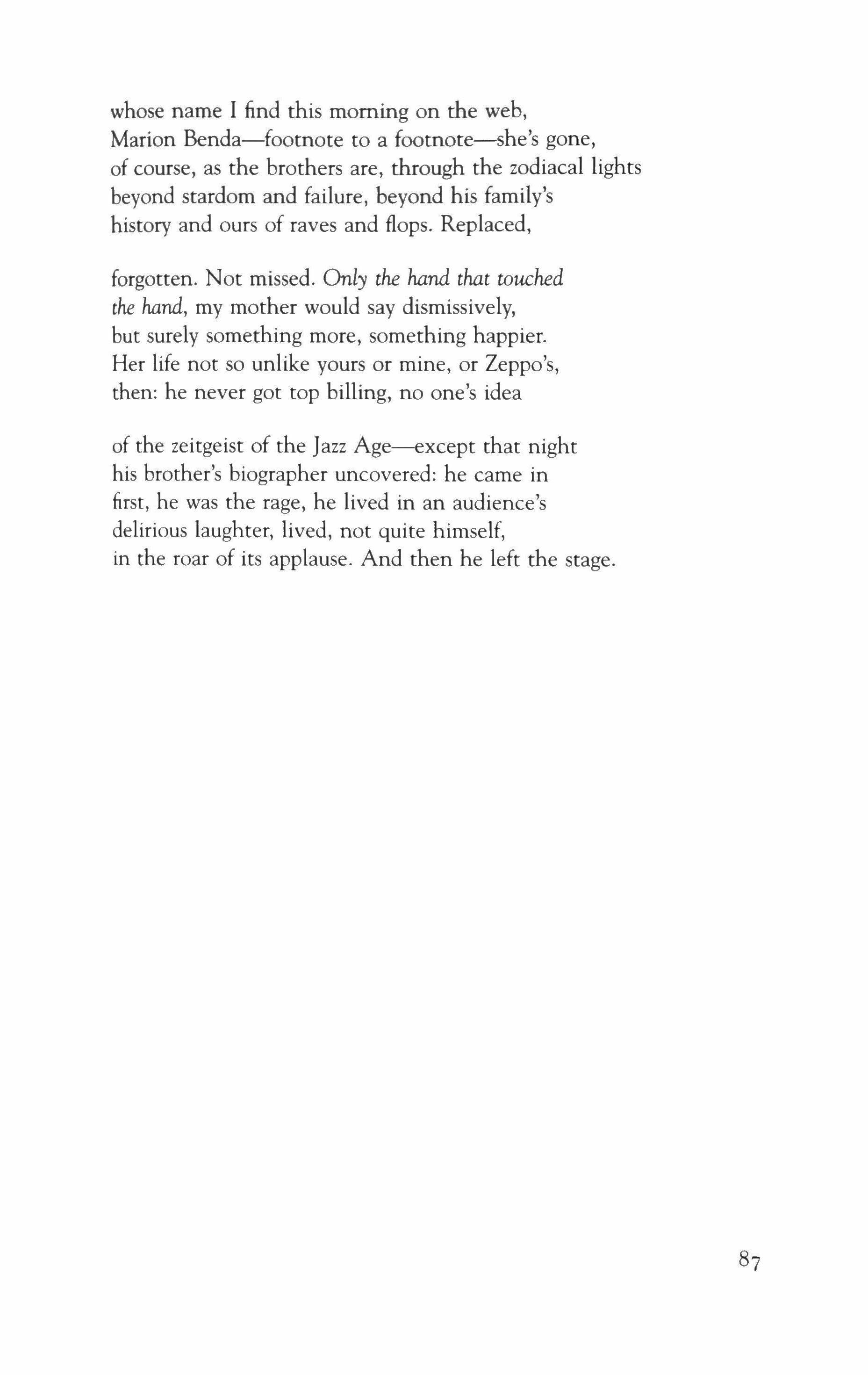
whose name I find this morning on the web, Marion Benda-footnote to a footnote-she's gone, of course, as the brothers are, through the zodiacal lights beyond stardom and failure, beyond his family's history and ours of raves and flops. Replaced, forgotten. Not missed. Only the hand that touched the hand, my mother would say dismissively, but surely something more, something happier. Her life not so unlike yours or mine, or Zeppo's, then: he never got top billing, no one's idea of the zeitgeist of the Jazz Age--except that night his brother's biographer uncovered: he came in first, he was the rage, he lived in an audience's delirious laughter, lived, not quite himself, in the roar of its applause. And then he left the stage.
Lisa McCullough
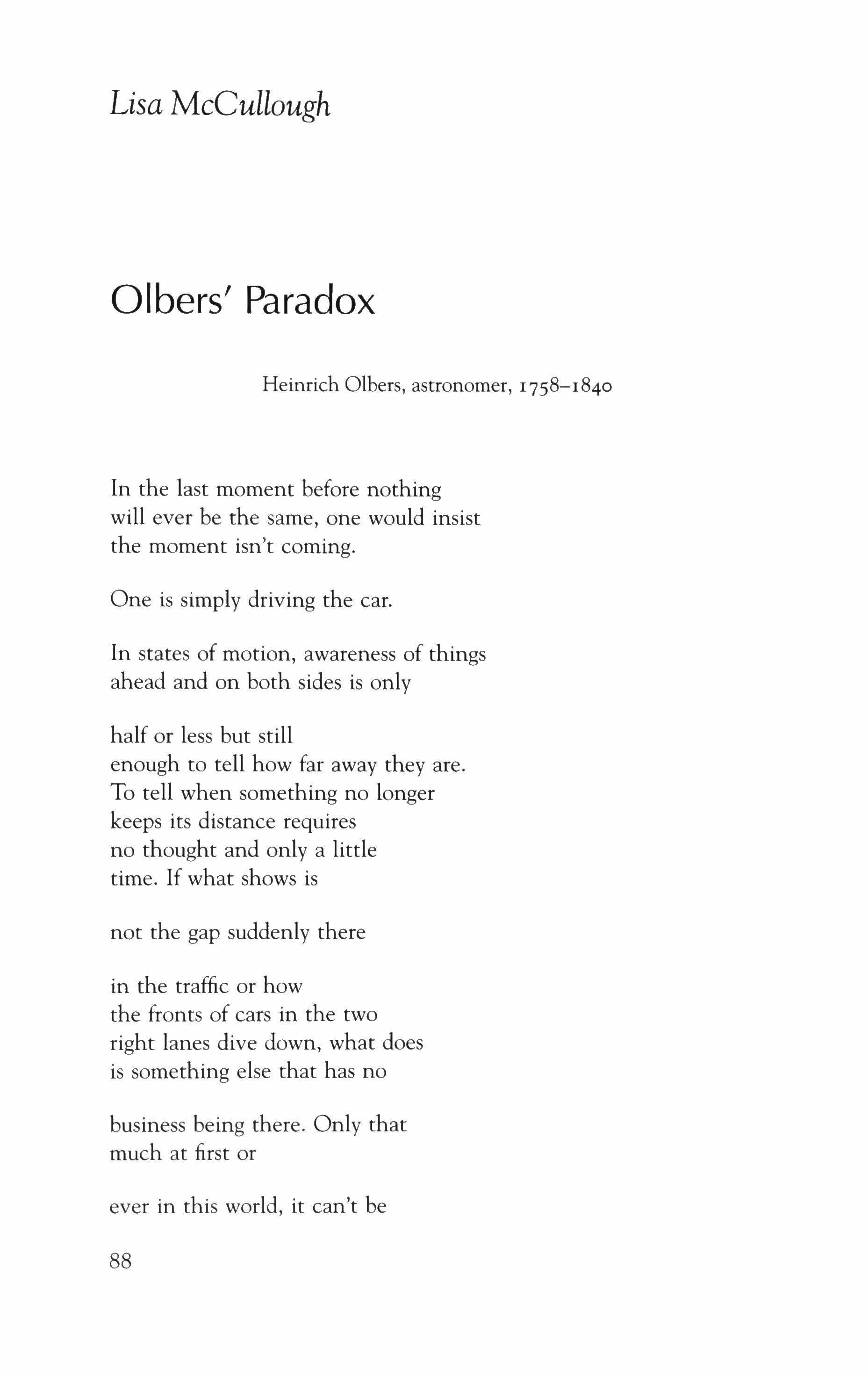
Gibers' Paradox
Heinrich Olbers, astronomer, 1758-1840
In the last moment before nothing will ever be the same, one would insist the moment isn't coming.
One is simply driving the car.
In states of motion, awareness of things ahead and on both sides is only
half or less but still enough to tell how far away they are. To tell when something no longer keeps its distance requires no thought and only a little time. If what shows is not the gap suddenly there in the traffic or how the fronts of cars in the two right lanes dive down, what does is something else that has no business being there. Only that much at first or ever in this world, it can't be
88

placed. As in the smallest imaginable fraction of time this moment has its beginning, there's only enough for the instant and
molecular blast of cause and effect at a certain brain nucleus, the part that makes
the lurch in your stomach if you tum on a street at night and see a stranger behind you. lt functions to receive sensory inputs, in this case a fairly highly processed visual stimulus by which the elements that threaten
can be recognized. Its outputs are to hypothalamus and brainstem autonomic centers. So much older
than the parts that think, and at odds with them too, it places anything that might be about to happen and governs response to preserve
the body. Over a span of years so great it took a Hindu sage his lifetime to imagine
a word for it, matter is thought
to have condensed out of primordial heat and yielded to necessity. In this way
the planet comes to be. Immense batholiths ascend from what in time is
an ocean's abyssal plain and press against the cooling upper metamorphic layers, which twist and fold aside to make
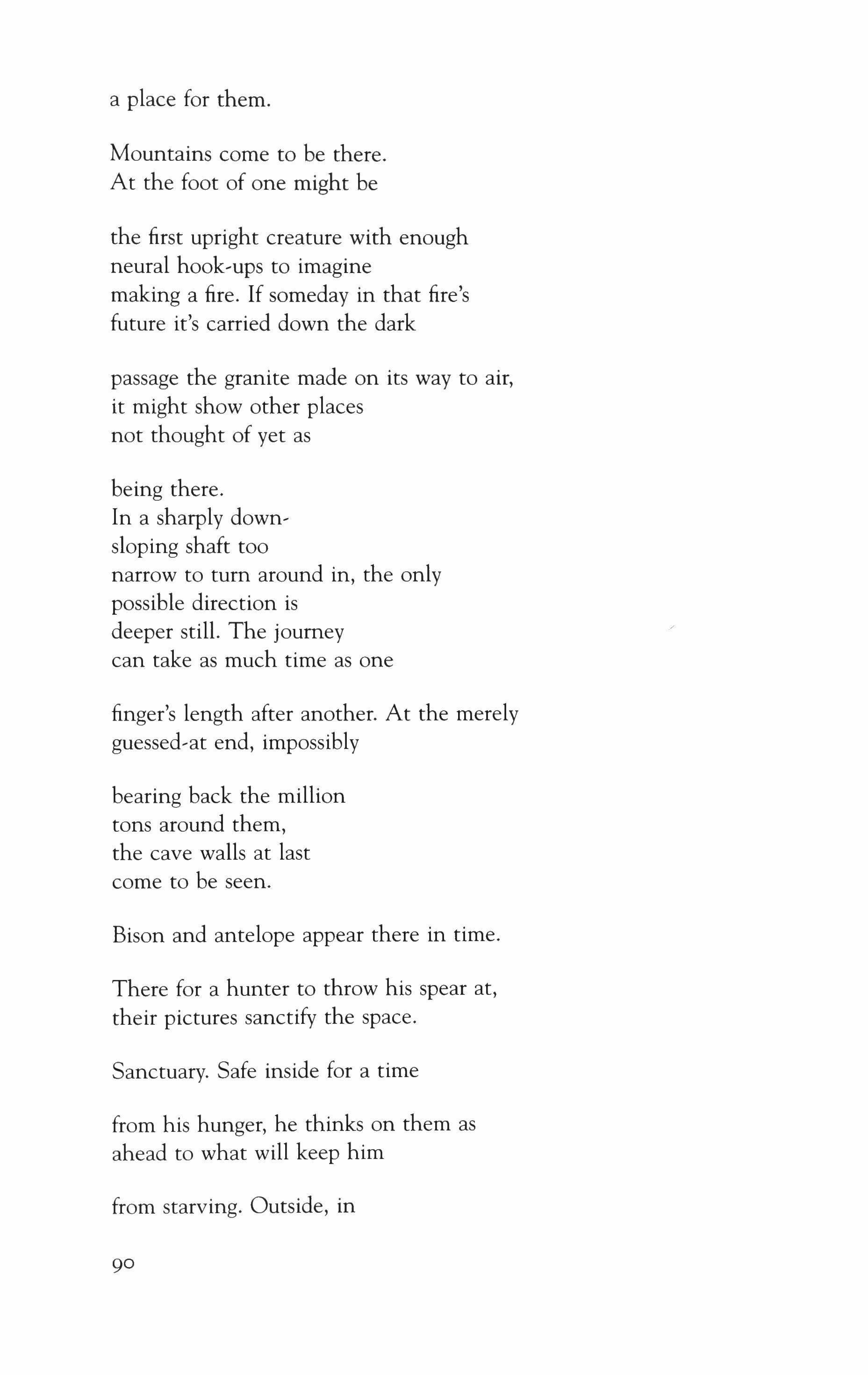
a place for them.
Mountains corne to be there. At the foot of one might be
the first upright creature with enough neural hook-ups to imagine making a fire. If someday in that fire's future it's carried down the dark
passage the granite made on its way to air, it might show other places not thought of yet as being there.
In a sharply downsloping shaft too narrow to tum around in, the only possible direction is deeper still. The journey can take as much time as one
finger's length after another. At the merely guessed-at end, impossibly
bearing back the million tons around them, the cave walls at last corne to be seen.
Bison and antelope appear there in time.
There for a hunter to throw his spear at, their pictures sanctify the space.
Sanctuary. Safe inside for a time from his hunger, he thinks on them as ahead to what will keep him from starving. Outside, in
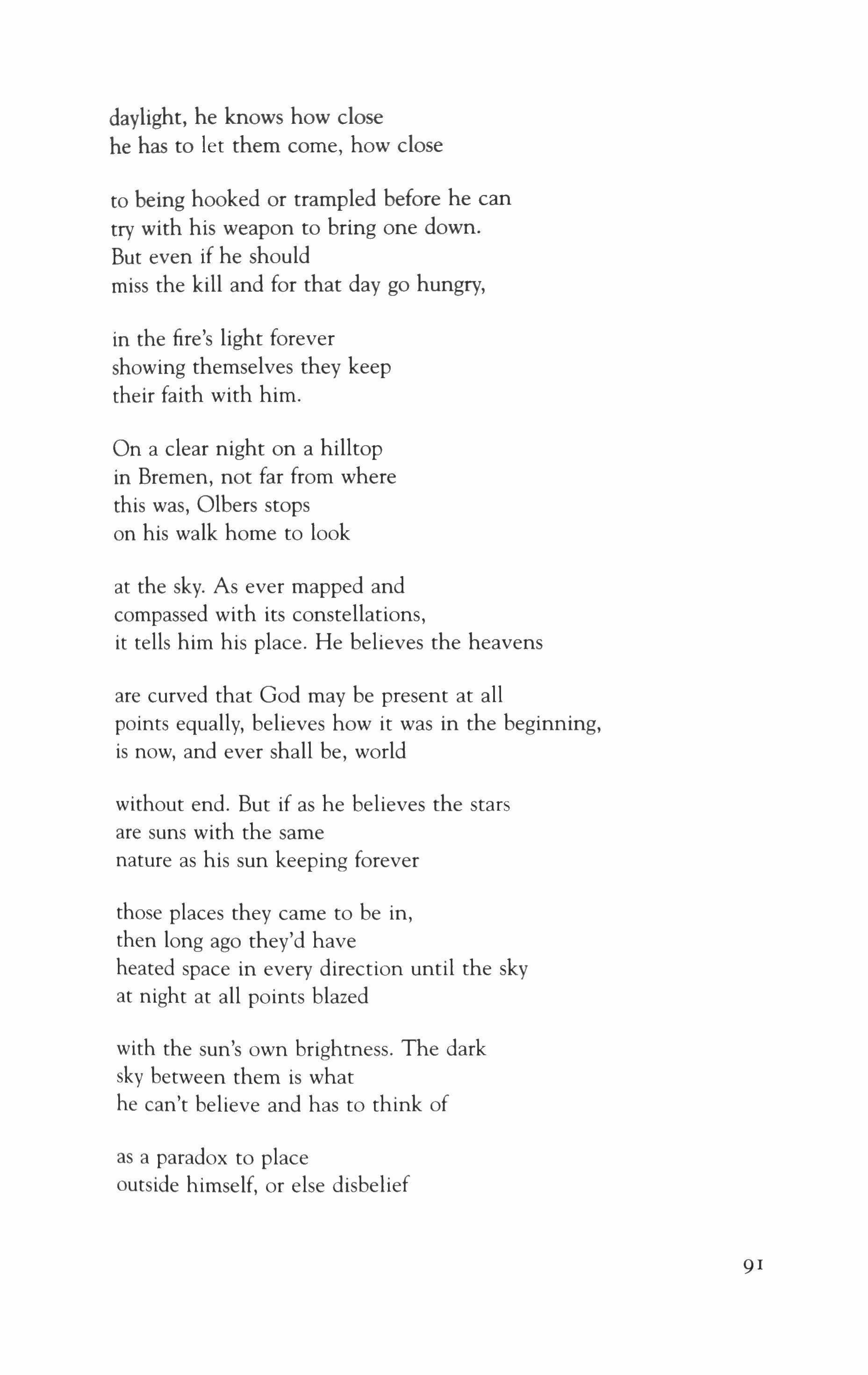
daylight, he knows how close he has to let them come, how close
to being hooked or trampled before he can try with his weapon to bring one down. But even if he should miss the kill and for that day go hungry,
in the fire's light forever showing themselves they keep their faith with him.
On a clear night on a hilltop in Bremen, not far from where this was, Olbers stops on his walk home to look
at the sky. As ever mapped and compassed with its constellations, it tells him his place. He believes the heavens
are curved that God may be present at all points equally, believes how it was in the beginning, is now, and ever shall be, world
without end. But if as he believes the stars are suns with the same nature as his sun keeping forever
those places they came to be in, then long ago they'd have heated space in every direction until the sky at night at all points blazed
with the sun's own brightness. The dark sky between them is what he can't believe and has to think of
as a paradox to place outside himself, or else disbelief
91
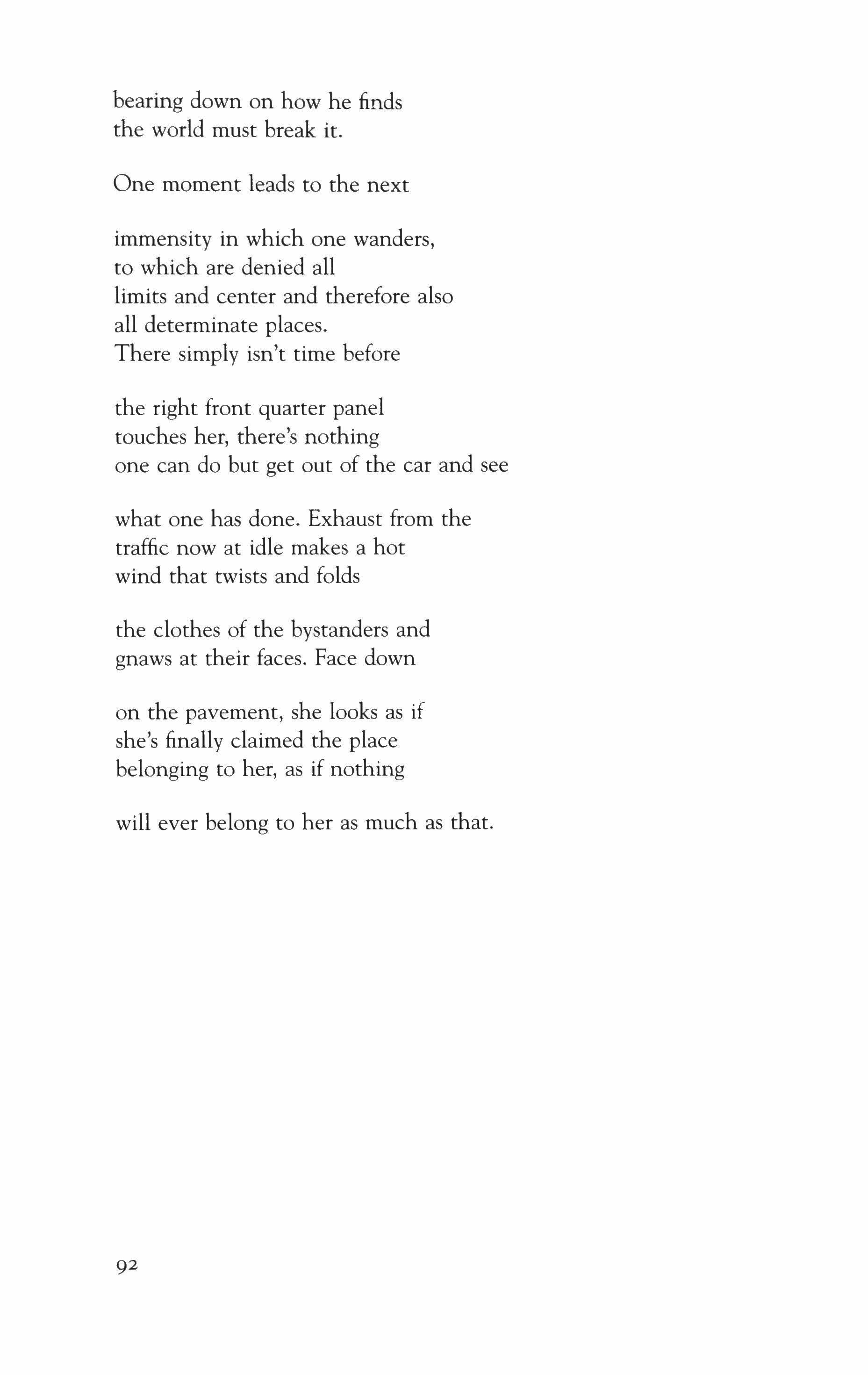
bearing down on how he finds the world must break it.
One moment leads to the next immensity in which one wanders, to which are denied all limits and center and therefore also all determinate places. There simply isn't time before the right front quarter panel touches her, there's nothing one can do but get out of the car and see what one has done. Exhaust from the traffic now at idle makes a hot wind that twists and folds the clothes of the bystanders and gnaws at their faces. Face down on the pavement, she looks as if she's finally claimed the place belonging to her, as if nothing will ever belong to her as much as that.
Heather McHugh

The Ocean's
I.
The ocean's noisiest when it recounts the tiny turmoils of the sand. You'd think the hardest would be loudest, and the softest soft. But no: Against a granite face the bay will come and go for months without much fuss or brouhahajust here and there a little crack, a pocket of cranny, a suck. But all night long, along the beachflesh-that impressionistic pillowing or pointillistic plushyou'll hear the pumps' palaver, and you'll hear the valvers pound. You'd think slap-happy waves would hush at a strand's ten thousand touches. But no: from unstoppable dark comes a cardiac clamor, in shuddering drumrolls, in sumptuous rush.
93
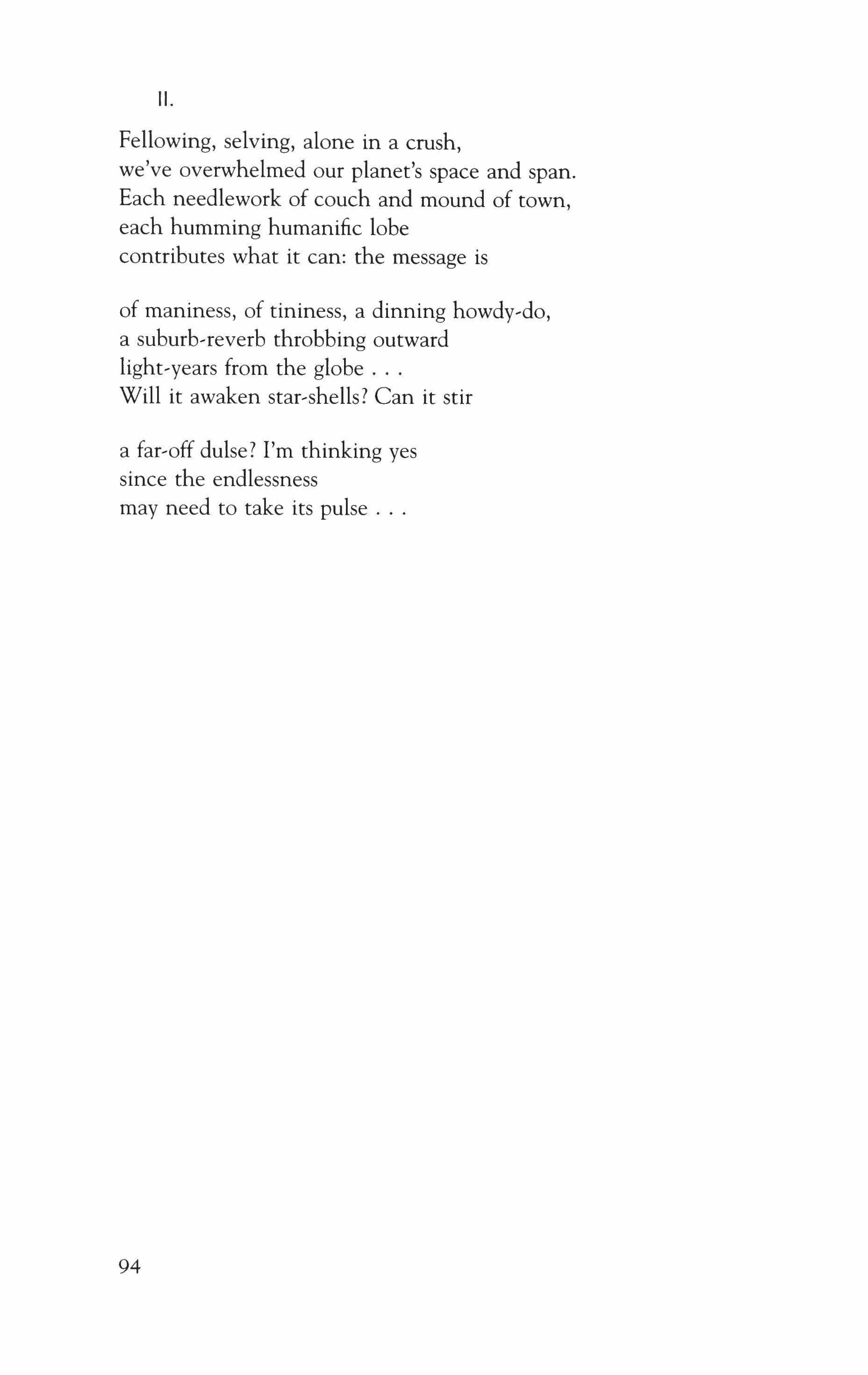
Fellowing, selving, alone in a crush, we've overwhelmed our planet's space and span. Each needlework of couch and mound of town, each humming hurnanific lobe contributes what it can: the message is
of maniness, of tininess, a dinning howdy-do, a suburb,reverb throbbing outward light,years from the globe Will it awaken star-shells? Can it stir
a far'off dulse? I'm thinking yes since the endlessness may need to take its pulse
II.
94
Not Blotto

Years being what they are one spends more time on twenty than on sixty-five-it's little wonder
one's so twisted. Comedowns of bum, listings of tit, the limbs consorting with unseemliness! And then the present's sent from sometime elsemem sums, my god, but different differences. Deeper than ever one thought.
Oh, beauty's youth, youth beauty, that's all Behemo knows or needs. And so
Behemo misses if not touch or taste or timbre then at least some such. Our everything's an inkling only, blind advance-and what that bodes we mind.
95
Far Niente
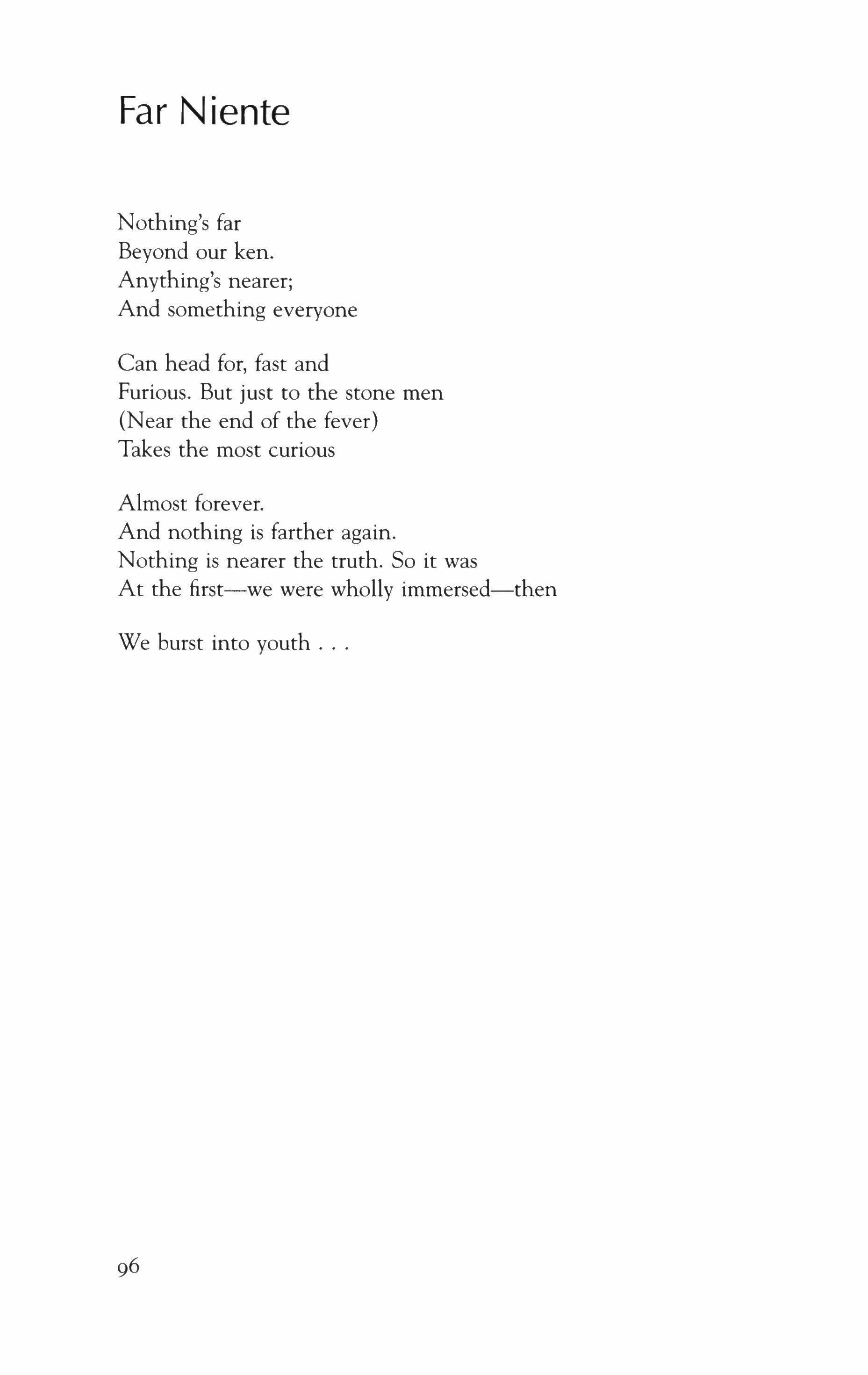
Nothing's far
Beyond our ken. Anything's nearer; And something everyone
Can head for, fast and Furious. But just to the stone men (Near the end of the fever) Takes the most curious
Almost forever. And nothing is farther again. Nothing is nearer the truth. So it was At the first-we were wholly immersed-then
We burst into youth
John Lucas Public Law 94-344

These photographs were taken in New York City approximately six months after September II, 2004- Exposed with Tri-X 3smm film. The prints are I I X 14 silver gelatin prints.
97

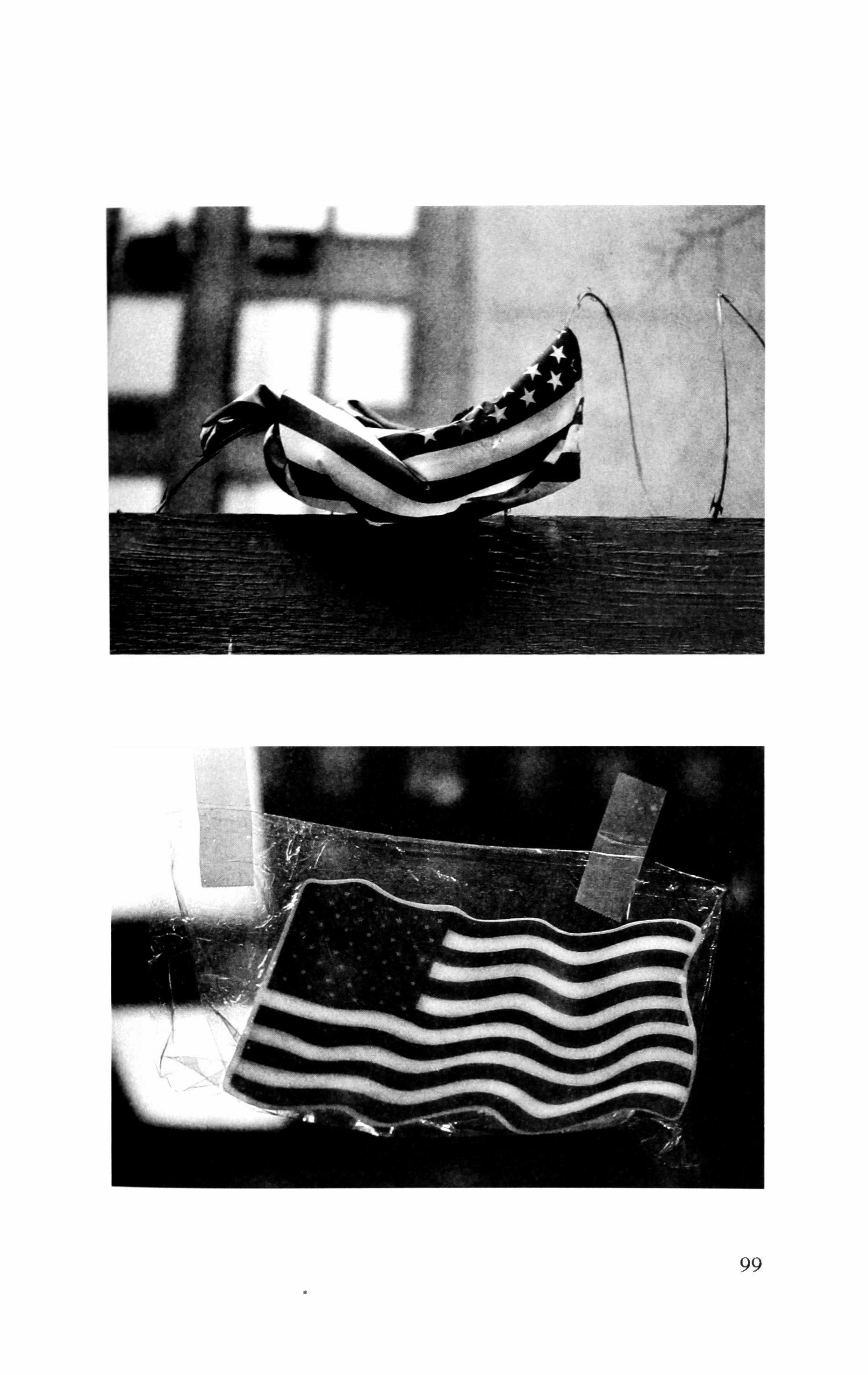
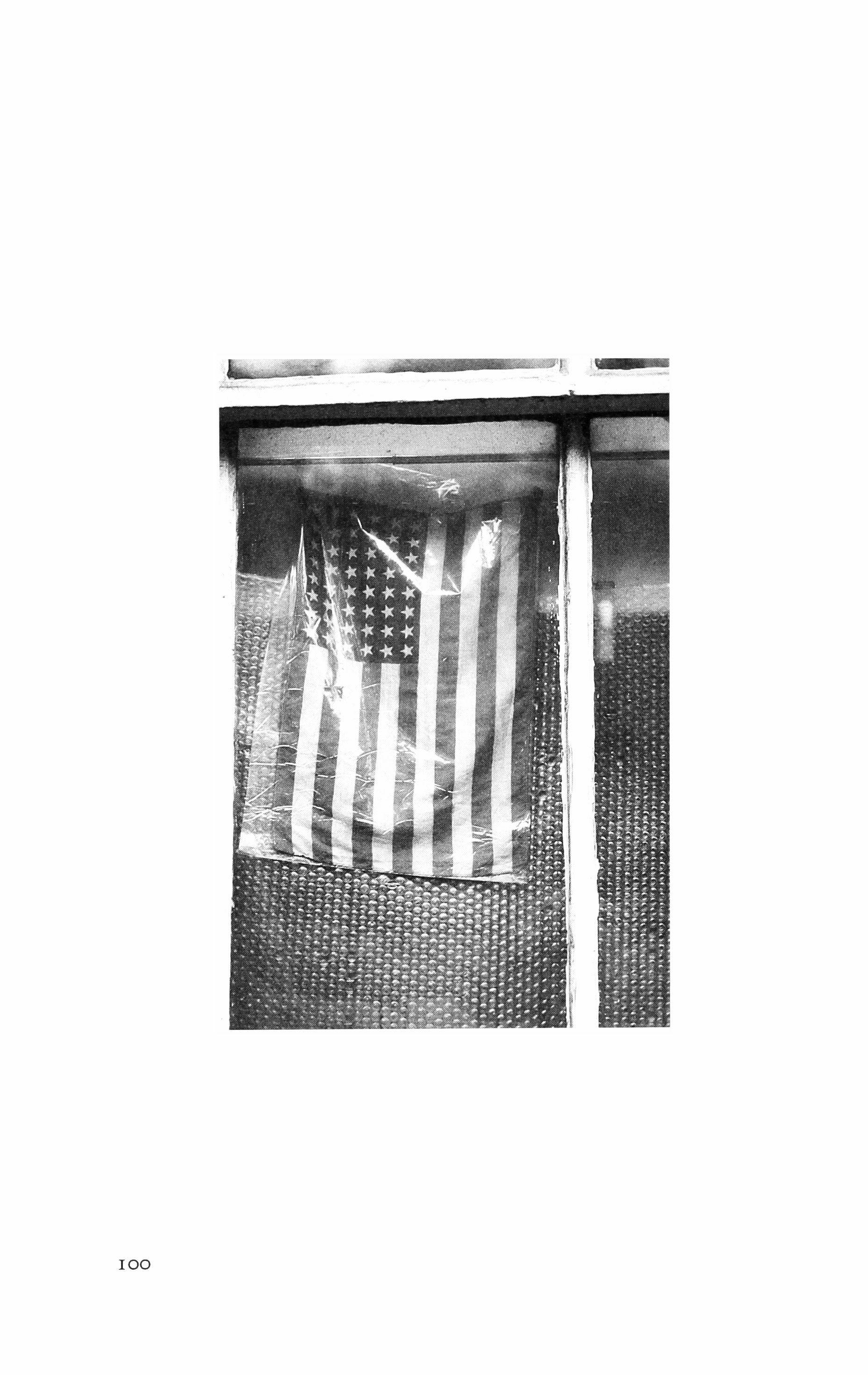
100

101
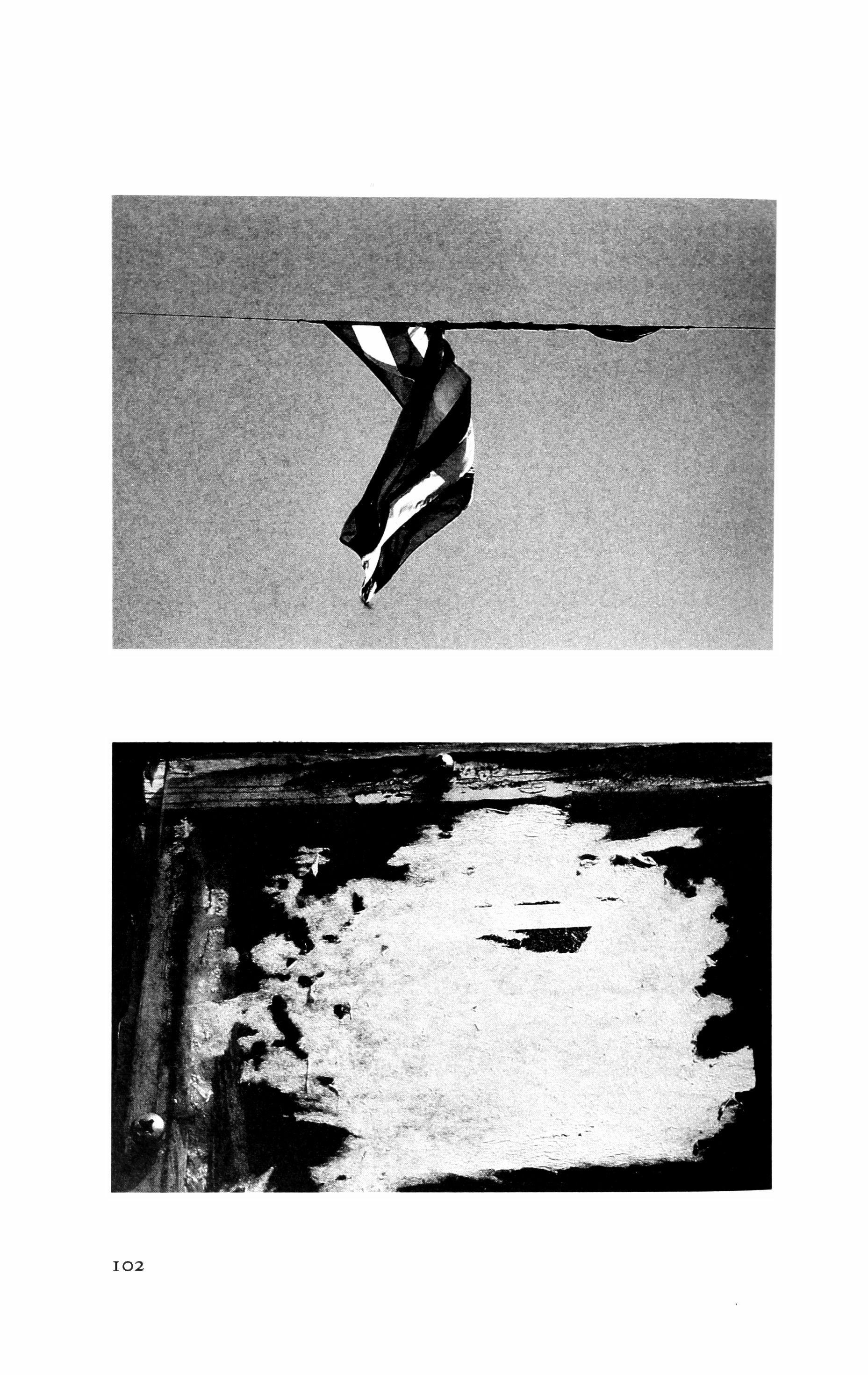
___._,� 3�' 102

103

The federal flag code says the universal custom is to display the U.S. flag from sunrise to sunset on buildings and stationary flagstaffs in the open, but when a patriotic effect is desired the flag may be displayed twenty-four hours a day if properly illuminated during the hours 01 darkness Any rule or custom pertaining to the display of the flag ot the United States of America, set forth herein, may be altered, modified, or repealed, or additional rules with respect thereto may be prescribed, by the Commander in Chief of the Armed Forces of the United States, whenever he deems it to be appropriate or desirable;
Never use the flag for decoration. Use bunting with the blue on top, then white, then red.
Do not let the flag touch the ground.
Do not store the flag where it can get dirty.
Do not fasten it or tie it back. Always allow it to fall free.
The flag should not be displayed on days when the weather is inclement, except when an all-weather flag is displayed.
The flag, when it is in such condition that it is no longer a fitting emblem for display, should be destroyed in a dignified way, preferably by burning.
104
] T. Barbarese
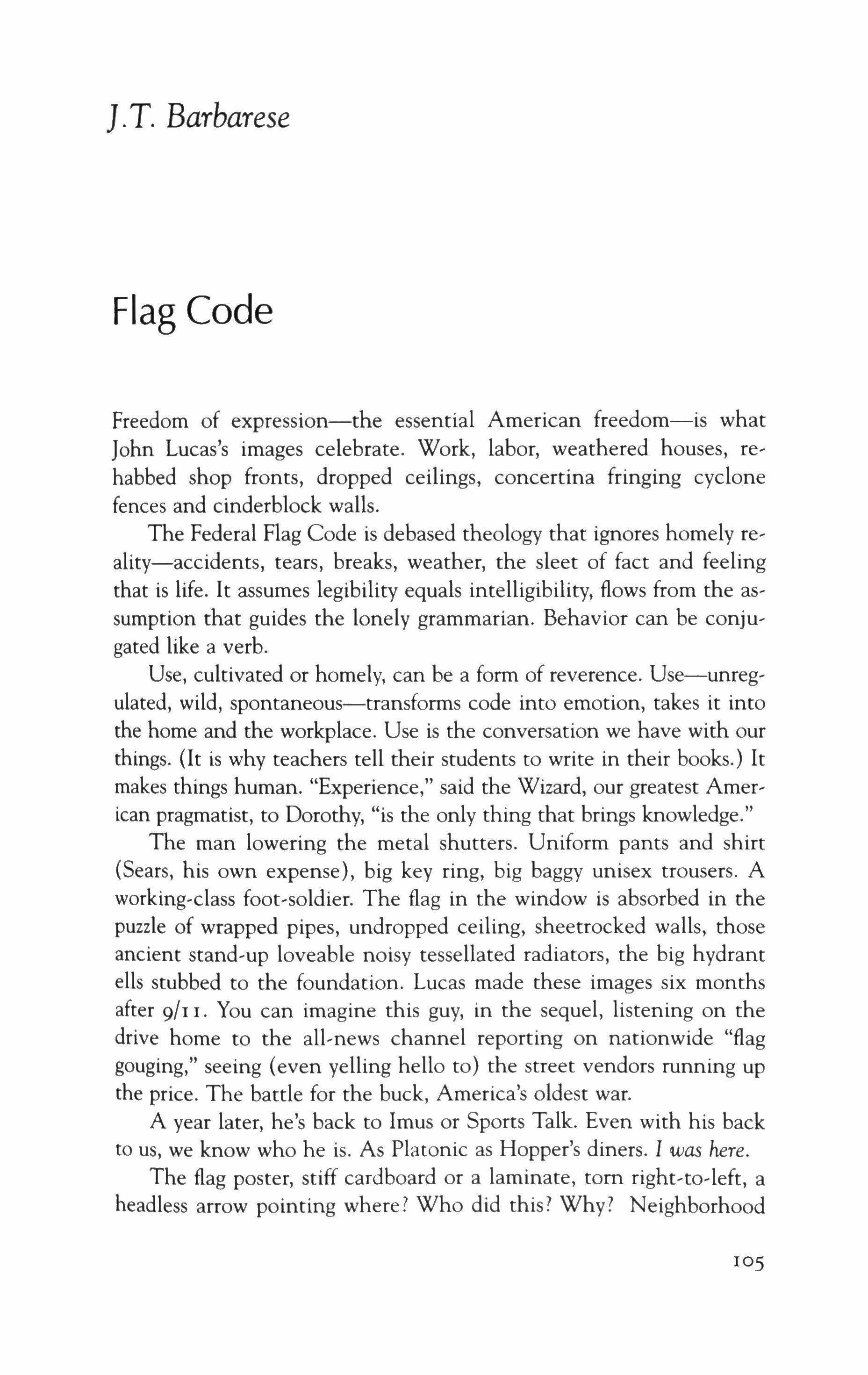
Flag Code
Freedom of expression-the essential American freedom-is what John Lucas's images celebrate. Work, labor, weathered houses, rehabbed shop fronts, dropped ceilings, concertina fringing cyclone fences and cinderblock walls.
The Federal Flag Code is debased theology that ignores homely reality-accidents, tears, breaks, weather, the sleet of fact and feeling that is life. It assumes legibility equals intelligibility, flows from the as, sumption that guides the lonely grammarian. Behavior can be conjugated like a verb.
Use, cultivated or homely, can be a form of reverence. Use=-unregulated, wild, spontaneous-transforms code into emotion, takes it into the home and the workplace. Use is the conversation we have with our things. (It is why teachers tell their students to write in their books.) It makes things human. "Experience," said the Wizard, our greatest American pragmatist, to Dorothy, "is the only thing that brings knowledge."
The man lowering the metal shutters. Uniform pants and shirt (Sears, his own expense), big key ring, big baggy unisex trousers. A working,class foot-soldier, The flag in the window is absorbed in the puzzle of wrapped pipes, undropped ceiling, sheetrocked walls, those ancient stand-up loveable noisy tessellated radiators, the big hydrant ells stubbed to the foundation. Lucas made these images six months after 9/1 I. You can imagine this guy, in the sequel, listening on the drive home to the all-news channel reporting on nationwide "flag gouging," seeing (even yelling hello to) the street vendors running up the price. The battle for the buck, America's oldest war.
A year later, he's back to Imus or Sports Talk. Even with his back to us, we know who he is. As Platonic as Hopper's diners. I was here.
The flag poster, stiff cardboard or a laminate, tom right-to-left, a headless arrow pointing where? Who did this? Why? Neighborhood
105

archaeology. Two people fooling around nearby. She stole his cigarettes, they've been flirting for months, her cuff button hooks the bulge, it tears. They laugh,or she does. The war she is dying to lose and he can't afford to win.
Or the flag tangled in concertina. On my block we called it Bob Wire, as in "Mr. Bifieri was at Okinawa and got cut bad on the Bob Wire." Only a dope wrassled Bob Wire. Caught in that nasty weft, long pigtail of blue cloth and blood poison, bleak urban found poetry, like the end-of-August sneakers over phone lines. Skeins of use. These are our flags. People live here.
People work here. The window frame with a big white flag-splat. The only stars are the two Phillips heads to the left and on top, and they seem not flush with the frame. Some home handyman's work, quick and dirty, too rushed for mastery. Big white flag cloud, big patriotic splat. You can still tell, though, says the passerby. Thing is, you know what it is. The vernacular need only be intelligible, not legible.
The sun-blasted, light-overexposed flag behind the glass, raindropor water-beaded, like a scorch. Fuzzy, Shroud of Turinesque, textured like dry riverbed, a bubble-wrapped moonscape. Still, you know.
Lone flag to the viewer's left of the weather-blasted pennant pasted to eaves, or soffits. To use is to adapt: actually a bumper sticker, copyright declaration lower right ("J.M."), then A M REM E. Like chunks of Sappho, with their voids, vacancies, vandalized syntax. Like decaying skywriting, or Ozymandias's "shattered visage." Nothing beside remains. A love of our incompleteness is the essence of poetry.
Or the flag decal in plastic taped to the inside of a window. (Probably self-stick-which only deepens the mystery. Why not peel off the backing? The unnatural piety that surrounds relics.) Neighborhood window art, our homely anthropology. Halloween decorations, notes to UPS (or my favorite, Gone to pick up my daughter from jail), holy cards, granny's Depression Glass, Our Two Johns OFK and John XXIII), Christmas creches. The household window was the original site of selfadvertisement. (Long before the T-shirt.) People worry, weep, behind windows.
And fight. That semaphoric fractured pane. Bullet, bee-bee, or baseball. Elbow, fist, cell phone, what? Who? And a black art, nearly a lost art now, replacing the glass in a sash pane. Lift the molding, drop the sash-weights and chain after untacking and prying up (gently) the paper-thin lath covering the channels, careful with the glass, then the glaziers points, careful not to lose them, then the putty. America,
106

horne of scotch tape, VELCRO, Chiclets, heat shields, Jazz, the adze, eye claw hammer, and shrink-wrap.
And improvise. We stapled our flag to the door and, uh, forgot that we had to open it, made a nice slice for the knob then, duh, realized about the key. StiU.
According to the OED, an homage is an act of allegiance, "rever, ence, dutiful respect," from the Latin homo, for human.
According to the Federal Flag Code, each of these homely homages is a desecration.
107
Howard Norman
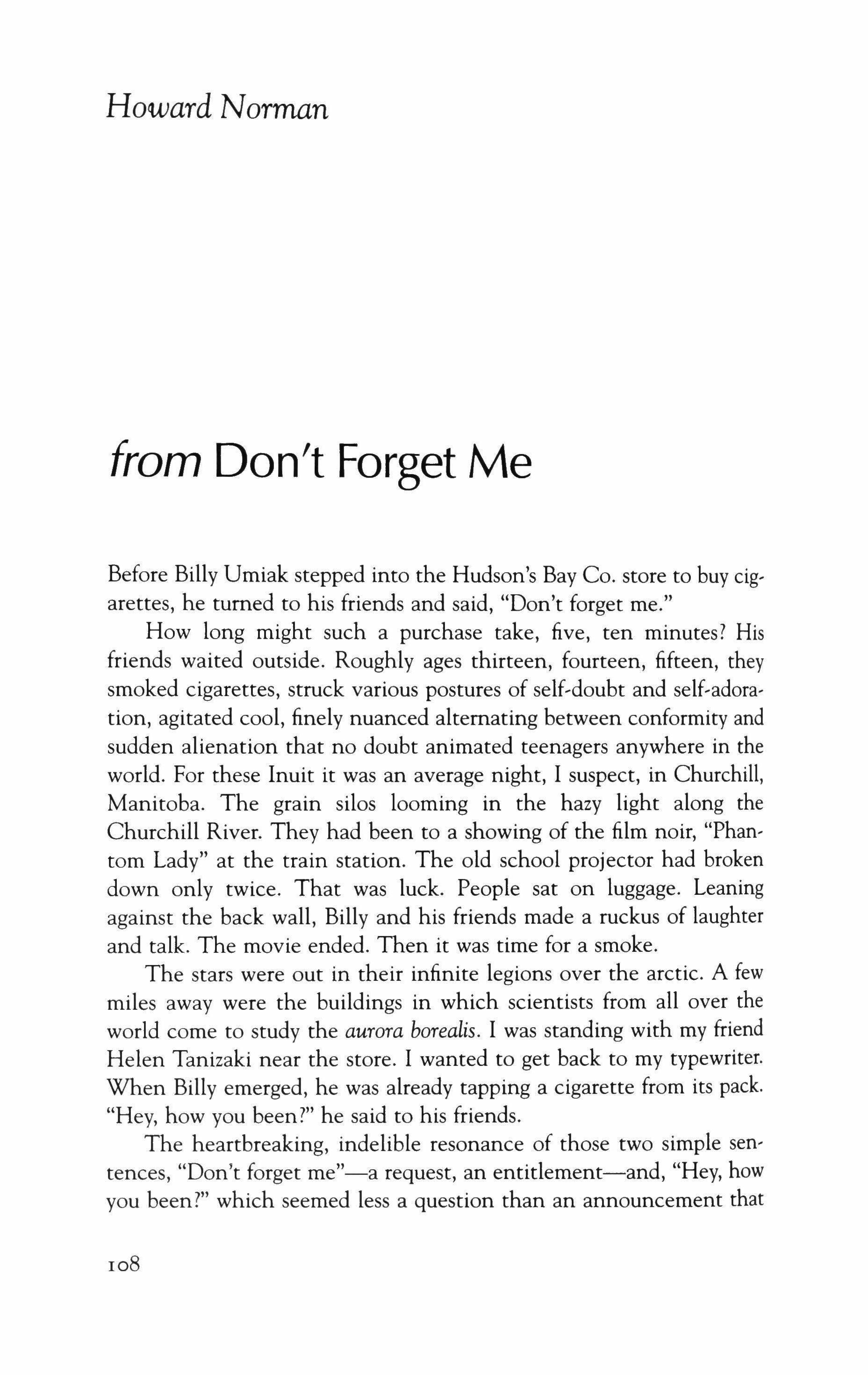
from Don't Forget Me
Before Billy Umiak stepped into the Hudson's Bay Co. store to buy cigarettes, he turned to his friends and said, "Don't forget me."
How long might such a purchase take, five, ten minutes? His friends waited outside. Roughly ages thirteen, fourteen, fifteen, they smoked cigarettes, struck various postures of self-doubt and self-adoration, agitated cool, finely nuanced alternating between conformity and sudden alienation that no doubt animated teenagers anywhere in the world. For these Inuit it was an average night, I suspect, in Churchill, Manitoba. The grain silos looming in the hazy light along the Churchill River. They had been to a showing of the film noir, "Phantom Lady" at the train station. The old school projector had broken down only twice. That was luck. People sat on luggage. Leaning against the back wall, Billy and his friends made a ruckus of laughter and talk. The movie ended. Then it was time for a smoke.
The stars were out in their infinite legions over the arctic. A few miles away were the buildings in which scientists from all over the world corne to study the aurora borealis. I was standing with my friend Helen Tanizaki near the store. I wanted to get back to my typewriter. When Billy emerged, he was already tapping a cigarette from its pack. "Hey, how you been?" he said to his friends.
The heartbreaking, indelible resonance of those two simple sentences, "Don't forget me"-a request, an entitlement-and, "Hey, how you been?" which seemed less a question than an announcement that
108
Billy had come back from a journey safe and sound. This, it struck me, did not constitute an irony-it evoked the philosophy of precarious, ness. All one needs to do is to hear, or read, Inuit folktales from the Hudson's Bay region to discover how quickly life can change. How, as Buddhist philosophy might suggest, each step is the beginning of a journey, even the step Billy Umiak had taken into the Hudson's Bay Co. store to buy cigarettes.
Resident in every moment of quotidian life is potential ambush; that is not paranoia, it is reality, an alertness, a vigilance. You defuse it by a shrug, "Hey, how you been?" You acknowledge it and move on.
The actual amount that had passed had little to do with anything. It was that Billy had disappeared from view.
In my two month's residence in Churchill, where my work was to translate Inuit stories, I heard those words-"Don't forget me"-spoken so many times, by children, teenagers, old people, it would be impossible to even estimate just how many. It was no doubt inevitable, then, that Helen and I took up the phrase, used it with each other.
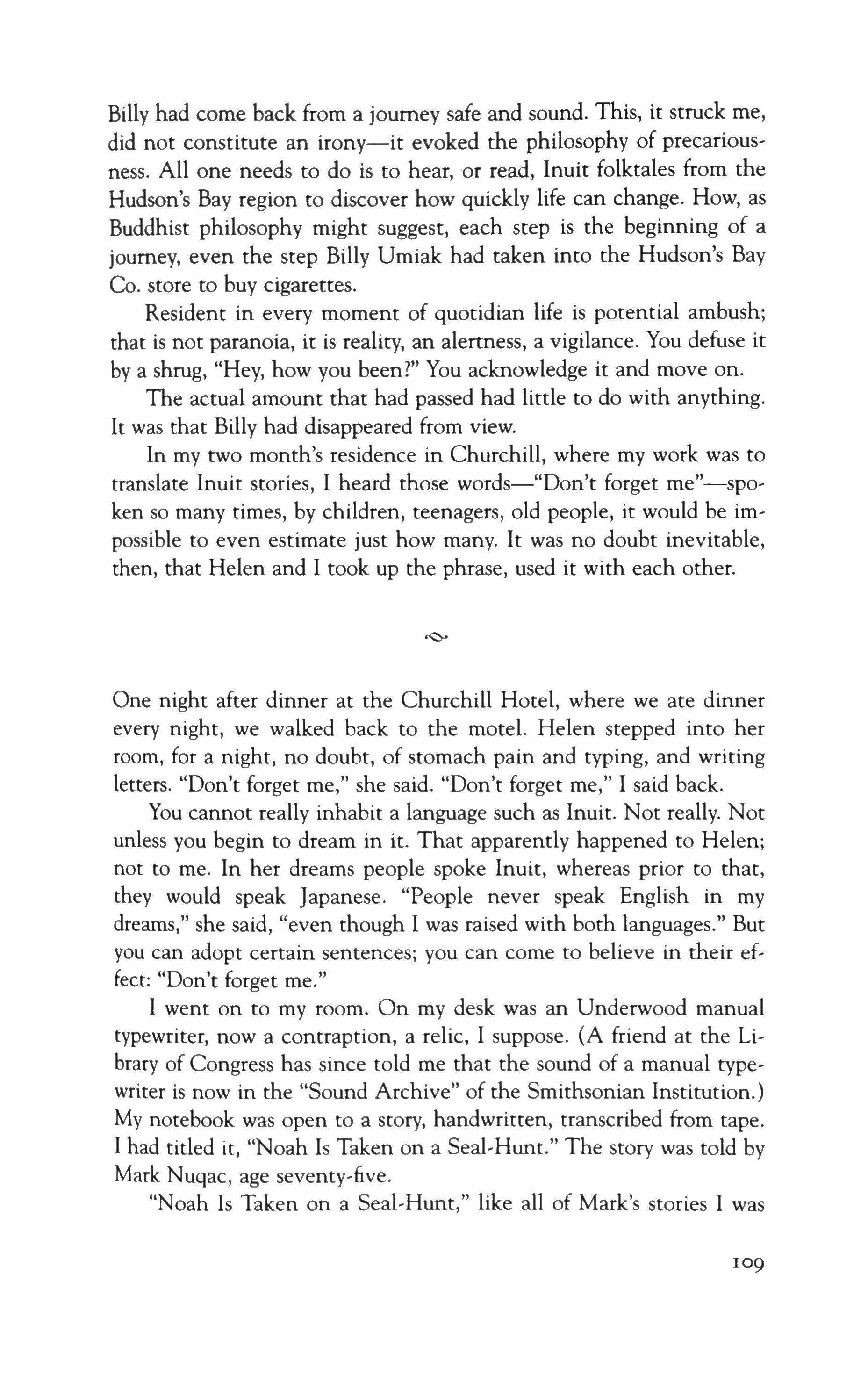
One night after dinner at the Churchill Hotel, where we ate dinner every night, we walked back to the motel. Helen stepped into her room, for a night, no doubt, of stomach pain and typing, and writing letters. "Don't forget me," she said. "Don't forget me," I said back.
You cannot really inhabit a language such as Inuit. Not really. Not unless you begin to dream in it. That apparently happened to Helen; not to me. In her dreams people spoke Inuit, whereas prior to that, they would speak Japanese. "People never speak English in my dreams," she said, "even though I was raised with both languages." But you can adopt certain sentences; you can come to believe in their effect: "Don't forget me."
I went on to my room. On my desk was an Underwood manual typewriter, now a contraption, a relic, I suppose. (A friend at the Library of Congress has since told me that the sound of a manual typewriter is now in the "Sound Archive" of the Smithsonian Institution.) My notebook was open to a story, handwritten, transcribed from tape. I had titled it, "Noah Is Taken on a Seal-Hunt." The story was told by Mark Nuqac, age seventy-five.
"Noah Is Taken on a Seal-Hunt," like all of Mark's stories I was
109

translating into English and Helen was translating into Japanese, featured the biblical Noah. We came to call them his "Noah Stories," as each were about when Noah's Ark drifted into arctic waters and the episodes, fates, predicaments that Noah's presence incited among Inuit villages along the coast.
"Noah Is Taken on a Seal Hunt" begins one fine morning when a hunter takes pity on Noah, who is starving, and invites him on a seal hunt. This man says goodbye to his sons and daughters. He says goodbye to his wife. He reins his dogs, ties Noah sitting upright to the sledge, and off they go. It is not very long before they find themselves in mortal combat with a monstrous spirit, one of the many who reside in the territory. This particular spirit's modus operandi was to ambush travelers. He had many ancient grudges against mankind to play out. Having just left the sounds of village life, family laughter, Noah and the hunter suddenly were suffering the spirit's repertoire of otherworldly cries, ululations, teeth-clacking. One passage, roughly translated, says, "While their fight went on, even as Noah and the hunter were spun in the air, the hunter looked across a stretch of snow and saw his daughters, sons, and wife. They were doing daily things." So, this incident, this spirit-battle, took place far enough from home so that the tumult did not immediately alarm the village, yet close enough so that the familiar life could be glimpsed. Eventually, Noah and the hunter survived, in fact return home with a seal. Unaware of what fearful chaos had transpired out in the world, one of the sons comments, in the way of sons, "Well, father, it's a small seal, but still we are grateful." Shortly after, Noah has what can only be defined as a nervous breakdown. (He has a different sort of nervous breakdown in each of Mark's stories.) He retreats to the Ark, which is locked in ice out on Hudson's Bay. In the village, the hunter makes no mention of his recent travails. Yet, after their meal, his wife notes in her husband a certain exhaustion, even resignation, and says, "Husband, why did you not say to our son, 'It is the biggest seal I caught today and that is that. Every day is different. Some days, a seal. Some days, no seal-I' And here-at this poignant moment-is where I run into trouble with the translation. I cannot quite find the equivalent in English of the final conversation between husband and wife. I've worked on this particular story, on and off, since September 1978, when I first heard it. Allow me a rough proximity, then. In effect, the husband's reply to his wife's question is, "There are things best left unsaid." "What happened out there?" she persists in asking.
110
"Things were going along fine, then things went badly," the husband says.
The wife says, "Which spirit was it?"
"The one that is suddenly there."
"Not the one you see first on the horizon. And you have a little time to think things over?"
"No."
"Not the one who steals your dogs."
"No. This was the one that bursts up out of the snow."
"The one with tusks, long teeth, so loud you can hardly stand it?"
"That one, yes."
"Well, you came home with a seal. And that visitor, Noah, has gone back to his boat. You accomplished much today, husband."
The story ends there.
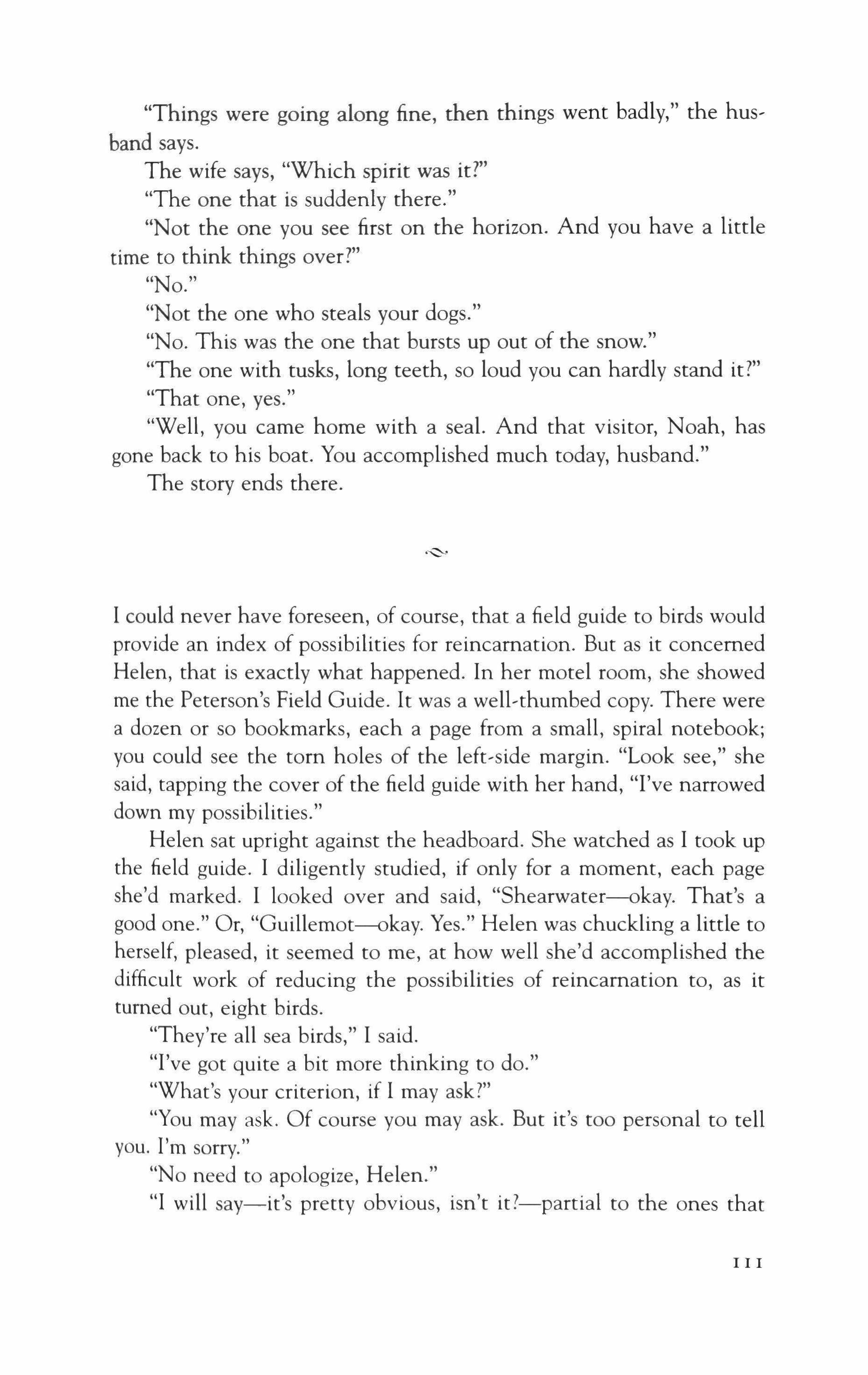
I could never have foreseen, of course, that a field guide to birds would provide an index of possibilities for reincarnation. But as it concerned Helen, that is exactly what happened. In her motel room, she showed me the Peterson's Field Guide. It was a well-thumbed copy. There were a dozen or so bookmarks, each a page from a small, spiral notebook; you could see the tom holes of the left-side margin. "Look see," she said, tapping the cover of the field guide with her hand, "I've narrowed down my possibilities."
Helen sat upright against the headboard. She watched as I took up the field guide. I diligently studied, if only for a moment, each page she'd marked. I looked over and said, "Shearwater--okay. That's a good one." Or, "Guillemot--okay. Yes." Helen was chuckling a little to herself, pleased, it seemed to me, at how well she'd accomplished the difficult work of reducing the possibilities of reincarnation to, as it turned out, eight birds.
"They're all sea birds," I said.
"I've got quite a bit more thinking to do."
"What's your criterion, if I may ask?"
"You may ask. Of course you may ask. But it's too personal to tell you. I'm sorry."
"No need to apologize, Helen."
"I will say-it's pretty obvious, isn't it?-partial to the ones that
-c-
I I I
get to fly around cliffs and fjords, and roost in the cliffs, and all like that."
"As for me, not that it matters-if I had a choice what to come back as-I think I'd choose a kingfisher."
"You like that bird far more than I do. They seem, how to say it, nuts in the head."
"Don't let looks deceive you."
This made her laugh. "I'll let whatever I want to deceive me, deceive me, thank you very much."
Previous to meeting Helen, I had given reincarnation no thought. She never directly asked me to think about it, either. She simply stated her beliefs. But as her illness progressed from inkling to devastation, those beliefs evolved from hopeful skepticism to the absolute dedication. At some point in early October she spoke this very sentence to me, "I believe in reincarnation, conceptually." Yet in her final letters from Kyoto, she indicated that her heretofore tentative belief had been profoundly focused. "I now think"-letter dated April 7 1978-"reincarnation is quite possible. Put another way, it is desirable."
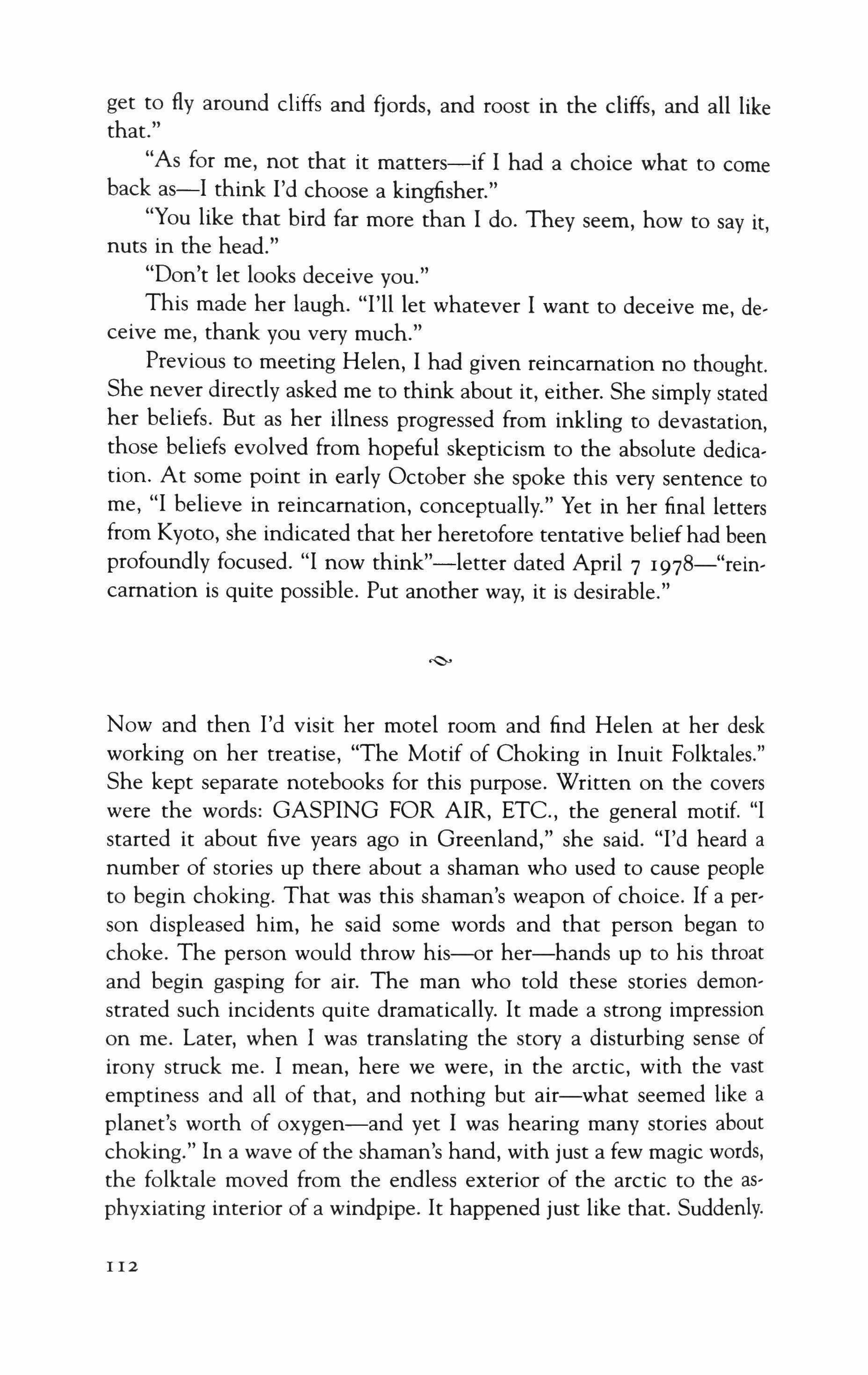
Now and then I'd visit her motel room and find Helen at her desk working on her treatise, "The Motif of Choking in Inuit Folktales." She kept separate notebooks for this purpose. Written on the covers were the words: GASPING FOR AIR, ETC., the general motif. "I started it about five years ago in Greenland," she said. "I'd heard a number of stories up there about a shaman who used to cause people to begin choking. That was this shaman's weapon of choice. If a person displeased him, he said some words and that person began to choke. The person would throw his-or her-hands up to his throat and begin gasping for air. The man who told these stories demonstrated such incidents quite dramatically. It made a strong impression on me. Later, when I was translating the story a disturbing sense of irony struck me. I mean, here we were, in the arctic, with the vast emptiness and all of that, and nothing but air-what seemed like a planet's worth of oxygen-and yet I was hearing many stories about choking." In a wave of the shaman's hand, with just a few magic words, the folktale moved from the endless exterior of the arctic to the asphyxiating interior of a windpipe. It happened just like that. Suddenly.
II2

I said to myself, ''breathtaking,'' and then suddenly realized I'd uttered the right word. It was at that moment I fell into-well, an uneasy laughter.
We were sitting around in Helen's motel room shooting the breeze, as usual.
"How many of these choking stories were there?" I said.
"Oh, I'd say twenty or so."
"Somebody got choked in each story?"
"Yes. But no one died in these stories."
"Why not?"
"Because choking was persuasive. In the end, the shaman always got his way."
One evening Helen let me read her notes, anecdotes, impressions, brief and extended disquisitions on the theme of choking. On the bed, she was asleep, breathing easily, seeming to be a world away from pain. I read along. To this day I recall a particular passage in one of the stories Helen was translating, which concerned a conversation of sorts be, tween the shaman and a hunter -for the record, a guillemot is a kind of sea bird-:
"'I've stuck a guillemot in your throat,' said the shaman. 'Now, give me all of your dogs.' With this, the man opened his mouth to speak, but the voice of a guillemot came out, 'Ovwaahk, Ovwaahk!' The shaman, who could understand the language of guillemots, said, 'You have made a good decision,' then took all the sled dogs and flew off with them toward the horizon. The guillemot flew from the man's throat and the man took many deep breaths. He was worn out. He went to sleep. His family sat next to him as he slept. As he slept he took deep breaths. When he woke, he took deep breaths."
113
Stanley Plumly
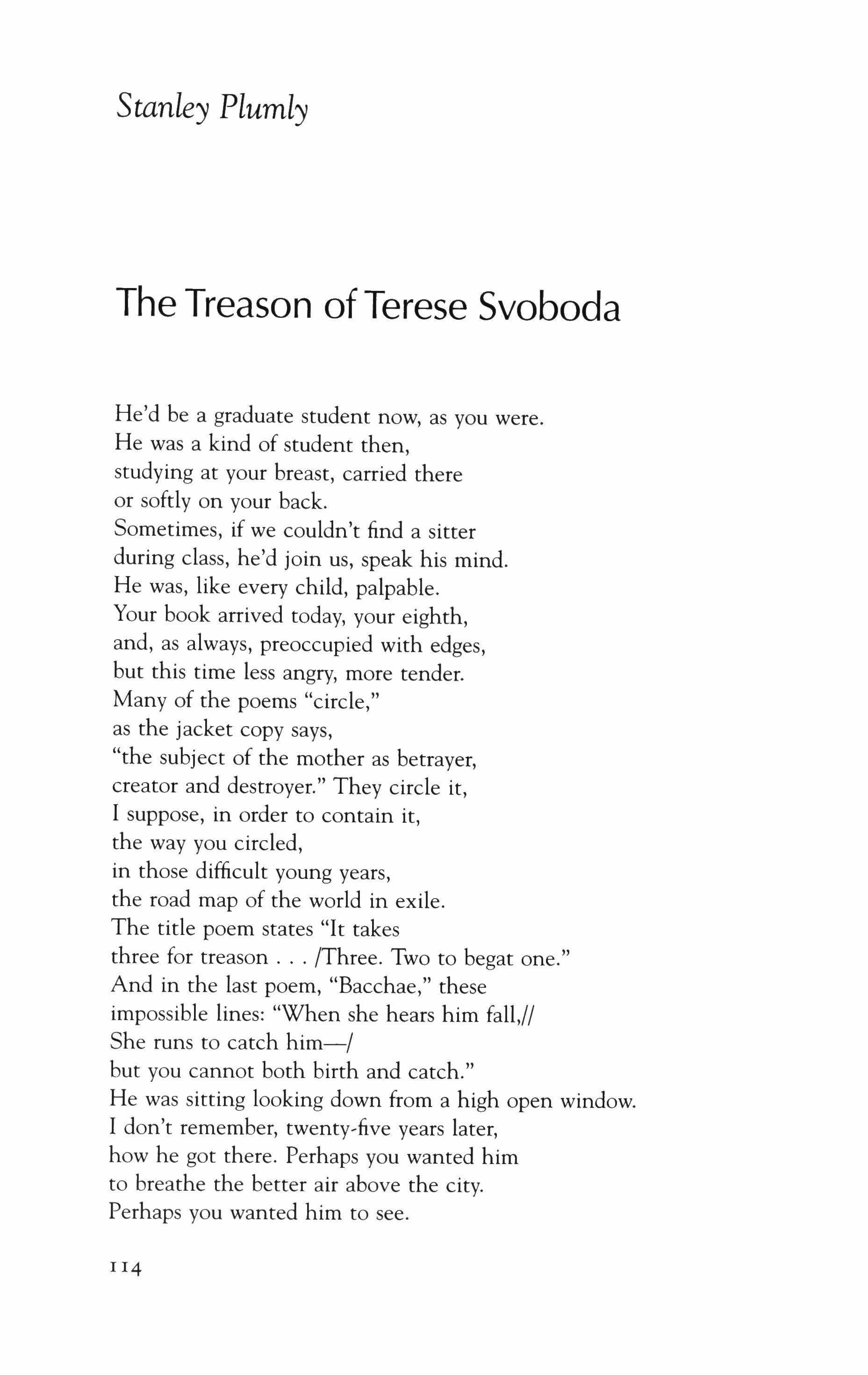
The Treason of Terese Svoboda
He'd be a graduate student now, as you were. He was a kind of student then, studying at your breast, carried there or softly on your back. Sometimes, if we couldn't find a sitter during class, he'd join us, speak his mind. He was, like every child, palpable. Your book arrived today, your eighth, and, as always, preoccupied with edges, but this time less angry, more tender. Many of the poems "circle," as the jacket copy says, "the subject of the mother as betrayer, creator and destroyer." They circle it, I suppose, in order to contain it, the way you circled, in those difficult young years, the road map of the world in exile. The title poem states "It takes three for treason /Three. Two to begat one." And in the last poem, "Bacchae," these impossible lines: "When she hears him fall,!/ She runs to catch him-/ but you cannot both birth and catch." He was sitting looking down from a high open window. I don't remember, twenty-five years later, how he got there. Perhaps you wanted him to breathe the better air above the city. Perhaps you wanted him to see.
114
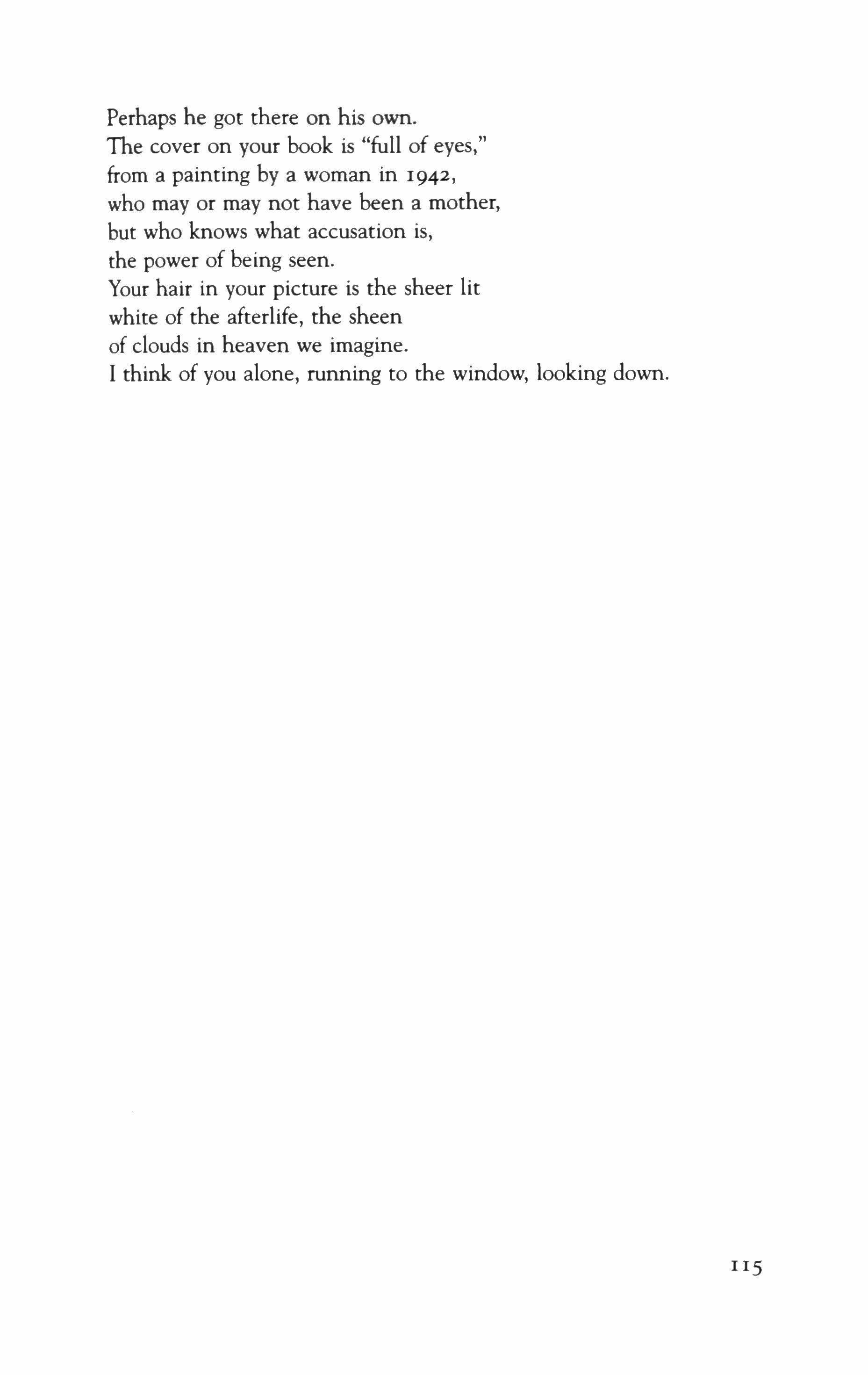
Perhaps he got there on his own.
The cover on your book is "full of eyes," from a painting by a woman in 1942, who mayor may not have been a mother, but who knows what accusation is, the power of being seen. Your hair in your picture is the sheer lit white of the afterlife, the sheen of clouds in heaven we imagine. I think of you alone, running to the window, looking down.
115
Claudia Rankine
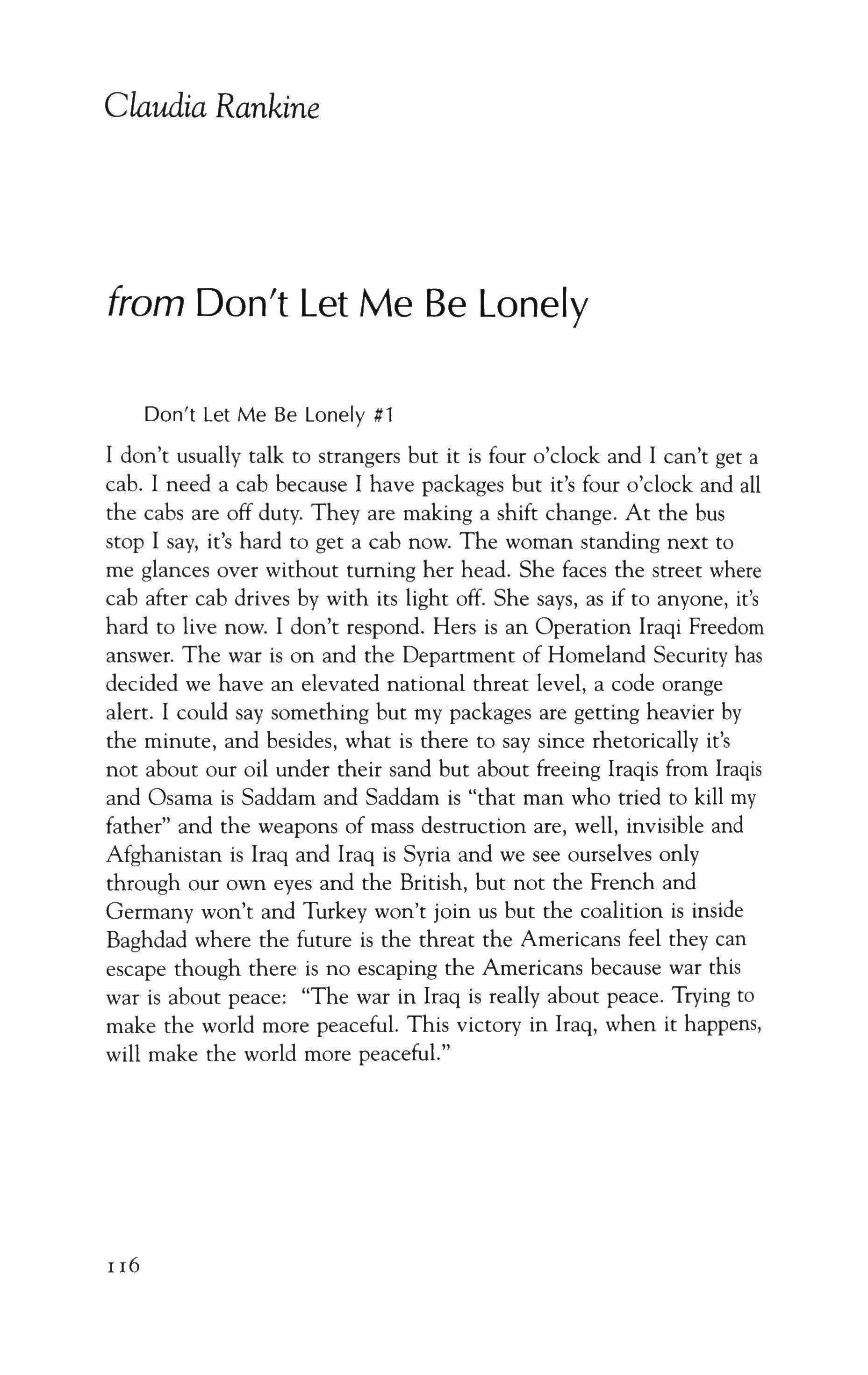
from Don't Let Me Be Lonely
Don't Let Me Be Lonely #1
I don't usually talk to strangers but it is four o'clock and I can't get a cab. I need a cab because I have packages but it's four o'clock and all the cabs are off duty. They are making a shift change. At the bus stop I say, it's hard to get a cab now. The woman standing next to me glances over without turning her head. She faces the street where cab after cab drives by with its light off. She says, as if to anyone, it's hard to live now. I don't respond. Hers is an Operation Iraqi Freedom answer. The war is on and the Department of Homeland Security has decided we have an elevated national threat level, a code orange alert. I could say something but my packages are getting heavier by the minute, and besides, what is there to say since rhetorically it's not about our oil under their sand but about freeing Iraqis from Iraqis and Osama is Saddam and Saddam is "that man who tried to kill my father" and the weapons of mass destruction are, well, invisible and Afghanistan is Iraq and Iraq is Syria and we see ourselves only through our own eyes and the British, but not the French and Germany won't and Turkey won't join us but the coalition is inside Baghdad where the future is the threat the Americans feel they can escape though there is no escaping the Americans because war this war is about peace: "The war in Iraq is really about peace. Trying to make the world more peaceful. This victory in Iraq, when it happens, will make the world more peaceful."
116
Don't Let Me Be Lonely =2
Or over breakfast The New York Times is barely visible beneath the boxes of cereal, juice and milk, but because I have been waiting for this day without realizing I was waiting, I see the story at first glance: President Mbeki has decided antiretrovirals will be made available to the five million South Africans infected by the HIV virus.
My body relaxes. My shoulders fall back. I had not known that my distress at Mbeki's previous position against distribution of the drugs had physically lodged itself like a virus within me.
Before Mbeki, thirty-nine drug companies filed suit in order to prevent South Africa's manufacture of generic AIDS drugs. Possible trade sanctions were threatened. Then President Clinton did an about face and the lawsuit was dismissed. But like an absurdist dream, Mbeki stood between the now available drugs and the dying.
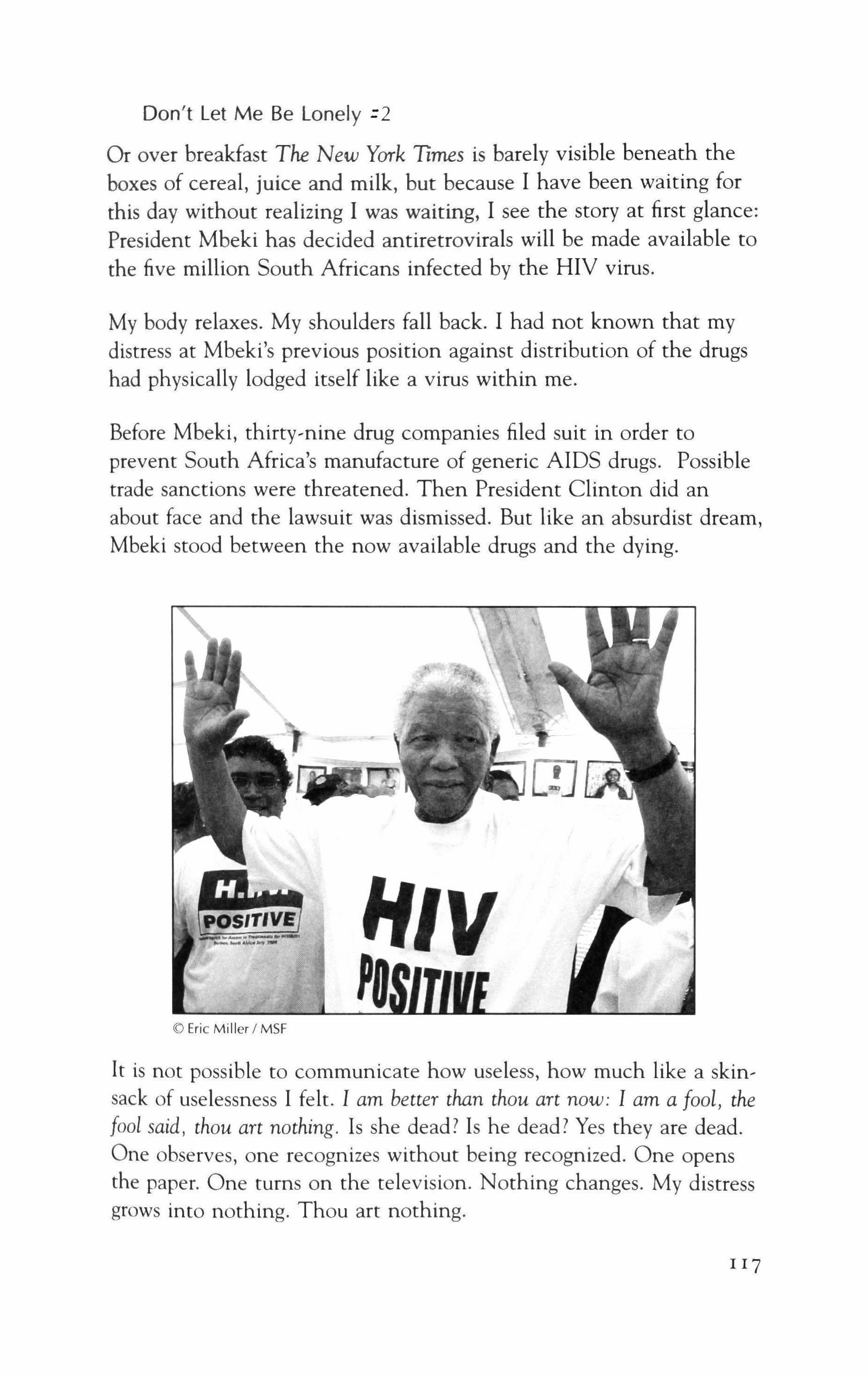
HIV PO
© Eric Miller / MSF
It is not possible to communicate how useless, how much like a skinsack of uselessness I felt. I am better than thou art now: I am a fool, the fool said, thou art nothing. Is she dead? Is he dead? Yes they are dead. One observes, one recognizes without being recognized. One opens the paper. One turns on the television. Nothing changes. My distress grows into nothing. Thou art nothing.
II?

Such distress moved in with muscle and bone. Its entrance by necessity slowly translated my already grief into a tremendously exhausted hope. The translation occurred unconsciously, perhaps occurred simply because I am alive. The translation occurred as a form of life. Then life, which seems so full of waiting, awakes suddenly into a life of hope.
lIB
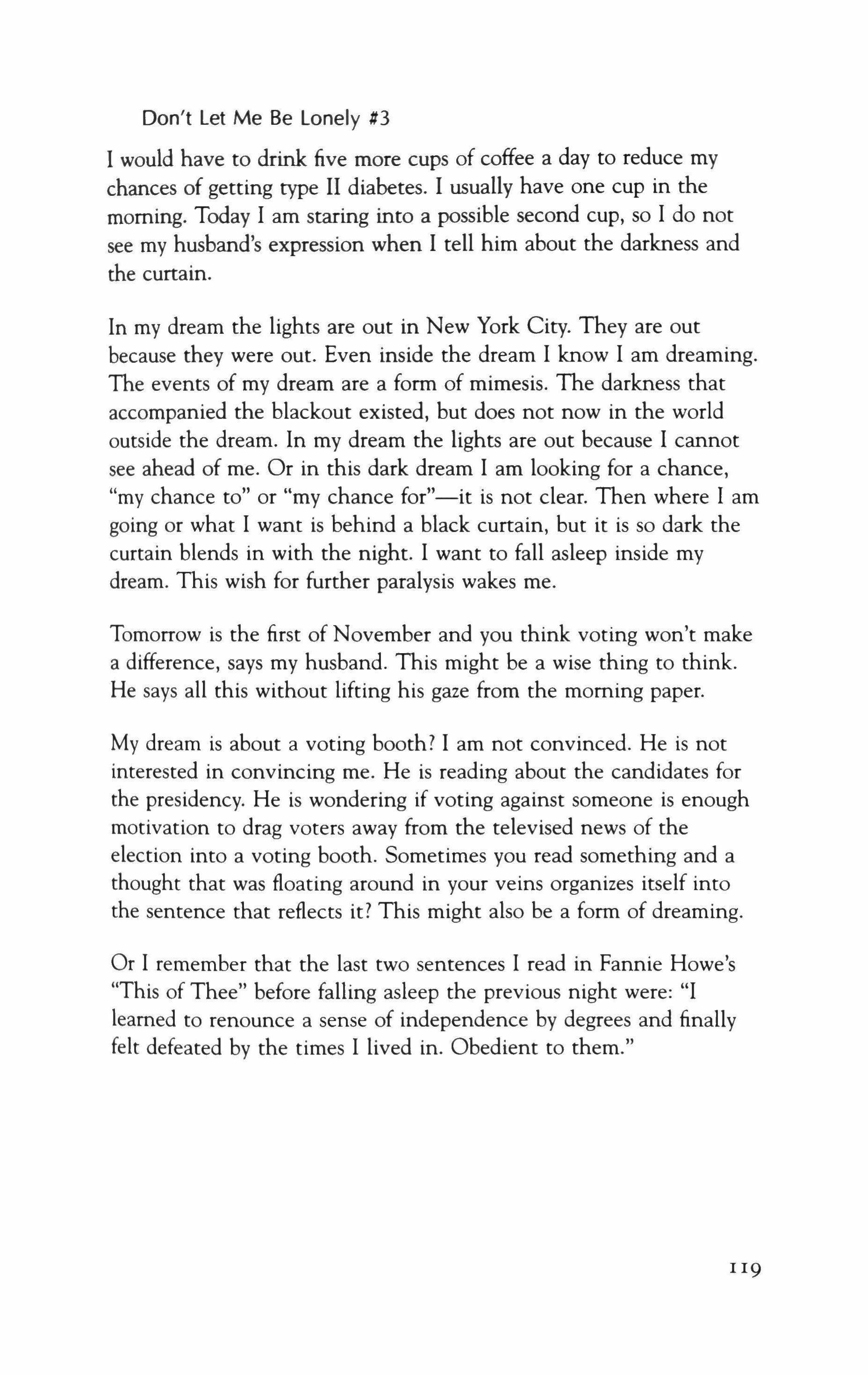
Don't Let Me Be Lonely #3
1 would have to drink five more cups of coffee a day to reduce my chances of getting type 11 diabetes. 1 usually have one cup in the morning. Today 1 am staring into a possible second cup, so 1 do not see my husband's expression when I tell him about the darkness and the curtain.
In my dream the lights are out in New York City. They are out because they were out. Even inside the dream I know I am dreaming. The events of my dream are a form of mimesis. The darkness that accompanied the blackout existed, but does not now in the world outside the dream. In my dream the lights are out because I cannot see ahead of me. Or in this dark dream I am looking for a chance, "my chance to" or "my chance for"-it is not clear. Then where I am going or what I want is behind a black curtain, but it is so dark the curtain blends in with the night. I want to fall asleep inside my dream. This wish for further paralysis wakes me.
Tomorrow is the first of November and you think voting won't make a difference, says my husband. This might be a wise thing to think. He says all this without lifting his gaze from the morning paper.
My dream is about a voting booth? I am not convinced. He is not interested in convincing me. He is reading about the candidates for the presidency. He is wondering if voting against someone is enough motivation to drag voters away from the televised news of the election into a voting booth. Sometimes you read something and a thought that was floating around in your veins organizes itself into the sentence that reflects it? This might also be a form of dreaming.
Or I remember that the last two sentences I read in Fannie Howe's "This of Thee" before falling asleep the previous night were: "I learned to renounce a sense of independence by degrees and finally felt defeated by the times I lived in. Obedient to them."
119
David Rivard
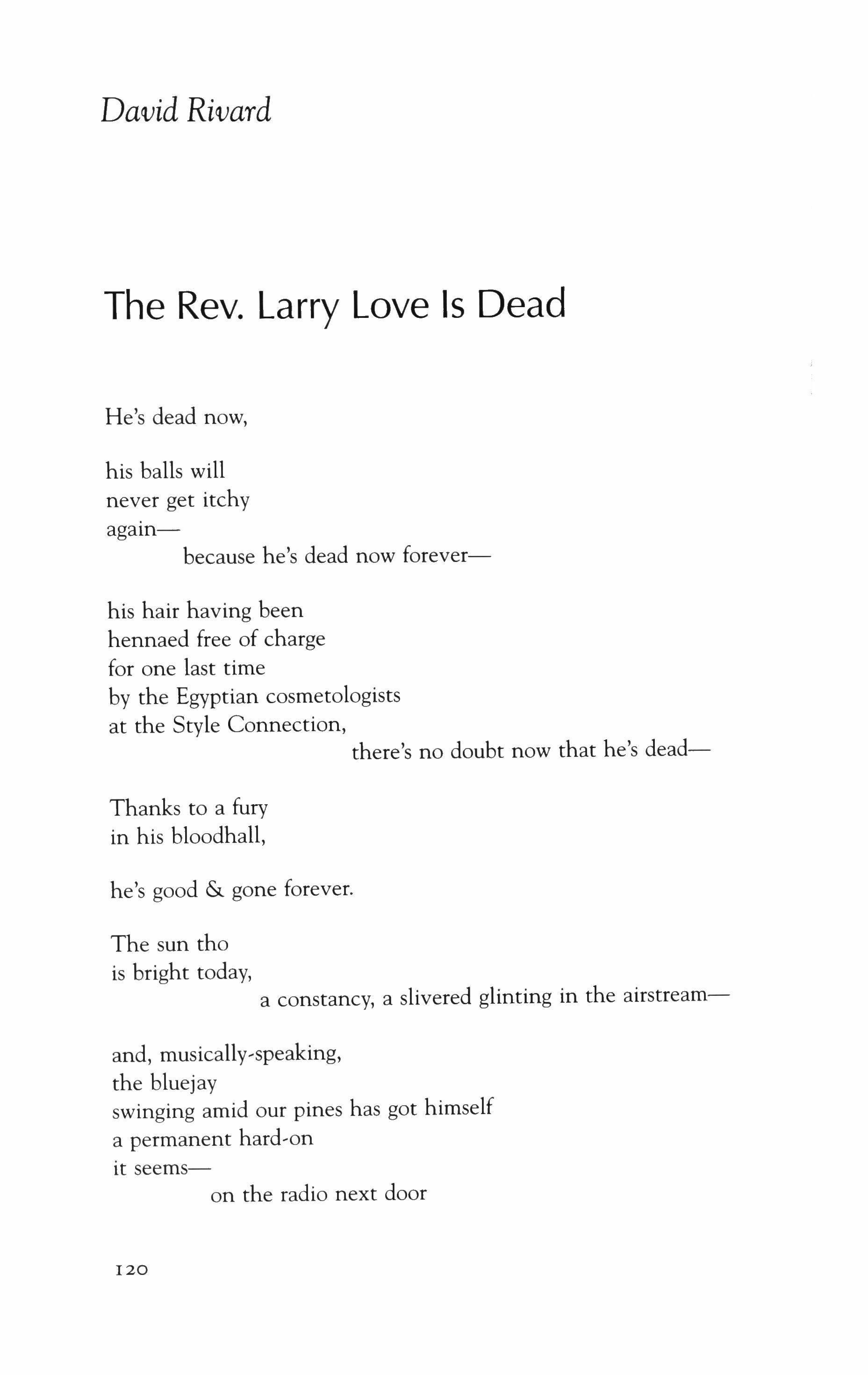
The Rev. Larry Love Is Dead
He's dead now, his balls will never get itchy againbecause he's dead now foreverhis hair having been hennaed free of charge for one last time by the Egyptian cosmetologists at the Style Connection, there's no doubt now that he's deadThanks to a fury in his bloodhall, he's good & gone forever. The sun tho is bright today, a constancy, a slivered glinting in the airstreamand, musically-speaking, the bluejay swinging amid our pines has got himself a permanent hard-on it seemson the radio next door
I20
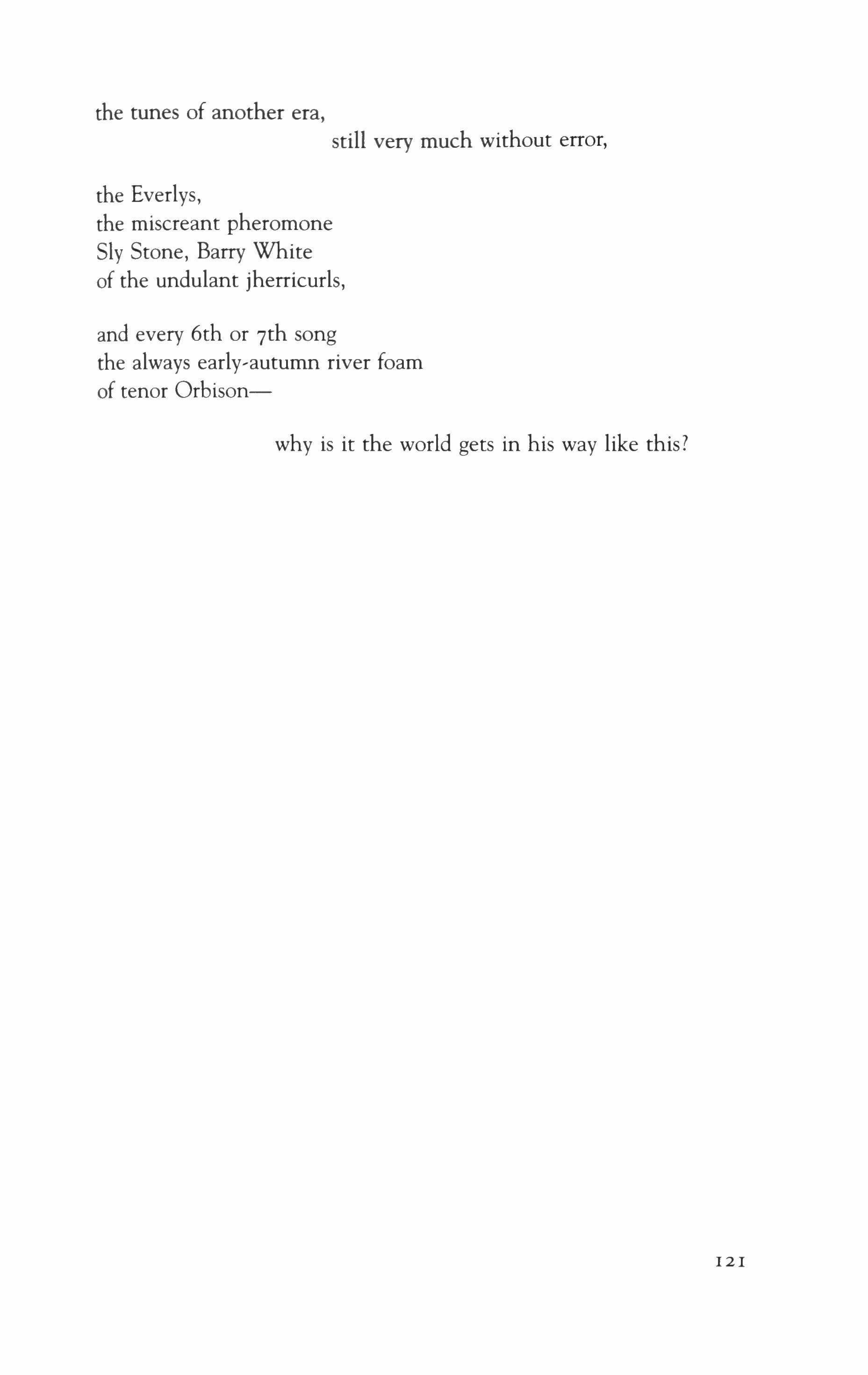
the tunes of another era, still very much without error, the Everlys, the miscreant pheromone Sly Stone, Barry White of the undulant jherricurls, and every 6th or 7th song the always early,autumn river foam of tenor Orbisonwhy is it the world gets in his way like this?
121
Asphalt, with Fading Dream of Quadratics
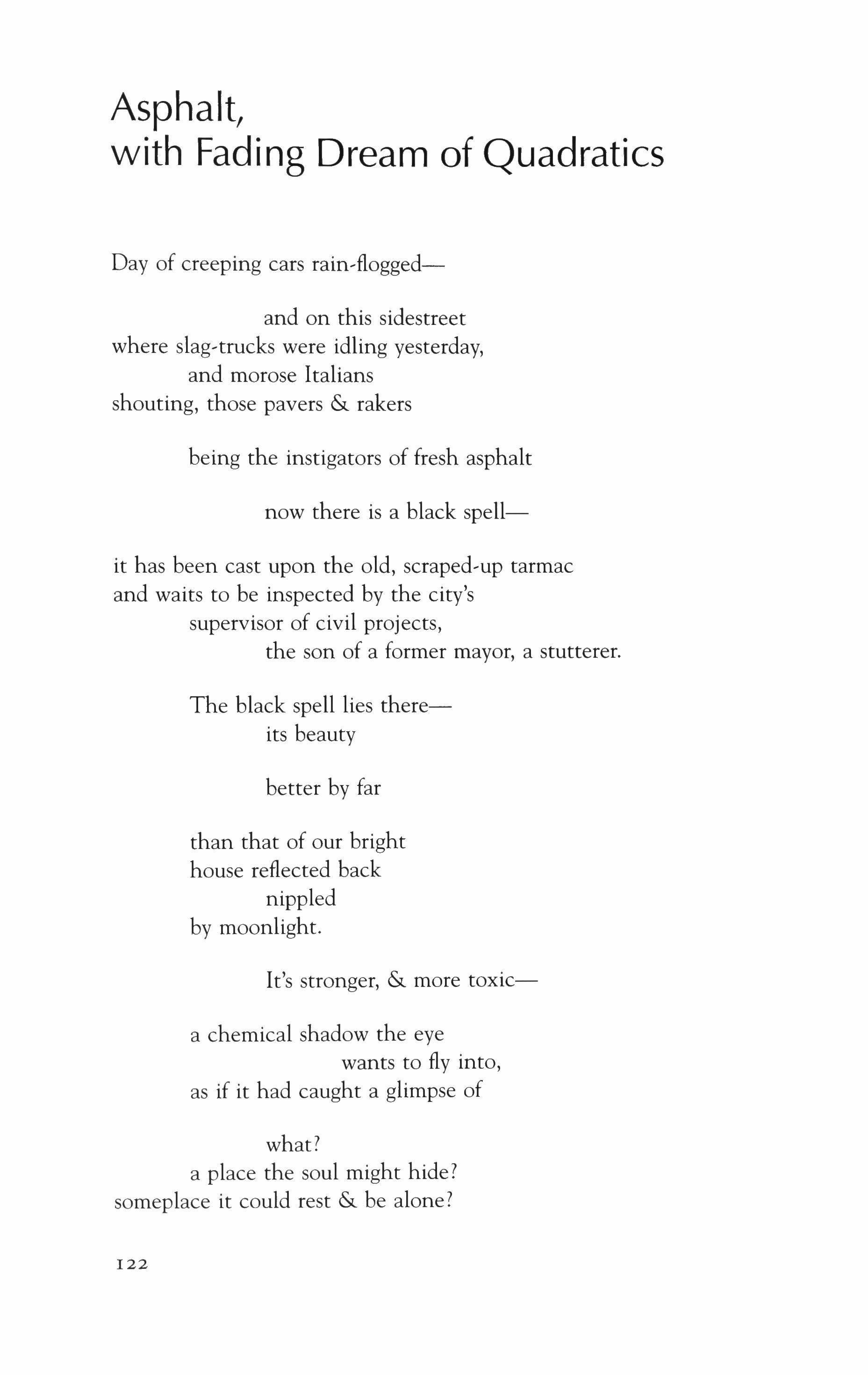
Day of creeping cars rain-flogged-s-
and on this sidestreet where slag,trucks were idling yesterday, and morose Italians shouting, those pavers & rakers
being the instigators of fresh asphalt
now there is a black spellit has been cast upon the old, scraped,up tarmac and waits to be inspected by the city's supervisor of civil projects, the son of a former mayor, a stutterer.
The black spell lies thereits beauty
better by far than that of our bright house reflected back nippled by moonlight.
It's stronger, & more toxica chemical shadow the eye wants to fly into, as if it had caught a glimpse of what?
a place the soul might hide? someplace it could rest & be alone?
122

I couldn't say.
And what exactly is the soulespecially when the supereminent rain slows, & the noise cuts out-
now it's a light twang from elsewhere, some birdsong in this lovely wet breeze, a creaking backdoor, out of which a black police sergeant is hurrying in a green raincoat, a color last seen in the last of last night's dreams, a Benadryl-induced dreamthe rim of one of the wheelchair's wheels had been completely coated by a phosphorescent moss, but the missing math homework Algebra II's quadratic formula was just about to be found.
123
Mark Rudman
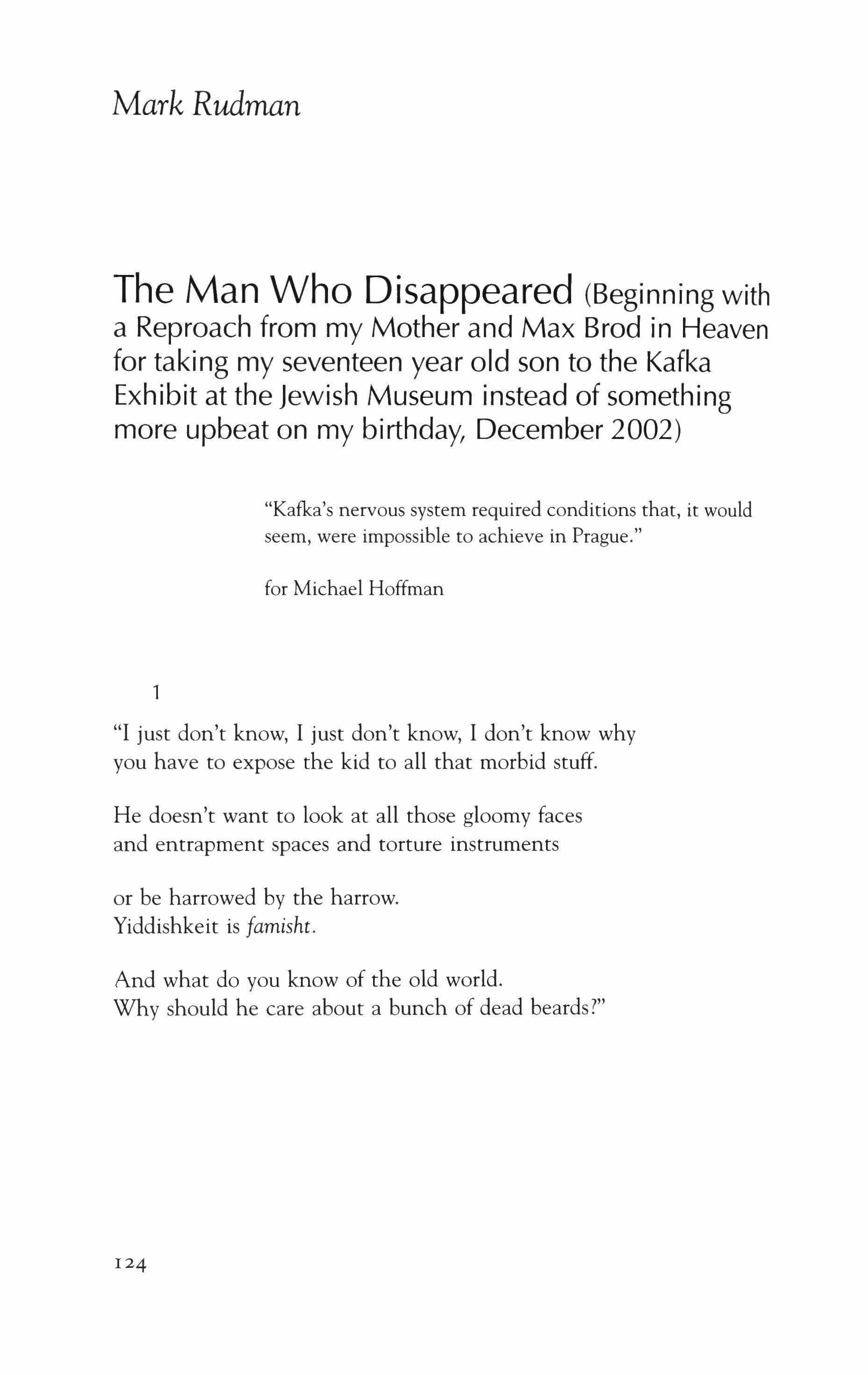
The Man Who Disappeared (Beginning with a Reproach from my Mother and Max Brad in Heaven for taking my seventeen year old son to the Kafka Exhibit at the Jewish Museum instead of something more upbeat on my birthday, December 2002)
"Kafka's nervous system required conditions that, it would seem, were impossible to achieve in Prague."
for Michael Hoffman
"I just don't know, I just don't know, I don't know why you have to expose the kid to all that morbid stuff.
He doesn't want to look at all those gloomy faces and entrapment spaces and torture instruments or be harrowed by the harrow. Yiddishkeit is famisht.
And what do you know of the old world. Why should he care about a bunch of dead beards?"
124
Where I live there are gargoyles to rival those of Prague.
What we call history is a wingbeat.
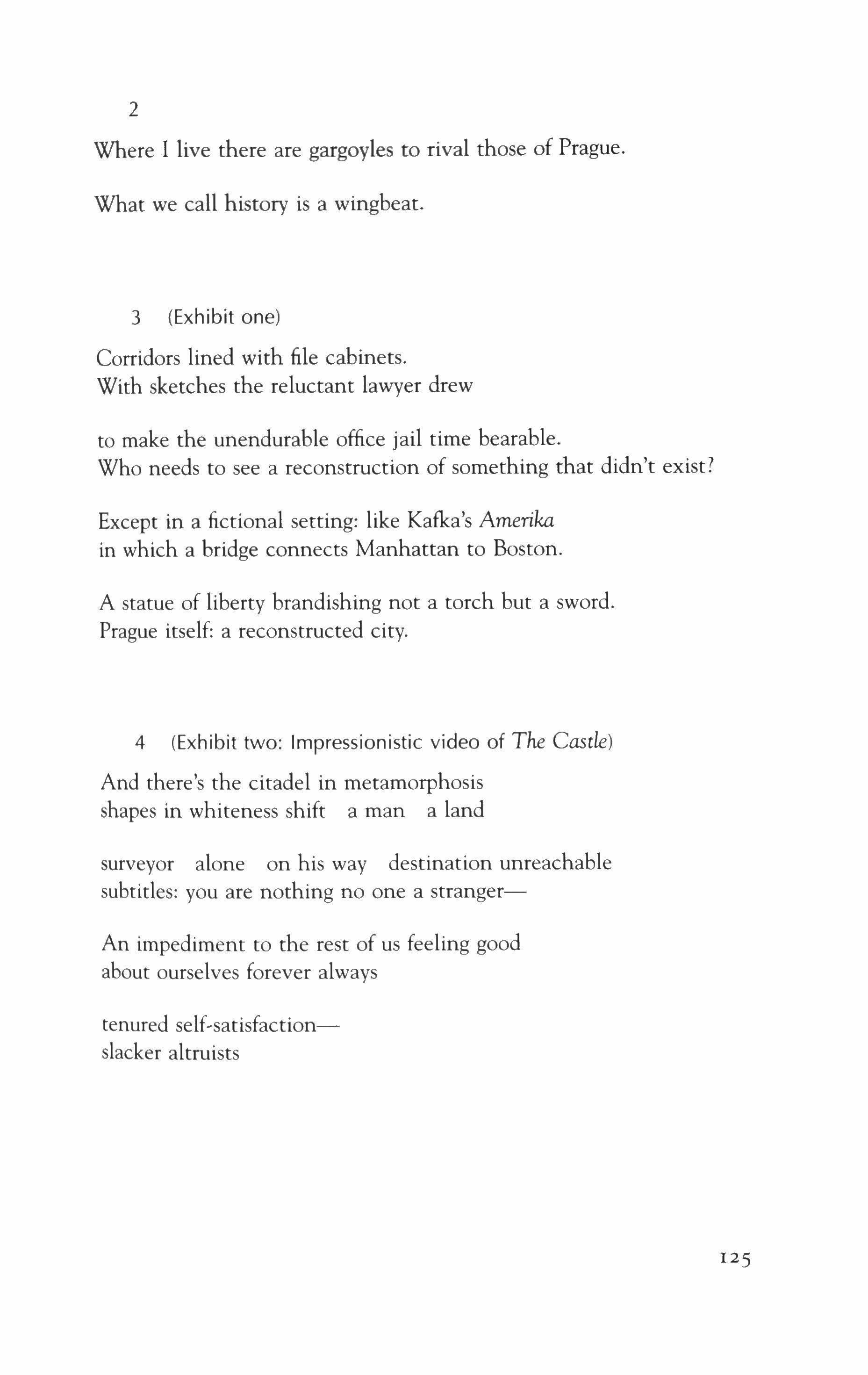
3 (Exhibit one)
Corridors lined with file cabinets. With sketches the reluctant lawyer drew to make the unendurable office jail time bearable. Who needs to see a reconstruction of something that didn't exist?
Except in a fictional setting: like Kafka's Amerika in which a bridge connects Manhattan to Boston.
A statue of liberty brandishing not a torch but a sword. Prague itself: a reconstructed city.
4 (Exhibit two: Impressionistic video of The Castle)
And there's the citadel in metamorphosis shapes in whiteness shift a man a land
surveyor alone on his way destination unreachable subtitles: you are nothing no one a stranger-
An impediment to the rest of us feeling good about ourselves forever always tenured self-satisfactionslacker altruists
2
125
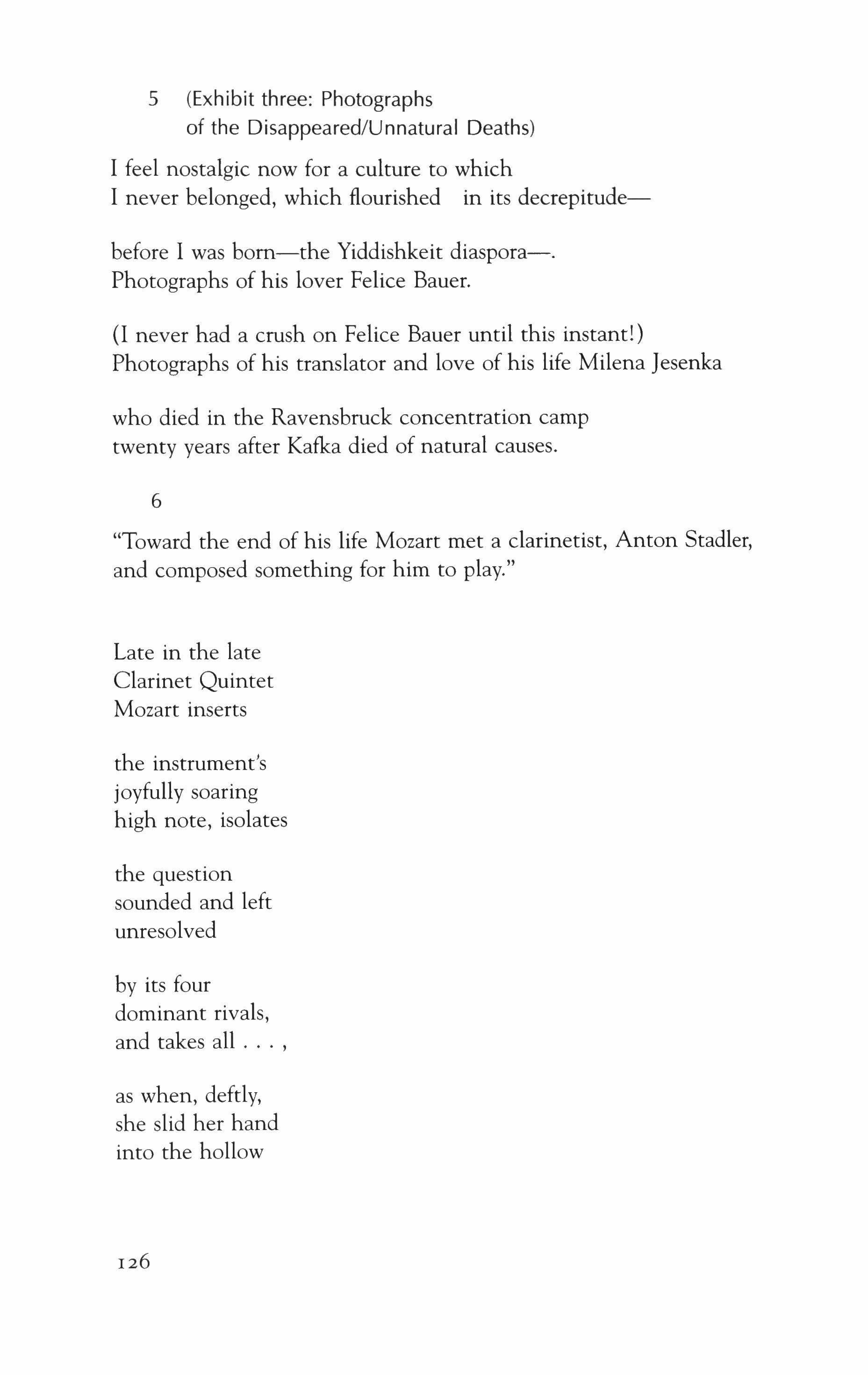
5 (Exhibit three: Photographs of the Disappeared/Unnatural Deaths)
I feel nostalgic now for a culture to which I never belonged, which flourished in its decrepitudebefore I was born-the Yiddishkeit diaspora-. Photographs of his lover Felice Bauer.
(I never had a crush on Felice Bauer until this instant!) Photographs of his translator and love of his life Milena [esenka who died in the Ravensbruck concentration camp twenty years after Kafka died of natural causes.
6
"Toward the end of his life Mozart met a clarinetist, Anton Stadler, and composed something for him to play."
Late in the late Clarinet Quintet Mozart inserts the instrument's joyfully soaring high note, isolates the question sounded and left unresolved by its four dominant rivals, and takes all as when, deftly, she slid her hand into the hollow
126
below the navel, above the groin, and the small empty space between skin and skin disappeared.
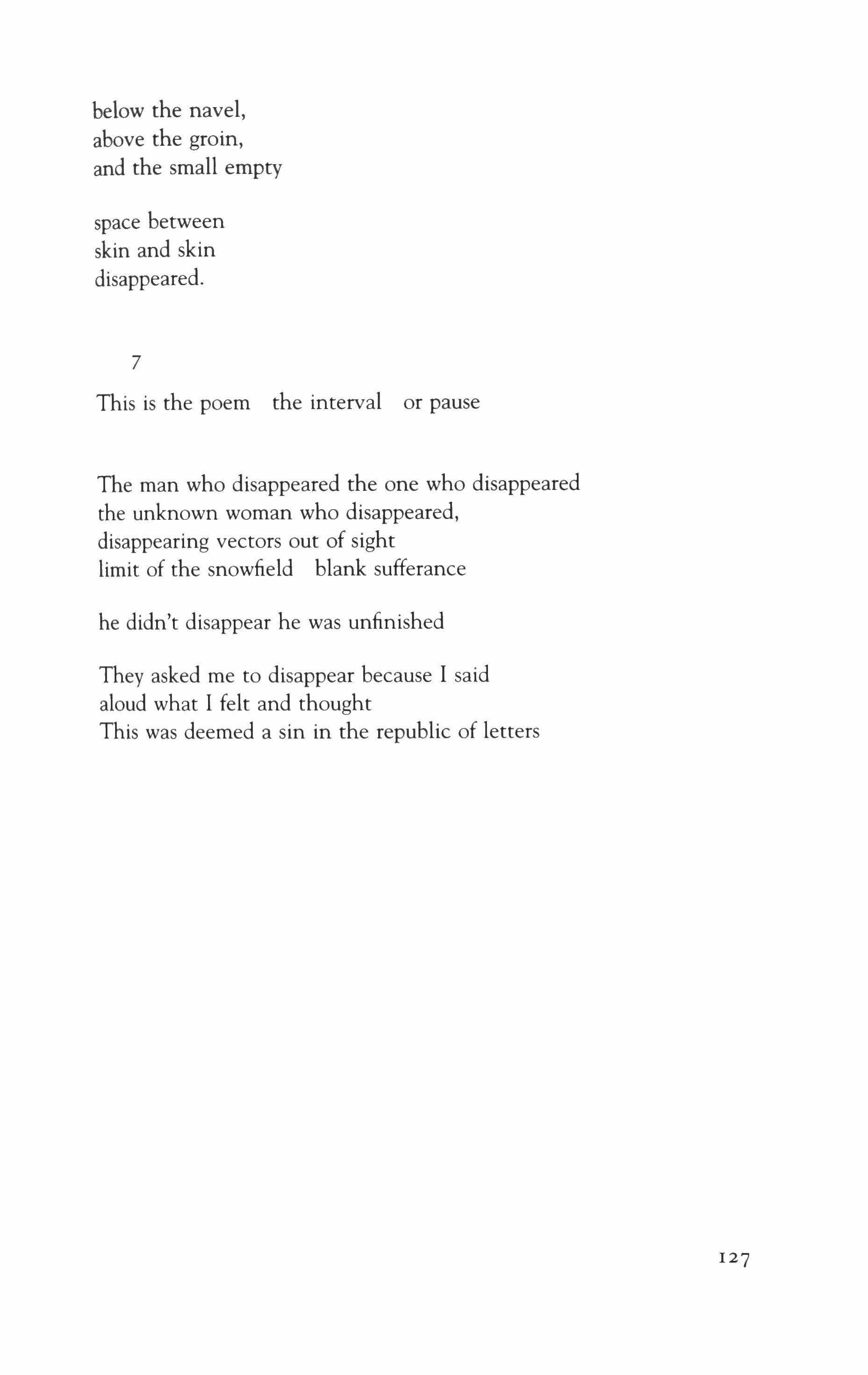
7
This is the poem the interval or pause
The man who disappeared the one who disappeared the unknown woman who disappeared, disappearing vectors out of sight limit of the snowfield blank sufferance he didn't disappear he was unfinished
They asked me to disappear because I said aloud what I felt and thought This was deemed a sin in the republic of letters
127
Alan Shapiro

Anger
One morning toward the end of 20 years of marriage he awakens before she does and watches her beside him, her back to him, the covers pulled up tight and clutched in both hands, her eyes tense, everything about her stiffened even in dream against him, sealed away. Unusual for him to wake before her. Most mornings he's lulled from sleep in the half dark by the low murmuring rivulet of words the yoga teacher on the video is speaking, and by the music that isn't music so much as birdsong on the verge of music, or music birdsong, some dreamy confluence of one into the other, and she is there in the tv's soft light, at the foot of the bed, in pajama bottoms, and a skimpy tank top, her lovely body that he hasn't touched in how long now? five months maybe? longer? the body he knows he'll never touch again right there before him, there to be looked at without her knowing, being moved, it seems, yes, carried, drifted from pose to pose by the whispery currents of the teacher's urging-the Warrior, the Dog, the Dolphin, and then the two he always waits for, the Cobra that has her hips flat on the floor, arms pushing up slowly, straighening while the back arches, keeps arching till the breasts push out against the tank top and the nipples show, and then the one the Cobra mutates into, hands reaching
128
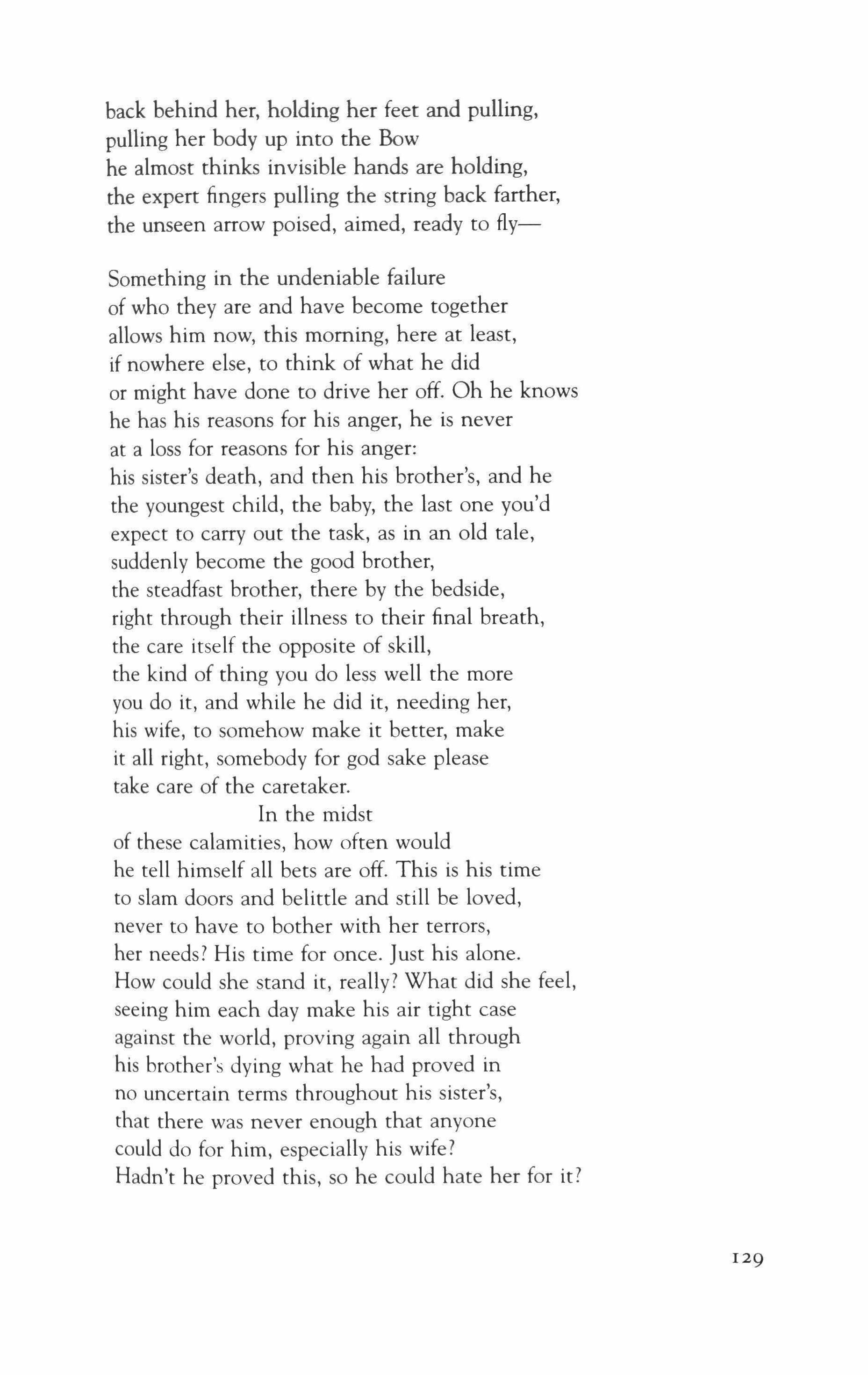
back behind her, holding her feet and pulling, pulling her body up into the Bow he almost thinks invisible hands are holding, the expert fingers pulling the string back farther, the unseen arrow poised, aimed, ready to fly-
Something in the undeniable failure of who they are and have become together allows him now, this morning, here at least, if nowhere else, to think of what he did or might have done to drive her off. Oh he knows he has his reasons for his anger, he is never at a loss for reasons for his anger: his sister's death, and then his brother's, and he the youngest child, the baby, the last one you'd expect to carry out the task, as in an old tale, suddenly become the good brother, the steadfast brother, there by the bedside, right through their illness to their final breath, the care itself the opposite of skill, the kind of thing you do less well the more you do it, and while he did it, needing her, his wife, to somehow make it better, make it all right, somebody for god sake please take care of the caretaker.
In the midst of these calamities, how often would he tell himself all bets are off. This is his time to slam doors and belittle and still be loved, never to have to bother with her terrors, her needs? His time for once. Just his alone. How could she stand it, really? What did she feel, seeing him each day make his air tight case against the world, proving again all through his brother's dying what he had proved in no uncertain terms throughout his sister's, that there was never enough that anyone could do for him, especially his wife? Hadn't he proved this, so he could hate her for it?
129

One night not long ago, the children asleep, they got to arguing over something, he can't remember what, she was trying to explain something to him, defend herself against some accusation in his tone, which he denied was there, and she insisted she heard, when all at once he stood and grabbed a chair and slammed it down and shattered it to pieces. She was terrified, and he apologized, then wanted to make love, it had been so long, and she said, how can I touch you when you're like this? And he snapped back, well, maybe if you did touch me I wouldn't be like this.
Sometimes he almost thinks he's willed these losses, wooed them, that they were sent to him as answered prayers. No selfishness, no self-absorption, no amount of treachery could ever sate his appetite to be betrayed, neglected, shunted aside, so he could feel himself the righteously aggrieved, abandoned husband. Wouldn't that be beyond his wildest dreams if she were really having an affair, as he accused her of having almost daily? Who is it? Just tell me who it is? Is it the yoga teacher, the chiropractor? Who? How could she stand it except by pulling back in self-protection and in doing so play right into his hands and make him feel so innocent, so noble, so deserving?
One night, a few weeks back, their anger spent, exhausted into a rare intimacy, an almost elegaic closeness, as if they were remembering themselves like this, being a couple, lovers, talking in bed, she was telling him about this vision she'd had while doing yoga, of this white light, this warm miraculous white light that filled her
13°
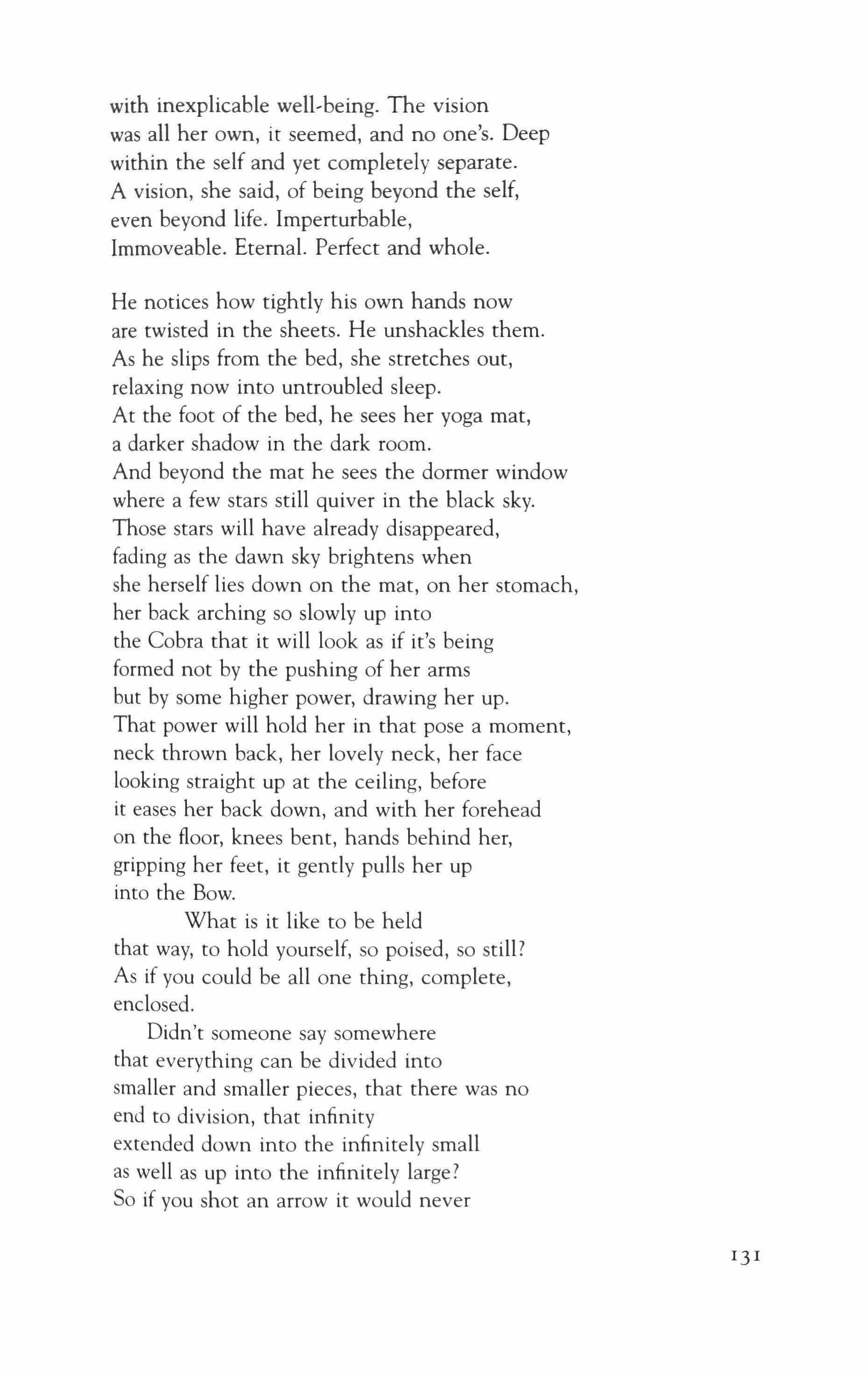
with inexplicable well-being, The vision was all her own, it seemed, and no one's. Deep within the self and yet completely separate. A vision, she said, of being beyond the self, even beyond life. Imperturbable, Immoveable. Eternal. Perfect and whole.
He notices how tightly his own hands now are twisted in the sheets. He unshackles them. As he slips from the bed, she stretches out, relaxing now into untroubled sleep. At the foot of the bed, he sees her yoga mat, a darker shadow in the dark room. And beyond the mat he sees the dormer window where a few stars still quiver in the black sky. Those stars will have already disappeared, fading as the dawn sky brightens when she herself lies down on the mat, on her stomach, her back arching so slowly up into the Cobra that it will look as if it's being formed not by the pushing of her arms but by some higher power, drawing her up. That power will hold her in that pose a moment, neck thrown back, her lovely neck, her face looking straight up at the ceiling, before it eases her back down, and with her forehead on the floor, knees bent, hands behind her, gripping her feet, it gently pulls her up into the Bow.
What is it like to be held that way, to hold yourself, so poised, so still? As if you could be all one thing, complete, enclosed.
Didn't someone say somewhere that everything can be divided into smaller and smaller pieces, that there was no end to division, that infinity extended down into the infinitely small as well as up into the infinitely large? So if you shot an arrow it would never
131
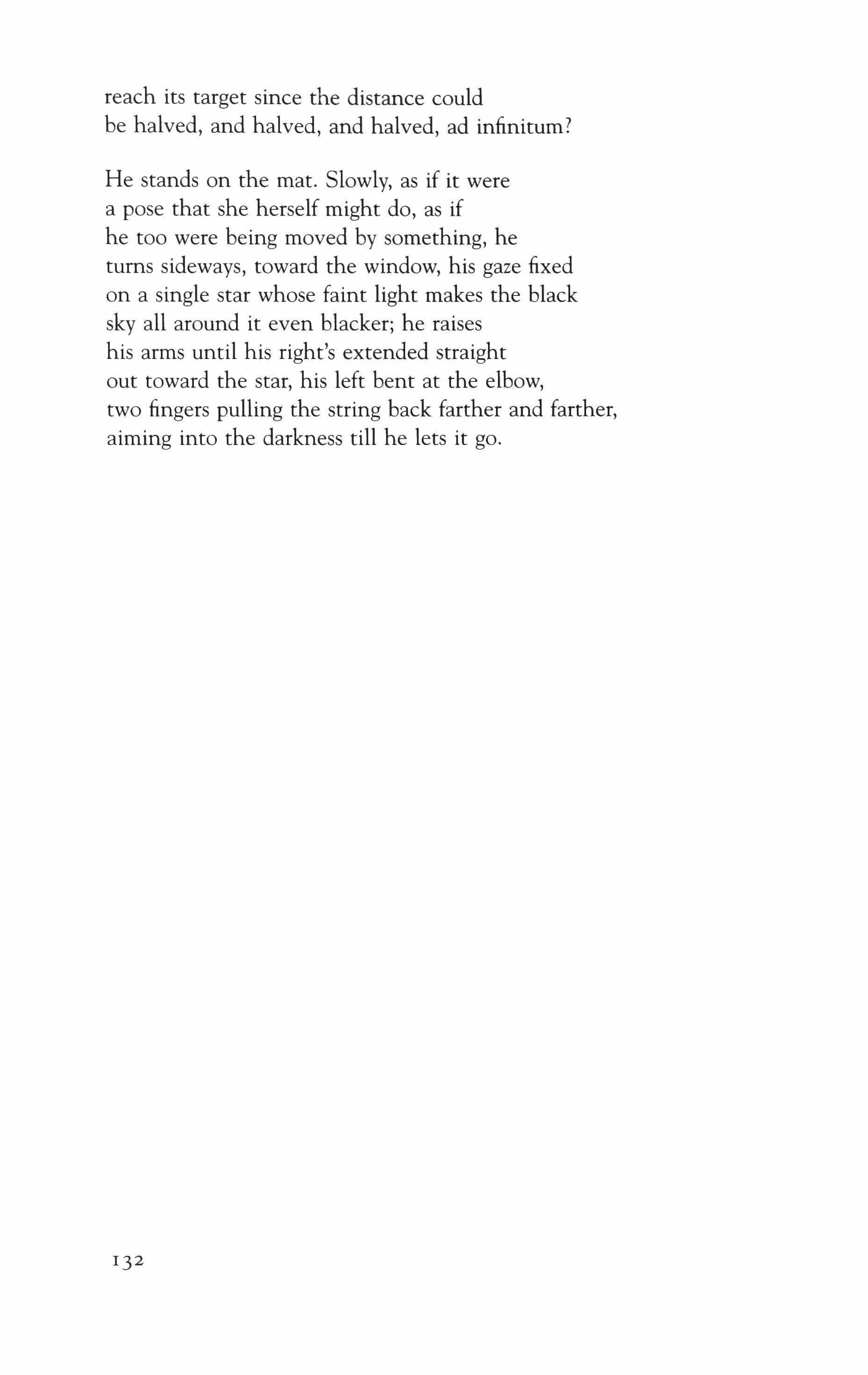
reach its target since the distance could be halved, and halved, and halved, ad infinitum?
He stands on the mat. Slowly, as if it were a pose that she herself might do, as if he too were being moved by something, he turns sideways, toward the window, his gaze fixed on a single star whose faint light makes the black sky all around it even blacker; he raises his arms until his right's extended straight out toward the star, his left bent at the elbow, two fingers pulling the string back farther and farther, aiming into the darkness till he lets it go.
132
Lily Pond
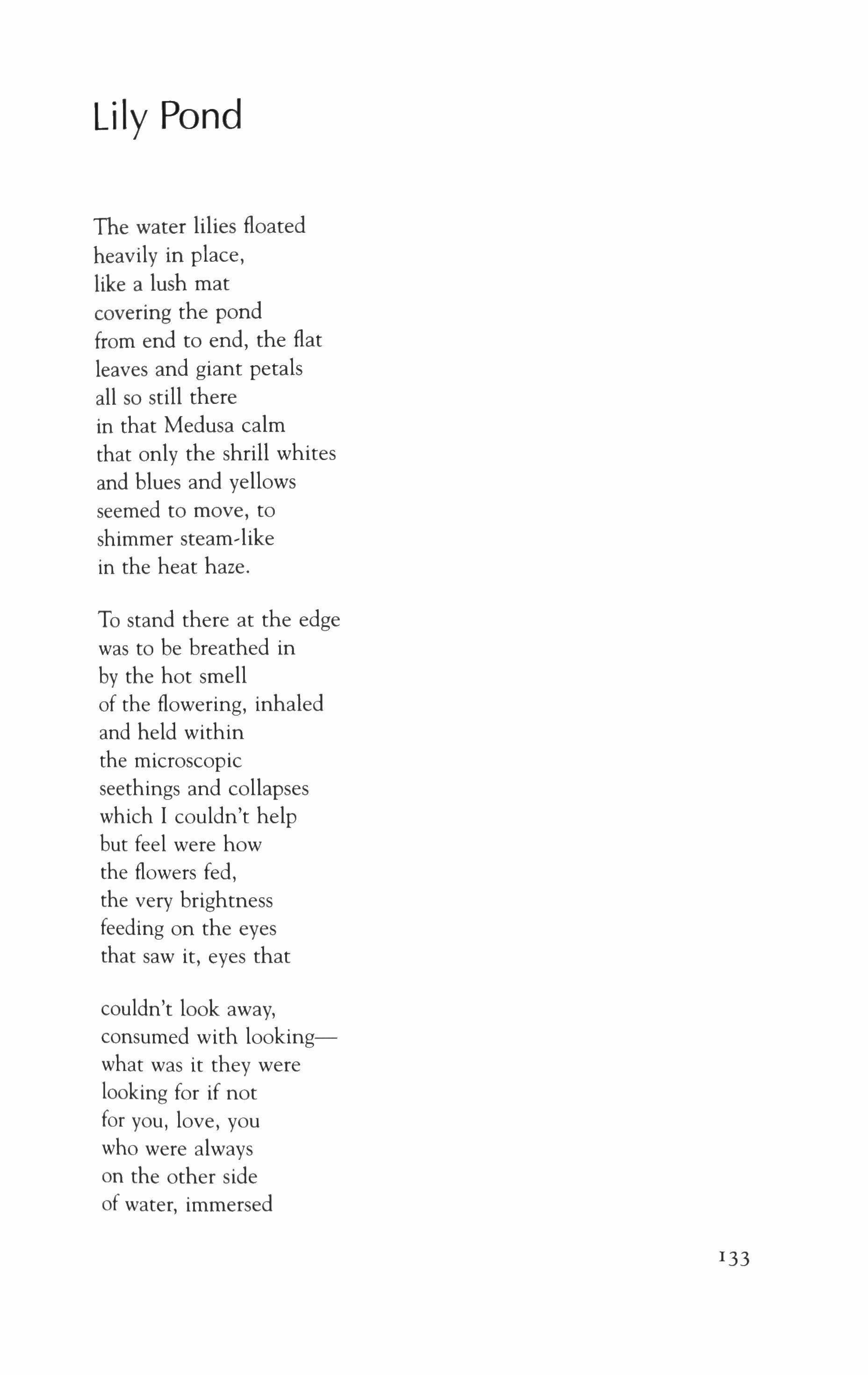
The water lilies floated heavily in place, like a lush mat covering the pond from end to end, the flat leaves and giant petals all so still there in that Medusa calm that only the shrill whites and blues and yellows seemed to move, to shimmer steam-like in the heat haze.
To stand there at the edge was to be breathed in by the hot smell of the flowering, inhaled and held within the microscopic seethings and collapses which I couldn't help but feel were how the flowers fed, the very brightness feeding on the eyes that saw it, eyes that couldn't look away, consumed with lookingwhat was it they were looking for if not for you, love, you who were always on the other side of water, immersed
133
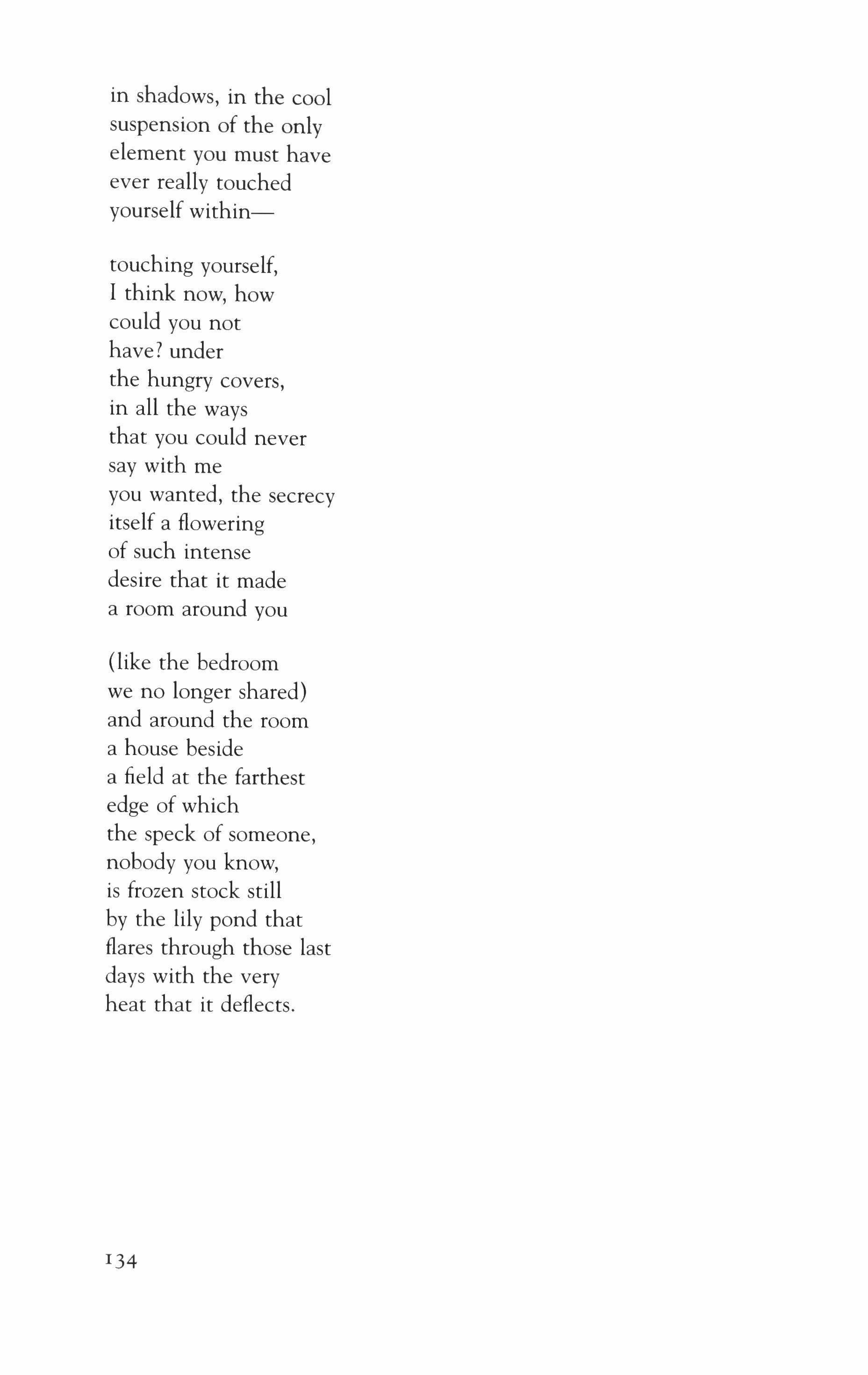
in shadows, in the cool suspension of the only element you must have ever really touched yourself within-
touching yourself, I think now, how could you not have? under the hungry covers, in all the ways that you could never say with me you wanted, the secrecy itself a flowering of such intense desire that it made a room around you {like the bedroom we no longer shared) and around the room a house beside a field at the farthest edge of which the speck of someone, nobody you know, is frozen stock still by the lily pond that flares through those last days with the very heat that it deflects.
134
Jane Shore
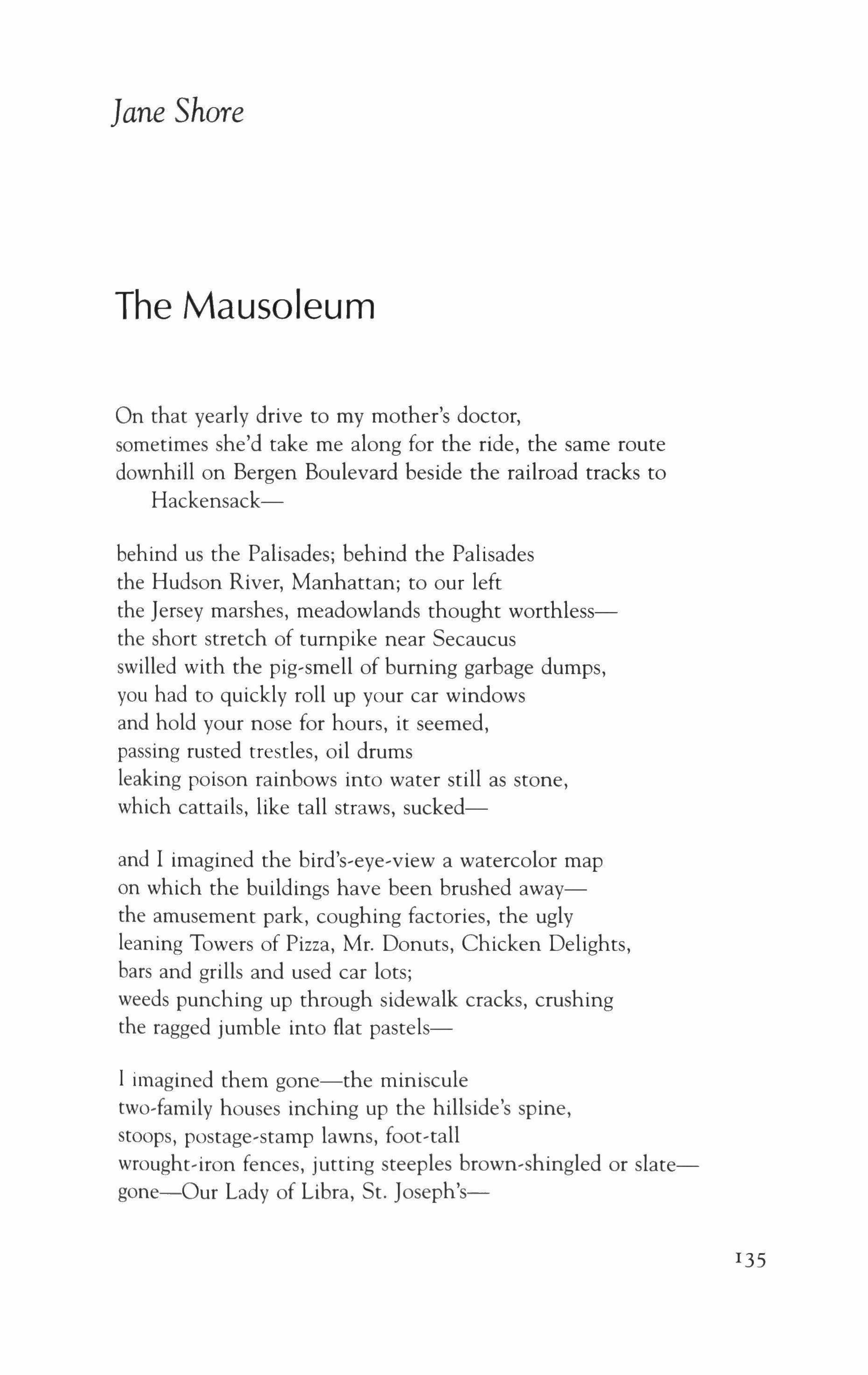
The Mausoleum
On that yearly drive to my mother's doctor, sometimes she'd take me along for the ride, the same route downhill on Bergen Boulevard beside the railroad tracks to Hackensackbehind us the Palisades; behind the Palisades the Hudson River, Manhattan; to our left the Jersey marshes, meadowlands thought worthlessthe short stretch of turnpike near Secaucus swilled with the pig-smell of burning garbage dumps, you had to quickly roll up your car windows and hold your nose for hours, it seemed, passing rusted trestles, oil drums leaking poison rainbows into water still as stone, which cattails, like tall straws, sucked-
and I imagined the bird's-eye-view a watercolor map on which the buildings have been brushed awaythe amusement park, coughing factories, the ugly leaning Towers of Pizza, Mr. Donuts, Chicken Delights, bars and grills and used car lots; weeds punching up through sidewalk cracks, crushing the ragged jumble into flat pastels-
I imagined them gone-the miniscule two-family houses inching up the hillside's spine, stoops, postage-stamp lawns, foot-tall wrought-iron fences, jutting steeples brown-shingled or slategone-Our Lady of Libra, St. Joseph's-
135
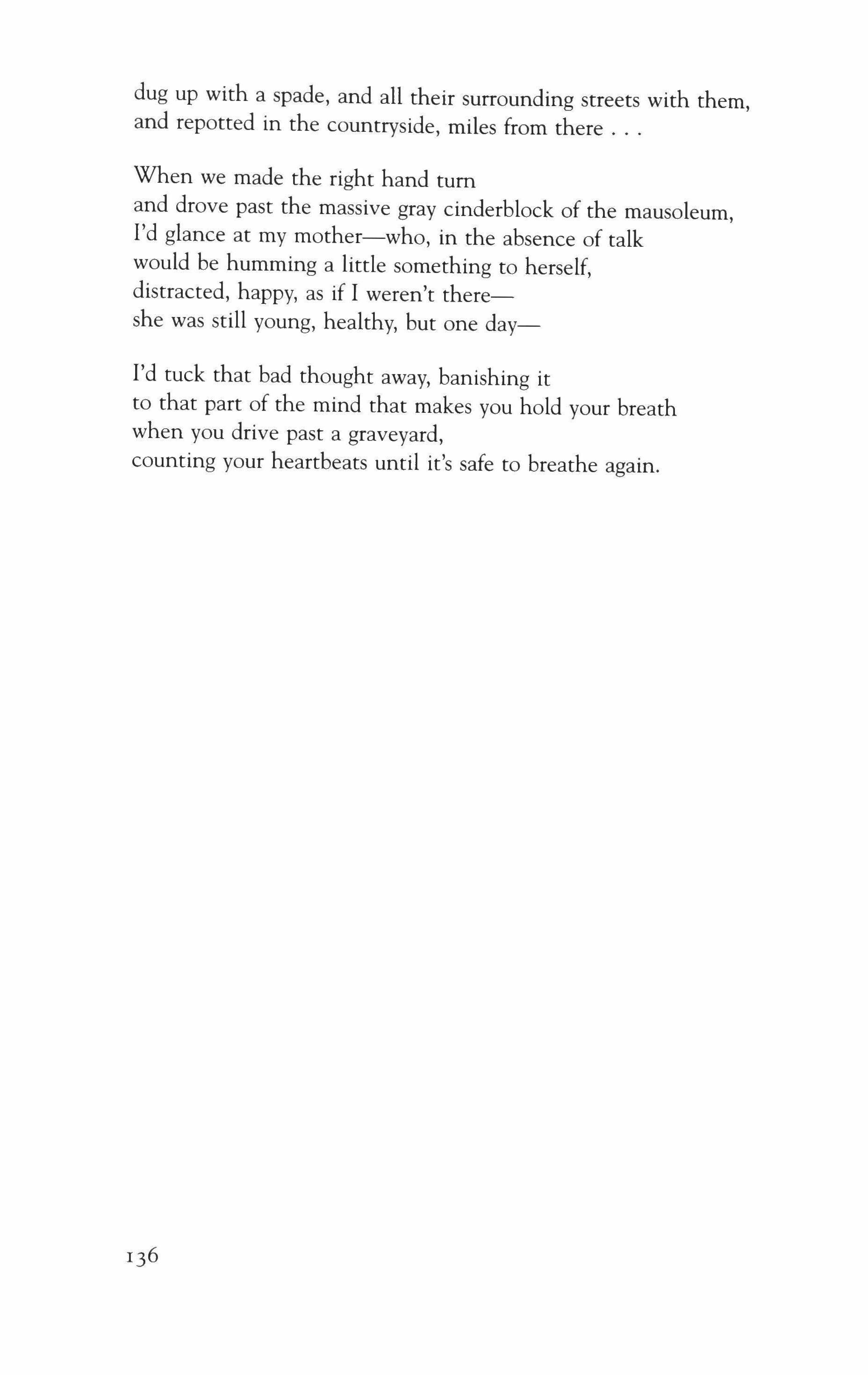
dug up with a spade, and all their surrounding streets with them, and repotted in the countryside, miles from there
When we made the right hand tum and drove past the massive gray cinderblock of the mausoleum, I'd glance at my mother-who, in the absence of talk would be humming a little something to herself, distracted, happy, as if I weren't thereshe was still young, healthy, but one day-
I'd tuck that bad thought away, banishing it to that part of the mind that makes you hold your breath when you drive past a graveyard, counting your heartbeats until it's safe to breathe again.
R. D. Skillings
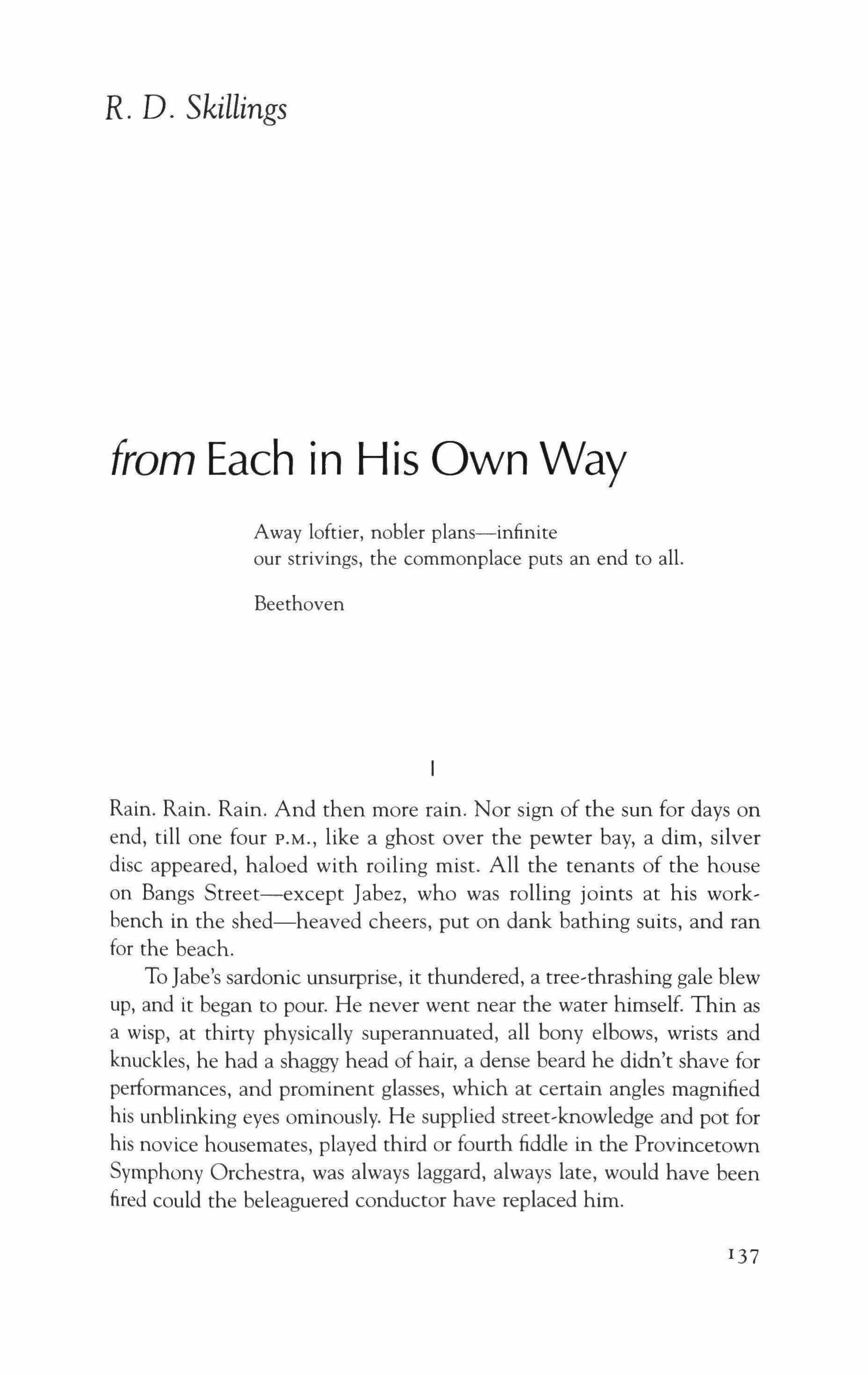
from Each in His Own Way
Away loftier, nobler plans-infinite our strivings, the commonplace puts an end to all.
Beethoven
Rain. Rain. Rain. And then more rain. Nor sign of the sun for days on end, till one four P.M., like a ghost over the pewter bay, a dim, silver disc appeared, haloed with roiling mist. All the tenants of the house on Bangs Street-except [abez, who was rolling joints at his workbench in the shed-heaved cheers, put on dank bathing suits, and ran for the beach.
To [abe's sardonic unsurprise, it thundered, a tree-thrashing gale blew up, and it began to pour. He never went near the water himself. Thin as a wisp, at thirty physically superannuated, all bony elbows, wrists and knuckles, he had a shaggy head of hair, a dense beard he didn't shave for performances, and prominent glasses, which at certain angles magnified his unblinking eyes ominously. He supplied street-knowledge and pot for his novice housemates, played third or fourth fiddle in the Provincetown Symphony Orchestra, was always laggard, always late, would have been fired could the beleaguered conductor have replaced him.
137
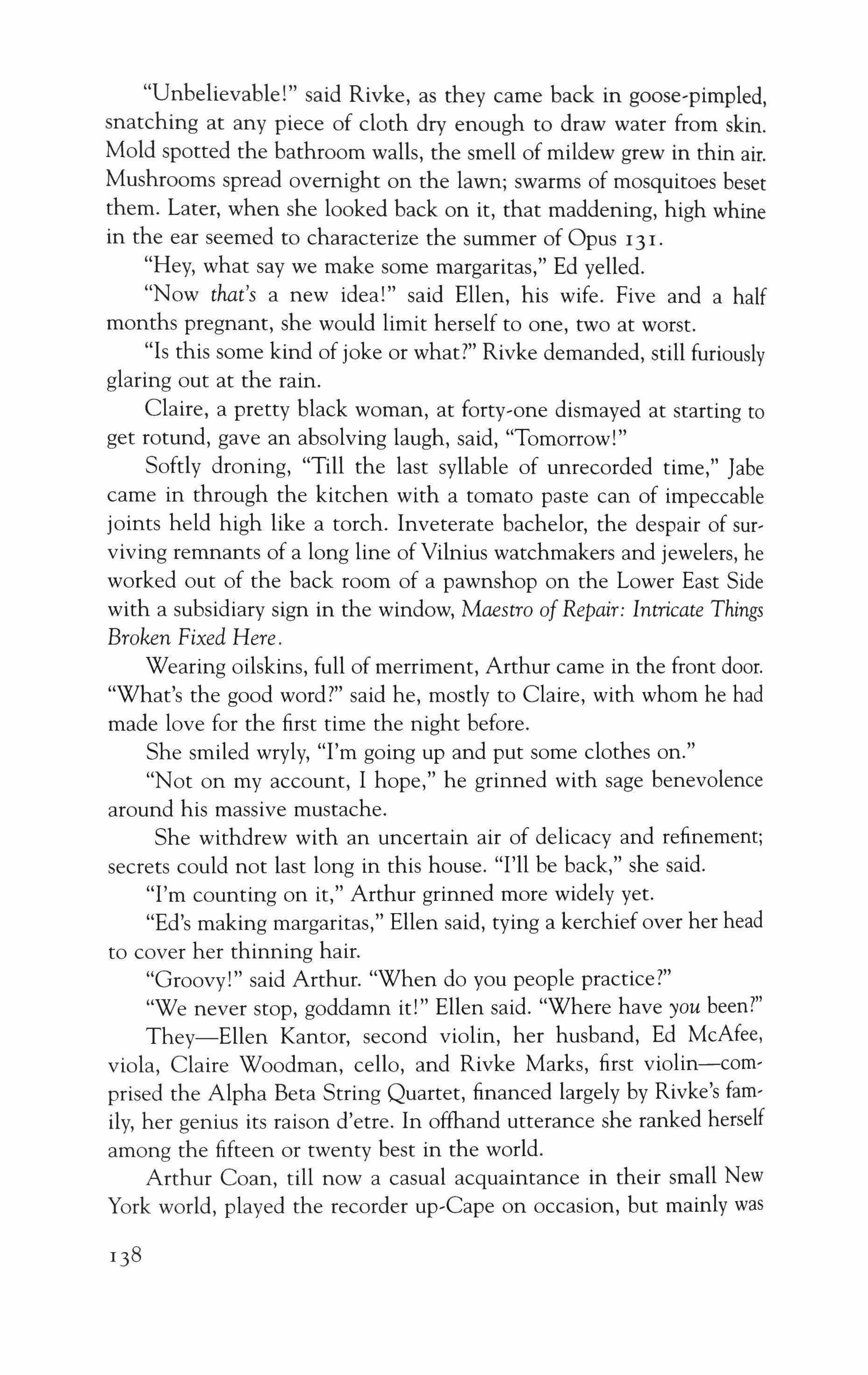
"Unbelievable!" said Rivke, as they came back in goose-pimpled, snatching at any piece of cloth dry enough to draw water from skin. Mold spotted the bathroom walls, the smell of mildew grew in thin air. Mushrooms spread overnight on the lawn; swarms of mosquitoes beset them. Later, when she looked back on it, that maddening, high whine in the ear seemed to characterize the summer of Opus 13 I
"Hey, what say we make some margaritas," Ed yelled.
"Now that's a new idea!" said Ellen, his wife. Five and a half months pregnant, she would limit herself to one, two at worst.
"Is this some kind of joke or what?" Rivke demanded, still furiously glaring out at the rain.
Claire, a pretty black woman, at forty,one dismayed at starting to get rotund, gave an absolving laugh, said, "Tomorrow!"
Softly droning, "Till the last syllable of unrecorded time," [abe came in through the kitchen with a tomato paste can of impeccable joints held high like a torch. Inveterate bachelor, the despair of sur' viving remnants of a long line of Vilnius watchmakers and jewelers, he worked out of the back room of a pawnshop on the Lower East Side with a subsidiary sign in the window, Maestro ofRepair: Intricate Things Broken Fixed Here.
Wearing oilskins, full of merriment, Arthur came in the front door. "What's the good word?" said he, mostly to Claire, with whom he had made love for the first time the night before.
She smiled wryly, "I'm going up and put some clothes on."
"Not on my account, I hope," he grinned with sage benevolence around his massive mustache.
She withdrew with an uncertain air of delicacy and refinement; secrets could not last long in this house. "I'll be back," she said.
"I'm counting on it," Arthur grinned more widely yet.
"Ed's making margaritas," Ellen said, tying a kerchief over her head to cover her thinning hair.
"Groovy!" said Arthur. "When do you people practice?"
"We never stop, goddamn it!" Ellen said. "Where have you been?"
They-Ellen Kantor, second violin, her husband, Ed McAfee, viola, Claire Woodman, cello, and Rivke Marks, first violin-com, prised the Alpha Beta String Quartet, financed largely by Rivke's family, her genius its raison d'etre. In offhand utterance she ranked herself among the fifteen or twenty best in the world.
Arthur Coan, till now a casual acquaintance in their small New York world, played the recorder up-Cape on occasion, but mainly was

taking a summer break from the City. He had a lean-to and tent in the dunes, unknown to the National Park Service, in a commodious grove of gnarled pitch pines. He was eager to show Claire his proud pied-a-terre with all its ingenious amenities, but Claire was not a great walker, and it was quite a way-up dunes, down dunes, through bogs and around glistering pastures of poison ivy. He went on smiling nonetheless with the belief that all would somehow work out in the end, even the Beethoven.
Raining as usual, it was also eve of another weekend, with social disruptions in view, another week closer to Armageddon, the Pinnacle, the Terrible Reckoning, IT, of which all were acutely, constantly aware. Even Jabez trimmed his cynicism as they fought to hold together long enough to perform the feat they had set for themselves in their last concert of the season.
They had been working on the Cvsharp minor Quartet, Opus 131 off and on for months, and in their collective heart they secretly feared it could not be played, not by them, not this year. At moments each felt an unbearable burden of humility before the spirit of the music, as if Himself were present-all but Rivke, coldly bent on fame, who could say without apparent hyperbole, "All I want is someone to tell me what to play and how to play it."
Beethoven, schmatoven to her. Now the C-sharp minor, that was something else. There was the only reality. People were always the problem.
Nor was it long before Warren Wender and Claude Frolleur dropped in, Claude for want of company and love of music, Warren to pursue his affair with Rivke. Her husband Jonathan and son Amadeus, age nine, were coming on the morrow; Warren hoped but doubted she would share her bed with him that night.
They never went near each other in daylight, less from discretion than the intensity of their preoccupations, that psychic distance their only real bond. One night he had stopped by to see [abez. All but Rivke had gone to the movies. That said, she asked, "Would you like to go upstairs?"
To Warren this was not an unlocked-for boon; with his sleepwalker's semblance of docility he had simply followed her up. She went at love as she did music-with brute, frontal simplicity-and Warren, admiring and respectful of her mono-minded attachment to her fiddle, was therefore incautious, hard anyway, as she herself was hard, or at least as he deemed her hardness to be.
139

The others were merely nice, harmless people, except perhaps Jabez, whose insinuating murmur was always depreciating the future, evoking pitfalls and mischance, wrong paths, hapless ends each must reach, given their respective proclivities, ingenious fabrications whether malicious, admonitory or merely idle, Warren had yet to fathom.
In fact Warren owed his initial interest in Rivke to Jabez, with whom she had once spent two nights, because, as she told Jabez, he was the coldest man she knew, therefore the safest to have an affair with-but then of course he turned out to be not at all what she wanted. "She's a child," Jabez had warned without rancor.
Truth of a sort, Warren was coming to see. It only surprised and fretted her that he should be in doubt about the night ahead, as if not to spend every minute they could together would be stupid, wasteful, wrong. "They never get here before noon," she added.
Eventually tiptoeing upstairs in the stertorous house-Ellen and Ed snored a nightly duet-even naked with their gooseflesh shivering together toward warmth, she went on bemoaning her inexplicable, incessant wretchedness.
Her mottled, inflamed face when she played, the gnarled tic between her eyes, her quick ferocity at mistakes, her own and others' both, her implacable disdain of her husband, who adored her, and her pitiful humility toward Ami, so strange, so formidable a child-these trials hardly abated between rehearsals, when her whole psyche was bent on the next one. Thinking of himself, Warren said, "You may never be happy."
She snapped on the light and looked over her shoulder at him.
"Why did you say that?"
"I just thought it might be true," he said. "Some people never get happy." He clasped himself more tightly against her buttocks. "You don't need it. Leave it to those who need it."
"What would make you say a thing like that?" she demanded.
"I guess I'm not the reassuring type," he said, not to say, I was only trying to help. He himself had long since renounced any personal claim to better than intermittent, numb relief from remorse for his little brother's death. He did though have the prudence to be gone by dawn, disappointed to find no juice left from the night's libations.
Jonathan and Amadeus arrived well before noon, having left early, both eager to see Ms. Paganini-Rubenstein. Still in her catsup-stained bathrobe, she was in an acid mood, even with Ami, who soon ran out
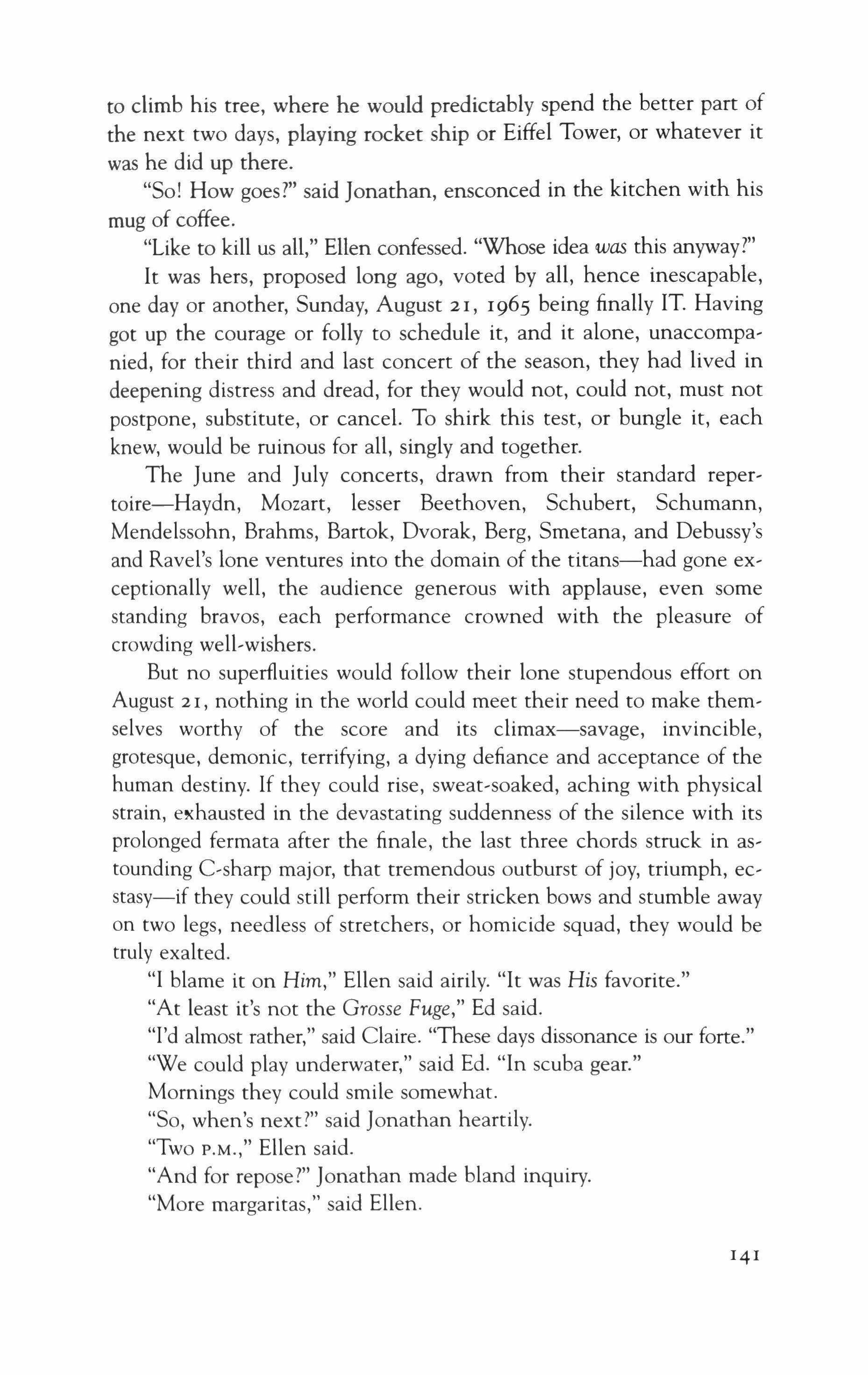
to climb his tree, where he would predictably spend the better part of the next two days, playing rocket ship or Eiffel Tower, or whatever it was he did up there.
"So! How goes?" said Jonathan, ensconced in the kitchen with his mug of coffee.
"Like to kill us all," Ellen confessed. "Whose idea was this anyway?"
It was hers, proposed long ago, voted by all, hence inescapable, one day or another, Sunday, August 21, 1965 being finally IT. Having got up the courage or folly to schedule it, and it alone, unaccompanied, for their third and last concert of the season, they had lived in deepening distress and dread, for they would not, could not, must not postpone, substitute, or cancel. To shirk this test, or bungle it, each knew, would be ruinous for all, singly and together.
The June and July concerts, drawn from their standard repertoire-Haydn, Mozart, lesser Beethoven, Schubert, Schumann, Mendelssohn, Brahms, Bartok, Dvorak, Berg, Smetana, and Debussy's and Ravel's lone ventures into the domain of the titans-had gone exceptionally well, the audience generous with applause, even some standing bravos, each performance crowned with the pleasure of crowding well-wishers.
But no superfluities would follow their lone stupendous effort on August 21, nothing in the world could meet their need to make themselves worthy of the score and its climax-savage, invincible, grotesque, demonic, terrifying, a dying defiance and acceptance of the human destiny. If they could rise, sweat-soaked, aching with physical strain, exhausted in the devastating suddenness of the silence with its prolonged fermata after the finale, the last three chords struck in astounding Cvsharp major, that tremendous outburst of joy, triumph, ecstasy-if they could still perform their stricken bows and stumble away on two legs, needless of stretchers, or homicide squad, they would be truly exalted.
"I blame it on Him," Ellen said airily. "It was His favorite."
"At least it's not the Grosse Fuge," Ed said.
"I'd almost rather," said Claire. "These days dissonance is our forte."
"We could play underwater," said Ed. "In scuba gear."
Mornings they could smile somewhat.
"So, when's next?" said Jonathan heartily.
"Two P.M.," Ellen said.
"And for repose?" Jonathan made bland inquiry.
"More margaritas," said Ellen.

"Now that's the best idea I've heard yet," said Ed, always cheered by mention of alcohol. He was not much of a drinker, never had been: none of them had, till this ordeal of Opus 13 I, mosquitoes and rain.
"Just beer for you," Rivke coldly warned Jonathan, who, the weekend before, despondent at her baleful unapproachability, had drunk too much, then loudly, convulsively retched till dawn on his knees in the bathroom, putting a dent in his dignity and her beyond reach for the rest of his visit, calling forth sympathetic humor from the others, which was no help either. These days whatever he said or did repelled her. All summer long she had gone off alone with Ami at every chance, even in the rain-if she could get him down from his tree.
When she went up to get dressed Jonathan followed with his suitcase, but she turned from his embrace, pulled on jeans and a sweatshirt before taking off her bathrobe, and led the way back downstairs.
Ed ignored, Ellen followed with silent aversion the progress of Rivke's affair. She was appalled at Jonathan-whom everyone respected-for letting Rivke make a slave and cuckold of him, alarmed by Amadeus, and concerned for Rivke, knowing Warren Wender for a fly-by-night, far more dangerous than Jabez, having no stake in their common enterprise, interesting no doubt, with his notebook collection of ludicrous deaths, smart, secret, obsessive in some way-but nothing but trouble for Rivke ahead.
Ellen was boss of all practicalities here, but Rivke's heart could not be coerced, hence Ellen tried not to worry about anything but her own unplanned, unwanted child, amazed at the thing growing in her belly, swelling her ankles, blimping her boobs, and revivifying-at least until quite lately-Ed's long-faded sexual ebullience. All well and good for the time being. But how could she be musician and mother both? Rivke, she knew, deplored her making the same mistake Rivke herself had made in having Ami, Ami whose love she now sought in vain, unable to retrieve her long foregone role as mother.
The main difference between them though-besides the deficit of genius-was that Rivke at least had had the sense not to marry a musician. Jonathan, a tenured European history scholar at Columbia, was a faithful helpmate with selfless patience and stamina; Rivke should at least make a pretense of appreciation.
The Quartet had been together, more or less, for three years, with minimal resorts to symphonic work, and all knew each other in and out, were good, forbearing friends with no illusions. All lived in doubt whether chamber music was a viable way of life, especially for a fine vi-
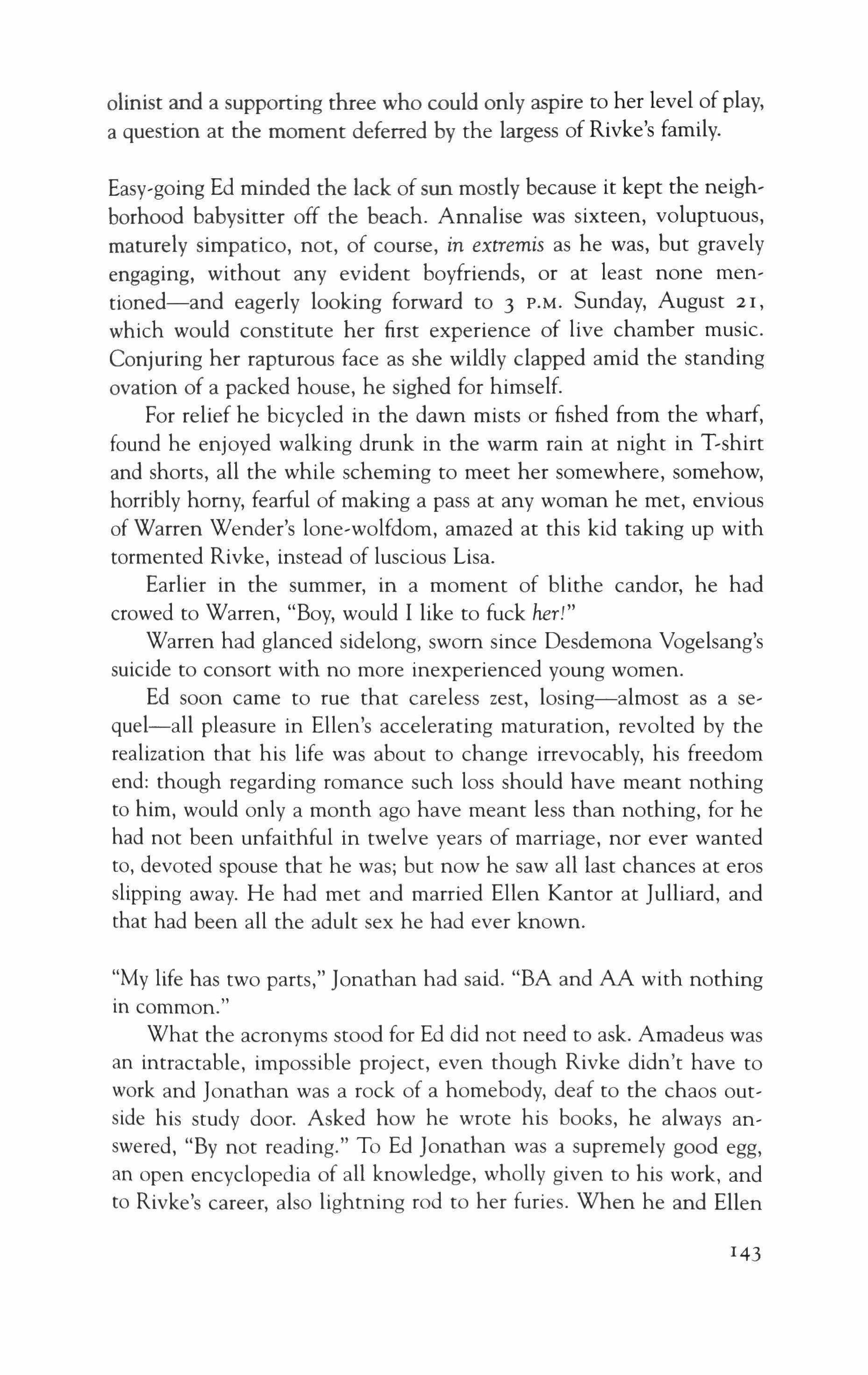
olinist and a supporting three who could only aspire to her level of play, a question at the moment deferred by the largess of Rivke's family.
Easy-going Ed minded the lack of sun mostly because it kept the neighborhood babysitter off the beach. Annalise was sixteen, voluptuous, maturely simpatico, not, of course, in extremis as he was, but gravely engaging, without any evident boyfriends, or at least none mentioned-and eagerly looking forward to 3 P.M. Sunday, August 21, which would constitute her first experience of live chamber music.
Conjuring her rapturous face as she wildly clapped amid the standing ovation of a packed house, he sighed for himself.
For relief he bicycled in the dawn mists or fished from the wharf, found he enjoyed walking drunk in the warm rain at night in T-shirt and shorts, all the while scheming to meet her somewhere, somehow, horribly horny, fearful of making a pass at any woman he met, envious of Warren Wender's lone-wolfdom, amazed at this kid taking up with tormented Rivke, instead of luscious Lisa.
Earlier in the summer, in a moment of blithe candor, he had crowed to Warren, "Boy, would I like to fuck her!"
Warren had glanced sidelong, sworn since Desdemona Vogelsang's suicide to consort with no more inexperienced young women.
Ed soon came to rue that careless zest, losing-almost as a sequel-all pleasure in Ellen's accelerating maturation, revolted by the realization that his life was about to change irrevocably, his freedom end: though regarding romance such loss should have meant nothing to him, would only a month ago have meant less than nothing, for he had not been unfaithful in twelve years of marriage, nor ever wanted to, devoted spouse that he was; but now he sawall last chances at eros slipping away. He had met and married Ellen Kantor at [ulliard, and that had been all the adult sex he had ever known.
"My life has two parts," Jonathan had said. "BA and AA with nothing in common."
What the acronyms stood for Ed did not need to ask. Amadeus was an intractable, impossible project, even though Rivke didn't have to work and Jonathan was a rock of a homebody, deaf to the chaos outside his study door. Asked how he wrote his books, he always answered, "By not reading." To Ed Jonathan was a supremely good egg, an open encyclopedia of all knowledge, wholly given to his work, and to Rivke's career, also lightning rod to her furies. When he and Ellen
143
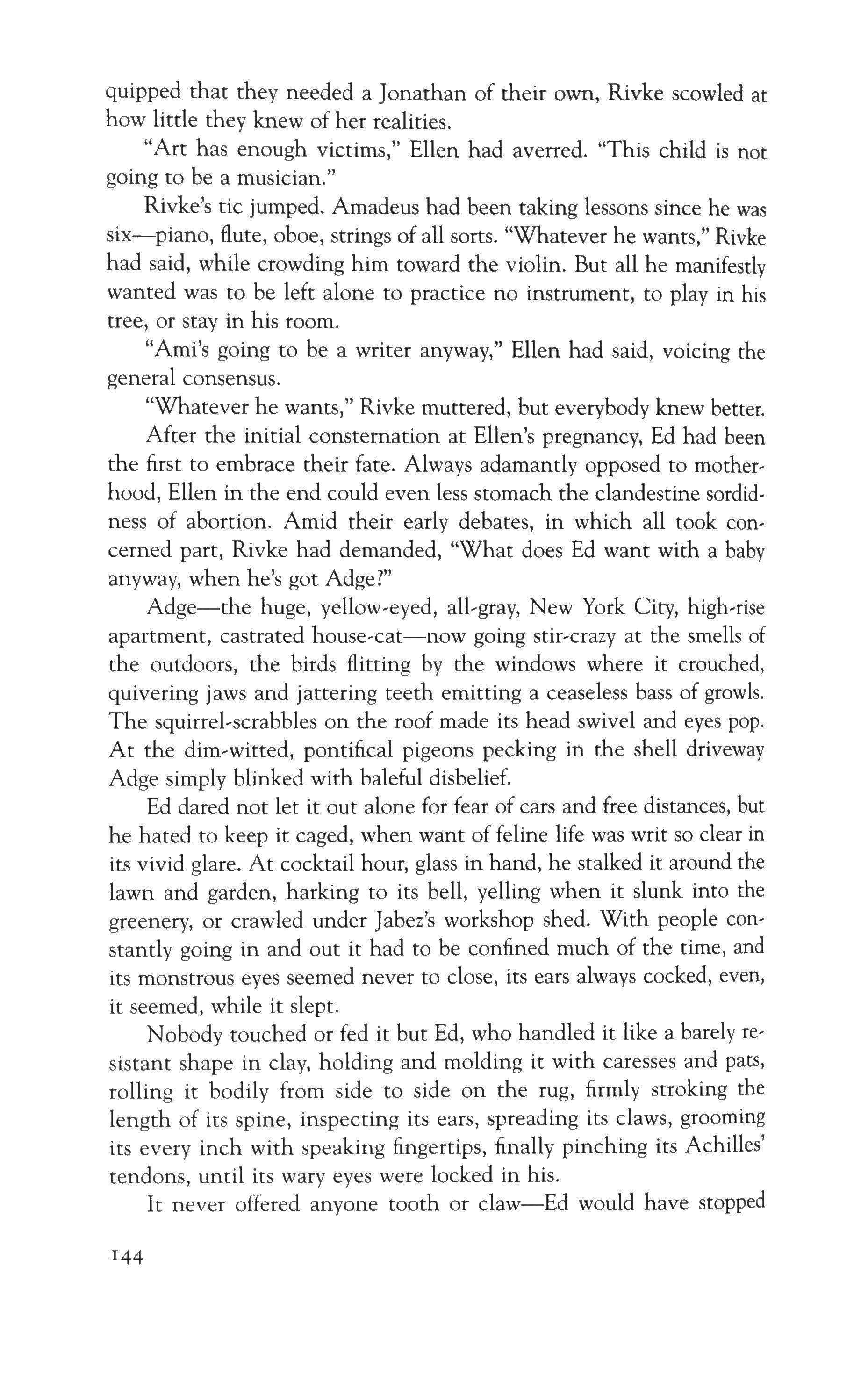
quipped that they needed a Jonathan of their own, Rivke scowled at how little they knew of her realities.
"Art has enough victims," Ellen had averred. "This child is not going to be a musician."
Rivke's tic jumped. Amadeus had been taking lessons since he was six-piano, flute, oboe, strings of all sorts. "Whatever he wants," Rivke had said, while crowding him toward the violin. But all he manifestly wanted was to be left alone to practice no instrument, to play in his tree, or stay in his room.
"Ami's going to be a writer anyway," Ellen had said, voicing the general consensus.
"Whatever he wants," Rivke muttered, but everybody knew better.
After the initial consternation at Ellen's pregnancy, Ed had been the first to embrace their fate. Always adamantly opposed to motherhood, Ellen in the end could even less stomach the clandestine sordidness of abortion. Amid their early debates, in which all took concerned part, Rivke had demanded, "What does Ed want with a baby anyway, when he's got Adge?"
Adge-the huge, yellow-eyed, all-gray, New York City, high-rise apartment, castrated house-eat-now going stir-crazy at the smells of the outdoors, the birds flitting by the windows where it crouched, quivering jaws and jattering teeth emitting a ceaseless bass of growls. The squirrel-scrabbles on the roof made its head swivel and eyes pop. At the dim-witted, pontifical pigeons pecking in the shell driveway Adge simply blinked with baleful disbelief.
Ed dared not let it out alone for fear of cars and free distances, but he hated to keep it caged, when want of feline life was writ so clear in its vivid glare. At cocktail hour, glass in hand, he stalked it around the lawn and garden, harking to its bell, yelling when it slunk into the greenery, or crawled under Jabez's workshop shed. With people constantly going in and out it had to be confined much of the time, and its monstrous eyes seemed never to close, its ears always cocked, even, it seemed, while it slept.
Nobody touched or fed it but Ed, who handled it like a barely resistant shape in clay, holding and molding it with caresses and pats, rolling it bodily from side to side on the rug, firmly stroking the length of its spine, inspecting its ears, spreading its claws, grooming its every inch with speaking fingertips, finally pinching its Achilles' tendons, until its wary eyes were locked in his.
It never offered anyone tooth or claw-Ed would have stopped
144
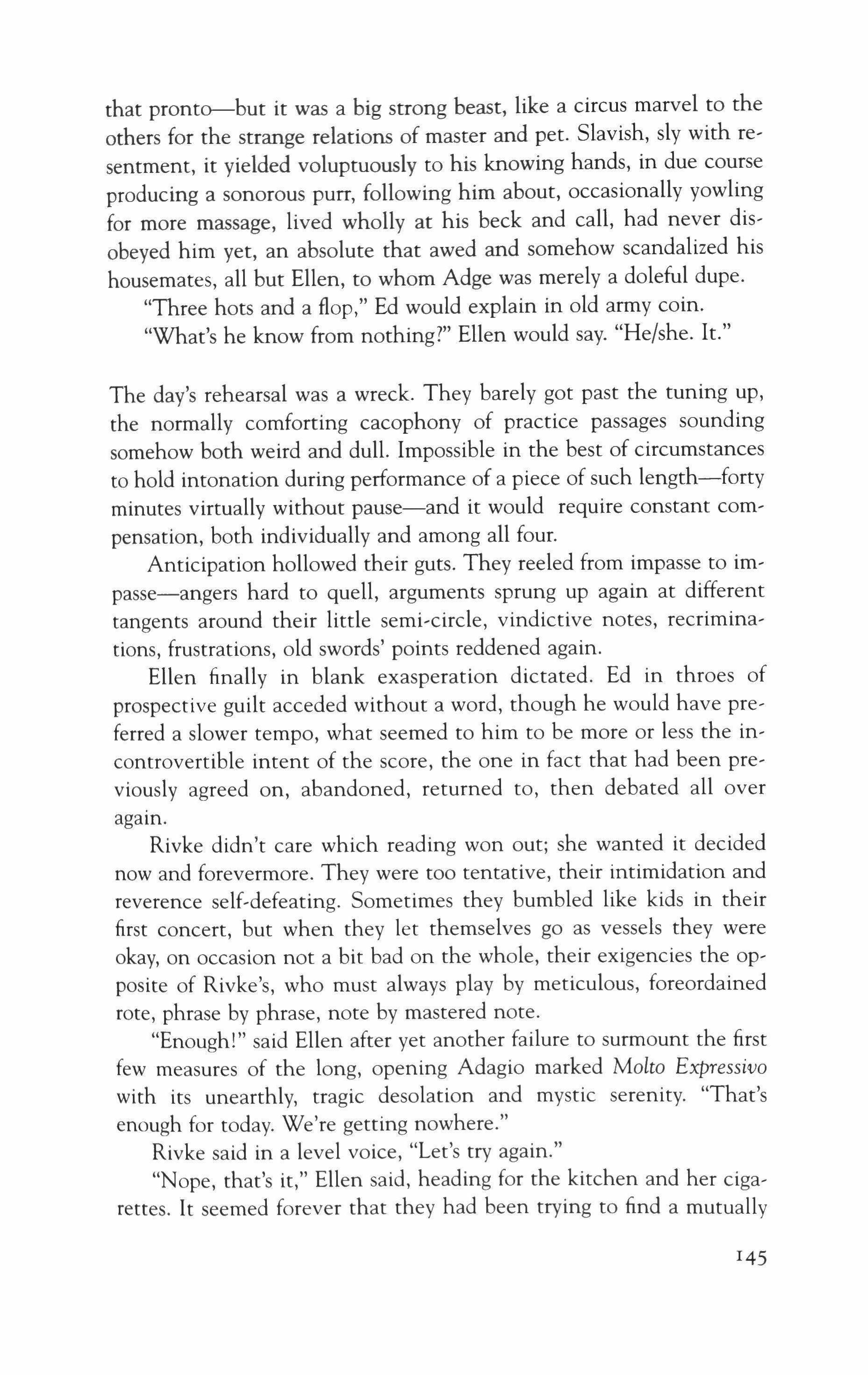
that pronto-but it was a big strong beast, like a circus marvel to the others for the strange relations of master and pet. Slavish, sly with resentment, it yielded voluptuously to his knowing hands, in due course producing a sonorous purr, following him about, occasionally yowling for more massage, lived wholly at his beck and call, had never disobeyed him yet, an absolute that awed and somehow scandalized his housemates, all but Ellen, to whom Adge was merely a doleful dupe.
"Three hots and a flop," Ed would explain in old army coin.
"What's he know from nothing?" Ellen would say. "He/she. It."
The day's rehearsal was a wreck. They barely got past the tuning up, the normally comforting cacophony of practice passages sounding somehow both weird and dull. Impossible in the best of circumstances to hold intonation during performance of a piece of such length-forty minutes virtually without pause-and it would require constant compensation, both individually and among all four.
Anticipation hollowed their guts. They reeled from impasse to impasse-angers hard to quell, arguments sprung up again at different tangents around their little semi-circle, vindictive notes, recriminations, frustrations, old swords' points reddened again.
Ellen finally in blank exasperation dictated. Ed in throes of prospective guilt acceded without a word, though he would have preferred a slower tempo, what seemed to him to be more or less the incontrovertible intent of the score, the one in fact that had been previously agreed on, abandoned, returned to, then debated all over again.
Rivke didn't care which reading won out; she wanted it decided now and forevermore. They were too tentative, their intimidation and reverence self-defeating. Sometimes they bumbled like kids in their first concert, but when they let themselves go as vessels they were okay, on occasion not a bit bad on the whole, their exigencies the opposite of Rivke's, who must always play by meticulous, foreordained rote, phrase by phrase, note by mastered note.
"Enough!" said Ellen after yet another failure to surmount the first few measures of the long, opening Adagio marked Molta Expressivo with its unearthly, tragic desolation and mystic serenity. "That's enough for today. We're getting nowhere."
Rivke said in a level voice, "Let's try again."
"Nope, that's it," Ellen said, heading for the kitchen and her cigarettes. It seemed forever that they had been trying to find a mutually

satisfactory path through the maze of fugal subtleties, disheartening to keep retreating to the beginning, but till that was settled, what could be expected from the rest, with its equally impossible demands?
The others agreed it was time to quit, as did their audience of Jonathan and Jabez, who as usual lit a joint and offered it first to Claire, who didn't even drink. She smiled her unfailingly courteous refusal without irony. "We might as well be trying to work out the Tenth Symphony," she said.
The most sanguine of the supporting three, she got up every morning at five to study the most troublesome places in her score. In spite of all her diets, she was getting buxom and hippy like her mother, worried a lot about clothes, spent money she could ill afford, the mirror her nemesis, Arthur, she feared, her last chance of escaping solitary sublimation in music.
It was grueling for all, sometimes two rehearsals a day, seven days a week, hunched like trolls intent on total concentration, watching each other's bowing, each other's eyes and body language, lately always at the brink of despair. Staleness was a constant hazard-thank God Ellen knew when to break.
Even Rivke was glad to quit. She needed the time to be alone with Ami-while keeping clear ofJonathan. She still had the one last night to get through. By tomorrow noon husband and son both would be back on the road to New York, and she by midnight in the arms of Warren Wender.
As usual Amadeus refused to come down from his tree. He wouldn't even answer her. Please was no use. He could not be blandished nor commanded. "I'm not a child anymore," had been his response- apart from implacable silence-to every attempt to direct him since age five. He had never really seemed to be a child, eerie, morose creature that he was, and yet she felt she understood him well enough, and hung her head with helpless tenderness.
The tree, an ancient, towering blue spruce, was unique on the Lower Cape, according to their landlord. An immense skirt of branches started ten feet up the trunk. Below, nubs of amputated limbs served as Ami's ladder; he alone could shinny up, though not without getting covered from cheek to toe with sticky pitch, and scraping his hands and arms on the sharp bark.
Ami didn't mind; it made him between scrubs at least immune to hugs. Far up under the roof of boughs he had built a vault with nooks
146
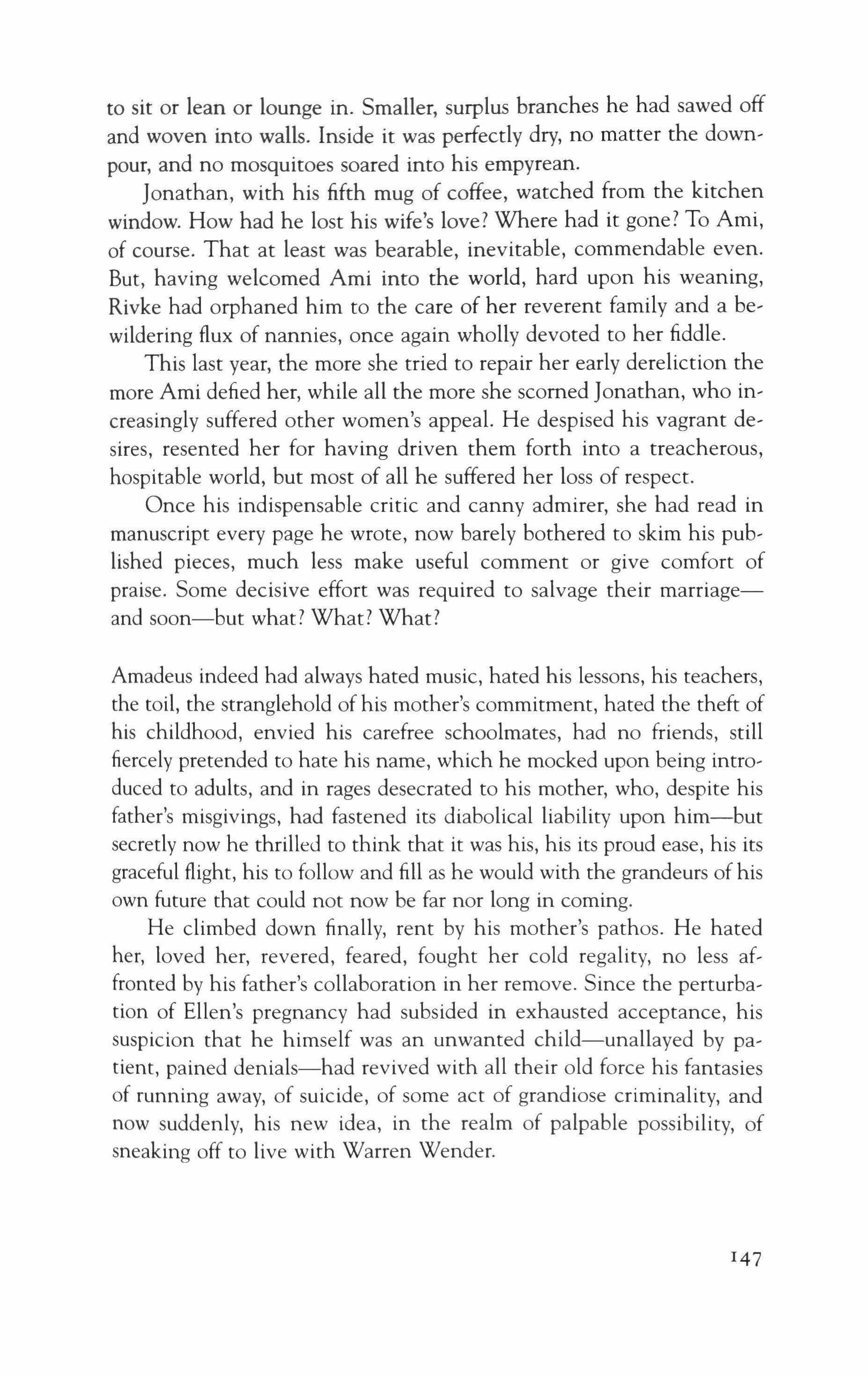
to sit or lean or lounge in. Smaller, surplus branches he had sawed off and woven into walls. Inside it was perfectly dry, no matter the downpour, and no mosquitoes soared into his empyrean.
Jonathan, with his fifth mug of coffee, watched from the kitchen window. How had he lost his wife's love? Where had it gone? To Ami, of course. That at least was bearable, inevitable, commendable even. But, having welcomed Ami into the world, hard upon his weaning, Rivke had orphaned him to the care of her reverent family and a bewildering flux of nannies, once again wholly devoted to her fiddle.
This last year, the more she tried to repair her early dereliction the more Ami defied her, while all the more she scorned Jonathan, who increasingly suffered other women's appeal. He despised his vagrant desires, resented her for having driven them forth into a treacherous, hospitable world, but most of all he suffered her loss of respect.
Once his indispensable critic and canny admirer, she had read in manuscript every page he wrote, now barely bothered to skim his published pieces, much less make useful comment or give comfort of praise. Some decisive effort was required to salvage their marriageand soon-but what? What? What?
Amadeus indeed had always hated music, hated his lessons, his teachers, the toil, the stranglehold of his mother's commitment, hated the theft of his childhood, envied his carefree schoolmates, had no friends, still fiercely pretended to hate his name, which he mocked upon being introduced to adults, and in rages desecrated to his mother, who, despite his father's misgivings, had fastened its diabolical liability upon him-but secretly now he thrilled to think that it was his, his its proud ease, his its graceful flight, his to follow and fill as he would with the grandeurs of his own future that could not now be far nor long in coming.
He climbed down finally, rent by his mother's pathos. He hated her, loved her, revered, feared, fought her cold regality, no less affronted by his father's collaboration in her remove. Since the perturbation of Ellen's pregnancy had subsided in exhausted acceptance, his suspicion that he himself was an unwanted child-unallayed by patient, pained denials-had revived with all their old force his fantasies of running away, of suicide, of some act of grandiose criminality, and now suddenly, his new idea, in the realm of palpable possibility, of sneaking off to live with Warren Wender.
147

They came in to say they were going downtown for fudge. "I need some money," Rivke said, holding out her hand, not glancing at Jonathan. Looking and leaning away himself, with difficulty he hauled out his wallet, heaved an inner sigh. At home he severely restricted Ami's intake of sweets. Otherwise he did not much care what his son did, providing he was busy. He had no fears for the boy's future; superb genes and superior milieus assured that he could not fail to achieve some considerable distinction in life.
"Shall we save you a taste?" she said. He shook his head wryly, grateful for her kindlier tone.
As they went from sight, Jonathan's relief faded. He had come in disarray, his present project apparently dissolved into years of waste, impossibly vast in scope, a congeries of disconnected bits too small to matter, and the links between a quaking bog. The state of his confidence, so susceptible of the derisory term "mid-life crisis," he could not bring himself to admit to Rivke. Nor had he yet mentioned that he intended to stay for a few days-if all went well, a week or more. He had formed no general stratagem, only hoped for some balm of harmony, rest and renewal, prayed the unannounced, uninvited prolongation of his weekly visit would not prove disastrous. How wife or son would react he could not guess, and that, he saw with grim chagrin, was the measure of his predicament.
Tom Sleigh
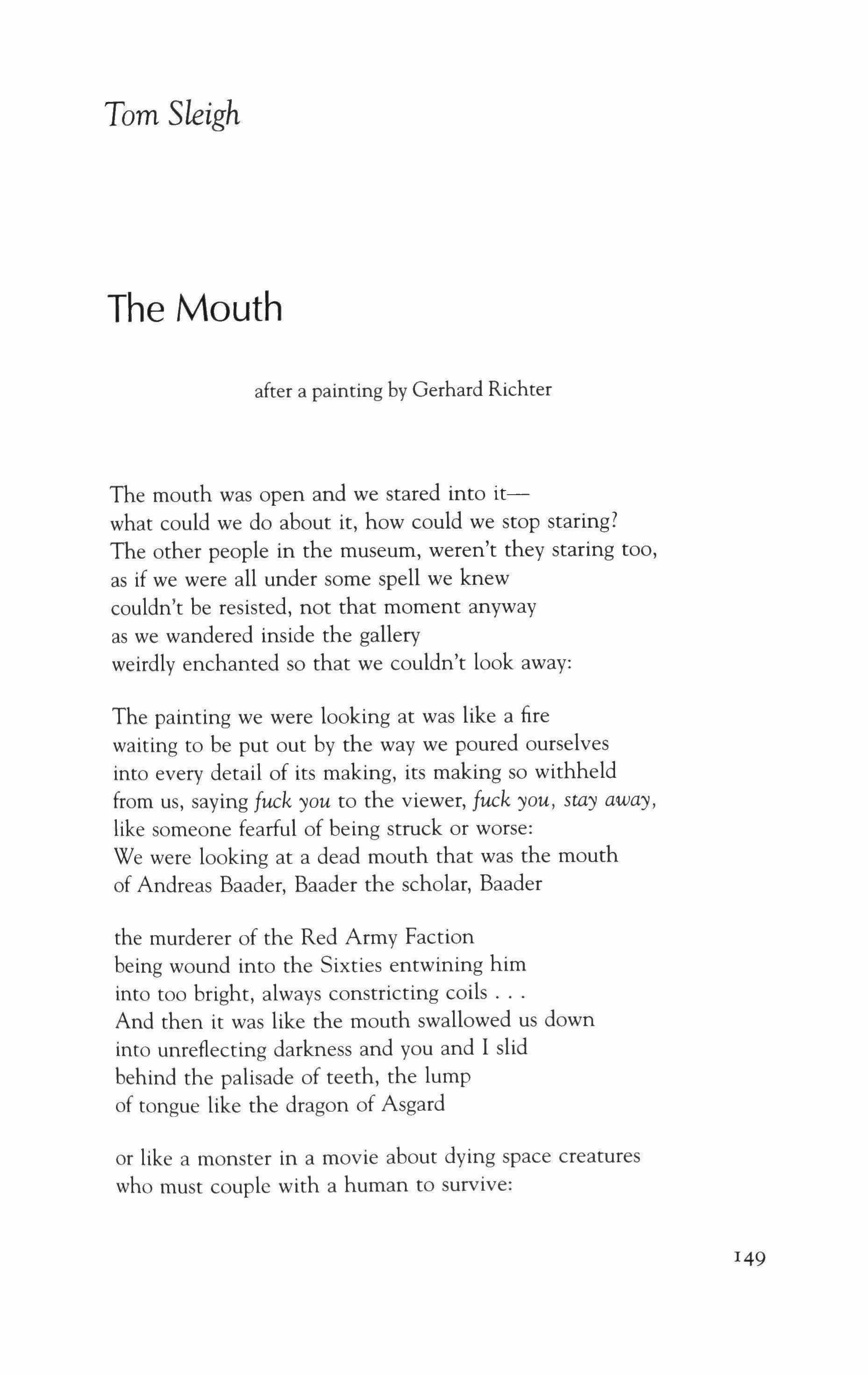
The Mouth
after a painting by
Gerhard Richter
The mouth was open and we stared into itwhat could we do about it, how could we stop staring? The other people in the museum, weren't they staring too, as if we were all under some spell we knew couldn't be resisted, not that moment anyway as we wandered inside the gallery weirdly enchanted so that we couldn't look away:
The painting we were looking at was like a fire waiting to be put out by the way we poured ourselves into every detail of its making, its making so withheld from us, saying fuck you to the viewer, fuck you, stay away, like someone fearful of being struck or worse: We were looking at a dead mouth that was the mouth of Andreas Baader, Baader the scholar, Baader the murderer of the Red Army Faction being wound into the Sixties entwining him into too bright, always constricting coils And then it was like the mouth swallowed us down into unreflecting darkness and you and I slid behind the palisade of teeth, the lump of tongue like the dragon of Asgard or like a monster in a movie about dying space creatures who must couple with a human to survive:
149

Deep inside that mouth, rising from the lungs
we could hear words breeding, unfathomable or stupid, vulgar, foreign, words that rang with the strangeness of Anangke that Hercules hears as the fate he must fulfill slaughtering
with his club whatever comes into his way: There was something foreordained, but almost slapstick about our sliding through that mouth's void while the others kept on in their own separate ways of looking, their plans for afterward made luminous by the clarity of what we could see as we stared past the teeth and out the walls of glass
to the overgrown fens and transparency of sky passing into sky, there was something out of bounds about any kind of unhappiness or joy or fear when we were here, in this mouth-which is what we were born for: You and I who hadn't seen any of this coming, you and I who also had plans after we left the museum, there we were inside that mouth, eyes staring in estrangement and alien wonder at the others.
ISO
Graffiti
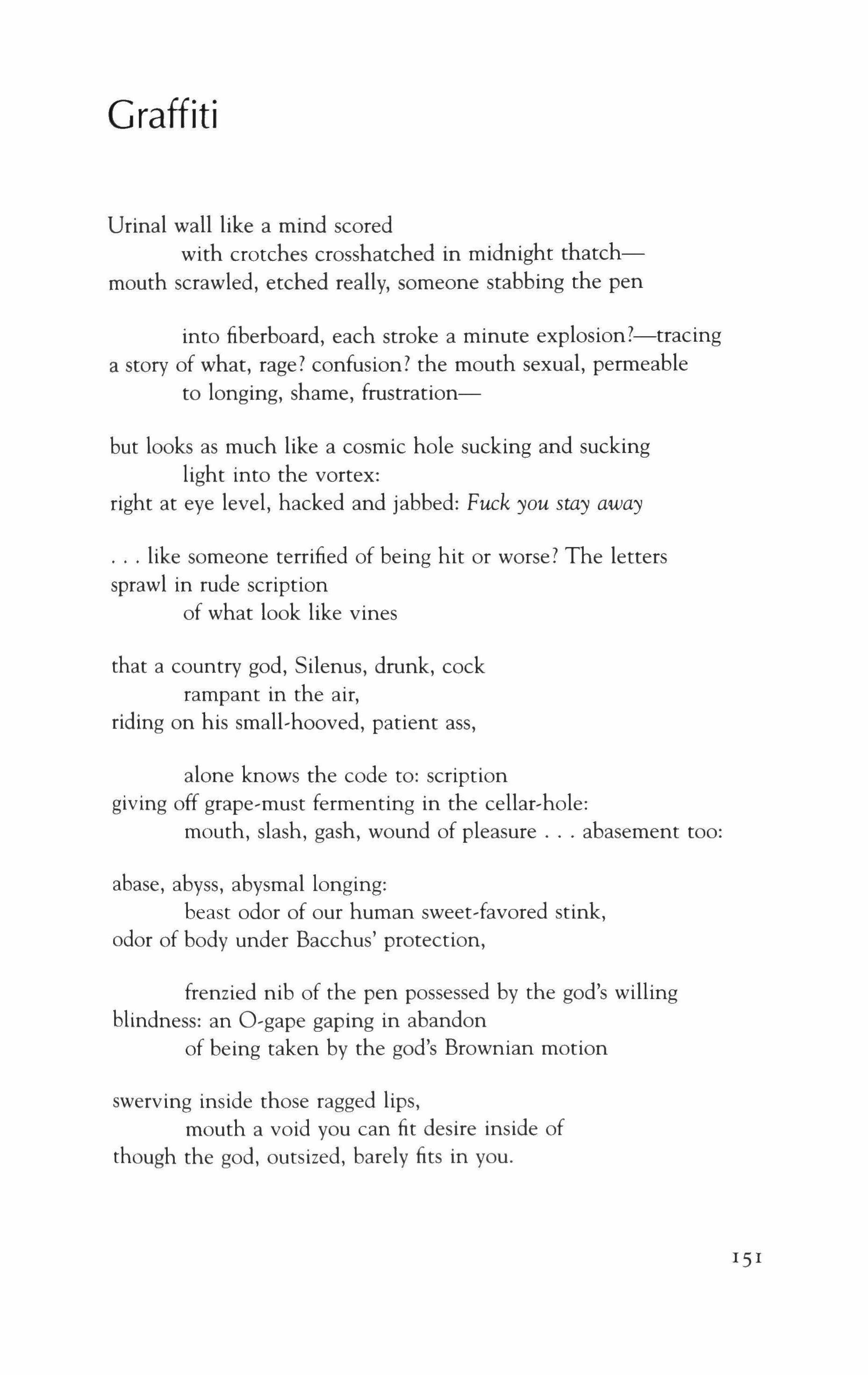
Urinal wall like a mind scored with crotches crosshatched in midnight thatchmouth scrawled, etched really, someone stabbing the pen into fiberboard, each stroke a minute explosion?-tracing a story of what, rage? confusion? the mouth sexual, permeable to longing, shame, frustrationbut looks as much like a cosmic hole sucking and sucking light into the vortex: right at eye level, hacked and jabbed: Fuck you stay away
like someone terrified of being hit or worse? The letters sprawl in rude scription of what look like vines that a country god, Silenus, drunk, cock rampant in the air, riding on his small-hooved, patient ass,
alone knows the code to: scription giving off grape-must fermenting in the cellar-hole: mouth, slash, gash, wound of pleasure abasement too:
abase, abyss, abysmal longing: beast odor of our human sweet-favored stink, odor of body under Bacchus' protection, frenzied nib of the pen possessed by the god's willing blindness: an Ovgape gaping in abandon of being taken by the god's Brownian motion
swerving inside those ragged lips, mouth a void you can fit desire inside of though the god, outsized, barely fits in you.
Killing the Cat
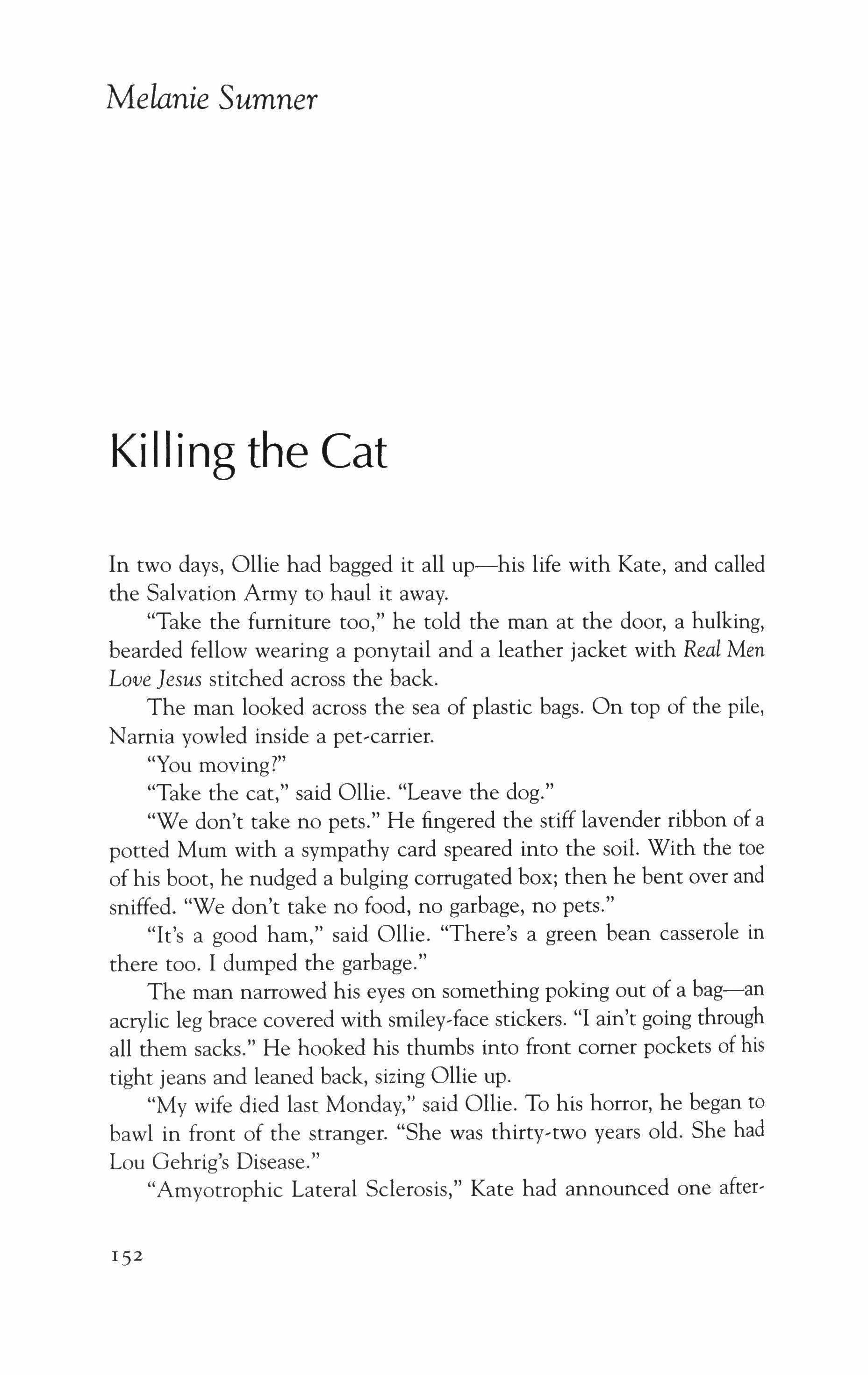
In two days, Ollie had bagged it all up-his life with Kate, and called the Salvation Army to haul it away.
'Take the furniture too," he told the man at the door, a hulking, bearded fellow wearing a ponytail and a leather jacket with Real Men Love Jesus stitched across the back.
The man looked across the sea of plastic bags. On top of the pile, Narnia yowled inside a pet-carrier,
"You moving?"
"Take the cat," said Ollie. "Leave the dog."
"We don't take no pets." He fingered the stiff lavender ribbon of a potted Mum with a sympathy card speared into the soil. With the toe of his boot, he nudged a bulging corrugated box; then he bent over and sniffed. "We don't take no food, no garbage, no pets."
"It's a good ham," said Ollie. "There's a green bean casserole in there too. I dumped the garbage."
The man narrowed his eyes on something poking out of a bag-an acrylic leg brace covered with smiley-face stickers. "I ain't going through all them sacks." He hooked his thumbs into front comer pockets of his tight jeans and leaned back, sizing Ollie up.
"My wife died last Monday," said Ollie. To his horror, he began to bawl in front of the stranger. "She was thirty-two years old. She had Lou Gehrig's Disease."
"Amyotrophic Lateral Sclerosis," Kate had announced one after-
Melanie Sumner

noon. "A neuromuscular disorder with a prognosis of two to five years, depending on onset." Ollie cocked his head, trying to grasp the foreign words and apply them to her. She wore a pair of his Carhartt overalls over a skinny black tank. A few strands of hair had come loose from her braid, and in the humidity, curled around her face. While she rat, tled off statistics, diagnosed in one out of fifty thousand people worldwide he noticed that on the pale underside of her arm, one of the kids she taught at Montessori had left a streak of bright blue paint. She fanned glossy pamphlets across the worn, scrubbed oak of their kitchen table. When she told him she had a doctor's appoint, ment that afternoon, Ollie had assumed she was pregnant. Finally, he met her eyes. "You're going to die?"
"Even her tongue was paralyzed," he sobbed to the Salvation Army man, removing his tortoise,shell glasses to swipe his face with his shirt sleeve.
"I'm real sorry to hear that."
In the embarrassed silence, a raccoon, carrying a pine cone covered with peanut butter and birdseed, paused by the window and looked in. "Looks just like a bandit, don't he?" said the man. "My yard's full of 'em; they live along that creek, but they're all over the is, land. You don't watch out, they'll get in your garbage and have a real party." He removed his jacket, revealing a name tag: John. Then he flexed his tattooed arms and hoisted the mattress.
Ollie shuffled out to the back deck and leaned against the railing. An early winter sun was sinking into the creek, blackening the jessamine vines that snaked through the low oaks and twisted cedars. He looked at his canoe, a battered flat bottom camper moored to the water oak with a hawser bend, and remembered finding the kitten just before Christmas.
It was a yellow cat, damp and scrawny, mewling plaintively in the bottom of the canoe. Ollie was strictly a dog man himself, found cats to be stupid, smelly, and stuck-up, but Kate loved all animals. In the back of his mind, the little tick-rock voice he hated, said, What will you do with it when she dies? He stomped through the back door with the kitten zipped in his fishing vest, rummaged through a box of Christmas stuff, found a red bow.
"You hate cats," Kate slurred when he sat Narnia on her lap. The kit, ten slipped off her knee and hung onto the latches of her leg brace. Be, neath the flannel robe and two pairs of thermal underwear, Kate's collar bone rose sharply, like a branch beneath a current. Her knees seemed huge.
One night half of her tongue had disappeared. In the morning, she
153
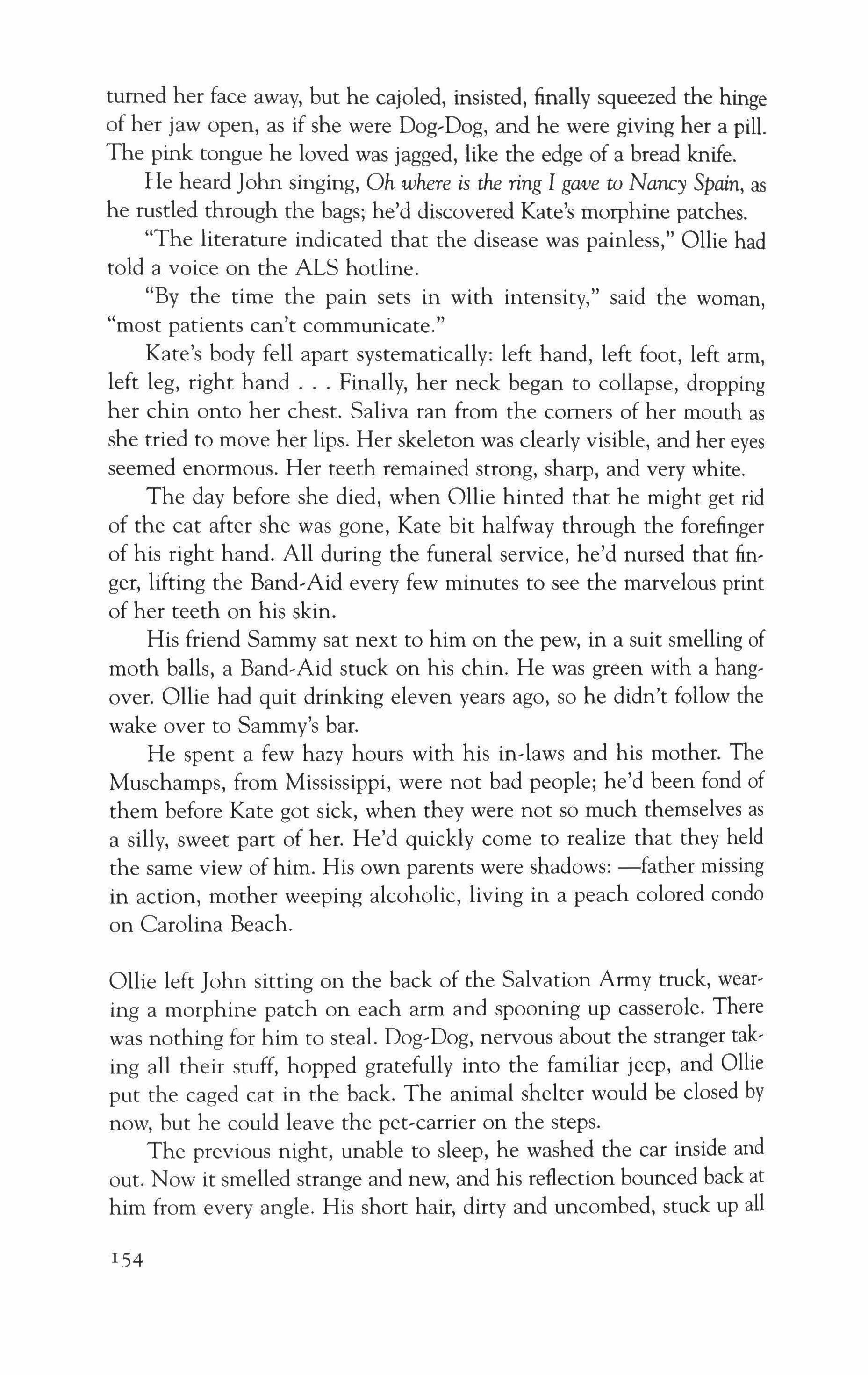
turned her face away, but he cajoled, insisted, finally squeezed the hinge of her jaw open, as if she were Dog-Dog, and he were giving her a pill. The pink tongue he loved was jagged, like the edge of a bread knife.
He heard John singing, Oh where is the ring I gave to Nancy Spain, as he rustled through the bags; he'd discovered Kate's morphine patches.
"The literature indicated that the disease was painless," Ollie had told a voice on the ALS hotline.
"By the time the pain sets in with intensity," said the woman, "most patients can't communicate."
Kate's body fell apart systematically: left hand, left foot, left arm, left leg, right hand Finally, her neck began to collapse, dropping her chin onto her chest. Saliva ran from the corners of her mouth as she tried to move her lips. Her skeleton was clearly visible, and her eyes seemed enormous. Her teeth remained strong, sharp, and very white.
The day before she died, when Ollie hinted that he might get rid of the cat after she was gone, Kate bit halfway through the forefinger of his right hand. All during the funeral service, he'd nursed that finger, lifting the Band-Aid every few minutes to see the marvelous print of her teeth on his skin.
His friend Sammy sat next to him on the pew, in a suit smelling of moth balls, a Band-Aid stuck on his chin. He was green with a hangover. Ollie had quit drinking eleven years ago, so he didn't follow the wake over to Sammy's bar.
He spent a few hazy hours with his in-laws and his mother. The Muschamps, from Mississippi, were not bad people; he'd been fond of them before Kate got sick, when they were not so much themselves as a silly, sweet part of her. He'd quickly come to realize that they held the same view of him. His own parents were shadows: -father missing in action, mother weeping alcoholic, living in a peach colored condo on Carolina Beach.
Ollie left John sitting on the back of the Salvation Army truck, wearing a morphine patch on each arm and spooning up casserole. There was nothing for him to steal. Dog,Dog, nervous about the stranger taking all their stuff, hopped gratefully into the familiar jeep, and Ollie put the caged cat in the back. The animal shelter would be closed by now, but he could leave the pet-carrier on the steps.
The previous night, unable to sleep, he washed the car inside and out. Now it smelled strange and new, and his reflection bounced back at him from every angle. His short hair, dirty and uncombed, stuck up all
154
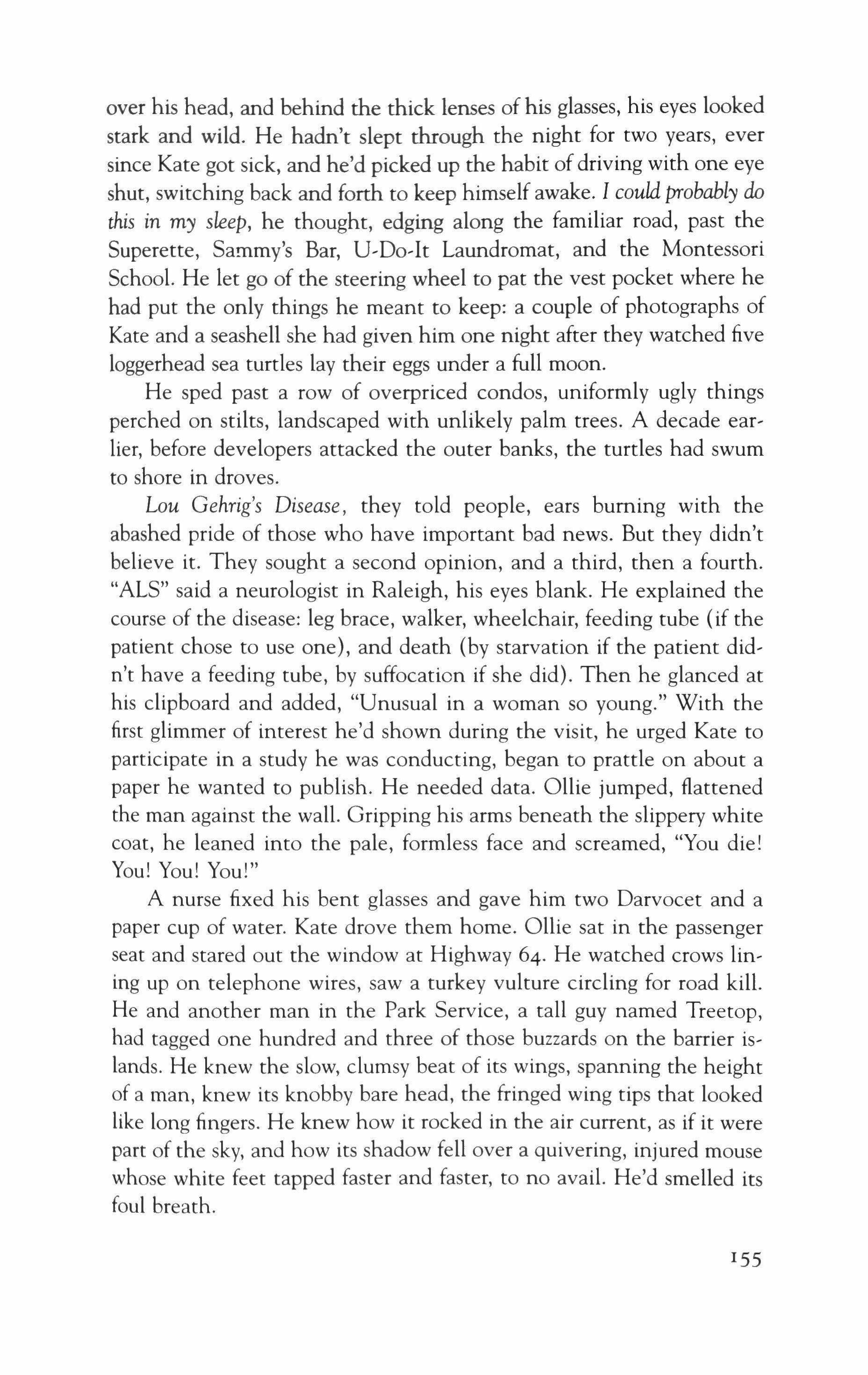
over his head, and behind the thick lenses of his glasses, his eyes looked stark and wild. He hadn't slept through the night for two years, ever since Kate got sick, and he'd picked up the habit ofdriving with one eye shut, switching back and forth to keep himself awake. I could probably do this in my sleep, he thought, edging along the familiar road, past the Superette, Sammy's Bar, U,Do,It Laundromat, and the Montessori School. He let go of the steering wheel to pat the vest pocket where he had put the only things he meant to keep: a couple of photographs of Kate and a seashell she had given him one night after they watched five loggerhead sea turtles lay their eggs under a full moon.
He sped past a row of overpriced condos, uniformly ugly things perched on stilts, landscaped with unlikely palm trees. A decade ear' lier, before developers attacked the outer banks, the turtles had swum to shore in droves.
Lou Gehrig's Disease, they told people, ears burning with the abashed pride of those who have important bad news. But they didn't believe it. They sought a second opinion, and a third, then a fourth. "ALS" said a neurologist in Raleigh, his eyes blank. He explained the course of the disease: leg brace, walker, wheelchair, feeding tube (if the patient chose to use one), and death (by starvation if the patient did, n't have a feeding tube, by suffocation if she did). Then he glanced at his clipboard and added, "Unusual in a woman so young." With the first glimmer of interest he'd shown during the visit, he urged Kate to participate in a study he was conducting, began to prattle on about a paper he wanted to publish. He needed data. Ollie jumped, flattened the man against the wall. Gripping his arms beneath the slippery white coat, he leaned into the pale, formless face and screamed, "You die! You! You! You!"
A nurse fixed his bent glasses and gave him two Darvocet and a paper cup of water. Kate drove them home. Ollie sat in the passenger seat and stared out the window at Highway 64. He watched crows lining up on telephone wires, saw a turkey vulture circling for road kill. He and another man in the Park Service, a tall guy named Treetop, had tagged one hundred and three of those buzzards on the barrier islands. He knew the slow, clumsy beat of its wings, spanning the height of a man, knew its knobby bare head, the fringed wing tips that looked like long fingers. He knew how it rocked in the air current, as if it were part of the sky, and how its shadow fell over a quivering, injured mouse whose white feet tapped faster and faster, to no avail. He'd smelled its foul breath.
155

With a loud smack that popped the back door of the jeep open and threw Dog-Dog into Ollie's lap, the jeep hit a fence surrounding a new gated community called The Sandpiper. The bumper made a satisfying crunch as it folded into the fake pink stucco. I must be crazy, thought Ollie, letting his heavy eyelids close.
A few minutes later, reaching for his driver's license, his hand brushed against the unbroken shell in his pocket. He told the blurred face of a police officer, "My wife died." A small crowd had gathered, scraps of color against a gray sky. Patting his hand over the broken glass on the dashboard, Ollie found his glasses and saw the pet-carrier upside down on the curb, door opened. A few minutes later, a longlegged girl climbed down from a palm tree with the cat in her arms.
"Finders keepers," said Ollie, but the girl said her mother was allergic to cats. The officer said he didn't need another cat, and drove Ollie home in the patrol car. He said it was fairly common for mourners to wreck their cars and asked Ollie to stay off the road until his head cleared.
John had left Ollie a sleeping bag, a lamp, some kitchenware, a bar of soap, a toothbrush and toothpaste, a hand towel, and a broom. One clean set of clothes: khakis, flannel shirt, boxers, socks, was folded into a neat pile where the dresser used to be. The dishes were washed, the floors swept clean.
Ollie looked around the empty house. He and Kate had built it right after they got married, rummaging through salvage yards for scrap lumber, a toilet, a bit of stained glass. They paid twenty-five dollars for two deck beams from the wreck of a French man-of-war, fifty dollars for the foresail that Kate sewed into curtains. Sammy helped them lay the roof: a stack of plywood, polyurethane, and mineral wool, covered with sedum turf and planted with roses. The house was only nine hundred square feet (they planned to add on when the baby came), but now it felt cavernous.
When Kate was paralyzed, she'd sit up all night in an electric recliner. With the touch of a button, the chair could thrust her forward onto a walker that she gripped with her good hand while peeing in a bucket. This procedure worried Ollie to death, but he could not get Kate to go to bed at night, so he tied a small brass Christmas bell to the recliner and asked her to ring it if she needed him. She refused to ring the bell for herself-once Ollie had woken up to find her slumped on the floor between the chair and the walker, waiting patiently for
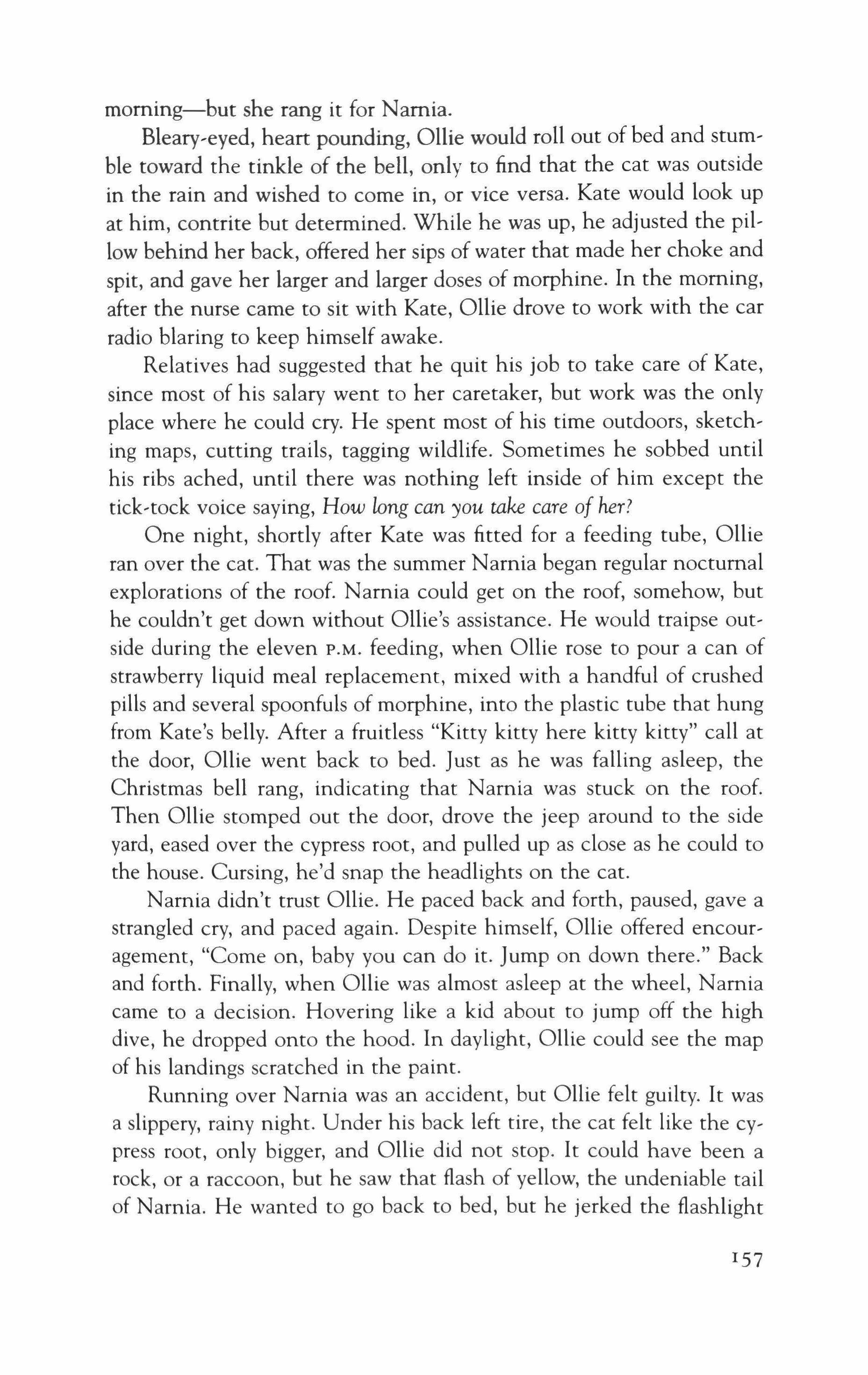
morning-but she rang it for Narnia.
Bleary-eved, heart pounding, Ollie would roll out of bed and stumble toward the tinkle of the bell, only to find that the cat was outside in the rain and wished to come in, or vice versa. Kate would look up at him, contrite but determined. While he was up, he adjusted the pillow behind her back, offered her sips of water that made her choke and spit, and gave her larger and larger doses of morphine. In the morning, after the nurse came to sit with Kate, Ollie drove to work with the car radio blaring to keep himself awake.
Relatives had suggested that he quit his job to take care of Kate, since most of his salary went to her caretaker, but work was the only place where he could cry. He spent most of his time outdoors, sketch, ing maps, cutting trails, tagging wildlife. Sometimes he sobbed until his ribs ached, until there was nothing left inside of him except the tick-rock voice saying, How long can you take care of her?
One night, shortly after Kate was fitted for a feeding tube, Ollie ran over the cat. That was the summer Narnia began regular nocturnal explorations of the roof. Narnia could get on the roof, somehow, but he couldn't get down without Ollie's assistance. He would traipse out' side during the eleven P.M. feeding, when Ollie rose to pour a can of strawberry liquid meal replacement, mixed with a handful of crushed pills and several spoonfuls of morphine, into the plastic tube that hung from Kate's belly. After a fruitless "Kitty kitty here kitty kitty" call at the door, Ollie went back to bed. Just as he was falling asleep, the Christmas bell rang, indicating that Narnia was stuck on the roof. Then Ollie stomped out the door, drove the jeep around to the side yard, eased over the cypress root, and pulled up as close as he could to the house. Cursing, he'd snap the headlights on the cat.
Narnia didn't trust Ollie. He paced back and forth, paused, gave a strangled cry, and paced again. Despite himself, Ollie offered encouragement, "Come on, baby you can do it. Jump on down there." Back and forth. Finally, when Ollie was almost asleep at the wheel, Narnia came to a decision. Hovering like a kid about to jump off the high dive, he dropped onto the hood. In daylight, Ollie could see the map of his landings scratched in the paint.
Running over Narnia was an accident, but Ollie felt guilty. It was a slippery, rainy night. Under his back left tire, the cat felt like the cspress root, only bigger, and Ollie did not stop. It could have been a rock, or a raccoon, but he saw that flash of yellow, the undeniable tail of Narnia. He wanted to go back to bed, but he jerked the flashlight
157
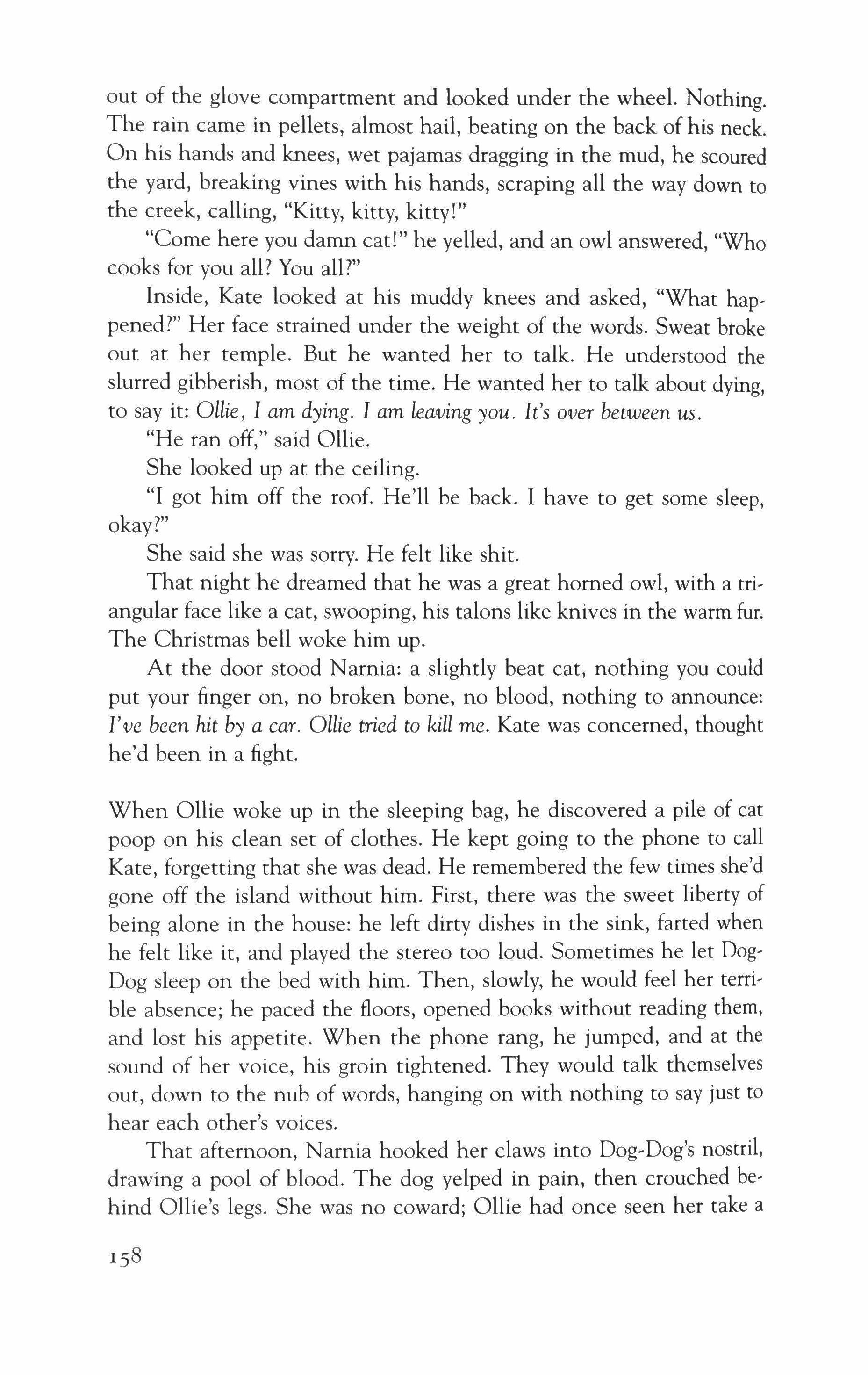
out of the glove compartment and looked under the wheel. Nothing. The rain came in pellets, almost hail, beating on the back of his neck. On his hands and knees, wet pajamas dragging in the mud, he scoured the yard, breaking vines with his hands, scraping all the way down to the creek, calling, "Kitty, kitty, kitty!"
"Come here you damn cat!" he yelled, and an owl answered, "Who cooks for you all? You all?"
Inside, Kate looked at his muddy knees and asked, "What happened?" Her face strained under the weight of the words. Sweat broke out at her temple. But he wanted her to talk. He understood the slurred gibberish, most of the time. He wanted her to talk about dying, to say it: Ollie, I am dying. I am leaving you. It's over between us.
"He ran off," said Ollie.
She looked up at the ceiling.
"I got him off the roof. He'll be back. I have to get some sleep, okay?"
She said she was sorry. He felt like shit.
That night he dreamed that he was a great homed owl, with a triangular face like a cat, swooping, his talons like knives in the warm fur. The Christmas bell woke him up.
At the door stood Narnia: a slightly beat cat, nothing you could put your finger on, no broken bone, no blood, nothing to announce: 1've been hit by a car. Ollie tried to kill me. Kate was concerned, thought he'd been in a fight.
When Ollie woke up in the sleeping bag, he discovered a pile of cat poop on his clean set of clothes. He kept going to the phone to call Kate, forgetting that she was dead. He remembered the few times she'd gone off the island without him. First, there was the sweet liberty of being alone in the house: he left dirty dishes in the sink, farted when he felt like it, and played the stereo too loud. Sometimes he let DogDog sleep on the bed with him. Then, slowly, he would feel her terrible absence; he paced the floors, opened books without reading them, and lost his appetite. When the phone rang, he jumped, and at the sound of her voice, his groin tightened. They would talk themselves out, down to the nub of words, hanging on with nothing to say just to hear each other's voices.
That afternoon, Narnia hooked her claws into Dog-Dog's nostril, drawing a pool of blood. The dog yelped in pain, then crouched behind Ollie's legs. She was no coward; Ollie had once seen her take a
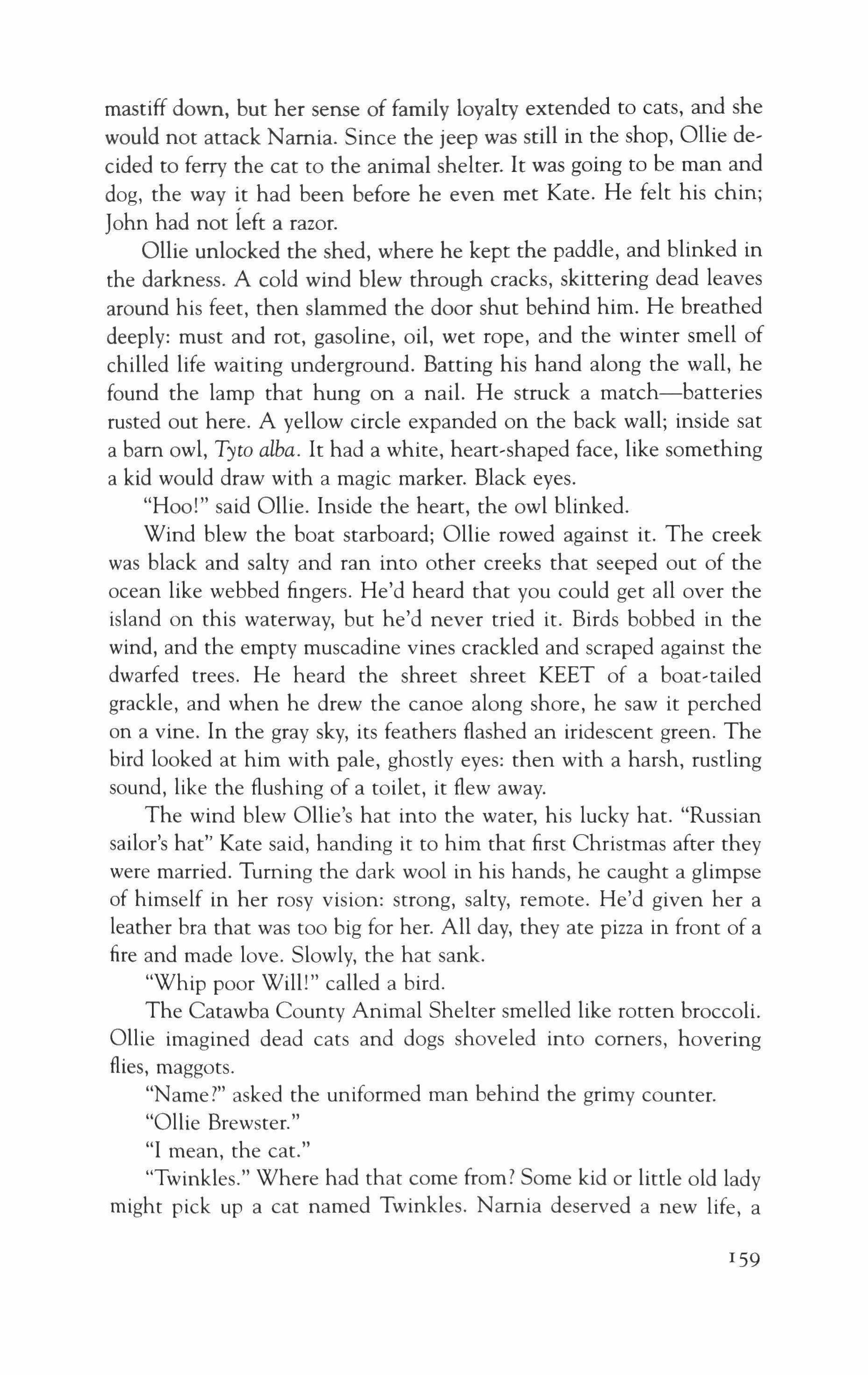
mastiff down, but her sense of family loyalty extended to cats, and she would not attack Narnia. Since the jeep was still in the shop, Ollie decided to ferry the cat to the animal shelter. It was going to be man and dog, the way it had been before he even met Kate. He felt his chin; John had not left a razor.
Ollie unlocked the shed, where he kept the paddle, and blinked in the darkness. A cold wind blew through cracks, skittering dead leaves around his feet, then slammed the door shut behind him. He breathed deeply: must and rot, gasoline, oil, wet rope, and the winter smell of chilled life waiting underground. Batting his hand along the wall, he found the lamp that hung on a nail. He struck a match-batteries rusted out here. A yellow circle expanded on the back wall; inside sat a bam owl, Tyto alba. It had a white, heart-shaped face, like something a kid would draw with a magic marker. Black eyes.
"Hoo!" said Ollie. Inside the heart, the owl blinked.
Wind blew the boat starboard; Ollie rowed against it. The creek was black and salty and ran into other creeks that seeped out of the ocean like webbed fingers. He'd heard that you could get all over the island on this waterway, but he'd never tried it. Birds bobbed in the wind, and the empty muscadine vines crackled and scraped against the dwarfed trees. He heard the shreet shreet KEET of a boat-tailed grackle, and when he drew the canoe along shore, he saw it perched on a vine. In the gray sky, its feathers flashed an iridescent green. The bird looked at him with pale, ghostly eyes: then with a harsh, rustling sound, like the flushing of a toilet, it flew away.
The wind blew Ollie's hat into the water, his lucky hat. "Russian sailor's hat" Kate said, handing it to him that first Christmas after they were married. Turning the dark wool in his hands, he caught a glimpse of himself in her rosy vision: strong, salty, remote. He'd given her a leather bra that was too big for her. All day, they ate pizza in front of a fire and made love. Slowly, the hat sank.
"Whip poor Will!" called a bird.
The Catawba County Animal Shelter smelled like rotten broccoli. Ollie imagined dead cats and dogs shoveled into comers, hovering flies, maggots.
"Name?" asked the uniformed man behind the grimy counter.
"Ollie Brewster."
"I mean, the cat."
"Twinkles." Where had that come from? Some kid or little old lady might pick up a cat named Twinkles. Narnia deserved a new life, a
159
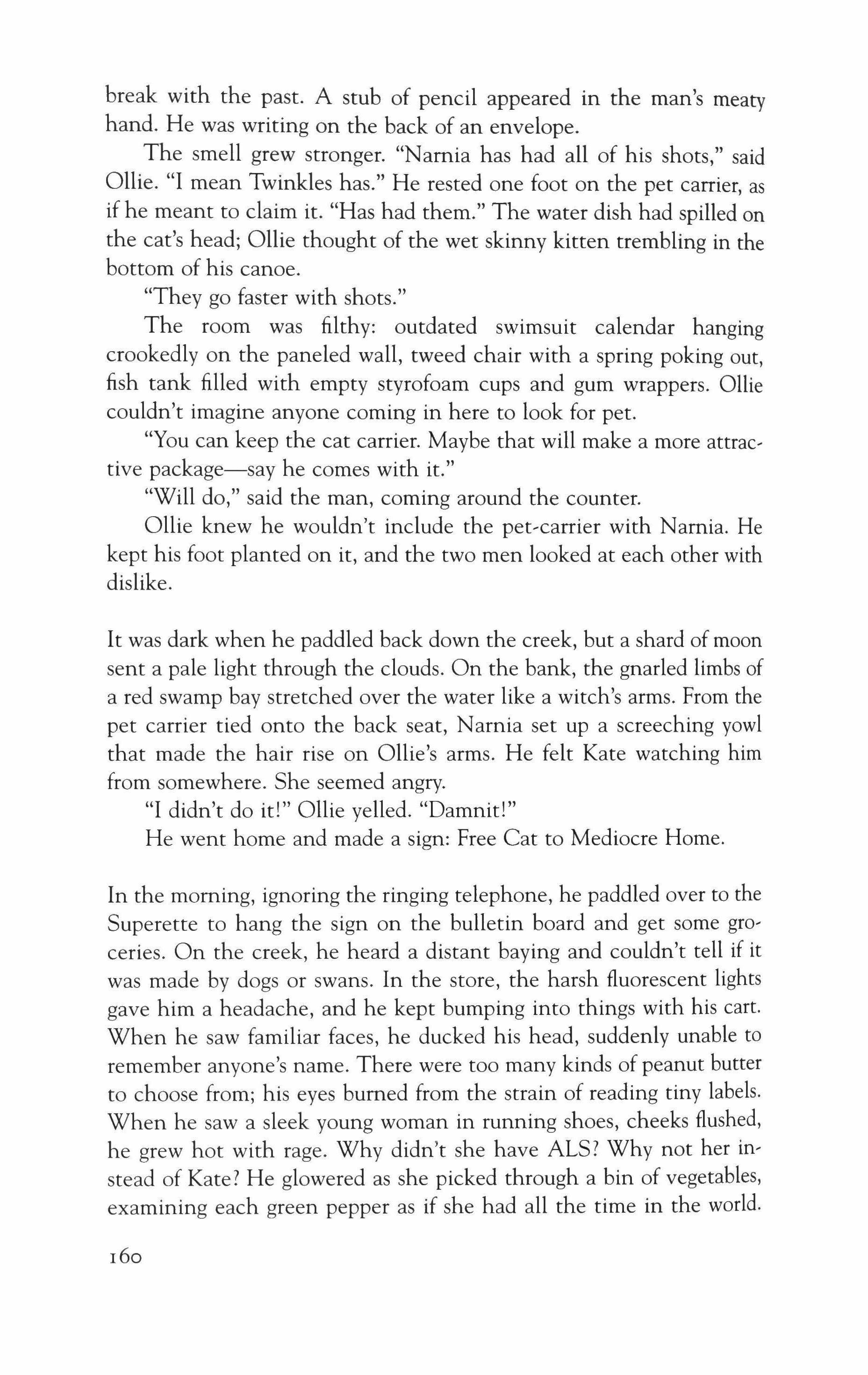
break with the past. A stub of pencil appeared in the man's meaty hand. He was writing on the back of an envelope.
The smell grew stronger. "Narnia has had all of his shots," said Ollie. "I mean Twinkles has." He rested one foot on the pet carrier, as if he meant to claim it. "Has had them." The water dish had spilled on the eat's head; Ollie thought of the wet skinny kitten trembling in the bottom of his canoe.
"They go faster with shots."
The room was filthy: outdated swimsuit calendar hanging crookedly on the paneled wall, tweed chair with a spring poking out, fish tank filled with empty styrofoam cups and gum wrappers. Ollie couldn't imagine anyone coming in here to look for pet.
"You can keep the cat carrier. Maybe that will make a more attractive package-say he comes with it."
"Will do," said the man, coming around the counter.
Ollie knew he wouldn't include the pet-carrier with Narnia. He kept his foot planted on it, and the two men looked at each other with dislike.
It was dark when he paddled back down the creek, but a shard of moon sent a pale light through the clouds. On the bank, the gnarled limbs of a red swamp bay stretched over the water like a witch's arms. From the pet carrier tied onto the back seat, Narnia set up a screeching yowl that made the hair rise on Ollie's arms. He felt Kate watching him from somewhere. She seemed angry.
"I didn't do it!" Ollie yelled. "Damnit!"
He went home and made a sign: Free Cat to Mediocre Home.
In the morning, ignoring the ringing telephone, he paddled over to the Superette to hang the sign on the bulletin board and get some groceries. On the creek, he heard a distant baying and couldn't tell if it was made by dogs or swans. In the store, the harsh fluorescent lights gave him a headache, and he kept bumping into things with his cart. When he saw familiar faces, he ducked his head, suddenly unable to remember anyone's name. There were too many kinds of peanut butter to choose from; his eyes burned from the strain of reading tiny labels. When he saw a sleek young woman in running shoes, cheeks flushed, he grew hot with rage. Why didn't she have ALS? Why not her instead of Kate? He glowered as she picked through a bin of vegetables, examining each green pepper as if she had all the time in the world.
160
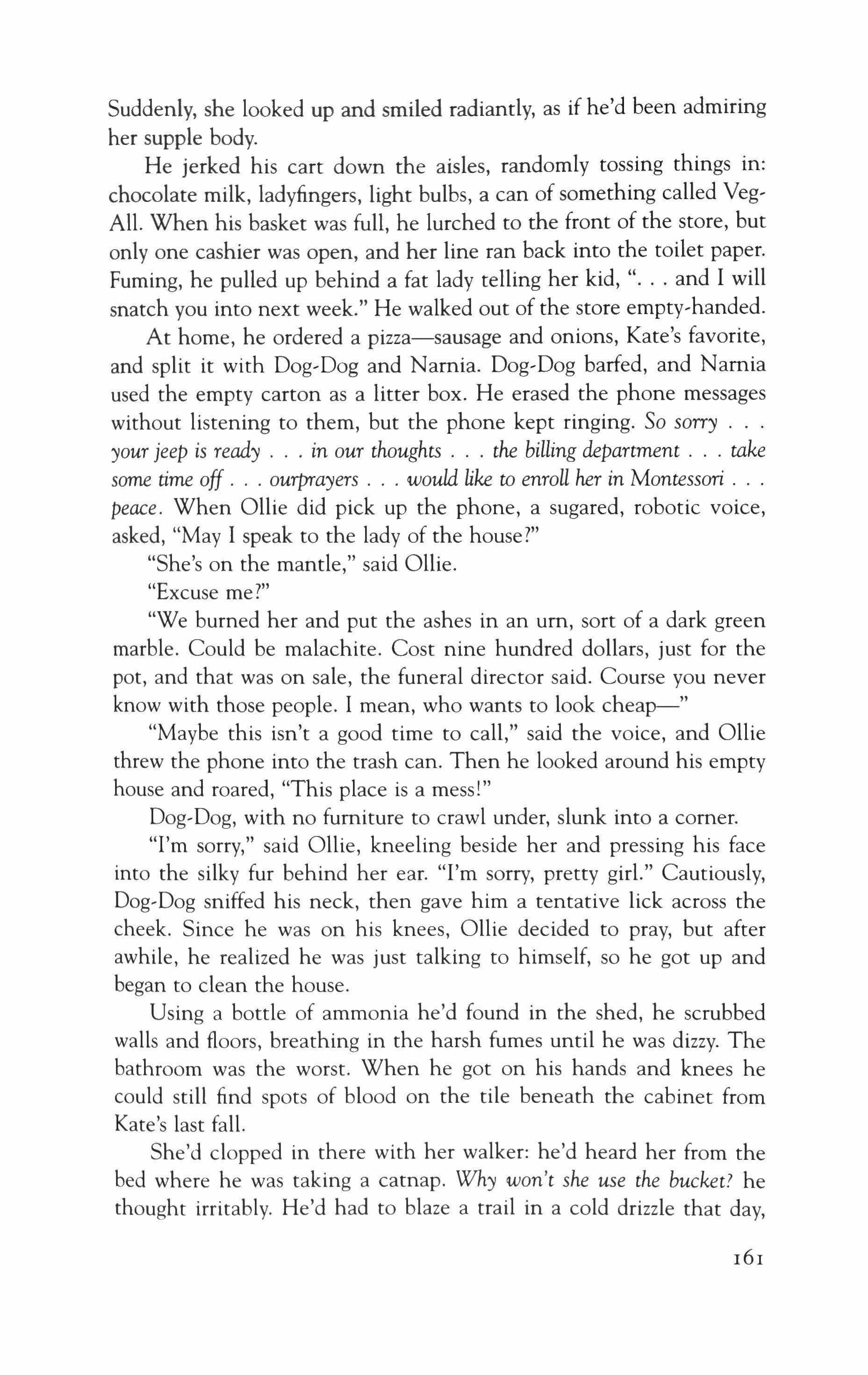
Suddenly, she looked up and smiled radiantly, as if he'd been admiring her supple body.
He jerked his cart down the aisles, randomly tossing things in: chocolate milk, ladyfingers, light bulbs, a can of something called VegAll. When his basket was full, he lurched to the front of the store, but only one cashier was open, and her line ran back into the toilet paper. Fuming, he pulled up behind a fat lady telling her kid, and I will snatch you into next week." He walked out of the store empty-handed.
At home, he ordered a pizza-sausage and onions, Kate's favorite, and split it with Dog-Dog and Narnia. Dog-Dog barfed, and Narnia used the empty carton as a litter box. He erased the phone messages without listening to them, but the phone kept ringing. So sorry your jeep is ready in our thoughts the billing department take some time off. ourprayers would like to enroU her in Montessori peace. When Ollie did pick up the phone, a sugared, robotic voice, asked, "May I speak to the lady of the house?"
"She's on the mantle," said Ollie.
"Excuse me?"
"We burned her and put the ashes in an urn, sort of a dark green marble. Could be malachite. Cost nine hundred dollars, just for the pot, and that was on sale, the funeral director said. Course you never know with those people. I mean, who wants to look cheap-"
"Maybe this isn't a good time to call," said the voice, and Ollie threw the phone into the trash can. Then he looked around his empty house and roared, "This place is a mess!"
Dog-Dog, with no furniture to crawl under, slunk into a comer.
"I'm sorry," said Ollie, kneeling beside her and pressing his face into the silky fur behind her ear. "I'm sorry, pretty girl." Cautiously, Dog-Dog sniffed his neck, then gave him a tentative lick across the cheek. Since he was on his knees, Ollie decided to pray, but after awhile, he realized he was just talking to himself, so he got up and began to clean the house.
Using a bottle of ammonia he'd found in the shed, he scrubbed walls and floors, breathing in the harsh fumes until he was dizzy. The bathroom was the worst. When he got on his hands and knees he could still find spots of blood on the tile beneath the cabinet from Kate's last fall.
She'd clopped in there with her walker: he'd heard her from the bed where he was taking a catnap. Why won't she use the bucket? he thought irritably. He'd had to blaze a trail in a cold drizzle that day,

slashing at thorny cat brier and wet scuppernong that clung to the scythe, jerking up roots sunk deep in the mud, slugging through the whole gluey mess until his shoulders burned with fatigue. He was too tired to get up and help her, but he couldn't relax. One day she would fall. His muscles tensed as he listened to each movement: the precarious tum to face the toilet, her jagged, exhausted breath as she lifted the paralyzed hand with the working hand and placed it like an anchor in the center of the walker. Now the hard part: she was fumbling with the bathrobe. He knew where the beads of sweat had started to form at her temples, how they would gather and drip down her face in rivulets that she could not wipe away. Were he to go in there, she would flash her eyes at him, refuse his arm.
Three seconds ticked by. Impatiently, he rolled over. She should be ready now, holding to the center of the walker with the good hand, calling up all the powers of her limp biceps, summoning the flaccid quadriceps in her bony thighs to an Olympic feat: squat.
The muscles in Ollie's back knotted together, and he panted with her. I will not open my eyes, he told himself. I am tired.
Slam! Her body toppled like a board; her head smacked the tile floor. The long, thin scream of pain sounded as if it came from someone else, a child or an old woman. "Kate!" he answered, stumbling into the bathroom.
She was on her back, with her pajama pants around her knees, face white, a pool of dark blood spreading beneath her head. Her words were incomprehensible. He couldn't find a towel. Had he forgotten to do the laundry? In his bare feet, he slipped in her blood, hit his chin on the toilet seat. The thick red puddle grew around them. They were yelling at each other, her voice a frantic gurgle, his a bellowing horn. He tore off his shirt, wrapped it around her head, panicking as the blood soaked through the pale cotton. She grew still, intent on something above them.
"I can't understand you!" he cried, when she tried to tell him what she saw. He looked at the white ceiling, half-expecting God, but there was nothing. Adamant, pissed-off that he didn't see it, her hand flapped by her side, trying to point.
\Xlhen the ambulance arrived, the medics insisted on tying her to a board. "You can't!" he screamed at them, watching her sob. "She doesn't have any fat! It hurts her! You're pressing her bones! You don't need to do this-she's already paralyzed." But rules were rules, so they tightened the buckles.
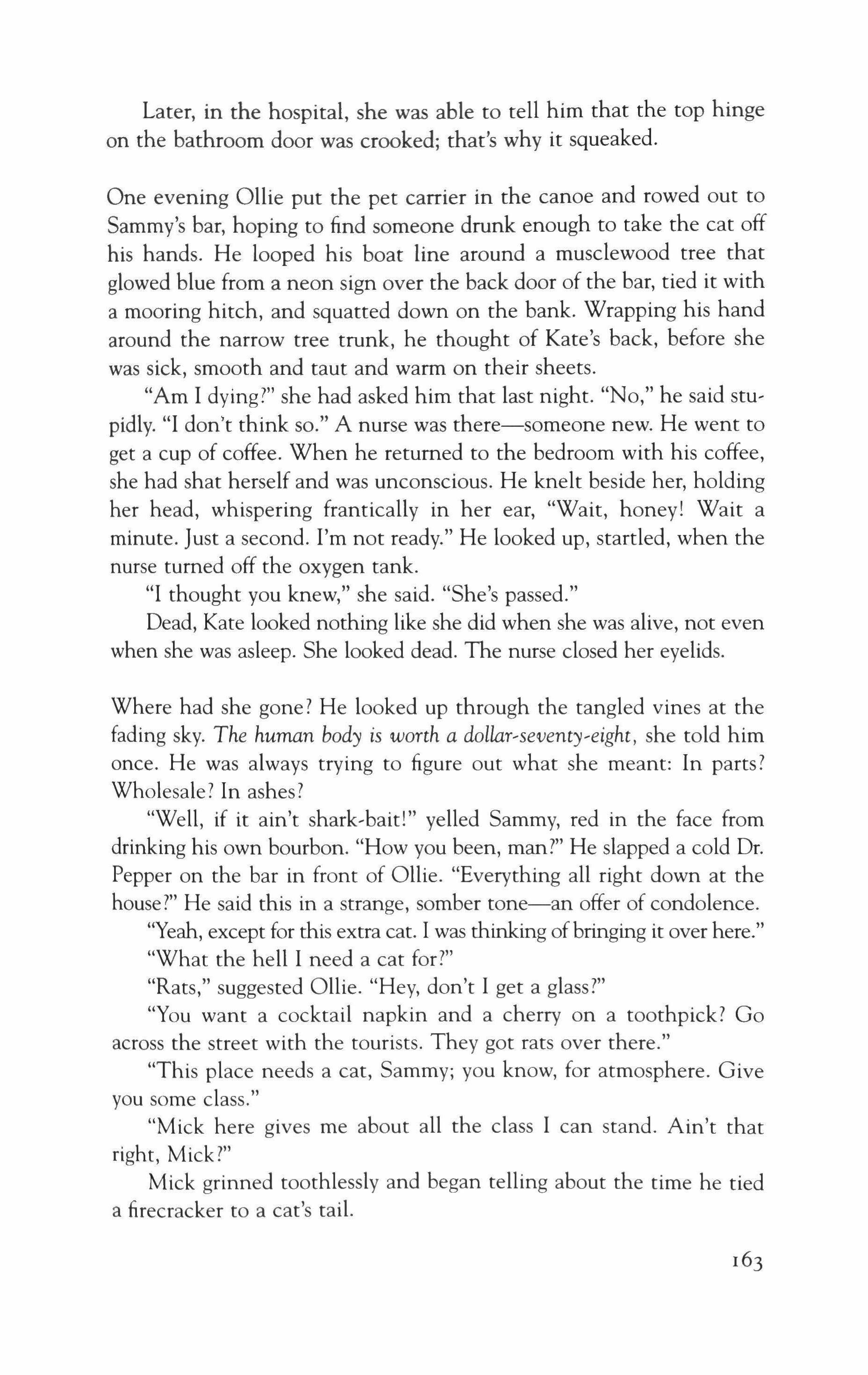
Later, in the hospital, she was able to tell him that the top hinge on the bathroom door was crooked; that's why it squeaked.
One evening Ollie put the pet carrier in the canoe and rowed out to Sammy's bar, hoping to find someone drunk enough to take the cat off his hands. He looped his boat line around a musclewood tree that glowed blue from a neon sign over the back door of the bar, tied it with a mooring hitch, and squatted down on the bank. Wrapping his hand around the narrow tree trunk, he thought of Kate's back, before she was sick, smooth and taut and warm on their sheets.
"Am I dying?" she had asked him that last night. "No," he said stupidly. "I don't think so." A nurse was there-someone new. He went to get a cup of coffee. When he returned to the bedroom with his coffee, she had shat herself and was unconscious. He knelt beside her, holding her head, whispering frantically in her ear, "Wait, honey! Wait a minute. Just a second. I'm not ready." He looked up, startled, when the nurse turned off the oxygen tank.
"I thought you knew," she said. "She's passed."
Dead, Kate looked nothing like she did when she was alive, not even when she was asleep. She looked dead. The nurse closed her eyelids.
Where had she gone? He looked up through the tangled vines at the fading sky. The human body is worth a dollar-seventy-eight, she told him once. He was always trying to figure out what she meant: In parts? Wholesale? In ashes?
"Well, if it ain't shark-bait!" yelled Sammy, red in the face from drinking his own bourbon. "How you been, man?" He slapped a cold Dr. Pepper on the bar in front of Ollie. "Everything all right down at the house?" He said this in a strange, somber tone-an offer of condolence.
"Yeah, except for this extra cat. I was thinking ofbringing it over here."
"What the hell I need a cat for?"
"Rats," suggested Ollie. "Hey, don't I get a glass?"
"You want a cocktail napkin and a cherry on a toothpick? Go across the street with the tourists. They got rats over there."
"This place needs a cat, Sammy; you know, for atmosphere. Give you some class."
"Mick here gives me about all the class I can stand. Ain't that right, Mick?"
Mick grinned toothlessly and began telling about the time he tied a firecracker to a eat's tail.

Treetop said, "Man, I'm sorry about your wife," and tried to buy him a whiskey.
"You know he quit drinking," said Sammy, with his eyes shining. Ollie could see that he was about to tell the old story, but just then a woman wearing a halter shoved up to the bar.
"Me too," she slurred. For an instant, the thick voice reminded Ollie of Kate. He looked at her: breasts sagging beneath the pink spandex, dark roots showing through dry yellow hair.
"You too what?" asked Mick, ogling her chest.
"Everything!" Laughing, she slammed her glass down, sloshing the drink across the bar.
"Vern, you're getting sloppy," said a deep voice behind them. Ollie recognized him-The Salvation Army guy, and looked away.
"Hey," said Vern, leaning close and breathing boozy breath into the side of his face. "Hey, you."
"Hrnmrn," said Ollie.
"Ain't he ugly?" she asked in a loud whisper. Ollie signaled for another Dr. Pepper. "And you know what?" She waited for him to ask, and when he didn't, she winked. "He's a got a peeker the size of-" Looking coyly over Ollie's shoulder at her man, she wiggled her pinkie finger.
A thick, hairy arm, showing the flash of a green tattoo, reached between them, and Vern was lifted over Ollie's head. The men at the bar turned on their stools, hooting as the man-John, Ollie remembered, shouldered Vern and walked out the back door.
"Real Men Love Jesus," said Mick, reading the back of the leather jacket before the door shut. "Y'all ever wonder why Jesus didn't have a girlfriend?"
"Let me buy ya a real drink, Ollie," said Treetop.
"Quit nagging him," said Sammy. "You sound like my wife." His wife, Chelsea, had just walked in the front door with a broom.
"But not as purty," said a man down the bar, ducking the swipe of the broom.
"I got most of the glass up," said Chelsea. "What I could see in the dark. Don't you let those boys bring their bottles out there. Last time they fined us four hundred dollars. How are ya, Ollie?"
"Fine." He looked into her worn, familiar face and forced a smile. As her eyes lingered on him, he felt the question in her mind, flopping like a fish It would be terrible if she mentioned Kate and terrible if she didn't. I will not blubber at the bar, he told himself, squeezing his Dr.

Pepper can. Her face drew up into a pained expression of embarrass, ment and sorrow. "Sorry about your wreck, honey. People all over town have been saying they seen you in the skiff." She laughed, a short bark that made her eyes sparkle. "Nobody ever thought of that before!"
"I thought of it," said Mick, "just never done it."
"I tried to buy him a real drink," said Treetop, who was beginning to sway. "Some men might be cheered to lose a wife, but he lost a good one. He and Kate was in love-ain't that right, Ollie?"
"Quit nagging him," said Sammy. "Why don't you go home and go to bed?"
"Got to find me a girl to go to bed with!"
"Lord," said Chelsea. "We'll be here all night."
"Cats are nice to sleep with," suggested Ollie. "I've got a warm one out back."
Chelsea put her arm around him. At the touch of her soft body, smelling of something flowery, his senses leapt and recoiled. He had not felt the touch of a woman in almost two months. Although Chelsea, in her mid-fifties with dyed red hair, crooked yellow teeth, and spotted hands, was nothing like Kate, her touch was feminine, and he felt his aloneness with fresh, stinging pain.
"Listen," she said. "We'll find you somebody. I know some nice girls."
"Don't go out with her niece," said Sammy. "She's got hair in her ears."
"You hush that. Who's got hair in her ears. I hope you don't mean Susan. Are you talking about my sister's little girl, Susan?"
With a sideways grin, Sammy leaned over the bar and said, "You know what Chelsea got her last Christmas? One of them little battery, operated hair snippers."
"You shut-up, Samuel. You think you come from a line of royalty? Well, I am here to tell you-"
It went on and on, all around Ollie. It was like the dream he'd had before Kate died-people moving in shadows, as close as his nose, but so far away.
He walked out the back door to get some fresh air. It was early Feb, ruary, but he could smell the beginning of spring beneath the raw muck smell of the creek and the faint salty odor of the sea. Spring. He could feel it beneath the soles of his boots, almost like a vibration: the coiled sea lavender, pokeweed, and cotton bushes arching against the frail backs of their seeds, swollen with waiting. With a particular ray of
165
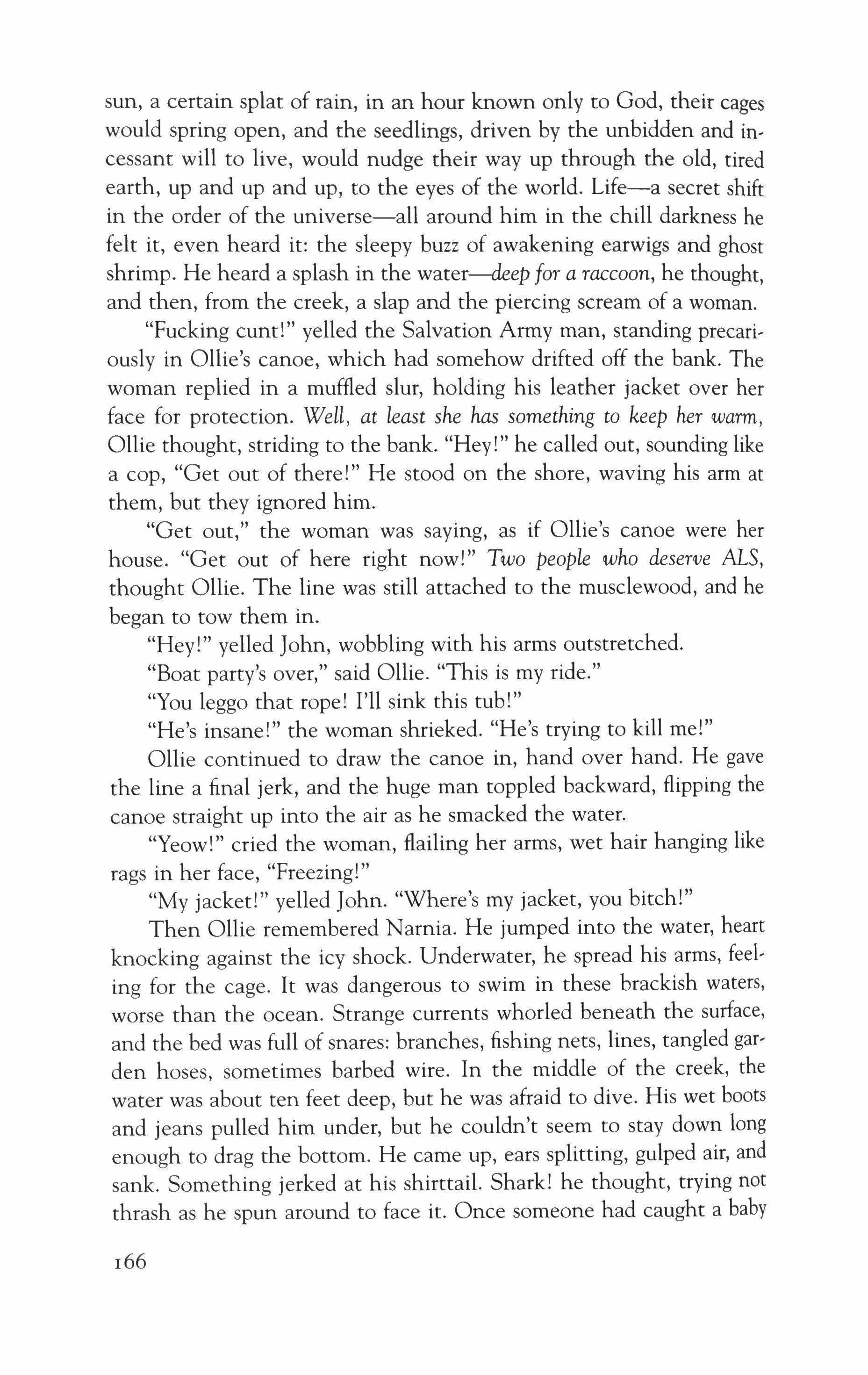
sun, a certain splat of rain, in an hour known only to God, their cages would spring open, and the seedlings, driven by the unbidden and incessant will to live, would nudge their way up through the old, tired earth, up and up and up, to the eyes of the world. Life-a secret shift in the order of the universe-all around him in the chill darkness he felt it, even heard it: the sleepy buzz of awakening earwigs and ghost shrimp. He heard a splash in the water--deep for a raccoon, he thought, and then, from the creek, a slap and the piercing scream of a woman.
"Fucking cunt!" yelled the Salvation Army man, standing precariously in Ollie's canoe, which had somehow drifted off the bank. The woman replied in a muffled slur, holding his leather jacket over her face for protection. Well, at least she has something to keep her warm, Ollie thought, striding to the bank. "Hey!" he called out, sounding like a cop, "Get out of there!" He stood on the shore, waving his arm at them, but they ignored him.
"Get out," the woman was saying, as if Ollie's canoe were her house. "Get out of here right now!" Two people who deserve ALS, thought Ollie. The line was still attached to the musclewood, and he began to tow them in.
"Hey!" yelled John, wobbling with his arms outstretched.
"Boat party's over," said Ollie. "This is my ride."
"You leggo that rope! I'll sink this tub!"
"He's insane!" the woman shrieked. "He's trying to kill me!"
Ollie continued to draw the canoe in, hand over hand. He gave the line a final jerk, and the huge man toppled backward, flipping the canoe straight up into the air as he smacked the water.
"Yeow!" cried the woman, flailing her arms, wet hair hanging like rags in her face, "Freezing!"
"My jacket!" yelled John. "Where's my jacket, you bitch!"
Then Ollie remembered Narnia. He jumped into the water, heart knocking against the icy shock. Underwater, he spread his arms, feeling for the cage. It was dangerous to swim in these brackish waters, worse than the ocean. Strange currents whorled beneath the surface, and the bed was full of snares: branches, fishing nets, lines, tangled garden hoses, sometimes barbed wire. In the middle of the creek, the water was about ten feet deep, but he was afraid to dive. His wet boots and jeans pulled him under, but he couldn't seem to stay down long enough to drag the bottom. He came up, ears splitting, gulped air, and sank. Something jerked at his shirttail. Shark! he thought, trying not thrash as he spun around to face it. Once someone had caught a baby
166
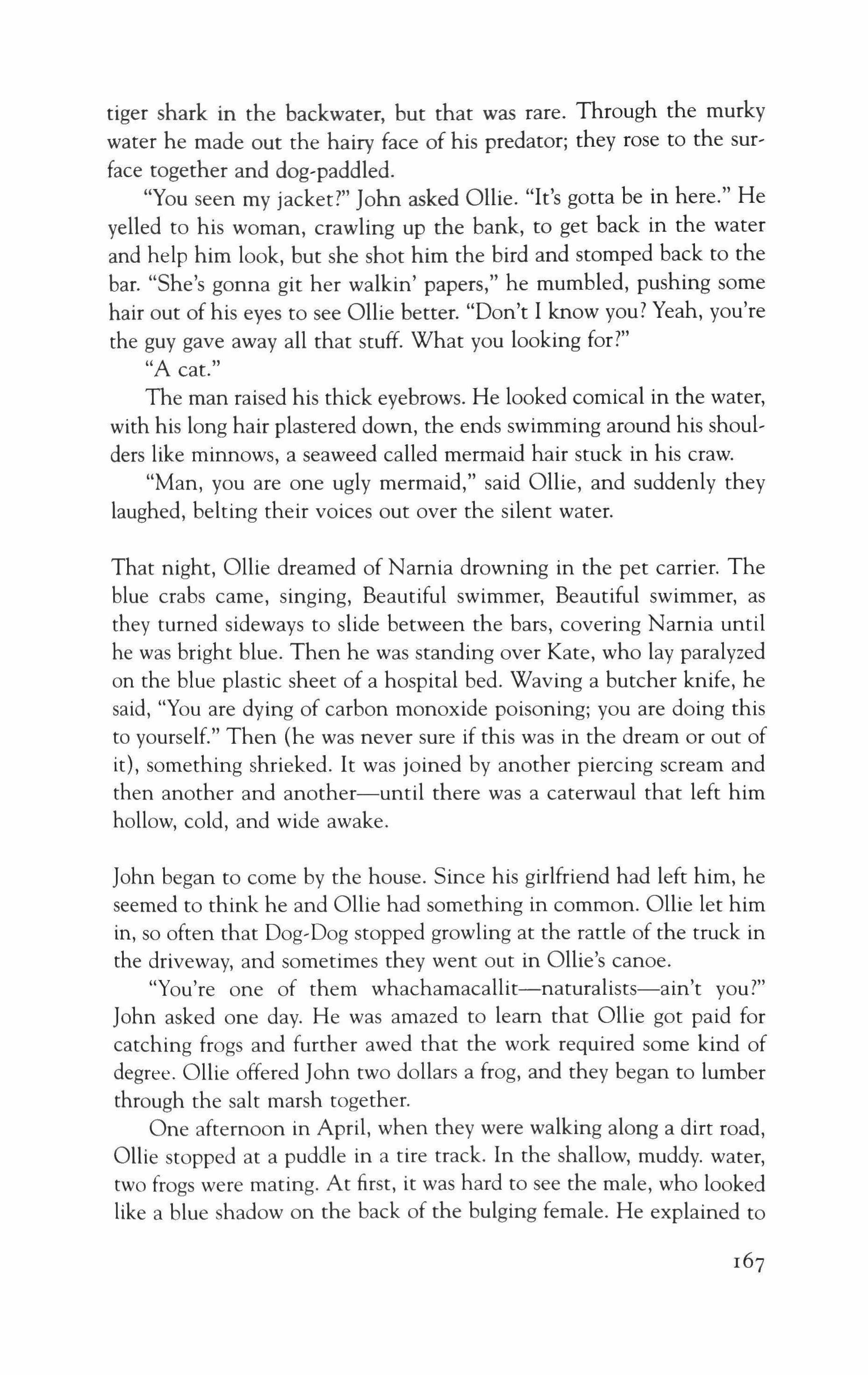
tiger shark in the backwater, but that was rare. Through the murky water he made out the hairy face of his predator; they rose to the surface together and dog-paddled.
"You seen my jacket?" John asked Ollie. "It's gotta be in here." He yelled to his woman, crawling up the bank, to get back in the water and help him look, but she shot him the bird and stomped back to the bar. "She's gonna git her walkin' papers," he mumbled, pushing some hair out of his eyes to see Ollie better. "Don't I know you? Yeah, you're the guy gave away all that stuff. What you looking for?"
"A cat."
The man raised his thick eyebrows. He looked comical in the water, with his long hair plastered down, the ends swimming around his shoulders like minnows, a seaweed called mermaid hair stuck in his craw.
"Man, you are one ugly mermaid," said Ollie, and suddenly they laughed, belting their voices out over the silent water.
That night, Ollie dreamed of Narnia drowning in the pet carrier. The blue crabs came, singing, Beautiful swimmer, Beautiful swimmer, as they turned sideways to slide between the bars, covering Narnia until he was bright blue. Then he was standing over Kate, who lay paralyzed on the blue plastic sheet of a hospital bed. Waving a butcher knife, he said, "You are dying of carbon monoxide poisoning; you are doing this to yourself." Then (he was never sure if this was in the dream or out of it), something shrieked. It was joined by another piercing scream and then another and another-until there was a caterwaul that left him hollow, cold, and wide awake.
John began to come by the house. Since his girlfriend had left him, he seemed to think he and Ollie had something in common. Ollie let him in, so often that Dog-Dog stopped growling at the rattle of the truck in the driveway, and sometimes they went out in Ollie's canoe.
"You're one of them whachamacallit-naturalists-ain't you?"
John asked one day. He was amazed to learn that Ollie got paid for catching frogs and further awed that the work required some kind of degree. Ollie offered John two dollars a frog, and they began to lumber through the salt marsh together.
One afternoon in April, when they were walking along a dirt road, Ollie stopped at a puddle in a tire track. In the shallow, muddy. water, two frogs were mating. At first, it was hard to see the male, who looked like a blue shadow on the back of the bulging female. He explained to

John how the thumb pads on the male's feet enlarged during mating season, so that he would be able to hold on to the female. He pointed out the small raft of bubbles, each clear globe encasing a tiny black tadpole. Somberly, they watched the copulation. Ollie expected a crude remark from John, or a yawn, but the big man knelt beside the puddle and studied the frogs with keen eyes. When he stood up, he said, "You know, it's true. We're just hanging on."
On a hot night in June, Kate came to Ollie in a dream. She was wearing the sleeveless white cotton nightgown he loved, with those two long twisted satin ribbons, always untied at the throat and falling across her breasts. Her army-green helmet was cocked sideways, the way she wore a hat. There was a single smudge of dirt on her nose. He tried to call her name, but it caught in his throat. She laughed, came toward him. Slowly, he edged forward, afraid she would disappear if he got too close. Her eyes, her smile, her entire body glowed with excitement-their meeting like this, sneaking over the wall of death. The narrowing space between them was YES YES YES. Trembling, ecstatic, he knelt before her. He remembered getting his arms around her before his eyes opened to the blank wall of the empty bedroom.
Later that week, while John was grilling a catch of bluefish he'd brought by, Ollie showed him a photograph, a black and white glossy of Kate leaning back on a ratty old couch, nude and smiling.
John wiped his hands on his pants before he touched it. After a moment, he said, "She ain't too hard on the eyes." Then, with his face modestly averted, he handed the picture back to Ollie.
Ollie didn't know why he'd shown it to John. There were things he wanted to tell somebody, but he couldn't find a way. The words for grief seemed as standard and artificial as funeral flowers. She didn't die; she passed. Love, too, had a formula. She had never locked Ollie out of the house, and he had never banged on the door screaming, "I'll bum the house down with you in it!" How could he describe the cauls that had peeled away from her, layer by layer, until her face was finally naked, and he had to fight the urge to hide himself, as men are said to do in the presence of angels? After this happened, no matter what he said to her, even if it was a rude, ugly thing, she said, "I love you." When she could no longer form the words, she would touch her heart and point to him. John wanted to see the loggerhead turtles lay their eggs.
"You never know when they'll come to shore," said Ollie. "It's really a waste of time."
"They come during the full moon," said John, flipping through the
168
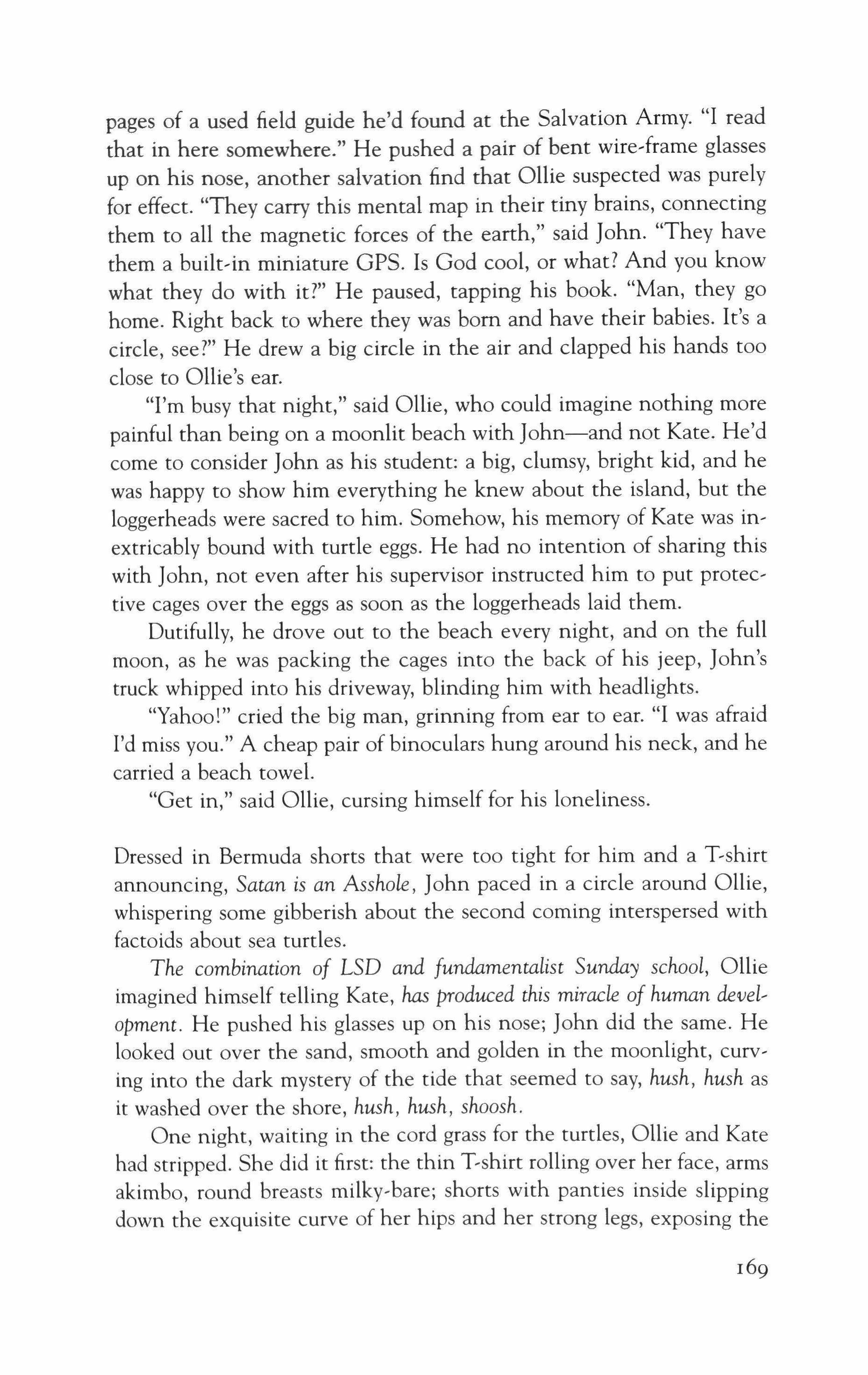
pages of a used field guide he'd found at the Salvation Army. "I read that in here somewhere." He pushed a pair of bent wire-frame glasses up on his nose, another salvation find that Ollie suspected was purely for effect. "They carry this mental map in their tiny brains, connecting them to all the magnetic forces of the earth," said John. "They have them a built-in miniature GPS. Is God cool, or what? And you know what they do with it?" He paused, tapping his book. "Man, they go home. Right back to where they was born and have their babies. It's a circle, see?" He drew a big circle in the air and clapped his hands too close to Ollie's ear.
"I'm busy that night," said Ollie, who could imagine nothing more painful than being on a moonlit beach with John-and not Kate. He'd come to consider John as his student: a big, clumsy, bright kid, and he was happy to show him everything he knew about the island, but the loggerheads were sacred to him. Somehow, his memory of Kate was inextricably bound with turtle eggs. He had no intention of sharing this with John, not even after his supervisor instructed him to put protective cages over the eggs as soon as the loggerheads laid them.
Dutifully, he drove out to the beach every night, and on the full moon, as he was packing the cages into the back of his jeep, John's truck whipped into his driveway, blinding him with headlights.
"Yahoo!" cried the big man, grinning from ear to ear. "I was afraid I'd miss you." A cheap pair of binoculars hung around his neck, and he carried a beach towel.
"Get in," said Ollie, cursing himself for his loneliness.
Dressed in Bermuda shorts that were too tight for him and a T-shirt announcing, Satan is an Asshole, John paced in a circle around Ollie, whispering some gibberish about the second coming interspersed with factoids about sea turtles.
The combination of LSD and fundamentalist Sunday school, Ollie imagined himself telling Kate, has produced this miracle of human devel� opment. He pushed his glasses up on his nose; John did the same. He looked out over the sand, smooth and golden in the moonlight, curving into the dark mystery of the tide that seemed to say, hush, hush as it washed over the shore, hush, hush, shoosh.
One night, waiting in the cord grass for the turtles, Ollie and Kate had stripped. She did it first: the thin T'shirt rolling over her face, arms akimbo, round breasts milky-bare: shorts with panties inside slipping down the exquisite curve of her hips and her strong legs, exposing the
169

dark triangle of hair. Sitting naked beside her, he smelled the maddening scent of her, something not quite bayberry, but he didn't touch her. They sat about three feet apart, legs crossed like yogis, looking at the distance.
John belched. "Being out here kinda makes ya think, don't it? I mean, about earth and heaven." He paused. "And hell." He looked around, scratched his balls, then settled himself beside Ollie. "You know what I was thinking? I was thinking that when those turtles come out of the water, it will be like they was baptized."
"We probably won't see any turtles," Ollie said flatly.
"I know it. I was just thinking that."
"Souls," John said loudly, but to himself. "Souls on the beach. In the moonbeams of the Lord's heart."
I have a responsibility to turn him into a naturalist, thought Ollie, so he won't be a preacher. But he was glad not to be alone. Sometimes when he was alone, he would say to himself, as if tearing at a wound, you will never see Kate again. Then he would feel the pain, stab after stab, and say it again and again and again, amazed that it didn't leave a mark on his body. It was hard to believe that death happened all the time, to everybody.
"John," he said, "I want to tell you-"
"Shhh," said John, melding his voice into the swoosh of the tide. He was leaning forward, hands squeezed into lumpy fists, straining his eyes against the dark curl of the surf. "You come out of there," he whispered. "Come on."
A breeze came up, stirring the sea oats behind them. An empty cup rolled at their feet. A tangle of long greasy hair blew across John's face and he didn't touch it, just sat frozen, watching.
Barely perceptible from the wave, a glistening green shell rose and fell. After a moment, a scaly head, knotted like musclewood, writhed up out of the water, and on the sand, slowly, the legs uncoiled. There was the first mama, leaving tractor tracks in the sand as she crawled up the beach. Around and around she turned in her chosen spot, like a dog getting ready to lie down, and at some unfathomable signal, she began to dig. Down, down, down into the earth she went with her belly full of eggs. The moon shone down; the surf rocked back and forth, and still the beasts came out of the water, one after another, slowly, and with great dignity, as if they were bearing gifts.
170
Robert von Hallberg

LyricThinking
the supreme test of a book is that we should feel some unusual intelligence working behind the words.
Ezra Pound, "The Serious Artist"
The large question in the background of this essay is whether poetry is a branch of knowledge. I believe it is, but this question remains in the background because it is so grand. The more modest question of how poetry asserts knowledge-claims is directly addressed here. There is an old and still live connection between poetry and wisdom-think of Gary Snyder, Robert Bly, Wendell Berry-but the connection is actually pervasive in contemporary writing. Many western as well as eastern poets, all the way back to Hesiod, have worked proverbs into verse. In some cases the verse is only an envelope for knowledge; that's not an interesting poetic genre. Yet the nexus of poetry and thought is where the value of poetry must be defined, especially for modem intellectuals. Poetry is criticized almost exclusively in terms of its meaning, as though it were out to do what philosophy does, but by other means. In a sense, this is right. Angus Fletcher speaks of noetics as "occurring when the poet introduces thought as a discriminable dimension of the form and meaning of the poem."} There is then a sense in which some poems more than others entail noetics, but do these poems set about their thoughtful task with all the resources that philosophers routinely
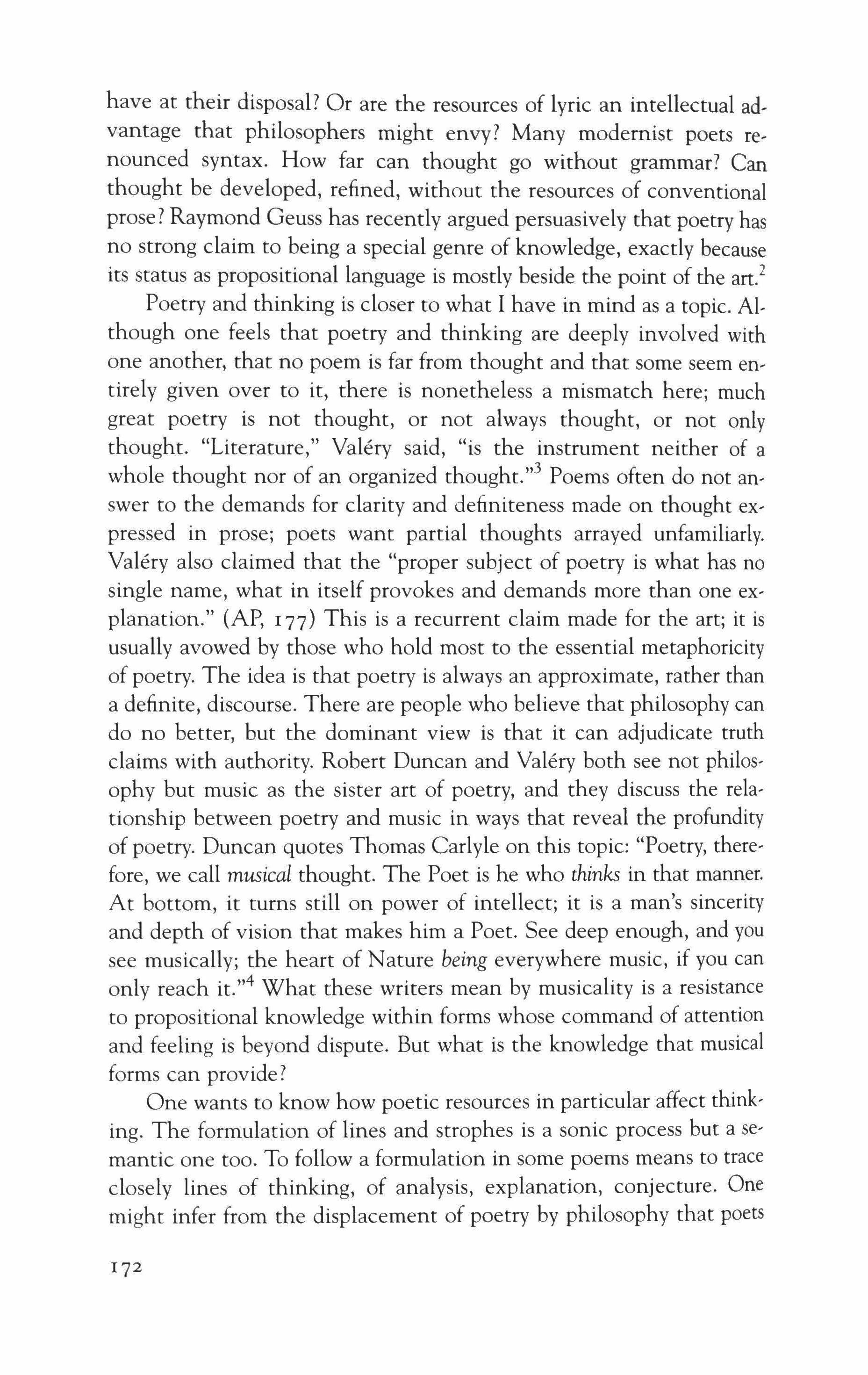
have at their disposal? Or are the resources of lyric an intellectual advantage that philosophers might envy? Many modernist poets renounced syntax. How far can thought go without grammar? Can thought be developed, refined, without the resources of conventional prose? Raymond Geuss has recently argued persuasively that poetry has no strong claim to being a special genre of knowledge, exactly because its status as propositional language is mostly beside the point of the art.2
Poetry and thinking is closer to what I have in mind as a topic. Although one feels that poetry and thinking are deeply involved with one another, that no poem is far from thought and that some seem entirely given over to it, there is nonetheless a mismatch here; much great poetry is not thought, or not always thought, or not only thought. "Literature," Valery said, "is the instrument neither of a whole thought nor of an organized thought.Y Poems often do not answer to the demands for clarity and definiteness made on thought expressed in prose; poets want partial thoughts arrayed unfamiliarly. Valery also claimed that the "proper subject of poetry is what has no single name, what in itself provokes and demands more than one explanation." (AP, 177) This is a recurrent claim made for the art; it is usually avowed by those who hold most to the essential metaphoricity of poetry. The idea is that poetry is always an approximate, rather than a definite, discourse. There are people who believe that philosophy can do no better, but the dominant view is that it can adjudicate truth claims with authority. Robert Duncan and Valery both see not philosophy but music as the sister art of poetry, and they discuss the relationship between poetry and music in ways that reveal the profundity of poetry. Duncan quotes Thomas Carlyle on this topic: "Poetry, therefore, we call musical thought. The Poet is he who thinks in that manner. At bottom, it turns still on power of intellect; it is a man's sincerity and depth of vision that makes him a Poet. See deep enough, and you see musically; the heart of Nature being everywhere music, if you can only reach it.,,4 What these writers mean by musicality is a resistance to propositional knowledge within forms whose command of attention and feeling is beyond dispute. But what is the knowledge that musical forms can provide?
One wants to know how poetic resources in particular affect thinking. The formulation of lines and strophes is a sonic process but a semantic one too. To follow a formulation in some poems means to trace closely lines of thinking, of analysis, explanation, conjecture. One might infer from the displacement of poetry by philosophy that poets
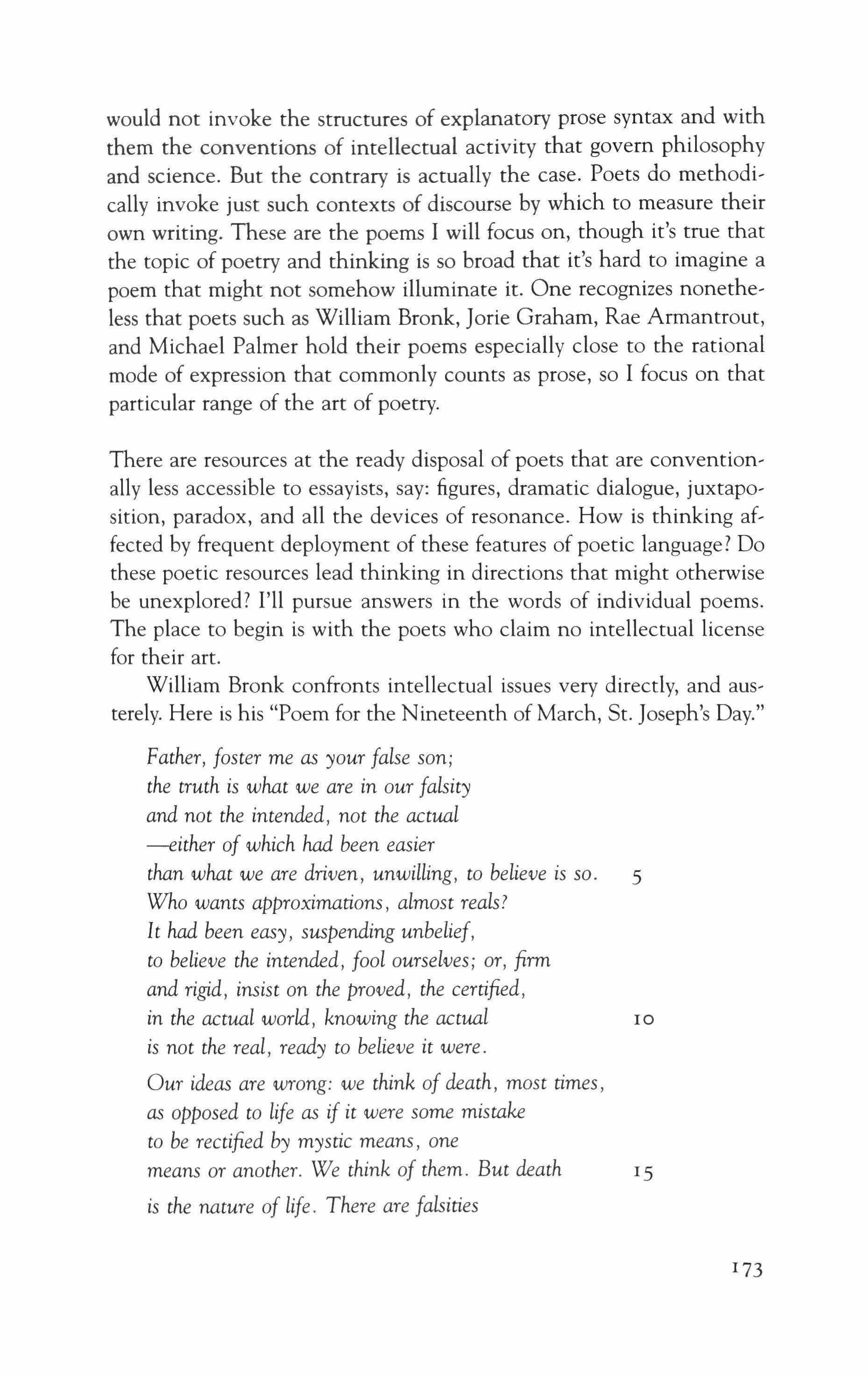
would not invoke the structures of explanatory prose syntax and with them the conventions of intellectual activity that govern philosophy and science. But the contrary is actually the case. Poets do methodically invoke just such contexts of discourse by which to measure their own writing. These are the poems I will focus on, though it's true that the topic of poetry and thinking is so broad that it's hard to imagine a poem that might not somehow illuminate it. One recognizes nonetheless that poets such as William Bronk, Jorie Graham, Rae Armantrout, and Michael Palmer hold their poems especially close to the rational mode of expression that commonly counts as prose, so I focus on that particular range of the art of poetry.
There are resources at the ready disposal of poets that are convention' ally less accessible to essayists, say: figures, dramatic dialogue, juxtaposition, paradox, and all the devices of resonance. How is thinking affected by frequent deployment of these features of poetic language? Do these poetic resources lead thinking in directions that might otherwise be unexplored? I'll pursue answers in the words of individual poems. The place to begin is with the poets who claim no intellectual license for their art.
William Bronk confronts intellectual issues very directly, and austerely. Here is his "Poem for the Nineteenth of March, St. Joseph's Day."
Father, foster me as your false son; the truth is what we are in our falsity and not the intended, not the actual -either of which had been easier than what we are driven, unwilling, to believe is so. 5 Who wants approximations, almost reals? It had been easy, suspending unbelief, to believe the intended, fool ourselves; or, firm and rigid, insist on the proved, the certified, in the actual world, knowing the actual 10 is not the real, ready to believe it were.
Our ideas are wrong: we think of death, most times, as opposed to life as if it were some mistake to be rectified by mystic means, one means or another. We think of them. But death IS is the nature of life. There are falsities
173
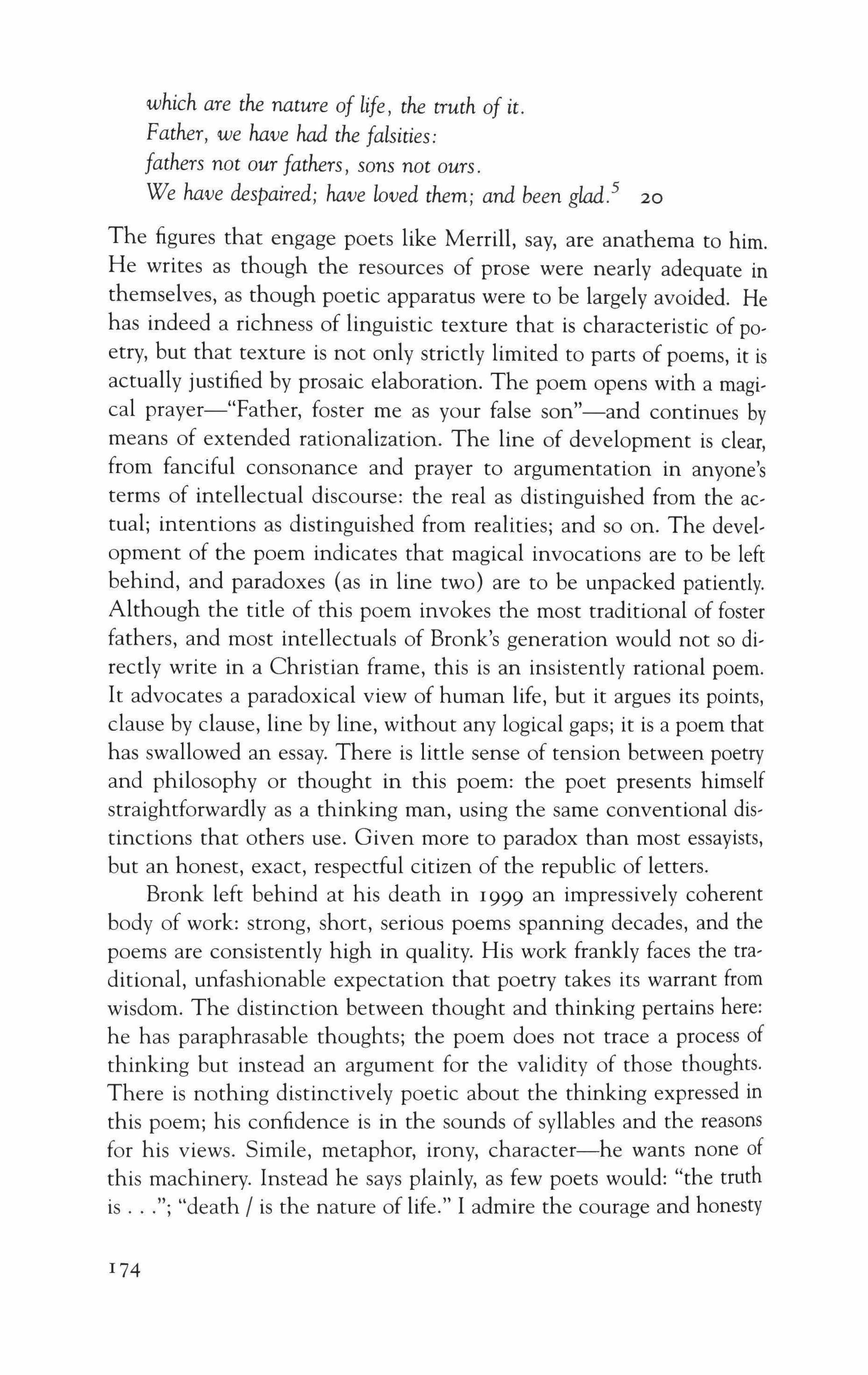
which are the nature of life, the truth of it.
Father, we have had the falsities:
fathers not our fathers, sons not ours.
We have despaired; have loved them; and been glad.S 20
The figures that engage poets like Merrill, say, are anathema to him. He writes as though the resources of prose were nearly adequate in themselves, as though poetic apparatus were to be largely avoided. He has indeed a richness of linguistic texture that is characteristic of poetry, but that texture is not only strictly limited to parts of poems, it is actually justified by prosaic elaboration. The poem opens with a magical prayer-"Father, foster me as your false son"-and continues by means of extended rationalization. The line of development is clear, from fanciful consonance and prayer to argumentation in anyone's terms of intellectual discourse: the real as distinguished from the actual; intentions as distinguished from realities; and so on. The development of the poem indicates that magical invocations are to be left behind, and paradoxes (as in line two) are to be unpacked patiently. Although the title of this poem invokes the most traditional of foster fathers, and most intellectuals of Bronk's generation would not so directly write in a Christian frame, this is an insistently rational poem. It advocates a paradoxical view of human life, but it argues its points, clause by clause, line by line, without any logical gaps; it is a poem that has swallowed an essay. There is little sense of tension between poetry and philosophy or thought in this poem: the poet presents himself straightforwardly as a thinking man, using the same conventional distinctions that others use. Given more to paradox than most essayists, but an honest, exact, respectful citizen of the republic of letters.
Bronk left behind at his death in 1999 an impressively coherent body of work: strong, short, serious poems spanning decades, and the poems are consistently high in quality. His work frankly faces the traditional, unfashionable expectation that poetry takes its warrant from wisdom. The distinction between thought and thinking pertains here: he has paraphrasable thoughts; the poem does not trace a process of thinking but instead an argument for the validity of those thoughts. There is nothing distinctively poetic about the thinking expressed in this poem; his confidence is in the sounds of syllables and the reasons for his views. Simile, metaphor, irony, character-he wants none of this machinery. Instead he says plainly, as few poets would: "the truth is "; "death / is the nature of life." I admire the courage and honesty
174

of poets who are willing to record their settled thoughts and allow them to stand for scrutiny by an audience of intellectual peers. Bronk has refused the appeal of "mystic means," and that appeal is real. The sense of quick movement, of distance traveled-that's the thrill of parataxis, which, as Bob Perelman has argued, is the dominant mode of our time, in terms of poetry and of mass media.6 Hypotactic writers like Bronk, or Robert Pinsky, are too easily thought to be dull or ordinary because they are understood clearly.
The generation that came to intellectual majority in the first decades of the twentieth century was frankly interested in the processes of ordinary and advanced thinking; I mean to refer well beyond the development of psychoanalysis. The Imagist doctrines of 1912-1913 were aimed at the presentation of "an intellectual and emotional complex in an instant of time."? One of John Dewey's earliest books was called How We Think (1910); I will quote from this ambitious book in the pages that follow. Ernest Dimnet, a critic of French and English literature, wrote an effective little book entitled The Art of Thinking (1928) that enjoyed popular success right away. Dewey returned to his 1910 volume and expanded it in 1933; it too found a popular readership. (Heidegger published Was Heisst Denken? in 1954, but it is not actually on the same topic. The title indicates nonetheless the aspiration of his generation to reconstitute the deep forms of intellectual activity.) Roger Caillois wrote a manuscript between 1933 and 1935 that was posthumously published as La Necessite d'esprit, and there he analyzes the ideograms that organize what he refers to as "lyrical thinking." I will draw on some of the claims of these books, because they help to clarify what later poets have been looking for in the intellectual structure of poetry.
Dewey is an eloquent advocate of connectivity in thinking: what distinguishes reflective thinking, which he advocates, from free association, which he derides, is clear connection between thoughts; reflective thinking is sustained thinking.
Reflection involves not simply a sequence of ideas, but a con-sequence-a consecutive ordering in such a way that each determines the next as its proper outcome, while each outcome in tum leans back on, or refers to, its predecessors.f
Learning from Dewey, one must ask how one thought is connected to the next, and how long and fine a chain of thought is constructed by

a thinker. Although Dewey expressly warns against "deadly and fanatic consistency," he insists on the importance of mastery in reflective thinking. Connectivity, consecutiveness, and concentration are names for one process that
means variety and change of ideas combined into a single steady trend moving toward a unified conclusion. Thoughts are concentrated, not by being kept still and quiescent, but by being kept moving toward an object, as a general marshals his troops for attack or defense. (HWT, 48; emphasis in orig.)
Dewey would have liked Bronk, and Pinsky, and Berry. But then there is the other thing altogether: a quick flight from one thought to another. Dewey derisively refers to grasshopper thinking, but he knows too that sudden perception of connection is a powerful inducement to intellectual admiration. Curiosity, as he acknowledges, derives from a sense that something is missing. (HWT, 38) Dimnet a little reluctantly recognizes that "rapidity of argument" is commonly understood to indicate "brilliant thinking," though he wants to believe that people argue rapidly not because of genius but because of an extraordinary command of facts.9 The critical reference to speed actually pertains to disjunctiveness: one speaks of speed because of a sense of distance covered without effort; of a shift from one semantic field or discursive mode to another, without explanation. Dimnet's objective is to explicate the art or craft of thinking, or "to devise a method rot] bringing us all nearer to genius," which, he says, "is primarily power resulting in ease. Genius never plods." (AT, 197) A series of clear steps in one direction, or a chain of strong links-these are not the figures of genius. There is a conflict between connectivity and genius, or what Dimnet calls intuition. Intuitions, he argues, "often come in clusters often without any apparent connection." (AT, 203) "There is no good or even passable writing," he says rightly, "without some sort of outline destined to guide the pen." (AT, 162) But likewise there is no reason to avoid quick leaps over gaps of nonunderstanding, if one is writing within a genre like the lyric that conventionally prizes not discipline but genius. OK, essayists need outlines, but poets don't. Dewey claimed that "direct immediate discharge or expression of an impulsive tendency is fatal to thinking" (HWT, 87), but it certainly is not to poetry:
176

The apparition of these faces in a crowd; petals on a wet black bough.
The structures of Bronk's thinking are close to the features of mainstream intellectuality that both Dewey and Dimnet explicate, but Bronk's thinking is unusual among poets.
For seventy-five years critics have distinguished poetic from prosaic thinking in terms of the role of figurative language. Eliot discriminates between intellectual and reflective poets in just these terms.
Tennyson and Browning are poets, and they think; but they do not feel their thought as immediately as the odour of a rose. A thought to Donne was an experience; it modified his sensibility. When a poet's mind is perfectly equipped for its work, it is constantly amalgamating disparate experience; the ordinary man's experience is chaotic, irregular, fragmentary. The latter falls in love, or reads Spinoza, and these two experiences have nothing to do with each other, or with the noise of the typewriter or the smell of cooking; in the mind of the poet these experiences are always forming new wholes.lo
This very famous passage sets out the relation of concrete experience and abstract thought in the eyes of the most programmatic modernist poets, and this view of the matter became academic orthodoxy and persisted for decades. The intellectual poet is one whose thoughts are modified by the sensual and emotional context of their expression. Such a poet brings antinomies into harmony; the project is the integration of heterogeneous thought and feeling. Arnold Stein, for instance, argued in 1962 that Donne's objective was "the rational interdependence of parts" of a poem; he found in Donne's poems a "solid structure of continuous rationality."ll Eliot's formulation means that thoughts are not adequately paraphrased, and that a poet's thought about truth, justice, death, or whatever might well be quite different at different moments, in different poems, and so on. There is no sharp distinction between figures and sense in the language of such a poet: the figures and the prosody alter the thought, phrase by phrase, line by line. Not surprisingly, this poetic gave rise to elaborate analysis of figures and images in poems. Images are constitutive not ornamental of thought in modernist poetic doctrine. Figures, though, lead away from a node of concentrated attention; they bring something new into play,
177

something with roots in an elsewhere beside the point that generated the figure. They are seductive like distractions.V Poets want the pleasures figures give without sacrificing a sense of direction that holds poems together.
Yet one of the greatest poems begins when the poet loses his way: "Midway on our life's journey, I found myself/ In dark woods, the right road lost," in Pinsky's translation.
1'll tell what I saw, though how I came to enter I cannot well say, being so full of sleep Whatever moment it was I began to blunder
Off the true path. 13
One of the resources of poetic thinking is an accommodation of uncertainty, even error, and vagueness. My point is not only that poetry is often vaguer or more erroneous than good prose; that alone would not recommend the art. But vagueness and error are inevitable constituents not only of poetry but of analytical thinking as well. I tell young college students who try to use terms and syntactic structures they do not truly understand that they are writing over their own heads. I encourage them to use only terms and expressions they do understand and might be able to read aloud with conviction to their friends. This is the common counsel of freshman composition courses, but it also conforms to the main line of modernist poetics. "In my opinion," Valery said, "it is more useful to speak of what one has experienced than to pretend to a knowledge that is entirely impersonal." (AP, 58) Think of George Oppen's admiration for the knowledge of craftsmen as definite, specific, correct. There is a Popean sense in the u.s. avant garde poetics of the 1950S and 1960s: to write but what one understands. But there is another view of the matter too. Robert Duncan responded to Charles Olson's insistence on accuracy: "I like rigor and even clarity as a quality of a work-that is, as I like muddle and floaty vagaries. It is the intensity of the conception that moves me.,,14 He knew that vagueness lies at the heart of the art, that great poets have found a path to artistic success through error. But what did he mean by intensity of conception? Desires, not conceptions, are said to be intense. He may have meant that intellectual desire can be felt not only in austere but also in romantic, lush, indulgent art. A strong desire to think may itself be an admirable feature of a poem, even when its thought does not materialize well.
178
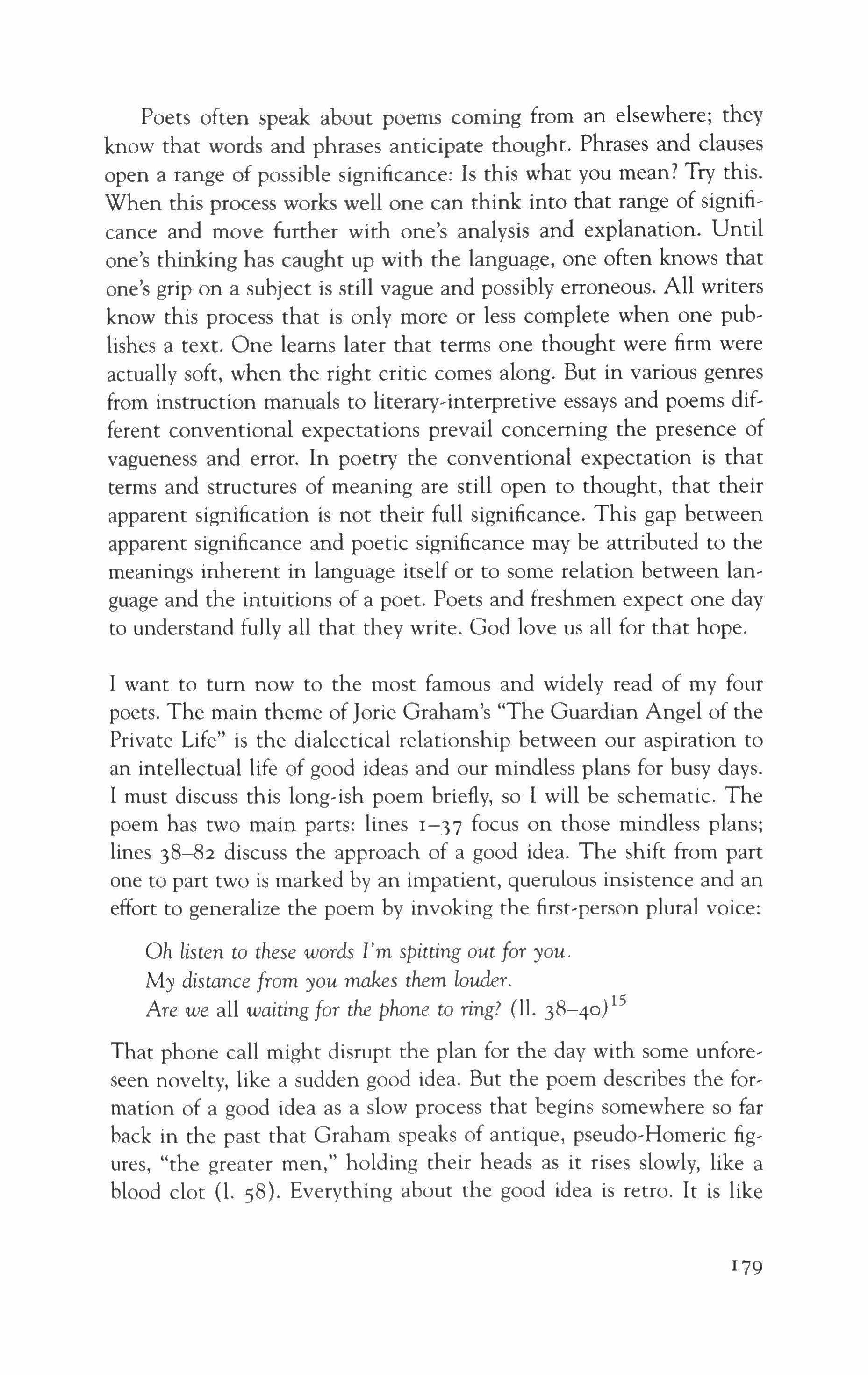
Poets often speak about poems coming from an elsewhere; they know that words and phrases anticipate thought. Phrases and clauses open a range of possible significance: Is this what you mean? Try this. When this process works well one can think into that range of significance and move further with one's analysis and explanation. Until one's thinking has caught up with the language, one often knows that one's grip on a subject is still vague and possibly erroneous. All writers know this process that is only more or less complete when one publishes a text. One learns later that terms one thought were firm were actually soft, when the right critic comes along. But in various genres from instruction manuals to literary-interpretive essays and poems different conventional expectations prevail concerning the presence of vagueness and error. In poetry the conventional expectation is that terms and structures of meaning are still open to thought, that their apparent signification is not their full significance. This gap between apparent significance and poetic significance may be attributed to the meanings inherent in language itself or to some relation between language and the intuitions of a poet. Poets and freshmen expect one day to understand fully all that they write. God love us all for that hope.
I want to tum now to the most famous and widely read of my four poets. The main theme of [orie Graham's "The Guardian Angel of the Private Life" is the dialectical relationship between our aspiration to an intellectual life of good ideas and our mindless plans for busy days. I must discuss this long-ish poem briefly, so I will be schematic. The poem has two main parts: lines 1-37 focus on those mindless plans; lines 38-82 discuss the approach of a good idea. The shift from part one to part two is marked by an impatient, querulous insistence and an effort to generalize the poem by invoking the firsr-person plural voice:
Oh listen to these words I'm spitting out for you.
My distance from you makes them louder. Are we all waiting for the phone to ring? (11. 38-4°) 15
That phone call might disrupt the plan for the day with some unforeseen novelty, like a sudden good idea. But the poem describes the formation of a good idea as a slow process that begins somewhere so far back in the past that Graham speaks of antique, pseudo-Homeric figures, "the greater men," holding their heads as it rises slowly, like a blood clot (1. 58). Everything about the good idea is retro. It is like
179
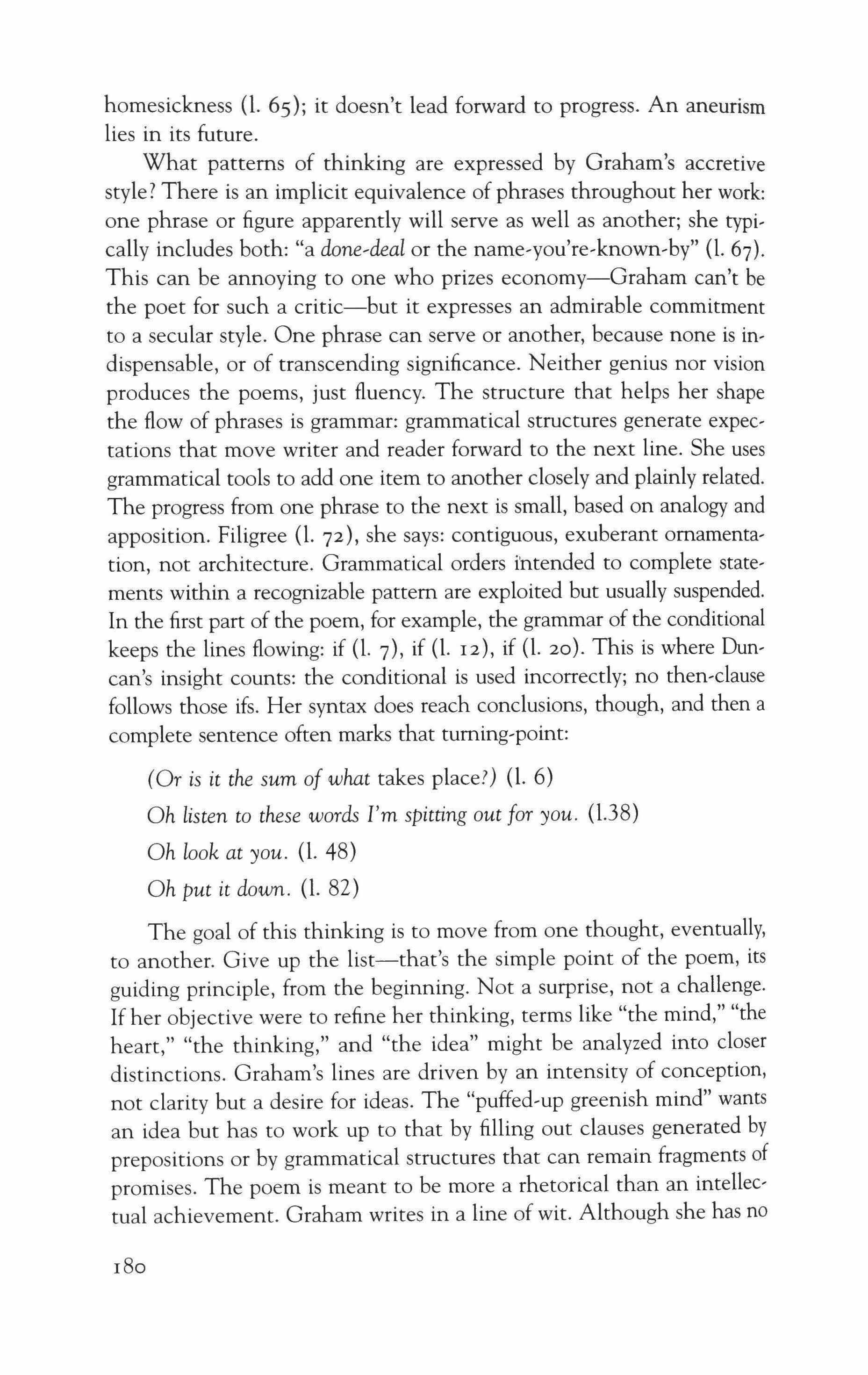
homesickness (1. 65); it doesn't lead forward to progress. An aneurism lies in its future.
What patterns of thinking are expressed by Graham's accretive style? There is an implicit equivalence of phrases throughout her work: one phrase or figure apparently will serve as well as another; she typically includes both: "a done�deal or the name-you're-known-by" (1. 67). This can be annoying to one who prizes economy-Graham can't be the poet for such a critic-but it expresses an admirable commitment to a secular style. One phrase can serve or another, because none is indispensable, or of transcending significance. Neither genius nor vision produces the poems, just fluency. The structure that helps her shape the flow of phrases is grammar: grammatical structures generate expectations that move writer and reader forward to the next line. She uses grammatical tools to add one item to another closely and plainly related. The progress from one phrase to the next is small, based on analogy and apposition. Filigree (l. 72), she says: contiguous, exuberant ornamentation, not architecture. Grammatical orders intended to complete statements within a recognizable pattern are exploited but usually suspended. In the first part of the poem, for example, the grammar of the conditional keeps the lines flowing: if (1. 7), if (l. I2), if (1. 20). This is where Duncan's insight counts: the conditional is used incorrectly; no then-clause follows those ifs. Her syntax does reach conclusions, though, and then a complete sentence often marks that turning-point:
(Or is it the sum of what takes place?) (l. 6)
Oh listen to these words I'm spitting out for you. (l.38)
Oh look at you. (l. 48)
Oh put it down. (1. 82)
The goal of this thinking is to move from one thought, eventually, to another. Give up the list-that's the simple point of the poem, its guiding principle, from the beginning. Not a surprise, not a challenge. If her objective were to refine her thinking, terms like "the mind," "the heart," "the thinking," and "the idea" might be analyzed into closer distinctions. Graham's lines are driven by an intensity of conception, not clarity but a desire for ideas. The "puffed-up greenish mind" wants an idea but has to work up to that by filling out clauses generated by prepositions or by grammatical structures that can remain fragments of promises. The poem is meant to be more a rhetorical than an intellectual achievement. Graham writes in a line of wit. Although she has no
180
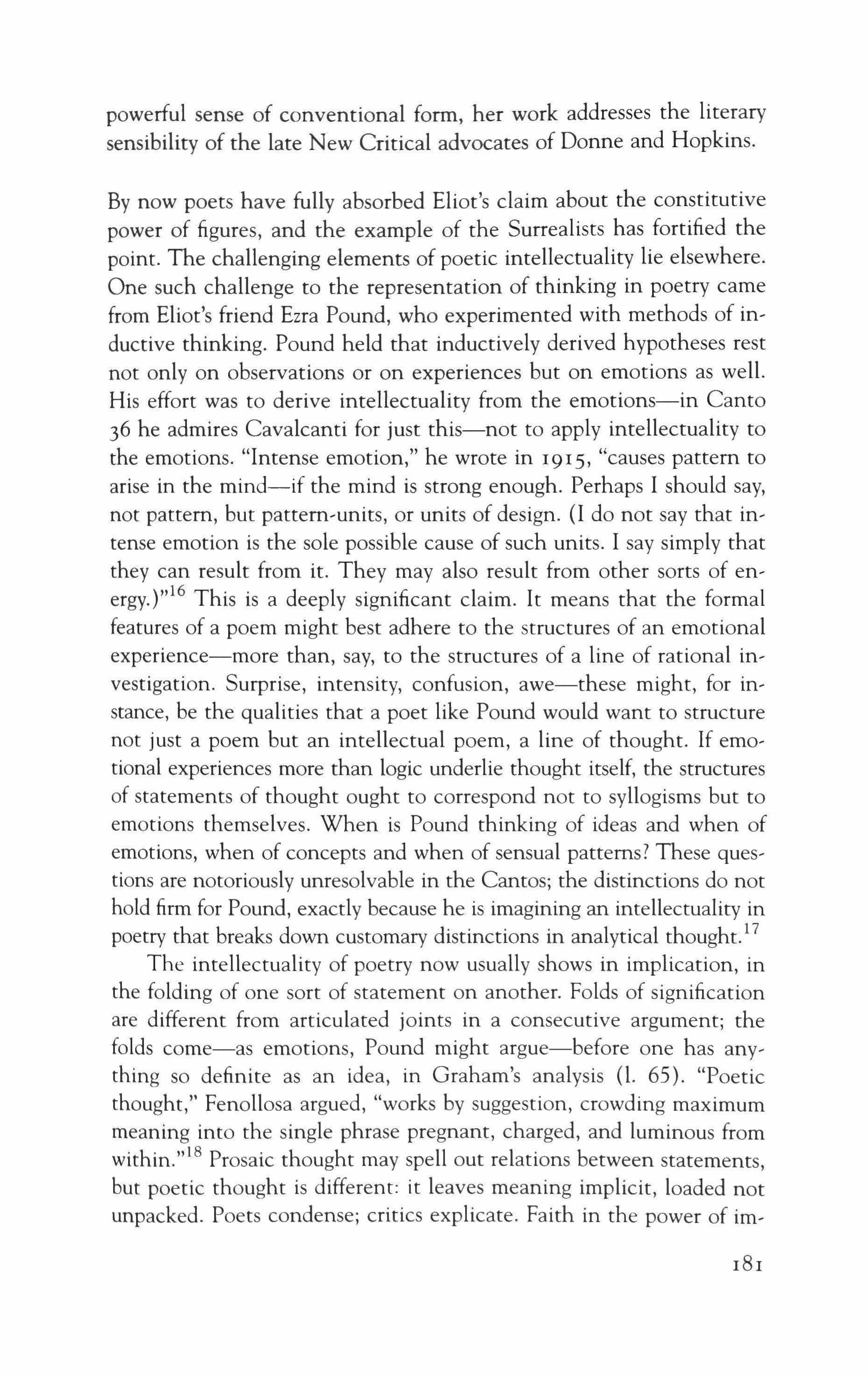
powerful sense of conventional form, her work addresses the literary sensibility of the late New Critical advocates of Donne and Hopkins.
By now poets have fully absorbed Eliot's claim about the constitutive power of figures, and the example of the Surrealists has fortified the point. The challenging elements of poetic intellectuality lie elsewhere. One such challenge to the representation of thinking in poetry came from Eliot's friend Ezra Pound, who experimented with methods of in� ductive thinking. Pound held that inductively derived hypotheses rest not only on observations or on experiences but on emotions as well. His effort was to derive intellectuality from the emotions-in Canto 36 he admires Cavalcanti for just this-not to apply intellectuality to the emotions. "Intense emotion," he wrote in 1915, "causes pattern to arise in the mind-if the mind is strong enough. Perhaps I should say, not pattern, but pattern-units, or units of design. (I do not say that intense emotion is the sole possible cause of such units. I say simply that they can result from it. They may also result from other sorts of energy.),,16 This is a deeply significant claim. It means that the formal features of a poem might best adhere to the structures of an emotional experience-more than, say, to the structures of a line of rational investigation. Surprise, intensity, confusion, awe-these might, for instance, be the qualities that a poet like Pound would want to structure not just a poem but an intellectual poem, a line of thought. If emotional experiences more than logic underlie thought itself, the structures of statements of thought ought to correspond not to syllogisms but to emotions themselves. When is Pound thinking of ideas and when of emotions, when of concepts and when of sensual patterns? These questions are notoriously unresolvable in the Cantos; the distinctions do not hold firm for Pound, exactly because he is imagining an intellectuality in poetry that breaks down customary distinctions in analytical thought.17
The intellectuality of poetry now usually shows in implication, in the folding of one sort of statement on another. Folds of signification are different from articulated joints in a consecutive argument; the folds come-as emotions, Pound might argue-before one has anything so definite as an idea, in Graham's analysis (1. 65). "Poetic thought," Fenollosa argued, "works by suggestion, crowding maximum meaning into the single phrase pregnant, charged, and luminous from within.,,18 Prosaic thought may spell out relations between statements, but poetic thought is different: it leaves meaning implicit, loaded not unpacked. Poets condense; critics explicate. Faith in the power of im-
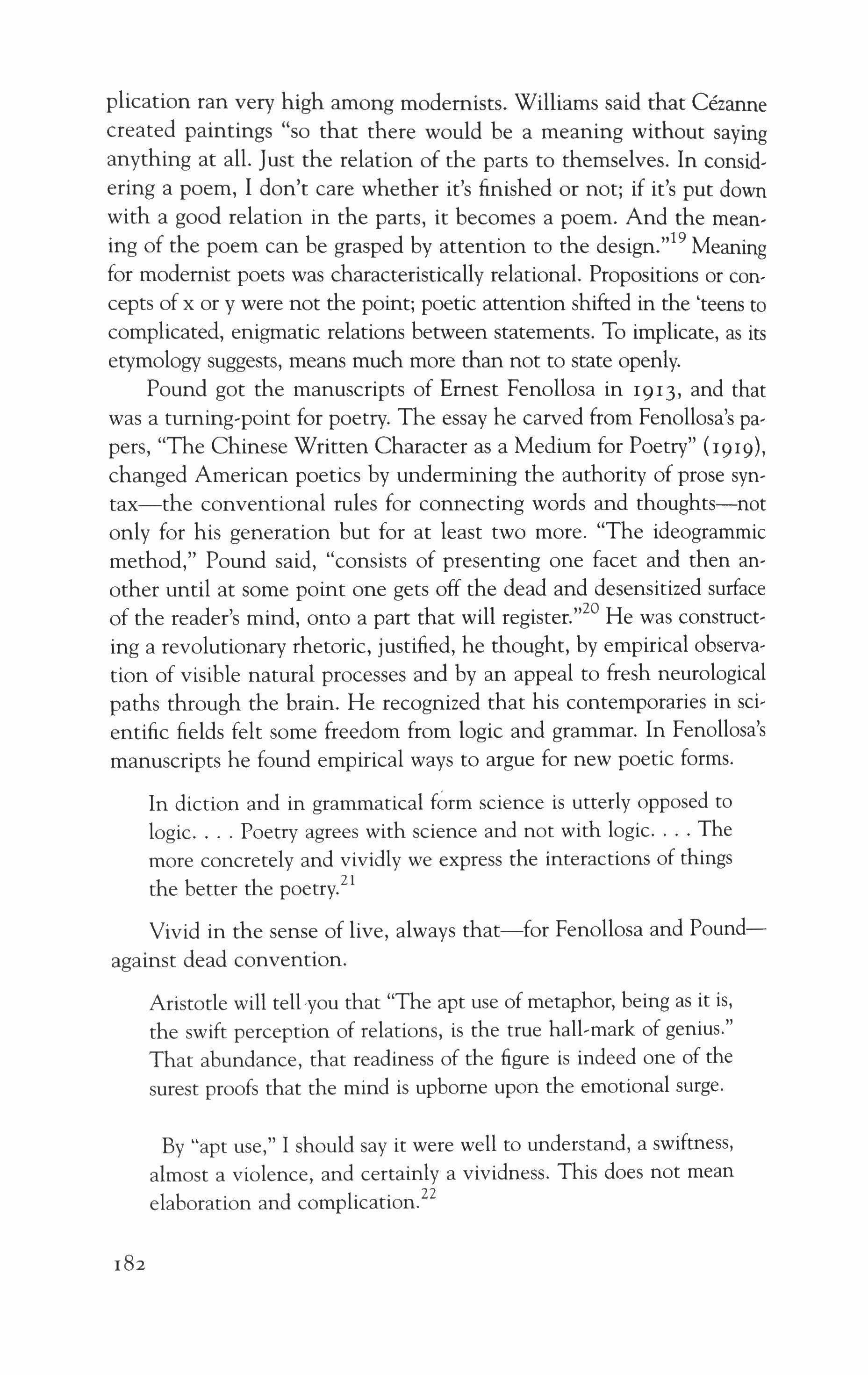
plication ran very high among modernists. Williams said that Cezanne created paintings "so that there would be a meaning without saying anything at all. Just the relation of the parts to themselves. In considering a poem, I don't care whether it's finished or not; if it's put down with a good relation in the parts, it becomes a poem. And the meaning of the poem can be grasped by attention to the design.,,19 Meaning for modernist poets was characteristically relational. Propositions or concepts of x or y were not the point; poetic attention shifted in the 'teens to complicated, enigmatic relations between statements. To implicate, as its etymology suggests, means much more than not to state openly.
Pound got the manuscripts of Ernest Fenollosa in 1913, and that was a turning-point for poetry. The essay he carved from Fenollosa's papers, "The Chinese Written Character as a Medium for Poetry" (1919), changed American poetics by undermining the authority of prose syntax-the conventional rules for connecting words and thoughts-not only for his generation but for at least two more. "The ideogrammic method," Pound said, "consists of presenting one facet and then another until at some point one gets off the dead and desensitized surface of the reader's mind, onto a part that will register.,,2o He was constructing a revolutionary rhetoric, justified, he thought, by empirical observation of visible natural processes and by an appeal to fresh neurological paths through the brain. He recognized that his contemporaries in scientific fields felt some freedom from logic and grammar. In Fenollosa's manuscripts he found empirical ways to argue for new poetic forms.
In diction and in grammatical form science is utterly opposed to logic Poetry agrees with science and not with logic The more concretely and vividly we express the interactions of things the better the poetrv/"
Vivid in the sense of live, always that-for Fenollosa and Poundagainst dead convention.
Aristotle will tell 'you that "The apt use of metaphor, being as it is, the swift perception of relations, is the true hall-mark of genius."
That abundance, that readiness of the figure is indeed one of the surest proofs that the mind is upbome upon the emotional surge.
By "apt use," I should say it were well to understand, a swiftness, almost a violence, and certainly a vividness. This does not mean 1 b d 1" 22 e a oration an comp icanon.
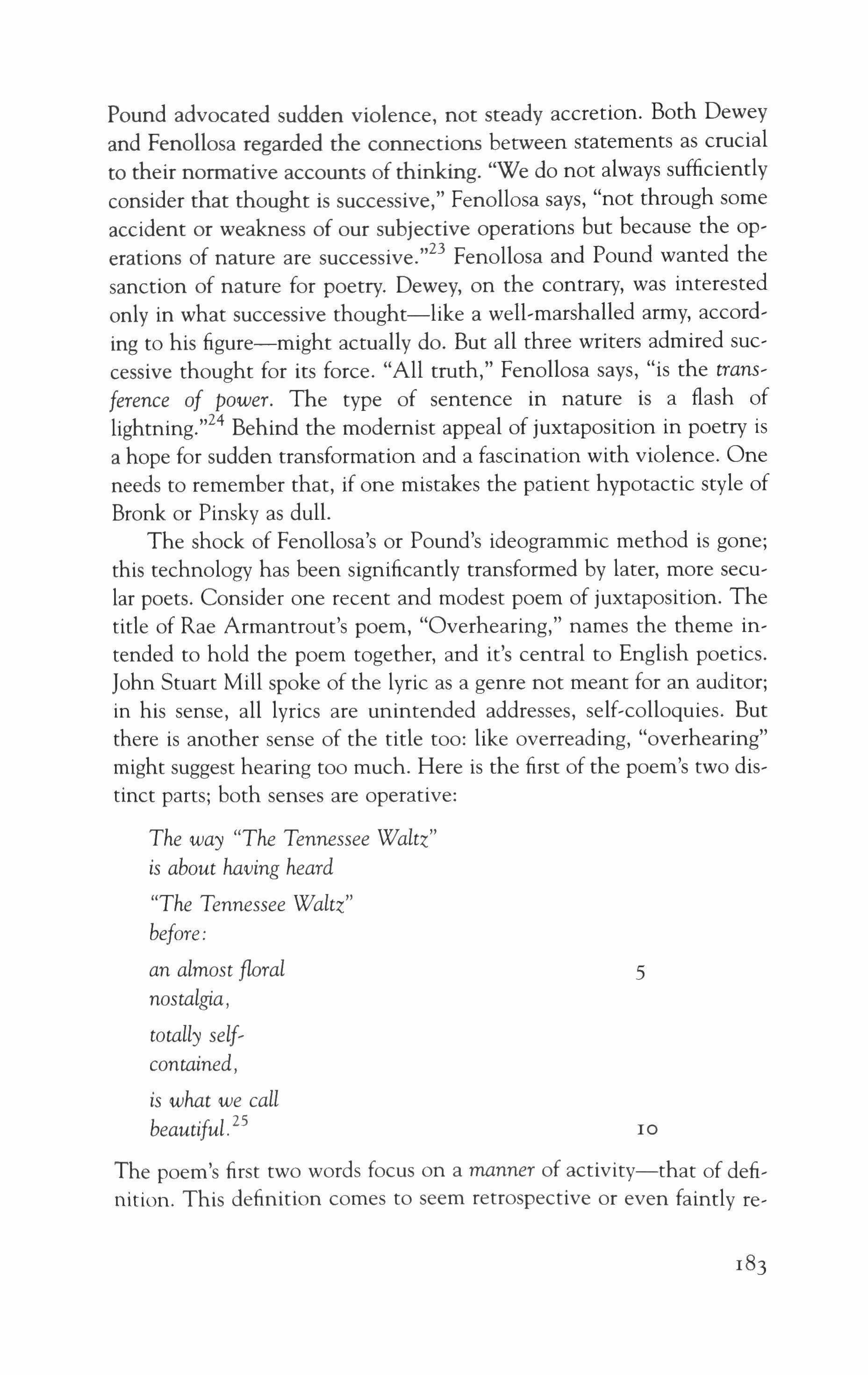
Pound advocated sudden violence, not steady accretion. Both Dewey and Fenollosa regarded the connections between statements as crucial to their normative accounts of thinking. "We do not always sufficiently consider that thought is successive," Fenollosa says, "not through some accident or weakness of our subjective operations but because the operations of nature are successive.Y' Fenollosa and Pound wanted the sanction of nature for poetry. Dewey, on the contrary, was interested only in what successive thought-like a well-marshalled army, according to his figure-might actually do. But all three writers admired suecessive thought for its force. "All truth," Fenollosa says, "is the transference of power. The type of sentence in nature is a flash of lightning."z4 Behind the modernist appeal of juxtaposition in poetry is a hope for sudden transformation and a fascination with violence. One needs to remember that, if one mistakes the patient hypotactic style of Bronk or Pinsky as dull.
The shock of Fenollosa's or Pound's ideogrammic method is gone; this technology has been significantly transformed by later, more secutar poets. Consider one recent and modest poem of juxtaposition. The title of Rae Armantrout's poem, "Overhearing," names the theme intended to hold the poem together, and it's central to English poetics. John Stuart Mill spoke of the lyric as a genre not meant for an auditor; in his sense, all lyrics are unintended addresses, self-colloquies. But there is another sense of the title too: like overreading, "overhearing" might suggest hearing too much. Here is the first of the poem's two distinct parts; both senses are operative:
The way "The Tennessee Waltz" is about having heard
"The Tennessee Waltz" before: an almost floral nostalgia, totally self� contained, is what we call beautiful. 25 5 10
The poem's first two words focus on a manner of activity-that of definition. This definition comes to seem retrospective or even faintly re-
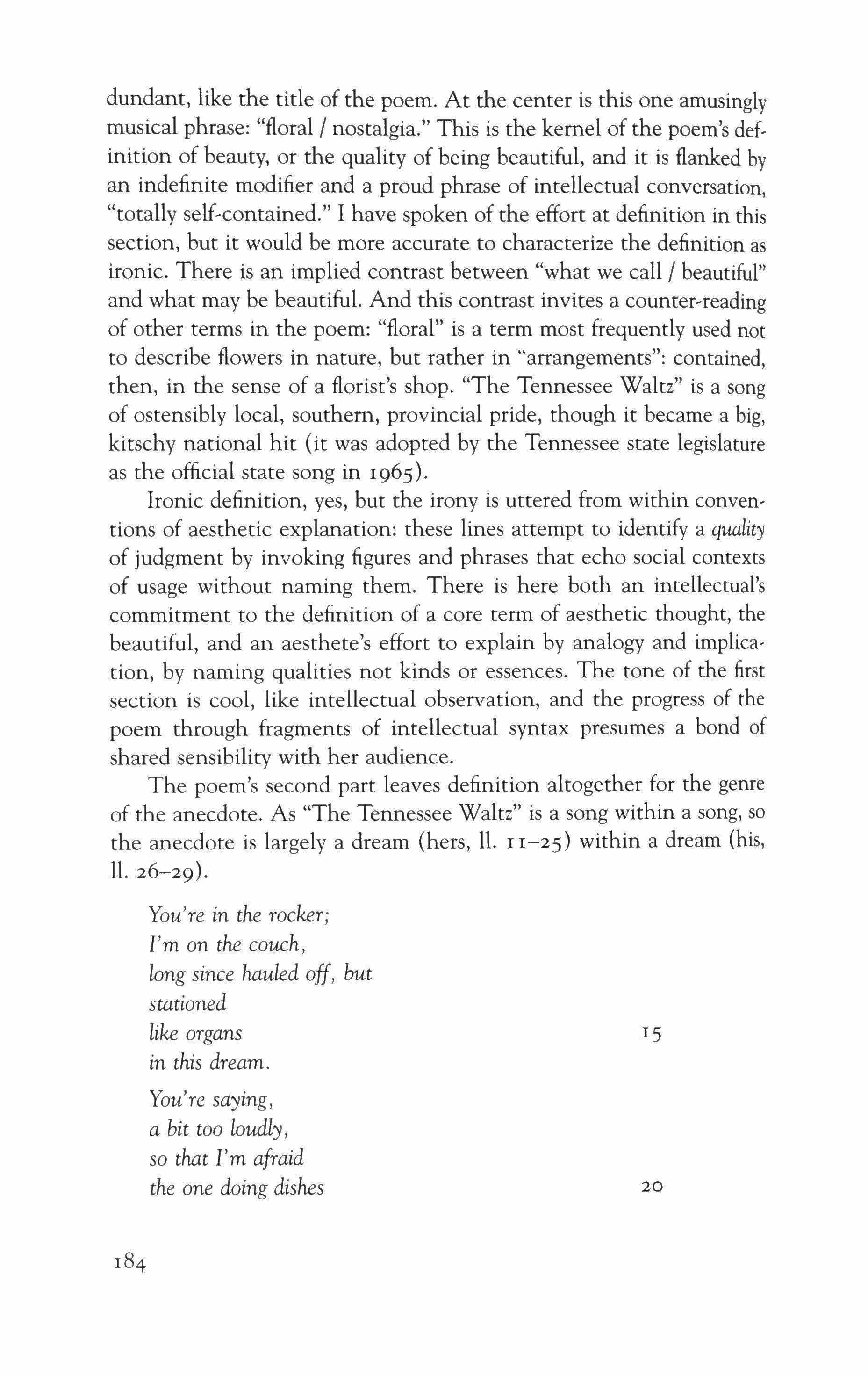
dundant, like the title of the poem. At the center is this one amusingly musical phrase: "floral/nostalgia." This is the kernel of the poem's definition of beauty, or the quality of being beautiful, and it is flanked by an indefinite modifier and a proud phrase of intellectual conversation, "totally self-contained." I have spoken of the effort at definition in this section, but it would be more accurate to characterize the definition as ironic. There is an implied contrast between "what we call / beautiful" and what may be beautiful. And this contrast invites a counter-reading of other terms in the poem: "floral" is a term most frequently used not to describe flowers in nature, but rather in "arrangements": contained, then, in the sense of a florist's shop. "The Tennessee Waltz" is a song of ostensibly local, southern, provincial pride, though it became a big, kitschy national hit (it was adopted by the Tennessee state legislature as the official state song in 1965).
Ironic definition, yes, but the irony is uttered from within conventions of aesthetic explanation: these lines attempt to identify a quality of judgment by invoking figures and phrases that echo social contexts of usage without naming them. There is here both an intellectual's commitment to the definition of a core term of aesthetic thought, the beautiful, and an aesthete's effort to explain by analogy and implication, by naming qualities not kinds or essences. The tone of the first section is cool, like intellectual observation, and the progress of the poem through fragments of intellectual syntax presumes a bond of shared sensibility with her audience.
The poem's second part leaves definition altogether for the genre of the anecdote. As "The Tennessee Waltz" is a song within a song, so the anecdote is largely a dream (hers, 11. 11-25) within a dream (his, 11. 26-29).
You're in the rocker; 1'm on the couch, long since hauled off, but stationed like organs in this dream. 15
You're saying, a bit too loudly, so that 1'm afraid the one doing dishes 20

(now dead) and the one in the bathroom (now gone) will overhear, why you first wanted me, when I wake up to hear you thrashing, yelling out in a dream
Her dream is the anxious one of having her love-life overheard, perhaps by parents. His dream is presumably also an anxious one, which she overhears and imagines as an explanation of desire, in that sense, another definition ("why you first wanted me"). Armantrout has constructed a series of rhymes about song, beauty, and erotic desire, though there is no technology of transport here. The dreams of the second part pass over each other like echoes, leaving very little behind. Both sections look back at an imagined original moment, when song, beauty, or desire seemed to begin.
This is an obviously post-Poundian poem: it juxtaposes coherent small units in the aspiration of constructing a large-order figure of a whole, a thematic complex that can go by the title "Overhearing." The order of the poem must come from the relations of the parts to one another. The thematic rhymes on hearing and doubling back are characteristic of Pound in the early Cantos. As one interprets Armantrout's poem, one hypothesizes an ideogram of the whole. But Pound continued in the passage on the swift perception of relations to speak of his own poetry as aspiring to the condition of "revelation." His sense was always that the ideogrammic method had the capacity to reveal divine presence in the mundane. Armantrout too works an ideogrammic method, but without any vestigial religiosity. She is thoroughly skeptical, secular. The form of the poem is simply constructed; it is not meant to represent an extraordinary structure of perception. It is so skeptical a poem that the speaker's dream is a little ridiculous: not just that she fears exposure before those who are dead and gone, but rather this phrase "like organs." She must mean sexual organs, since the topic is the origin of sexual desire, and that is a ludicrous image to contemplate.
The ironic reading that I proposed has a bearing on line 25: "why you first wanted me," in this context, awakens an implicit contrast between then, when the parents were living, and now, when they are

dead; between a time of being wanted and a time of not being wanted, or of being wanted differently. "The Tennessee Waltz" is a song recollecting a lost lover: "Now I know just how much I have lost." A cornball song keeps this topic in view from the outset. The poem ends with its only moving lines; its affective power is heard there, when the partner yells out in the night. For what, for whom? Who's been lost? She wasn't supposed to hear this. That voice in the night is from another poetic-the call of a less skeptical, more romantic art not addressed so directly to institutional intellectual culture.
Cleanth Brooks argued forcefully that a paraphrase of a poem, the thoughts expressed by it, can in no sense be taken as "the real core of meaning which constitutes the essence of the poem.,,26 He identified as essential the "structure" of the poem, and this was comprised of all the statements of the poem arrayed in relation to its speakers and figures.
The structure meant is a structure of meanings, evaluations, and interpretations; and the principle of unity which informs it seems to be one of balancing and harmonizing connotations, attitudes, and meanings. But even here one needs to make important qualifications: the principle is not one which involves the arrangement of the various elements into homogeneous groupings, pairing like with like. It unites the like with the unlike. It does not unite them, however, by the simple process of allowing one connotation to cancel out another nor does it reduce the contradictory attitudes to harmony by a process of subtraction. The unity is not a unity of the sort to be achieved by the reduction and simplification appropriate to an algebraic formula. It is a positive unity, not a negid b hi d h 27 ative; It represents not a rest ue ut an ac teve armony.
This totalizing account of the unity of poems reveals the idealism of the New Criticism: Brooks imagines ways in which poems reconcile differences that elsewhere go unreconciled. A poem makes a complex peace that cannot be reduced to a set of propositions. It promises a peace elsewhere. Something like this notion survives, because it is deeply true, even in poetry that is very far removed from the commitments of the New Critics.
In recent American avant-garde poems there is similarly a sense of a structure, or poem, behind the poem; the words on the page evoke a poem beyond the page, one that isn't there, strictly speaking. The or-
186

dinary way to refer to this phenomenon is to say that the words of a poem represent the poet's thoughts, but Brooks rightly discredited that view of the primacy of the paraphrase or the thoughts of a poem. The avant-garde poems I am thinking of-Armantrout's is one--construct gaps between lines, or visual stanzas, or even clauses. Such poems imply that there is a structure behind the text of the sort that Brooks describes, a coherence beyond the surface incoherence or disjunctive, ness of the words, lines, or stanzas on the page. This implication is very powerful in Pound's work, where one needs to infer an ideogram for each Canto: how does it cohere? Pound's enormous idealism rested on a faith that the structuring powers of the mind are universal, natural, and effective at identifying orders not marked by the conjunctions that conventionally indicate intellectual relations: if, then, but, because, for, although, however, and so on.
Recent poets have inherited that idealism, though without the psychological grounding of Pound. That is, a poet like Michael Palmer does not believe in universal, natural orders that can be inferred by most readers. Here are the first six lines of "Construction of the Museum":
In the hole we found beside the road something would eventually go
Names we saw spelled backward there
In the sand we found a tablet
In the hole caused by bombs which are smart we might find a hand28
It is not the case that Palmer leaves the construction of inference to each reader, though this naive sort of populism is often adduced to sup' port the poetic policies of Language writing. The lines I have cited pretty clearly invoke an alternative syntax behind these lines: 5
Something would eventually go in the hole we found beside the road.
We saw names spelled backwards there.
We found a tablet in the sand.
We might find a hand in the hole caused by bombs which are smart. Palmer's readers, as competent speakers of English, know the syntactic
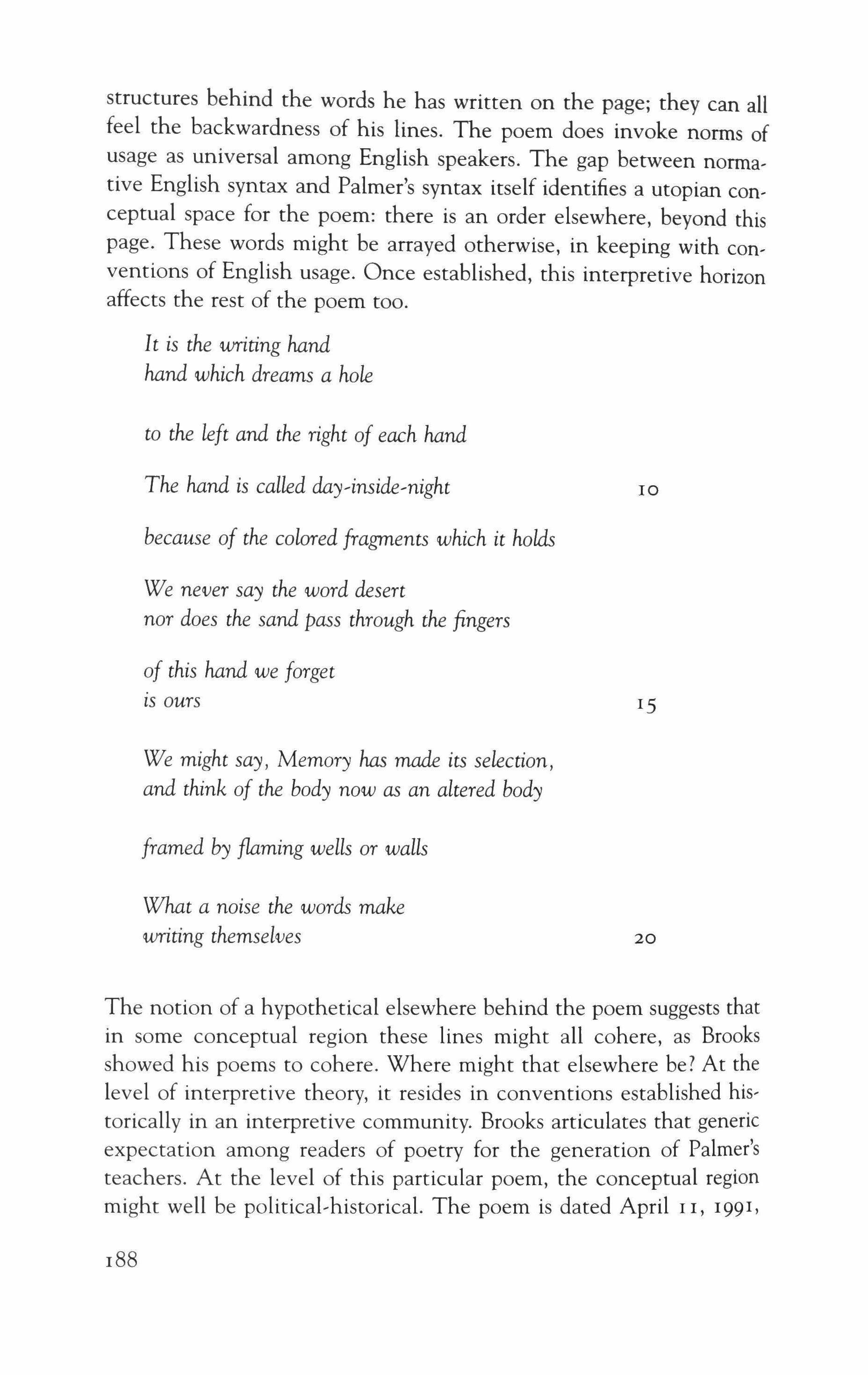
structures behind the words he has written on the page; they can all feel the backwardness of his lines. The poem does invoke norms of usage as universal among English speakers. The gap between normative English syntax and Palmer's syntax itself identifies a utopian conceptual space for the poem: there is an order elsewhere, beyond this page. These words might be arrayed otherwise, in keeping with conventions of English usage. Once established, this interpretive horizon affects the rest of the poem too.
It is the uniting hand hand which dreams a hole
to the left and the right of each hand
The hand is called day-inside-night 10
because of the colored fragments which it holds
We never say the word desert nor does the sand pass through the fingers of this hand we forget is ours 15
We might say, Memory has made its selection, and think of the body now as an altered body
framed by flaming wells or walls
What a noise the words make uniting themselves 20
The notion of a hypothetical elsewhere behind the poem suggests that in some conceptual region these lines might all cohere, as Brooks showed his poems to cohere. Where might that elsewhere be? At the level of interpretive theory, it resides in conventions established historically in an interpretive community. Brooks articulates that generic expectation among readers of poetry for the generation of Palmer's teachers. At the level of this particular poem, the conceptual region might well be political-historical. The poem is dated April I I, 1991,
188

during Desert Storm. These were the days when General Schwarzkopf proudly displayed the results of American smart bombs in Iraq, when body parts might well be found in bomb craters, when flaming oil wells blackened the skies. The poem clearly refers to these features of American political history.
Or the poem might cohere on a level of allegorical significance, since Palmer does characteristically invoke an allegorical regime when he says that names are given for reasons (11. r c--r r ). Repeatedly in Palmer's poems allegorical phrases are proposed as names of ambiguous figures; the suggestion is that enigmas are constantly on the horizon of poetry, and that naming entails them. Along this axis of interpretation, the assignment of significance to the signs of the poem-most obviously, the hand-would govern the overall coherence of the poem's structure. This line of interpretation might help to explain the transition from smart bombs (1. 6) to the writing hand (1. 7): the apparently self-guiding systems of the bomb and the writing hand of the author both focus on agency; the deployers of the bomb are concealed behind a notion of technological smartness, and the maker of this poem is the most proximate agent here. The predicate of the writer is to dream (1. 8), though he claims that the words write themselves (11. 19-20). In an allegory where body parts are named for explicit reasons, one expects maximal authorial agency and accountability, but the poem focuses on lapses of accountability. "We never say" and "we forget" are phrases that identify failures of responsibility. What might be said and remembered is a common sense of mortality and humility, marked by the traditional figure of desert sands slipping through the fingers. But instead subjunctive predicates-"We might say and think" (11. 16-I7)-follow and articulate the euphemisms that displace responsibility onto "Memory." Allegory comes to express not an intensification but an evasion of significance.
The poem stands as a wish for another poem: what if this poem cohered, as poems traditionally have done; what would that coherence signify as a path of thinking? How would we think, if this poem were the expression of a comprehensive resolution? One cannot easily answer these questions, exactly because Palmer represents, in a fashion Valery would understand, what seem plural ways of thinking. He has not drawn the political-historical and the allegorical interpretive perspectives into a harmony, as Brooks would say; that was the project of an earlier generation. The relations between these perspectives are not resolved, and that presents an intellectual challenge beyond any of the

other poems discussed. I know no name for the "structure" of this poem, in Brooks's sense, though in the body of its language I can feel the power of its structure. Palmer is at the edge of conventions of thinking, insisting on the distinct intellectual resources of the poetic art, which seem to have to do with resistance to resolution. My notion of a hypothetical coherence behind an avant-garde poem is entirely in accord with Anglo-American and European modernist aspirations. Caillois was close to Pound in more than just his terminology when he explained the structure of lyrical thinking:
So it is that several irregular rocks put together carelessly leave a certain gap between them, the shape precisely defined, such that the shape of the rock that would fill this interstice is strictly determined in advance, the determinism of this space being as rigorous as any other. Similarly, it seems that an accumulation of convergent representations predetermines all or part of the conditions that the representations they need to present a flawless coherence will have to meet. It follows that this representation exists virtually because of the existence of the previous ones, and at the first contingent prompting, passing from potential to actual, it '11 If 29 Wl impose itse on one s consciousness.
The value of lyrical thinking, and of poetry in particular, is to lead consciousness toward ever more comprehensive ideograms, or ideas of order and coherence.Y Although Caillois uses a Freudian notion of overdetermination and autobiography to explicate ideograms, he did believe, as Pound did too, that ideograms are universal and based on biological nature. Those are not my beliefs, but I do value the virtual poetry we strain toward as readers, and I look to poetry for an extension of conventional patterns of thinking.
Poetry is often spoken of as the most personal genre. Sappho, at the outset of lyric, is certainly personal: she gives a concrete representation of the feelings of her body and no one else's. The genre of confessional poetry is understood to have its roots in this central and archaic feature of lyric poetry. This is also one of the acknowledged links between postwar and Romantic poetry. But there is a sense too in which poems are understood as inherently representative of other persons, of some general subjecthood. Poets know this, as readers do, and they have no trouble invoking claims to general representativity. Even Shelley easily speaks in a universalizing idiom in "To a Skylark":
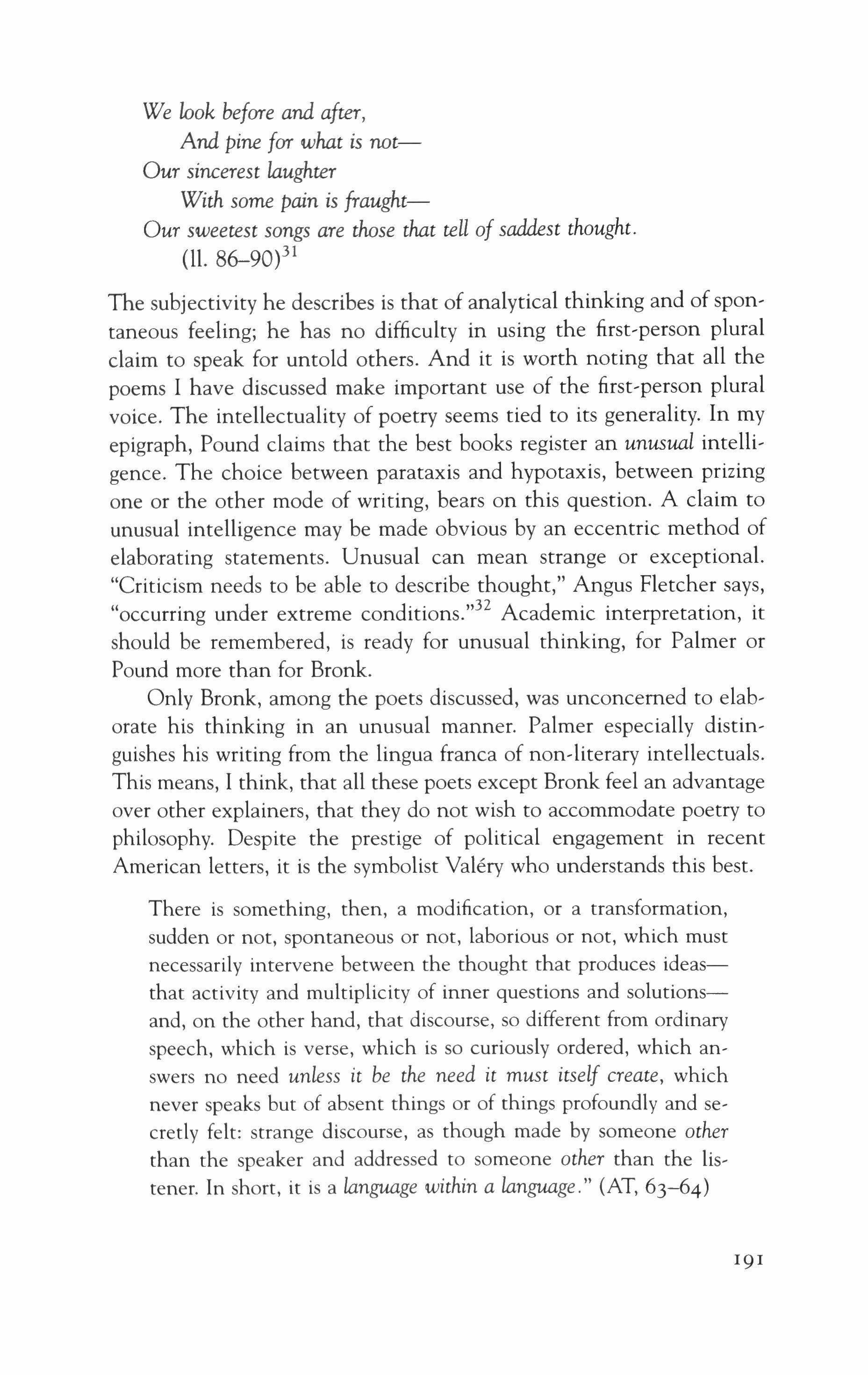
We look before and after, And pine for what is notOur sincerest laughter
With some pain is fraughtOur sweetest songs are those that tell of saddest thought. (11. 86-90)31
The subjectivity he describes is that of analytical thinking and of spontaneous feeling; he has no difficulty in using the first-person plural claim to speak for untold others. And it is worth noting that all the poems I have discussed make important use of the first-person plural voice. The intellectuality of poetry seems tied to its generality. In my epigraph, Pound claims that the best books register an unusual intelligence. The choice between parataxis and hypotaxis, between prizing one or the other mode of writing, bears on this question. A claim to unusual intelligence may be made obvious by an eccentric method of elaborating statements. Unusual can mean strange or exceptional. "Criticism needs to be able to describe thought," Angus Fletcher says, "occurring under extreme conditions.Y'' Academic interpretation, it should be remembered, is ready for unusual thinking, for Palmer or Pound more than for Bronk.
Only Bronk, among the poets discussed, was unconcerned to elaborate his thinking in an unusual manner. Palmer especially distinguishes his writing from the lingua franca of non-literary intellectuals. This means, I think, that all these poets except Bronk feel an advantage over other explainers, that they do not wish to accommodate poetry to philosophy. Despite the prestige of political engagement in recent American letters, it is the symbolist Valery who understands this best.
There is something, then, a modification, or a transformation, sudden or not, spontaneous or not, laborious or not, which must necessarily intervene between the thought that produces ideasthat activity and multiplicity of inner questions and solutionsand, on the other hand, that discourse, so different from ordinary speech, which is verse, which is so curiously ordered, which answers no need unless it be the need it must itself create, which never speaks but of absent things or of things profoundly and secretly felt: strange discourse, as though made by someone other than the speaker and addressed to someone other than the listener. In short, it is a language within a language." (AT, 63-64)
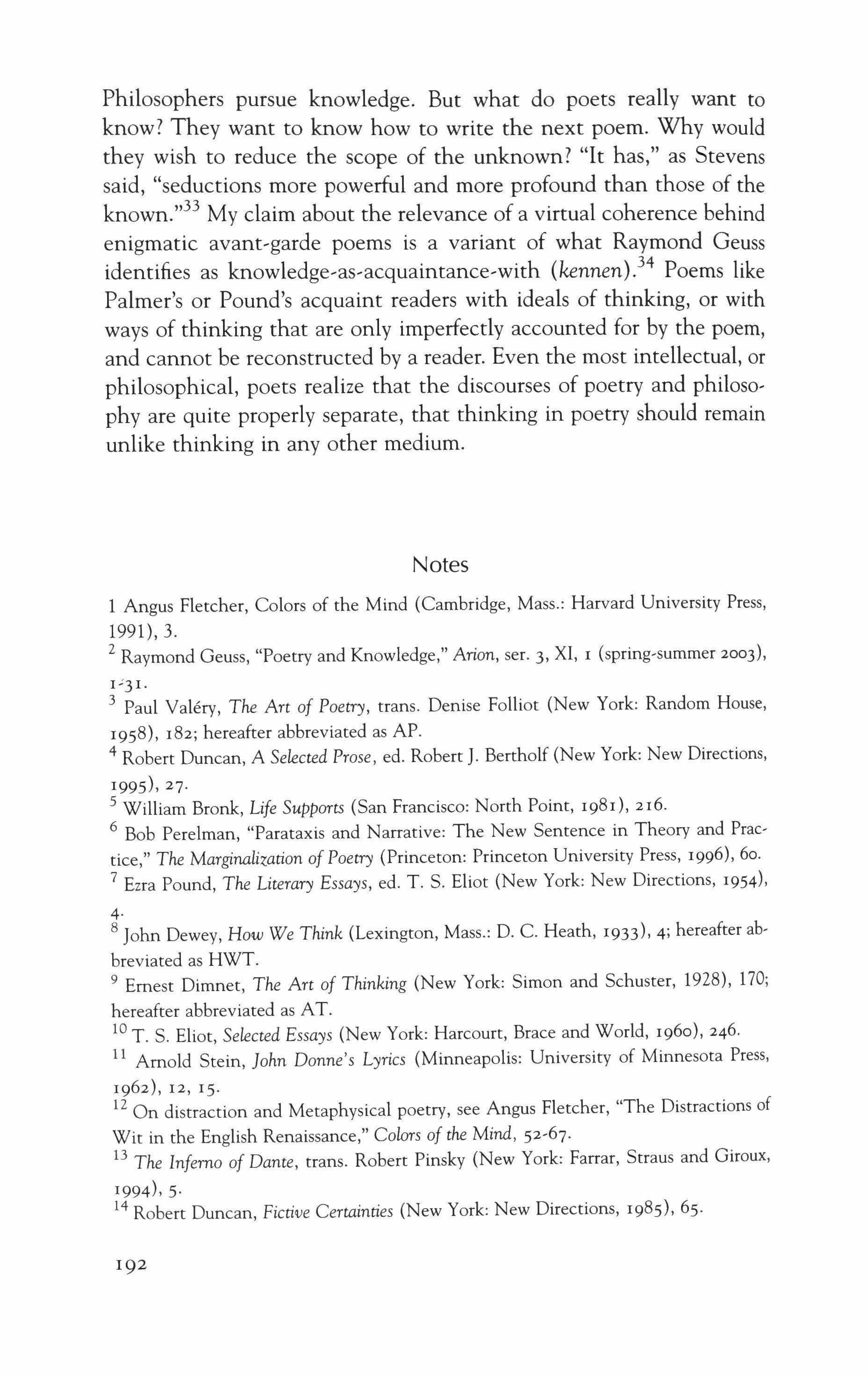
Philosophers pursue knowledge. But what do poets really want to know? They want to know how to write the next poem. Why would they wish to reduce the scope of the unknown? "It has," as Stevens said, "seductions more powerful and more profound than those of the known.,,33 My claim about the relevance of a virtual coherence behind enigmatic avant-garde poems is a variant of what Raymond Geuss identifies as knowledge-as-acquaintance-with (kennen}.34 Poems like Palmer's or Pound's acquaint readers with ideals of thinking, or with ways of thinking that are only imperfectly accounted for by the poem, and cannot be reconstructed by a reader. Even the most intellectual, or philosophical, poets realize that the discourses of poetry and philosophy are quite properly separate, that thinking in poetry should remain unlike thinking in any other medium.
Notes
1 Angus Fletcher, Colors of the Mind (Cambridge, Mass.: Harvard University Press, 1991),3.
2 Raymond Geuss, "Poetry and Knowledge," Arion, ser. 3, XI, I (spring-summer 2003), 1;3I.
3 Paul Valery, The Art of Poetry, trans. Denise Folliot (New York: Random House, 1958), 182; hereafter abbreviated as AP.
4 Robert Duncan, A Selected Prose, ed. Robert J. Bertholf (New York: New Directions, 1995), 27·
5 William Bronk, Life Supports (San Francisco: North Point, 1981), 216.
6 Bob Perelman, "Parataxis and Narrative: The New Sentence in Theory and Practice," The Marginalization of Poetry (Princeton: Princeton University Press, 1996), 60.
7 Ezra Pound, The Literary Essays, ed. T. S. Eliot (New York: New Directions, 1954), 4·
8 John Dewey, How We Think (Lexington, Mass.: D. C. Heath, 1933),4; hereafter abbreviated as HWT.
9 Ernest Dimnet, The Art of Thinking (New York: Simon and Schuster, 1928), 170; hereafter abbreviated as AT.
10 T. S. Eliot, Selected Essays (New York: Harcourt, Brace and World, 1960),246.
11 Arnold Stein, John Donne's Lyrics (Minneapolis: University of Minnesota Press, 1962), 12, IS.
12 On distraction and Metaphysical poetry, see Angus Fletcher, "The Distractions of Wit in the English Renaissance," Colors of the Mind, 52-67.
13 The Inferno of Dante, trans. Robert Pinsky (New York: Farrar, Straus and Giroux, 1994), 5·
14 Robert Duncan, Fictive Certainties (New York: New Directions, 1985),65.

15 [orie Graham, The Errancy (New York: Ecco, 1997), 20-22.
16 Ezra Pound, Selected Prose, ed. William Cookson (New York: New Directions, 1973), 374·
17 See Donald Davie, "Ideas in The Cantos," Ezra Pound (Chicago: University of Chicago Press, 1982).
18 Ernest Fenollosa, The Chinese Written Character as a Medium for Poetry, ed. Ezra Pound (San Francisco: City Lights, 1964), 28.
19 Linda Welshimer Wagner, ed., Interviews with William Carlos Williams (New York: New Directions, 1976),53.
20 Ezra Pound, Guide to Kulchur (New York: New Directions, 1938), 5I-
21 Fenollosa, 28.
22 Ezra Pound, The Literary Essays, 52.
23 Fenollosa, 7.
24 Fenollosa, 12.
25 Rae Armantrout, Veil (Middletown, CT: Wesleyan University Press, 2001).
26 Cleanth Brooks, "The Heresy of Paraphrase," The Well Wrought Urn (New York: Harcourt, Brace and World, 1947), 197.
27 Brooks, 195.
28 Michael Palmer, The Lion Bridge (New York: New Directions, 1998),214.
29 Roger Caillois, The Necessity of Mind, trans. Michael Syrotinski (Venice, CA: Lapis Press, 1990),91.
30 Caillois, 64, 94.
31 Shelley's Poetry and Prose, ed. Donald H. Reiman and Sharon B. Powers (New York: Norton, 1977),229.
32 Fletcher, 113.
33 Wallace Stevens, Opus Posthumous, ed. Samuel French Morse (New York: Knopf, 1957), 228.
34Geuss, 2; see also Glenn Most, "Poetry, Knowledge, and Dr. Geuss," Arion, ser. 3, XI,
2 (fall 2003), 197-201.
193
Christian Wiman
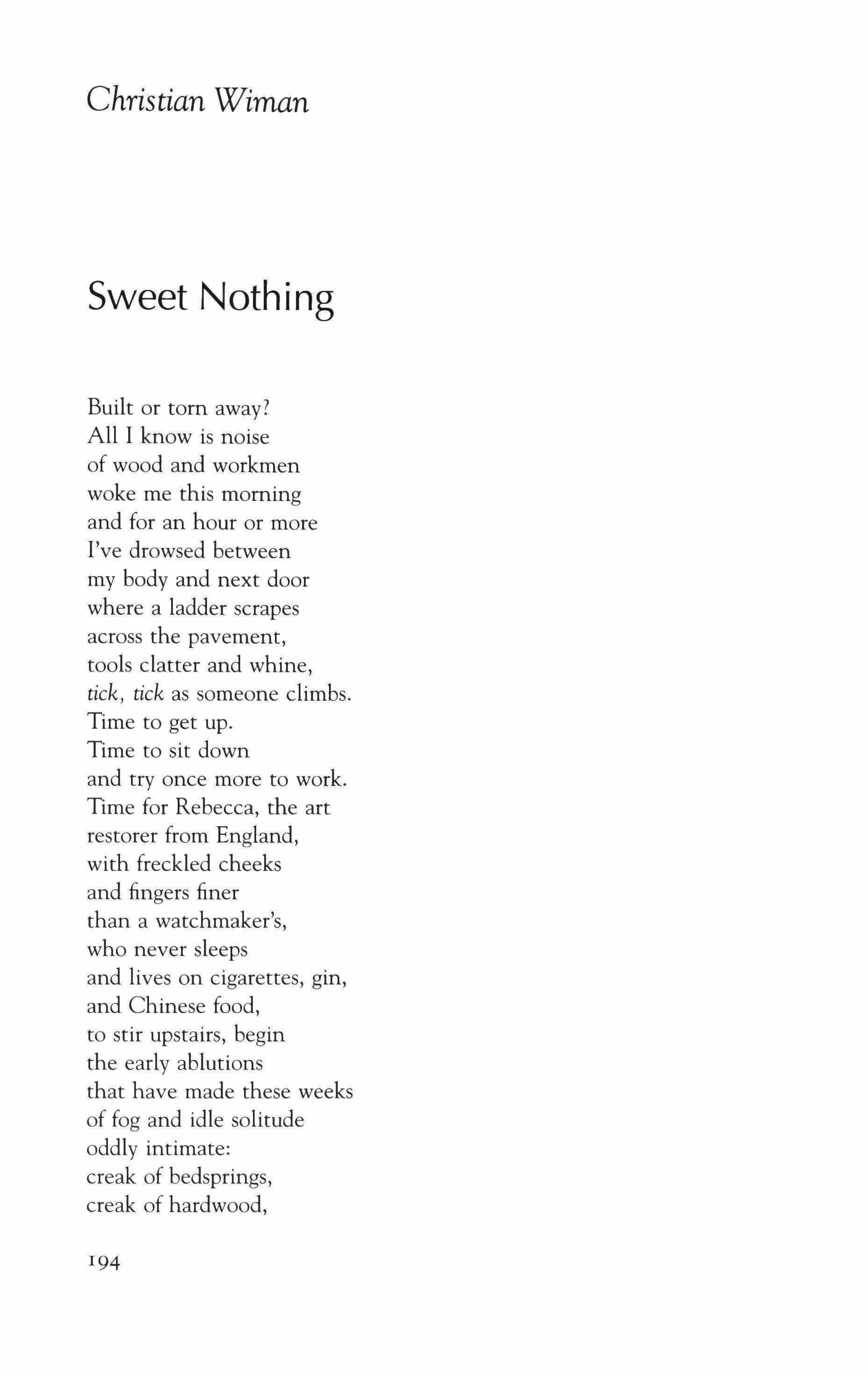
Sweet Nothing
Built or torn away?
All I know is noise of wood and workmen woke me this morning and for an hour or more I've drowsed between my body and next door where a ladder scrapes across the pavement, tools clatter and whine, tick, tick as someone climbs. Time to get up. Time to sit down and try once more to work. Time for Rebecca, the art restorer from England, with freckled cheeks and fingers finer than a watchmaker's, who never sleeps and lives on cigarettes, gin, and Chinese food, to stir upstairs, begin the early ablutions that have made these weeks of fog and idle solitude oddly intimate: creak of bedsprings, creak of hardwood,
194

stuck doors and drawers and the rusty sound of faucets coughing on, water quicksilvering down white shoulders and thighs into the pipes around me like a teasing dream of rain; and the silence then as she chooses what to wear: the pale blouse with its paler plunge, the flaxen dress that matches her hair, click, click of her heels over the floor, out the door, up Clayton Street.
But not yet, not quite yet I close my eyes and let myself recede again into the pillows and sheets, inflections and directives in a language I can't place, pink hues and pigments of Rebecca's face at my door last night as she smiled, or tried to, held out her fine-boned hand the streetlight seemed to shine through, and said, "It's time we met."
The salt fog poured off the water as we walked, formed and tore Sutro tower, the bridge's blinking girders into the moldy keeps and closes of Suffolk, cathedraled Cambridge,
195
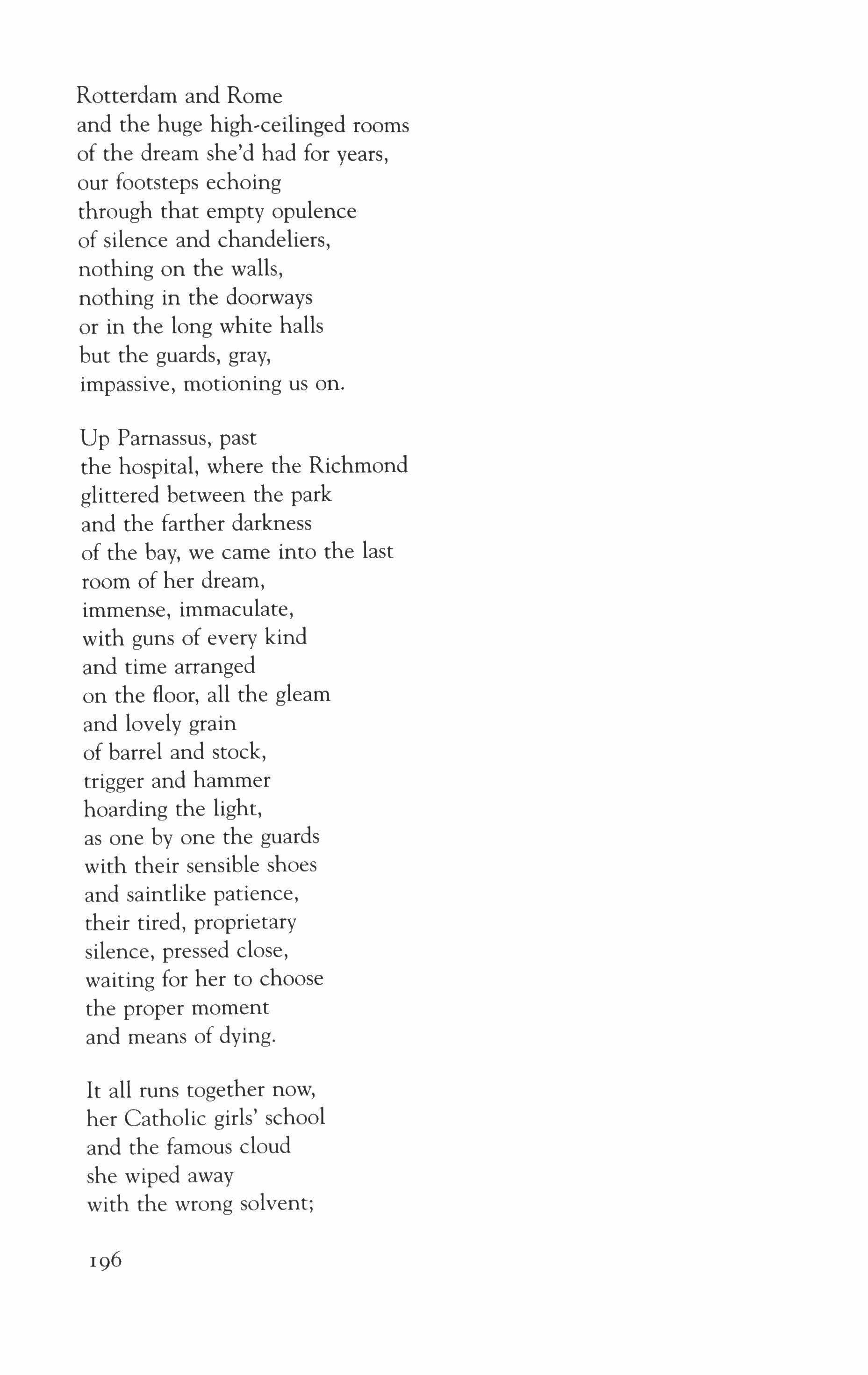
Rotterdam and Rome and the huge high-ceilinged rooms of the dream she'd had for years, our footsteps echoing through that empty opulence of silence and chandeliers, nothing on the walls, nothing in the doorways or in the long white halls but the guards, gray, impassive, motioning us on.
Up Pamassus, past the hospital, where the Richmond glittered between the park and the farther darkness of the bay, we came into the last room of her dream, immense, immaculate, with guns of every kind and time arranged on the floor, all the gleam and lovely grain of barrel and stock, trigger and hammer hoarding the light, as one by one the guards with their sensible shoes and saintlike patience, their tired, proprietary silence, pressed close, waiting for her to choose the proper moment and means of dying.
It all runs together now, her Catholic girls' school and the famous cloud she wiped away with the wrong solvent;

the erstwhile fiance for whom she'd felt a long elegiacal tenderness in lieu of love and John Constable, of Suffolk, who thought no ambition too high for the plain stiles and stumps of that place, no feeling too intense or complex for its mossed waterwheels and random hayricks, its mizzling, mortared sky. "What in the world," an acolyte asked, "did you mix these colors with?" "Brains," Constable's reply.
How lovely her laughter, unguarded, delighted, as if her own mind and what it contained had surprised her, as when, crossing Ninth, linking her arm in mine, from deep in the dream she suddenly recited, "Largo Star, Long-barreled Luger, Rast-Gasser revolver, Parabellum Beretta, American Savage." And how subdued, almost confused she became in the moment just after, her arm drawn back, the guards near, circumspect, and a feeling not of fear, you wouldn't call it fear, exactly, and not dread,
197
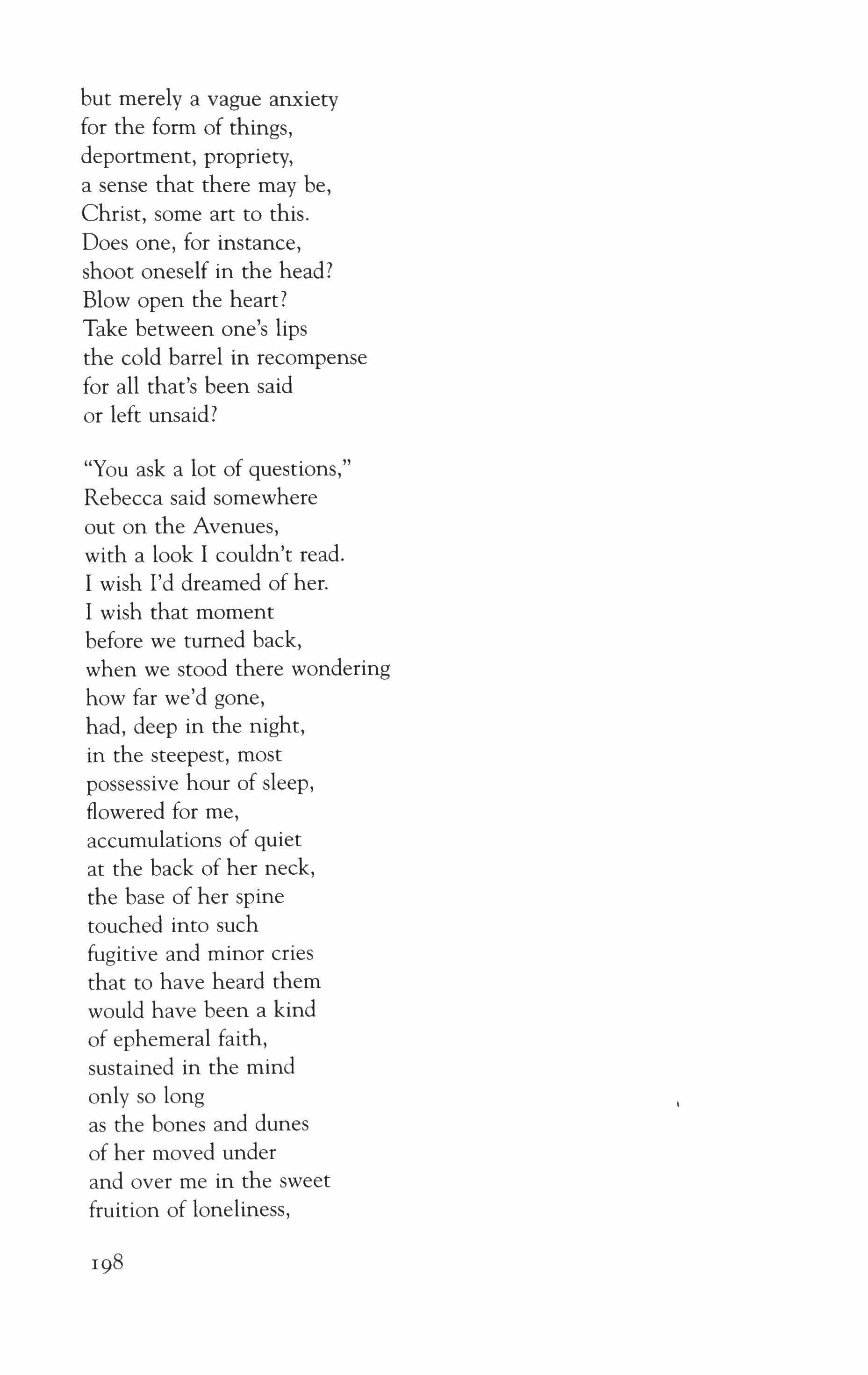
but merely a vague anxiety for the form of things, deportment, propriety, a sense that there may be, Christ, some art to this. Does one, for instance, shoot oneself in the head? Blow open the heart? Take between one's lips the cold barrel in recompense for all that's been said or left unsaid?
"You ask a lot of questions," Rebecca said somewhere out on the Avenues, with a look 1 couldn't read. 1 wish I'd dreamed of her. 1 wish that moment before we turned back, when we stood there wondering how far we'd gone, had, deep in the night, in the steepest, most possessive hour of sleep, flowered for me, accumulations of quiet at the back of her neck, the base of her spine touched into such fugitive and minor cries that to have heard them would have been a kind of ephemeral faith, sustained in the mind only so long as the bones and dunes of her moved under and over me in the sweet fruition of loneliness,
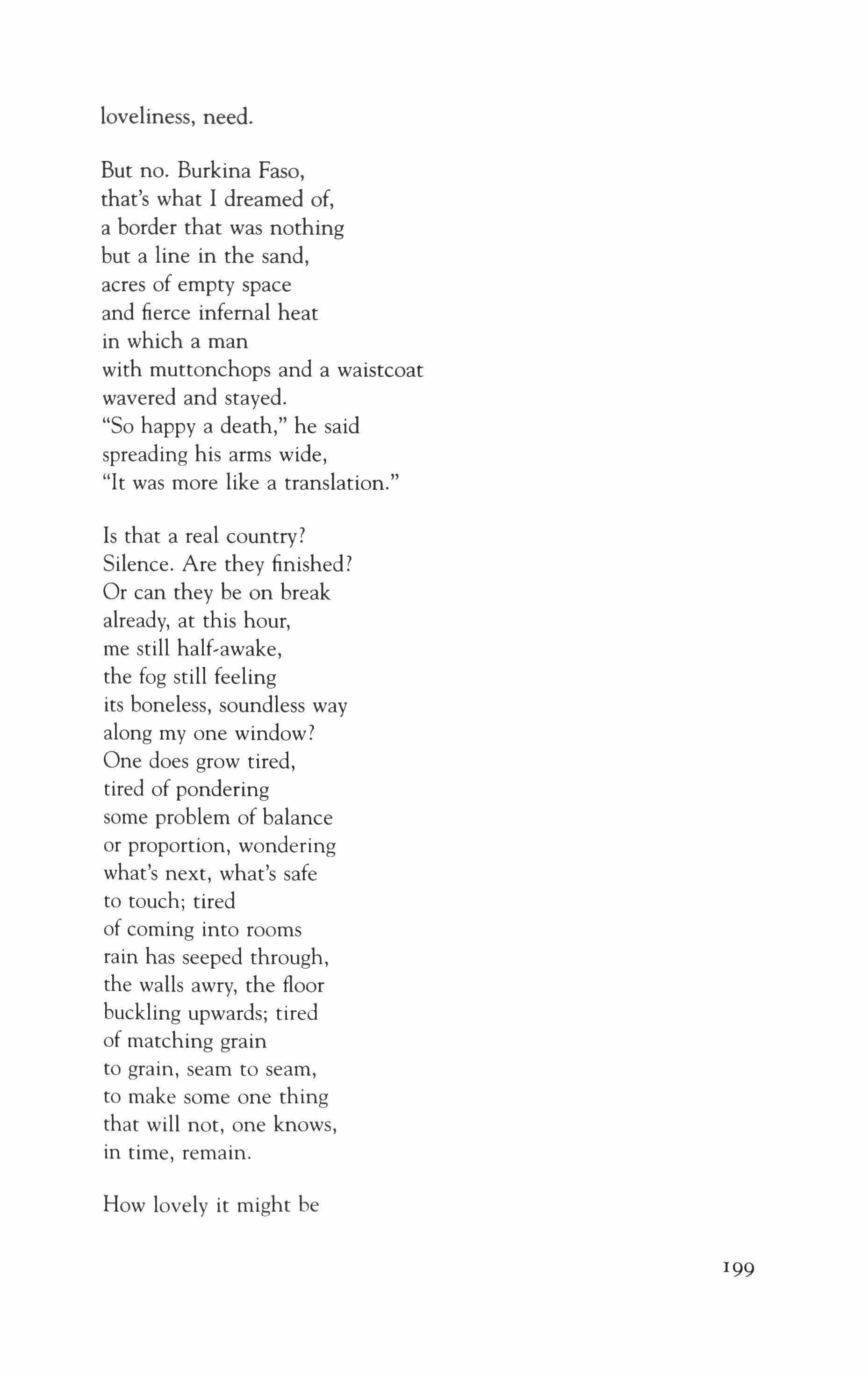
loveliness, need.
But no. Burkina Faso, that's what I dreamed of, a border that was nothing but a line in the sand, acres of empty space and fierce infernal heat in which a man with muttonchops and a waistcoat wavered and stayed. "So happy a death," he said spreading his arms wide, "It was more like a translation."
Is that a real country? Silence. Are they finished? Or can they be on break already, at this hour, me still half-awake, the fog still feeling its boneless, soundless way along my one window?
One does grow tired, tired of pondering some problem of balance or proportion, wondering what's next, what's safe to touch; tired of coming into rooms rain has seeped through, the walls awry, the floor buckling upwards; tired of matching grain to grain, seam to seam, to make some one thing that will not, one knows, in time, remain.
How lovely it might be
199
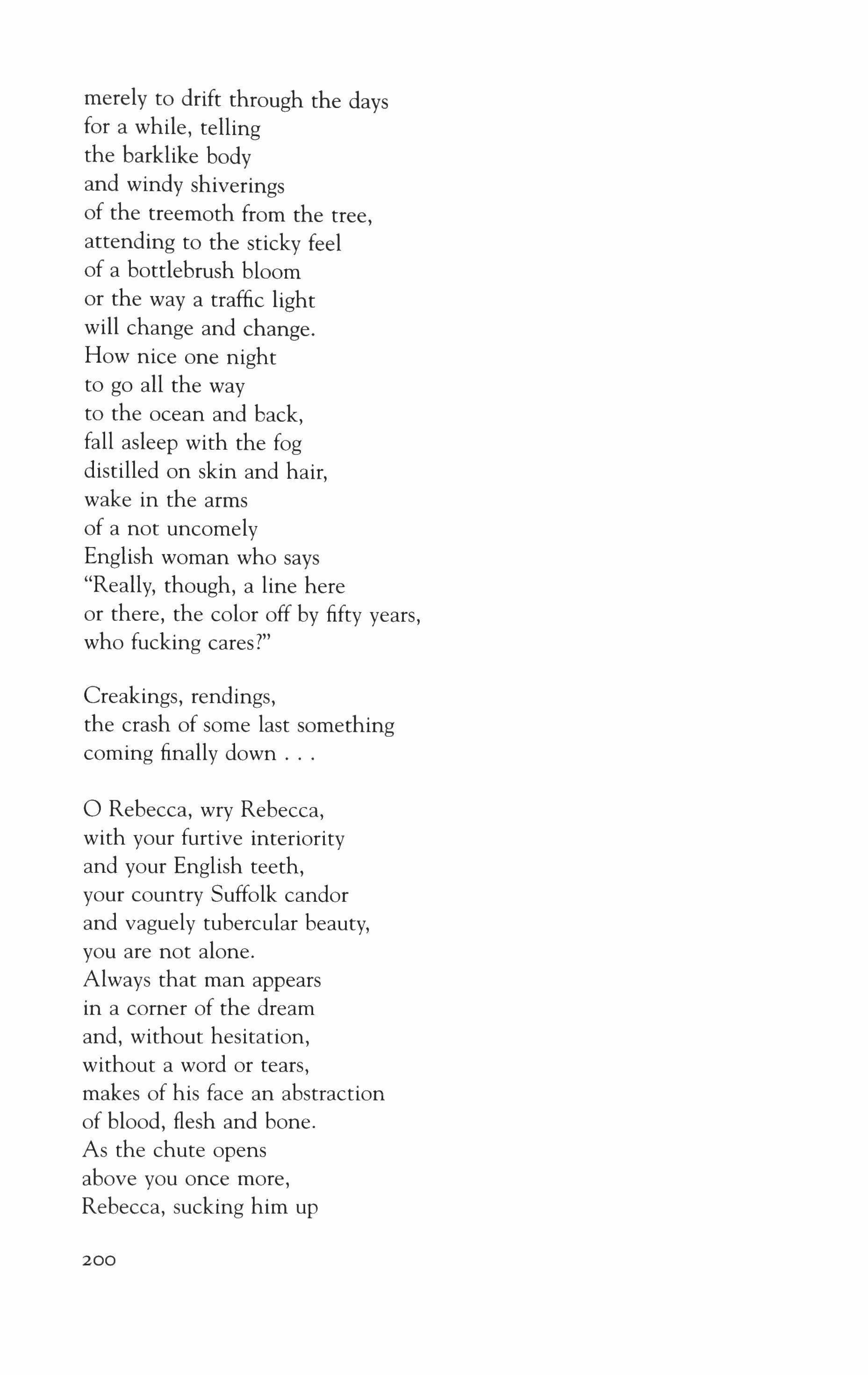
merely to drift through the days for a while, telling the barklike body and windy shiverings of the treemoth from the tree, attending to the sticky feel of a bottlebrush bloom or the way a traffic light will change and change. How nice one night to go all the way to the ocean and back, fall asleep with the fog distilled on skin and hair, wake in the arms of a not uncomely English woman who says "Really, though, a line here or there, the color off by fifty years, who fucking cares?"
Creakings, rendings, the crash of some last something coming finally down
o Rebecca, wry Rebecca, with your furtive interiority and your English teeth, your country Suffolk candor and vaguely tubercular beauty, you are not alone. Always that man appears in a corner of the dream and, without hesitation, without a word or tears, makes of his face an abstraction of blood, flesh and bone. As the chute opens above you once more, Rebecca, sucking him up
200

into the ceiling, laugh, because what else can you do when walls dissolve, a floor widens to horizon, and all the guards, quacking like ducks, take out their feather dusters and tidy up the sky?
Don't move, Rebecca. It's late, but there is still time. As the fog disperses, as the jokes and curses come almost into your consciousness, and the hammer's makeshift useful music is briefly the dream it ends, stay here one moment more, letting the morning's mild explicit light explore the curve of one calf, little ridges of ribcage and clavicle, declivities of shoulder and throat; all the lines and all the little pores of your face, the faint capillarial glow of your eyelids, which slowly open now, Rebecca, sweet Rebecca, as I whisper in your ear Bougouriba, Kossi, Yatenga, Seno, Bam.
201
Anne Winters

The Grass Grower
In 1979, a woman who lived in West Harlem took a snapshot of a man who grew grass in the courtyard, her father-in-law. In a summer hat, the thin face acute, serene As at the first time
I glimpsed his counter and sign, JOEL HARMON, RADIO REPAIRS, propped in or part of the pawnshop's mixed economy, so those last evenings you seemed to be simply conducting, in silence, your life.
-My brow pressed to the shop-pane, the shade of the cast iron balls and Amsterdam's carhoms, a dog somewhere snapping and whininginside, arms angled strangely, you were prising a cathedral radio's cabinet from its mounting. It was 1949. I was in the sixth grade, and slow to go home. I'd drift through the shop you kept alone at that hour, or climb on a stool and listen; for we talked a lot, in that early time, or you did. Flipping knobs, halfeffacing your cool inflections with QXR or local Harlem "race-music" Shawville, a town west of Selma, you named as a birthplace, and Georgia, where you were married. "Alabama's no place for the black man" (you said) "but a Jim Crow town in North Georgia is hurtful to man, displeasing to God."
202
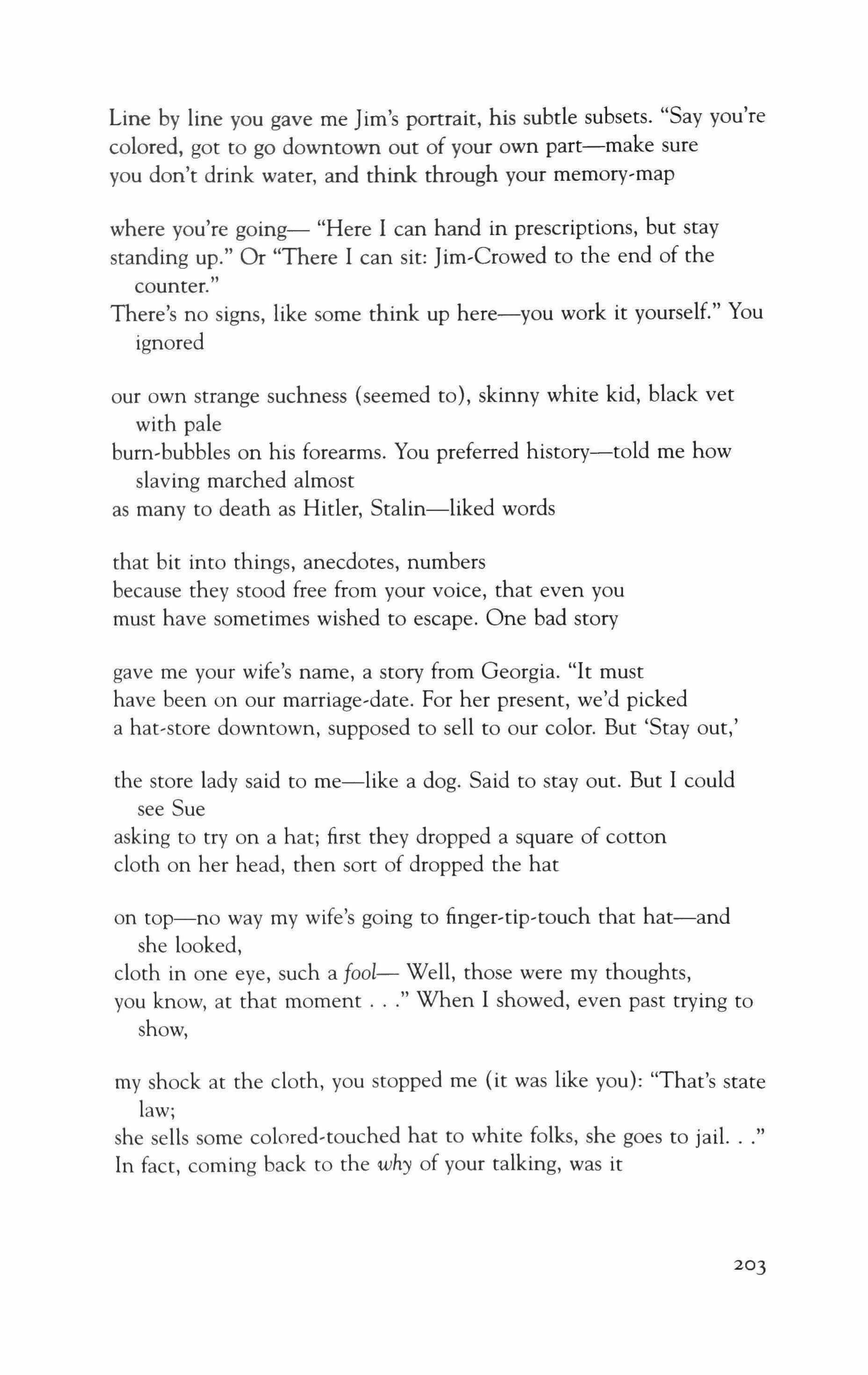
Line by line you gave me Jim's portrait, his subtle subsets. "Say you're colored, got to go downtown out of your own part-make sure you don't drink water, and think through your memory-map
where you're going- "Here I can hand in prescriptions, but stay standing up." Or "There I can sit: Jim-Crowed to the end of the counter."
There's no signs, like some think up here-you work it yourself." You ignored
our own strange suchness (seemed to), skinny white kid, black vet with pale burn-bubbles on his forearms. You preferred history-told me how slaving marched almost as many to death as Hitler, Stalin-liked words that bit into things, anecdotes, numbers because they stood free from your voice, that even you must have sometimes wished to escape. One bad story
gave me your wife's name, a story from Georgia. "It must have been on our marriage-date. For her present, we'd picked a hat-store downtown, supposed to sell to our color. But 'Stay out,'
the store lady said to me-like a dog. Said to stay out. But I could see Sue asking to tryon a hat; first they dropped a square of cotton cloth on her head, then sort of dropped the hat
on top-no way my wife's going to finger-tip-touch that hat-and she looked, cloth in one eye, such a [001- Well, those were my thoughts, you know, at that moment When I showed, even past trying to show, my shock at the cloth, you stopped me (it was like you): "That's state law; she sells some colored-touched hat to white folks, she goes to jail. " In fact, coming back to the why of your talking, was it
203
for transmission? Already I sensed your assignment: to order your past, live your life as history, number-to name the effectual powers. "When they called me up, I found out Jim ran the army " Like my father,
you'd no word for combat for me, but one day coming in-you were on the phone, back turned=-I heard the long syllables that came back years later cycling north of the Seine through the hay-ricks and spires of Amien, Rouen
Of course I could see through your shirt your ribbed, olive-drab undershirt, twin to my father's-why, he'd done boot-camp in Georgia, I'd lived there. But I never saw that, not being my father, you couldn't know that, or that I could speak up and tell you. So I'd sensed, by then, that Jim, and not you, was the subject; my father had never met Jim. But I liked transmission, it was something
I could be there for. And so, for years as it seemed, I heard you tell how, on the boat back, after a poker game, you made the resolve not to go below Mason-Dixon again-"COLORED FOR SWEEP�UP ONLY"- And I kept it,
Jim made me a grass-widow man here in Harlem. I wasn't about to go South again after-the Army; and Sue So I never raised my own kids. But how could I go back, you tell me. Just tell me that thing."

2.
I had something else on my mind, in the late fifties and sixties, than you. I was scared--of my childhood, of Harlem, your own aridity; your all-roo-imaginable ironies, too, on my sporadic
204

Civil,Rights doings. So I can't guess what you felt, when the events you'd schooled your life toward took on their dates and place names. It seems eerie, today, as Harlem outsoars Bangladesh in early deaths, rediscovers TB--that the year I met you again in Walgreens, and our late visits began, it might have seemed Jim could someday slip from the world Your son, his wife June, had moved to New York. She often dropped in; you'd a super's apartment just off Columbus, and had gone all quiet. I'd sit and watch you boil water in a skillet ("It's faster") for coffee, on your pre-war range, your profile against a seedy screen frayed thin at the perimeter
A few words about your grandson, or the grass'growing. A sugar-bowl full of seed, a trowel, the nightly waterings It was strange. "Where do you get the grass-seed?" (Politely.)
Your far,off smile (you wore glasses, now): "I get it from the grass."
As if, your histories fallen away, each practice of the present brimmed up in you silently-when June came, you lifted the kitchen chairs into the court "to enjoy the evening." But she, who was pregnant again, preferred to walk up and down, while you cooled the concrete before her with hose,spray. You'd fountained its cracks and random fissures with grass'tufts untrimmed, fantastic, running to seed
I tilted my chair back. Night had fallen. Your glasses were dim octagonals in the are, light that fell through the cyclone fencing. Past two buildings that lay in rubble (the long slide had begun), in the next block, we could glimpse
205

the high glare of downtown, a few outscaled towers, and, nearer, the gray lights of stacked stairwell windows. From the far side of your nature, no word arrived Only the night watering
went on, sparkling tracings as you came forward, your back to the streetlamp, your freshets waist-high in the darkness, thumbmisting the tips of the grasses with idle tendrils of light.
206
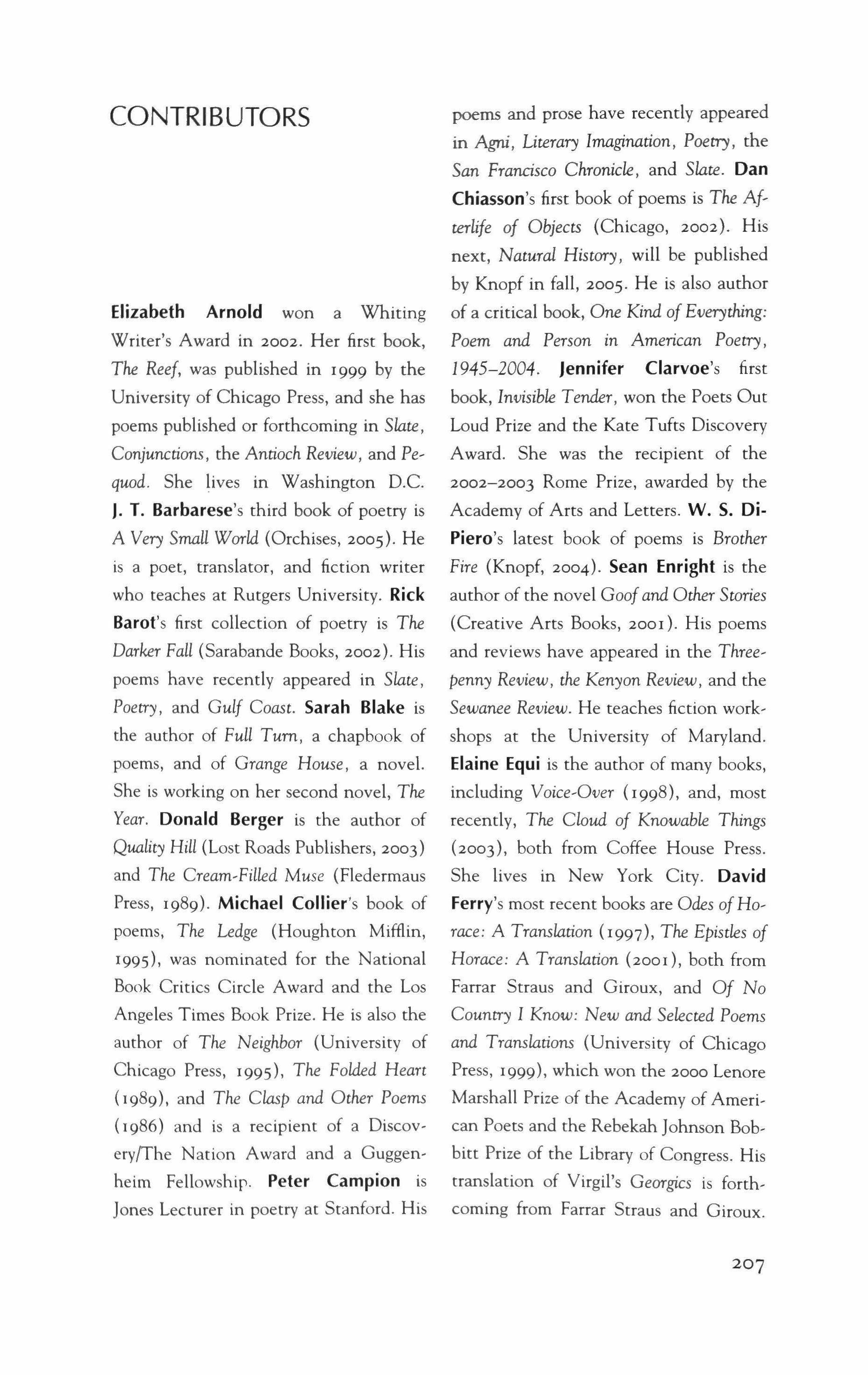
CONTRIBUTORS
poems and prose have recently appeared in Agni, Uterary Imagination, Poetry, the San Francisco Chronicle, and Slate. Dan Chiasson's first book of poems is The Ar terlife of Objects (Chicago, 2002). His next, Natural History, will be published by Knopf in fall, 2005. He is also author Elizabeth Arnold won a Whiting of a critical book, One Kind ofEverything:
Writer's Award in 2002. Her first book, The Reef, was published in 1999 by the University of Chicago Press, and she has poems published or forthcoming in Slate, Conjunctions, the Antioch Review, and Pequod. She lives in Washington D.C.
J. T. Barbarese's third book of poetry is A Very SmaU World (Orchises, 2005). He is a poet, translator, and fiction writer who teaches at Rutgers University. Rick Barot's first collection of poetry is The Darker Fall (Sarabande Books, 2002). His poems have recently appeared in Slate, Poetry, and Gulf Coast. Sarah Blake is the author of Full Tum, a chapbook of poems, and of Grange House, a novel. She is working on her second novel, The Year. Donald Berger is the author of Quality Hill (Lost Roads Publishers, 2003) and The Cream-Filled Muse (Fledermaus Press, 1989). Michael Collier's book of poems, The Ledge (Houghton Mifflin, 1995), was nominated for the National Book Critics Circle Award and the Los Angeles Times Book Prize. He is also the author of The Neighbor (University of Chicago Press, 1995), The Folded Heart (1989), and The Clasp and Other Poems (1986) and is a recipient of a Discoverv/The Nation Award and a Guggenheim Fellowship. Peter Campion is Jones Lecturer in poetry at Stanford. His
Poem and Person in American Poetry, 1945-2004. Jennifer Clarvoe's first book, Invisible Tender, won the Poets Out Loud Prize and the Kate Tufts Discovery Award. She was the recipient of the 2002-2003 Rome Prize, awarded by the Academy of Arts and Letters. W. S. DiPiero's latest book of poems is Brother Fire (Knopf, 2004). Sean Enright is the author of the novel Goofand Other Stories (Creative Arts Books, 2001). His poems and reviews have appeared in the Threepenny Review, the Kenyon Review, and the Sewanee Review. He teaches fiction workshops at the University of Maryland. Elaine Equi is the author of many books, including Voice-Over (1998), and, most recently, The Cloud of Knowable Things (2003), both from Coffee House Press. She lives in New York City. David Ferry's most recent books are Odes of Horace: A Translation (1997), The Epistles of Horace: A Translation (2001), both from Farrar Straus and Giroux, and Of No Country I Know: New and Selected Poems and Translations (University of Chicago Press, 1999), which won the 2000 Lenore Marshall Prize of the Academy of American Poets and the Rebekah Johnson Bobbitt Prize of the Library of Congress. His translation of Virgil's Georgics is forthcoming from Farrar Straus and Giroux.
Daisy Fried is a Hodder Fellow at Princeton University. Her book of poems, She Didn't Mean to Do It (University of Pittsburgh Press, 2000), won the Agnes Lynch Starrett Prize. David Gewanter, co-editor with Frank Bidart of The Collected Poems of Robert LoweU, is author of two poetry books: In the Belly (University of Chicago Press, 1997), winner of the John Zacharis First Book Award, and The Sleep of Reason (University of Chicago Press, 2003), finalist for the James Laughlin prize. The recipient of a Witter Bynner Fellowship and a Whiting Writer's Award, he teaches poetry at Georgetown. Arthur Gold's Poems Written During a Period of Sickness (Firefly Press, Somerville, MA, 1989) was published shortly after his death. Some of the poems appeared in The Paris Review, Pequod, The New Republic, and the American Poetry Annual. He taught at Wellesley College. Major Jackson was nominated for a 2002 National Book Critics Circle Award for his debut volume, Leaving Saturn, recipient of the 2000 Cave Canem Poetry Prize. He is currently a Witter Bynner Fellow of the Library of Congress and Assistant Professor of English at the University of Vermont. Mary Kinzie has published five collections of poems, including The Ghost Ship (1996) and Autumn Eros and Other Poems (1991), both from Knopf. In 1999, she published A Poet's Guide to Poetry (University of Chicago Press). Her honors include awards from the Guggenheim Foundation and the Poetry Society of America. Since 1979, she has been head of the undergraduate creative writing program at Northwestern
208

University. John lucas is a photographer living and working in Athens, Georgia. Gail Mazur is author of four books of poems, Nightfire (1978), The Pose ofHappiness (1986), both from David R. Godine, The Common (1995) and They Can't Take That Away From Me (2001), both from University of Chicago Press. Zeppo's First Wife: New And Selected Poems is forthcoming in the fall of 2005, also from the University of Chicago Press. lisa McCullough is a poetry student in the MFA program at the University of Maryland. Heather McHugh's latest book is Eyeshot (Wesleyan University Press, 2003). Kristina Milnor is an assistant professor of classics at Barnard College in New York City. She is the author of Inventing Private Life: Gender, Domesticity, and the Age of Augustus (forthcoming from Oxford University Press) and is currently at work on a book about graffiti poetry from the ancient Roman world. Howard Norman's latest book is a travel memoir, My Famous Evening, published in the National Geographic Destinations Library. Stanley Plumly has recently published a selection of essays, Argument & Song: Sources & Silences in Poetry (Handsel Books/ Other Press, 2003), and a new and selected collection of poems, Now That My Father Lies Down Beside Me (Ecco/ HarperCollins, 2000). Claudia Rankine's fourth collection of poems is Don't Let Me Be Lonely (Graywolf Press, 2004).' David Rivard's most recent book is Bewitched Playground (Graywolf, 2000). Other books include Wise Poison (Graywolf Press, 1996) and Torque (University of Pittsburgh Press, 1988). Mark Rudman's

poetic trilogy, published by Wesleyan University Press, includes The Millennium Hotel, Provoked, and Rider, which received the National Book Critics Circle Award. His latest book is The Couple (Wesleyan University Press, 2002). Alan Shapiro's most recent book, Song and Dance, was published by Houghton Mifflin in 2002. R. D. Skillings' most recent books are the novel, How Many Die (University Press of New England, 2001); a novella, Obsidian (Arts End Books, 2001); and a collection of stories, Where the Time Goes (University of New England Press, 1999). Melanie Sumner is the author of The School of Beauty and Charm (Algonquin, 2003), and Polite Society (Houghton Mifflin, 1995). Her fiction and non-fiction has appeared in the New Yorker, Harper's, the New York Times, and the Ladies' Home Journal. Tom Sleigh's books include After One, Waking, The Chain, The Dreamhouse, and a translation of Euripides' Herakles. His new book of poems, Far Side of the Earth, was published in spring 2003 by Houghton Mifflin. He teaches in the graduate writing program at New York University and Dartmouth College. Robert von Hallberg is the author of American Poetry and Culture: 1945-1980 (Harvard University Press, 1985) and Charles Olson: The Scholar's Art (Harvard University Press, 1978). He is co-editor of the journal Modernism/ Modernity, published by Johns Hopkins. He is currently writing a book on African-American poetry. Joshua Weiner is the author of The World's Room, a book of poems published by University of Chicago Press. He is the recipi-
em of a 2003 Whiting Writer's Award and the 2004 Rome Prize in Literature. He lives in Washington, DC. Christian Wiman's second book of poems, Hard Night, is forthcoming from Copper Canyon Press in the spring of 2005. Anne Winters' most recent book of poems is The Displaced of Capital (University of Chicago Press, 2004). Also the author of The Key eo the City, (University of Chicago Press, 1986) she teaches at the University of Illinois-Chicago.
209
Subscriptions
Three issues per year. Individuals: one year $24; two years $44; life $600. Institutions: one year $36; two years $68. Overseas: $5 per year additional. Price of back issues varies. Sample copies $5. Address correspondence and subscriptions to TriQuarterly, Northwestern University, 629 Noyes St., Evanston, IL 60208-4210. Phone (847) 491-7614.
Submissions
The editors invite submissions of fiction, poetry and literary essays, which must be postmarked between October 1 and March 3 I; manuscripts postmarked between April I and September 30 will not be read. No manuscripts will be returned unless accompanied by a stamped, self-addressed envelope. All manuscripts accepted for publication become the property of TriQuarterly, unless otherwise indicated.
Reprints
Reprints of issues 1 - I7 of TriQuarterly are available in full format from Kraus Reprint Company, Route 100, Millwood, NY 10546, and all issues in microfilm from University Microfilms International, 300 North Zeeb Road, Ann Arbor, MI 48106.
Indexing
TriQuarterly is indexed in the Humanities Index (H. W. Wilson Co.), the American Humanities Index (Whitson Publishing Co.), Historical Abstracts, MLA, EBSCO Publishing (Peabody, MA) and Information Access Co. (Foster City, CAl.
Distributors
Our national distributors to retail trade are Ingram Periodicals (La Vergne, TN); B. DeBoer (Nutley, NJ); Ubiquity (Brooklyn, NY); Armadillo (Los Angeles, CAl.
210
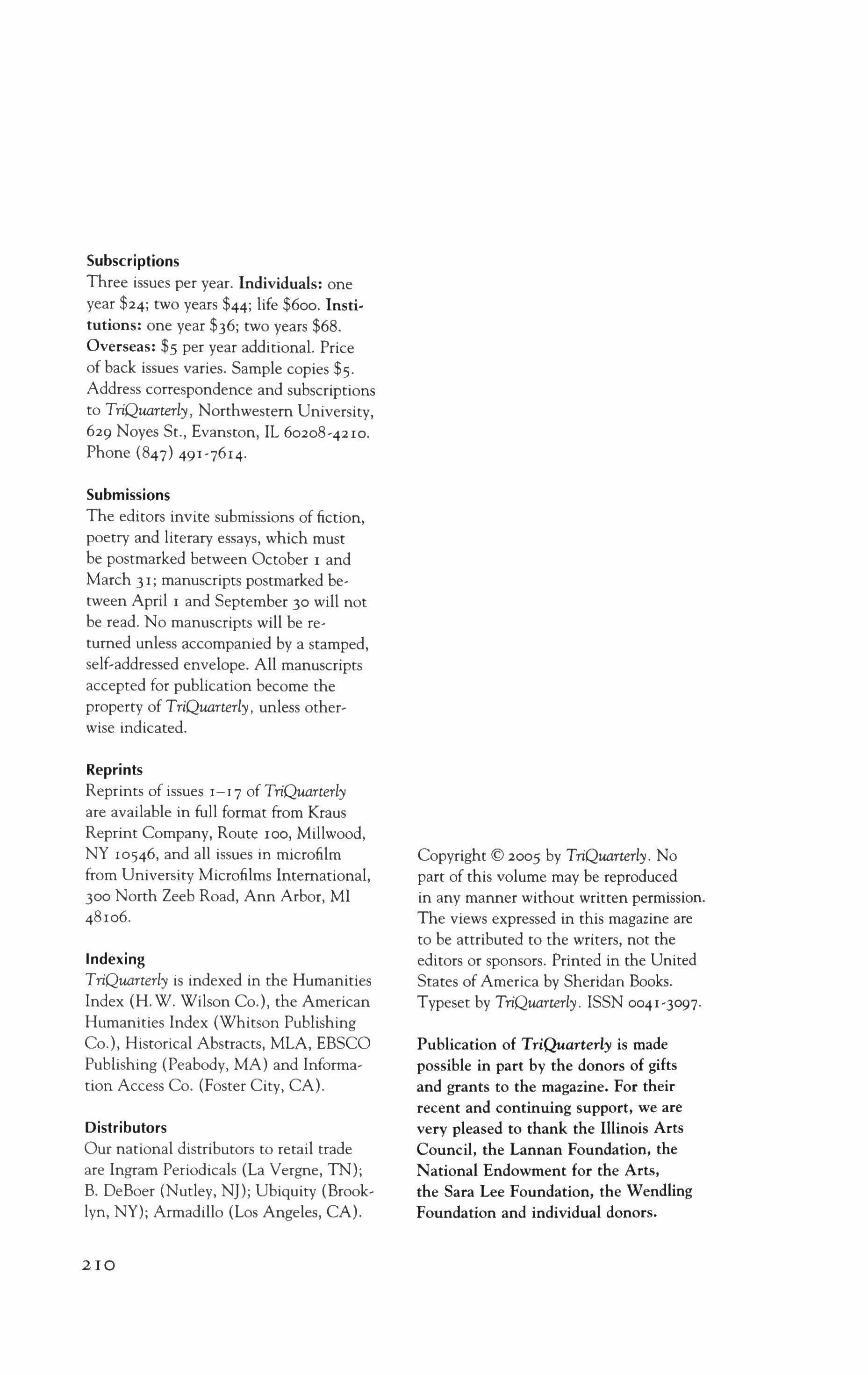
Copyright © 2005 by TriQuarterly. No part of this volume may be reproduced in any manner without written permission. The views expressed in this magazine are to be attributed to the writers, not the editors or sponsors. Printed in the United States of America by Sheridan Books. Typeset by TriQuarterly. ISSN 0°41-3°97.
Publication of TriQuarterly is made possible in part by the donors of gifts and grants to the magazine. For their recent and continuing support, we are very pleased to thank the Illinois Arts Council, the Lannan Foundation, the National Endowment for the Arts, the Sara Lee Foundation, the Wendling Foundation and individual donors.
Promoting the diverse work of new and established writers since 1990
Win
We award $1,000 prizes and publication for prose and poetry in our annual spring contest. Past judges include Mark Doty, Rick Moody, Ellen Bryant Voigt, Ehud Havazelet, and Scott Russell Sanders.
Submit
Fugue invites submissions of fiction, creative nonfiction, and poetry. Send SASE for guidelines or visit us on the web at www.class.uidaho.edu/english/Fugue
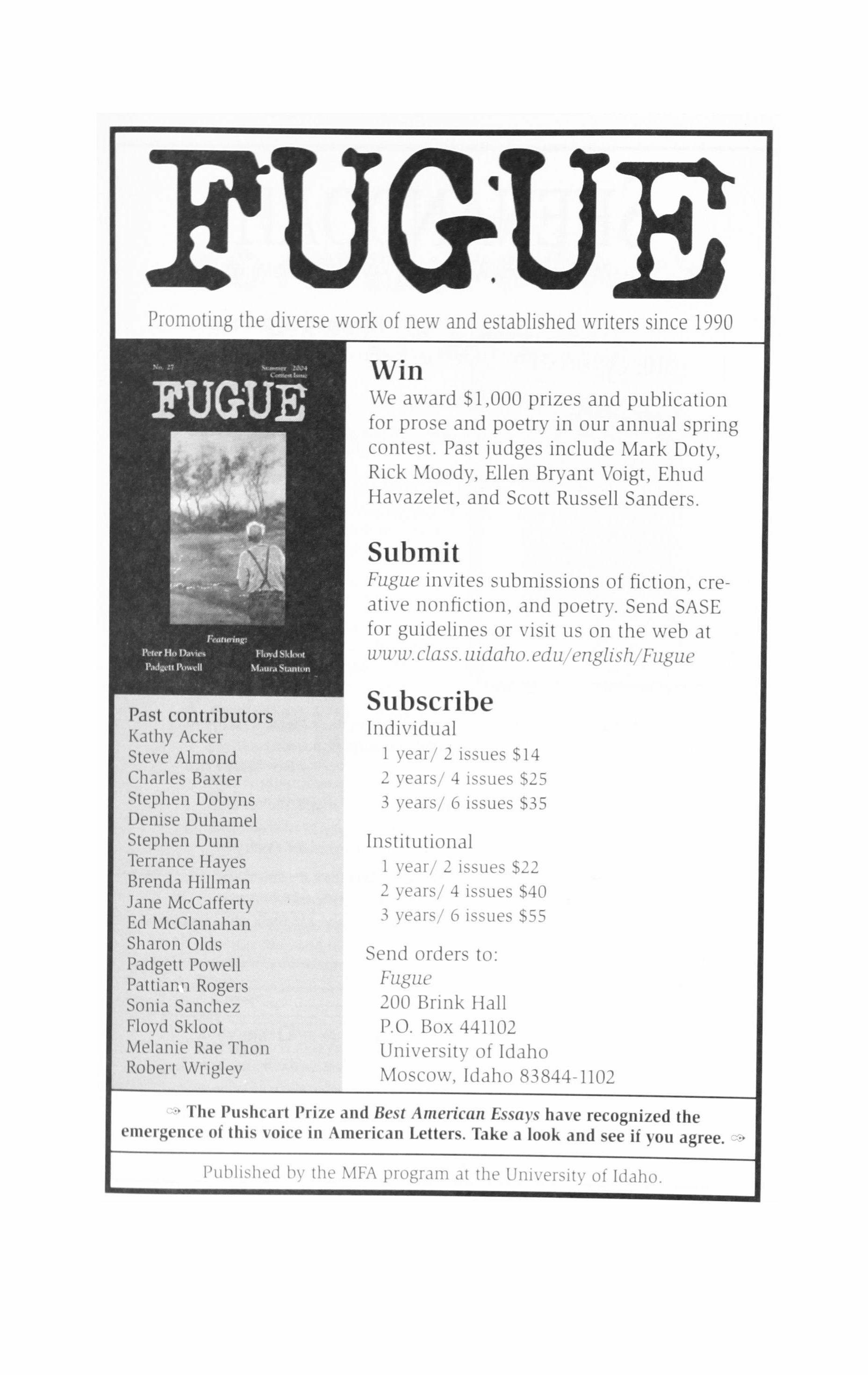
Past contributors
Kathy Acker
Steve Almond
Charles Baxter
Stephen Dobyns
Denise Duhamel
Stephen Dunn
Terrance Hayes
Brenda Hillman
Jane McCafferty
Ed McClanahan
Sharon Olds
Padgett Powell
Pattiann Rogers
Sonia Sanchez
Floyd Skloot
Melanie Rae Thon
Robert Wrigley
Subscribe Individual
1 year/ 2 issues
$14
2 years/ 4 issues
3 years/ 6 issues
$25
$35
Institutional
1 year/ 2 issues
$22
2 years/ 4 issues
3 years/ 6 issues
$40
$55
Send orders to: Fugue
200 Brink Hall P.O. Box 441102
University of Idaho Moscow, Idaho 83844-1102
.• The Pushcart Prize and Best American Essays have recognized the emergence of this voice in American Letters. Take a look and see if you agree. c0
Published by the MFA program at the University of Idaho.
SHENANDOAH
THE WASHINGTO AND LEE UNIVERSJTY REVIEW
'R�Ccm:tYibutor", A l'1..d.vecvHo-llcwtd.e.r 'i3udy
/vioU-cv C V()"JI1b
ec»: Do-veJeffv0'H�
/viINVIvJINVVIUM"v Dwv@Kt,vby AVW\IP�
/vi�PlNVkeY
Li¥I.dcvPC!4t"iM'V SteJve-S�
NCLt;-� Tvethew0'
Shenandoah [has been] feisty and unpredictable in its content. I've found something in every issue that has waylaid and surprised me.
Reynolds Price
Shenandoah is by all odds the best literary magazine around. Carolyn Kizer winner 1985 Pulitzer Prize for Poetry
SUBSCRIBE Now
FREE broadside signed by the author with your new subscription!
o One year 1$22 ($27 foreign) 3 issues, to begin with current issue
NAME:
ADDRESS:
o Check payable to SHENANDOAH

o VISA o MC
CA RD # EXP.
SIGNATURE
Mattingly House, 2 Lee Avenue, Washington and Lee University, Lexington, VA 24450-0303 lutp.z/shenandoah. wlu.edu
SHENANDOAH
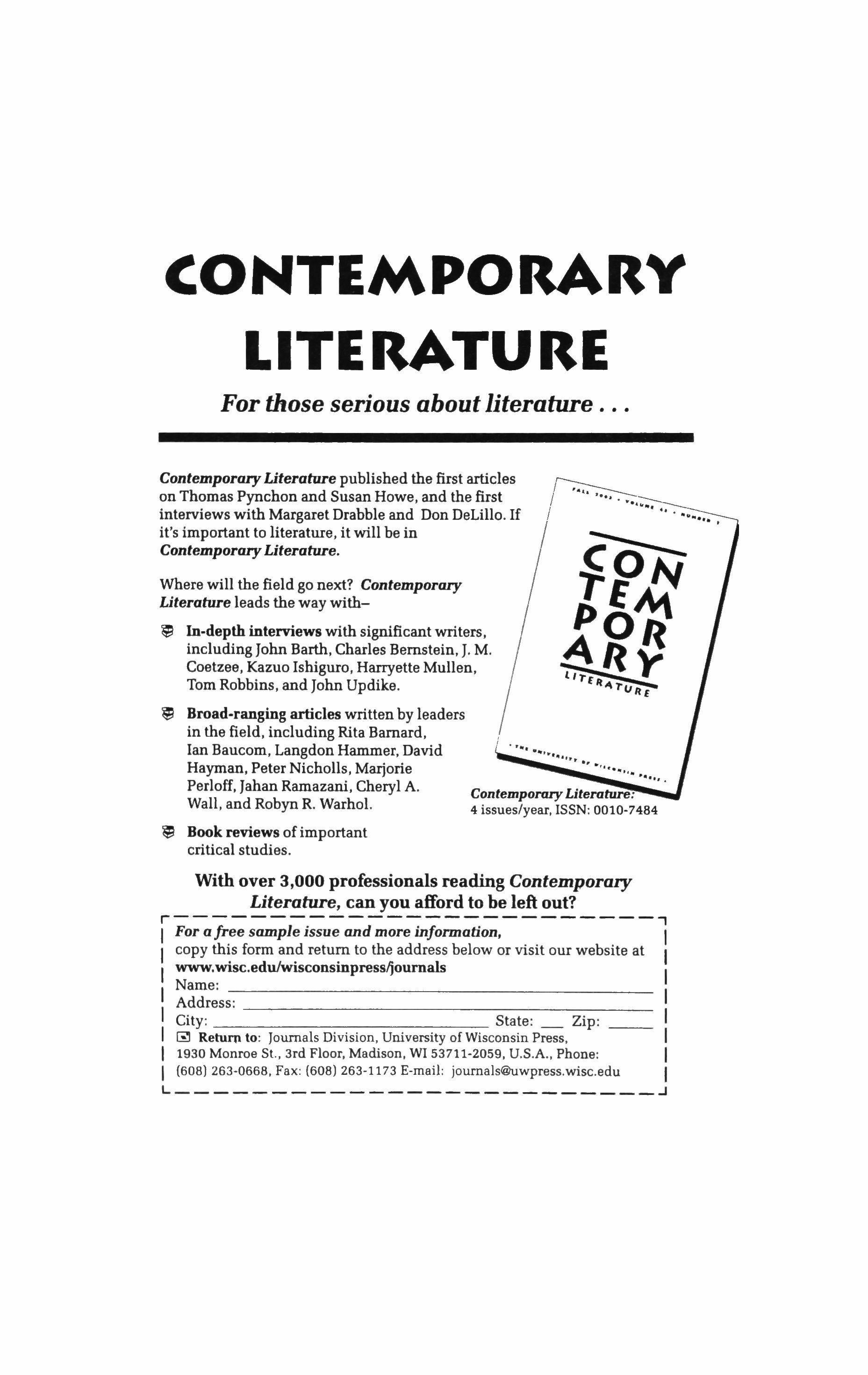
CONTEMPORARY LITERATURE
For those serious aboutliterature
ContemporaryLiterature published the first articles on Thomas Pynchon and Susan Howe. and the first interviews with Margaret Drabble and Don DeLillo. If it's important to literature. it will be in ContemporaryLiterature.
Where will the field go next? Contemporary Literature leads the way with-
� In-depth interviews with significant writers. includingJohn Barth. Charles Bernstein. J. M. Coetzee. Kazuo Ishiguro, Harryette Mullen. Tom Robbins. and John Updike.
� Broad-ranging articles written by leaders in the field. including Rita Barnard. Ian Baucom. Langdon Hammer. David Hayman. Peter Nicholls. Marjorie Perloff, [ahan Ramazani, Cheryl A. Wall. and Robyn R. Warhol.
� Book reviews of important critical studies.
With over 3,000 professionals reading Contemporary Literature, can you afford to be left out?
I For a free sample issue and more information, I I copy this form and return to the address below or visit our website at I I www.wisc.edulwisconsinpressljournals I Name: I Address: I I City: State: Zip: I I @ Return to: Journals Division, University of Wisconsin Press. I I 1930 Monroe St., 3rd Floor. Madison. WI 53711-2059. U.S.A Phone: I I (608) 263-0668, Fax: (608) 263-1173 E-mail: journals@Uwpress.wisc.edu I L �
r-------------------------,
DELILLO FIEDLER GASS
PYNCHON
University of Delaware Press Collections on Contemporary Masters
UNDERWORDS
Perspectives on Don DeLillo's Underworld
Edited by Joseph Dewey, Steven G. Kellman, and Irving Malin
Essays by Jackson R. Bryer, David Cowart, Kathleen Fitzpatrick, Joanne Gass, Paul Gleason, Donald J. Greiner, Robert McMinn, Thomas Myers, Ira Nadel, Carl Ostrowski, Timothy L. Parrish, Marc Singer, and David Yetter
$39.50
INTO THE TUNNEL
Readings of Gass's Novel
Edited by Steven G. Kellman and Irving Malin
Essays by Rebecca Goldstein, Donald J. Greiner, Brooke Horvath, Marcus Klein, Jerome K1inkowitz, Paul Maliszewski, James McCourt, Arthur Saltzman, Susan Stewart, and Heide Ziegler
$35.00

LESLIE FIEDLER AND AMERICAN CULTURE
Edited by Steven G. Kellman and Irving Malin
Essays by John Barth. Robert Boyers. James M. Cox, Joseph Dewey, R.H.W. Dillard, Geoffrey Green, Irving Feldman, Leslie Fiedler, Susan Gubar, Jay L. Halio, Brooke Horvath, David Ketterer. R.W.B. Lewis. Sanford Pinsker. Harold Schechter. Daniel Schwarz, David R. Slavin. Daniel Walden, and Mark Royden Winchell
$36.50
PYNCHON AND MASON & DIXON
Edited by Brooke Horvath and Irving Malin
Essays by Jeff Baker, Joseph Dewey. Bernard Duyfhuizen, David Foreman, Donald J. Greiner, Brian McHale, Clifford S. Mead. Arthur Saltzman, Thomas H. Schaub, David Seed, and Victor Strandberg
$39.50
ORDER FROM ASSOCIATED UNIVERSITY PRESSES 2010 Eastpark Blvd Cranbury, New Jersey 08512 PH 609-655-4770 FAX 609-655-8366 E-mail AUP440@ aol.com
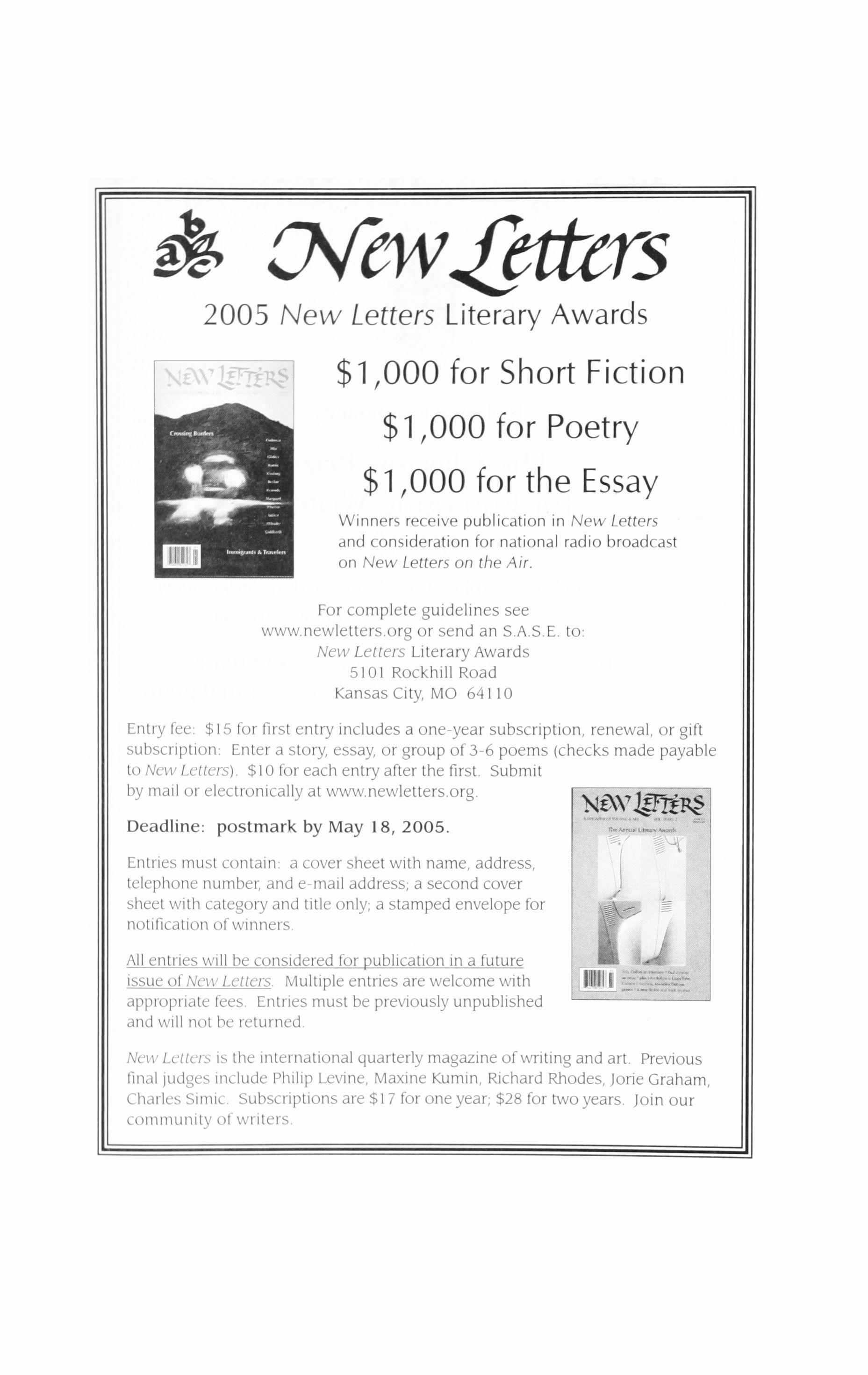
2005 New Letters Literary Awards
$1,000 for Short Fiction
$1,000 for Poetry
$1,000 for the Essay
Winners receive publication in New Letters and consideration for national radio broadcast on New Letters on the Air.
For complete guidelines see www.newletters.orgorsendanS.A.S.E.to:
New Letters Literary Awards 5101 Rockhill Road Kansas City, MO 641 10
Entry fee: $15 for first entry includes a one-year subscription, renewal, or gift subscription: Enter a story, essay, or group of 3-6 poems (checks made payable to New Leiters). $10 for each entry after the first. Submit by mall or electronically at www.newletters.org
Deadline: postmark by May 18, 2005.
Entries must contain· a cover sheet with name, address, telephone number, and e-mail address; a second cover sheet with category and title only; a stamped envelope for notification of winners.
All entries will be considered for publication in a future issue of New Letters. Multiple entries are welcome with appropriate fees. Entries must be previously unpublished and will not be returned
New Lcueis is the international quarterly magazine of writing and art. Previous final judges include Philip Levine, Maxine Kumin, Richard Rhodes, jorie Graham, Charles Sirnic, Subscriptions are $17 for one year; $28 for two years. Join our community of writers
Washington and Lee University
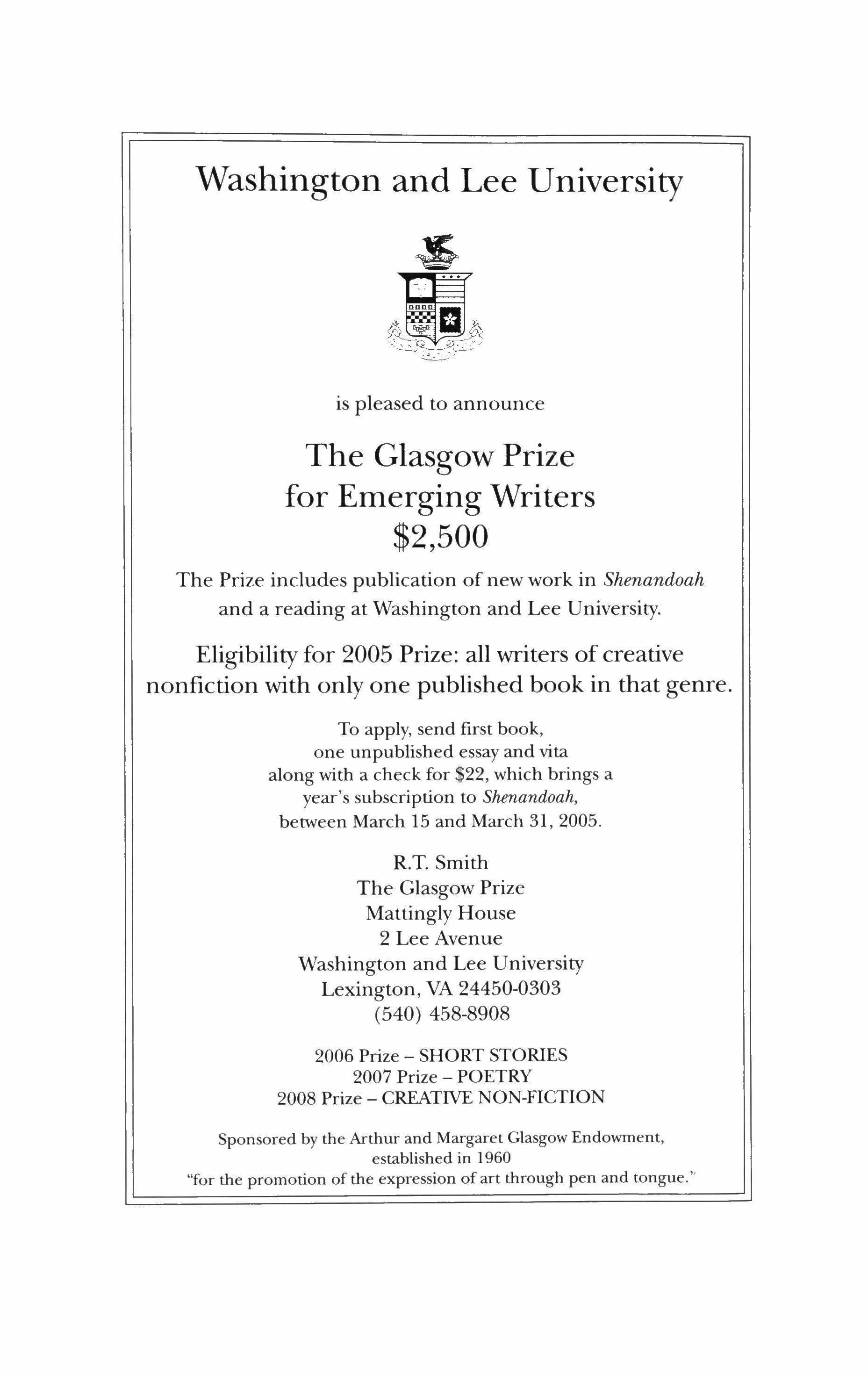
is pleased to announce
The Glasgow Prize for Emerging Writers
$2,500
The Prize includes publication of new work in Shenandoah and a reading at Washington and Lee University.
Eligibility for 2005 Prize: all writers of creative nonfiction with only one published book in that genre.
To apply, send first book, one unpublished essay and vita along with a check for $22, which brings a year's subscription to Shenandoah, between March 15 and March 31, 2005.
R.T. Smith
The Glasgow Prize Mattingly House 2 Lee Avenue Washington and Lee University Lexington, VA 24450-0303 (540) 458-8908
2006 Prize - SHORT STORIES
2007 Prize - POETRY
2008 Prize - CREATIVE NON-FICTION
Sponsored by the Arthur and Margaret Glasgow Endowment, established in 1960 "for the promotion of the expression of art through pen and tongue."

RICK BAROT
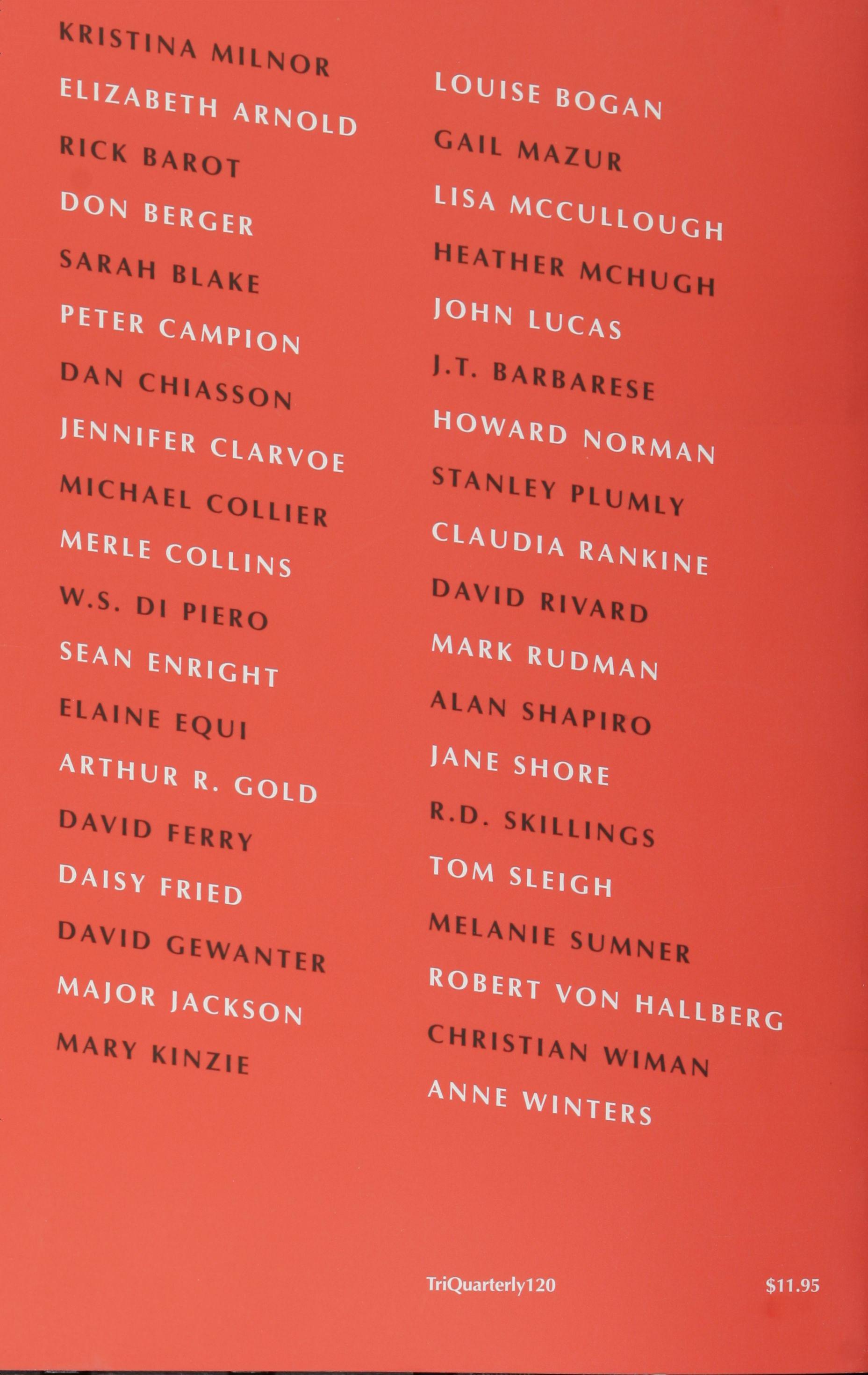
W.S. 01 PIERO
1.T. BARBARESE
R.D. SKILLINGS MELANIE SUMNER
MICHAEL COLLIER
DAVID FERRY
MARY KINZIE
GAIL MAZUR
ALAN SHAPIRO
 Guest Edited by Joshua Weiner
Guest Edited by Joshua Weiner


























































































































































































































